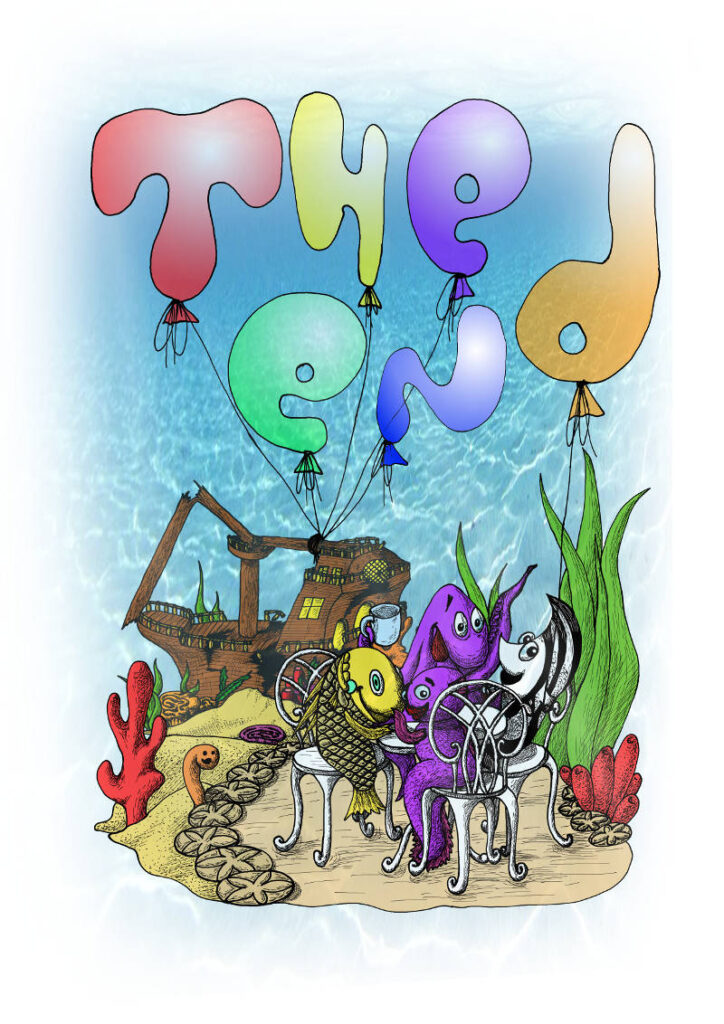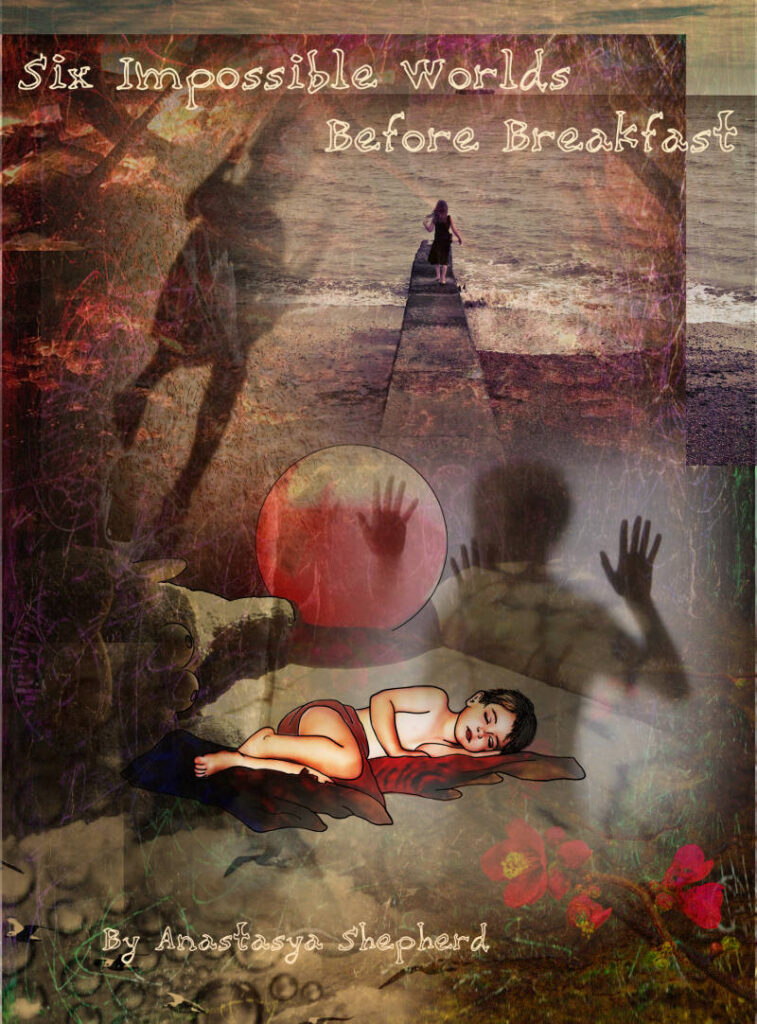
Dedication: To Alice and David. A really good book is also a game. I always loved playing Alice in Wonderland. I hope you will like playing Sunny and Simon, and not Simon Says.
Acknowledgmenents: Thank you, Alice and David, for your ideas – you will find them in the book. Thank you, Kevin, for your patient editing and being prepared to insert definite articles almost indefinitely. 🙂
SIX IMPOSSIBLE WORLDS BEFORE BREAKFAST
***
Anyone who ever read a book, heard a story or simply thought about things knows that words create worlds. The idea of possible worlds, worlds that could be described coherently but do not exist (or do exist, according to rigid logicians, concrete physicists and romantic science-fiction writers), is inevitable. But what about the worlds that cannot be described coherently? The fractured, fragmented worlds of our minds, where some parts are walled off for self-protection, some parts are distorted for fear and convenience and some parts contradict each other for simple lack of attention? Unedited, they produce appalling philosophies, knee-jerk politics and mental illness. Edited, they produce innovation, fantasy and games. Let’s play!
***
Sunny woke up slowly and unwillingly, finally giving up on her dream after numerous attempts to ignore the persistent annoyance of a harsh winter light. It was flooding in through the bare window, filling the corner of the room behind the giant creaky wardrobe where she slept.
The wardrobe came with the room – it was too big to steal. It was heavy, carved with curly leaves and petals, and was probably quite beautiful before the polish was scratched and the ornaments chipped. It belonged to the house when it was big and spacious, with sweeping staircases and giant halls. After it was confiscated from its previous owners, who were sent to the frozen wastes to work, starve and die, the house was partitioned into tiny rooms, vertical and cold because of incongruously high ceilings and poorly insulated windows.
Wrapping her blanket tightly around herself to keep some of the cosy sleepy warmth for a few more minutes, Sunny tiptoed to the giant window, trying to minimise her contact with the cold wooden floor. Outside was white. A white featureless sky hung low over snow-covered houses and streets. Black dashes of tree trunks alternated with dots of trash bins, sending out, to whom it may concern, a Morse code call ” . . . _ _ _ . . .” – Save Our Souls, Save Our Ship, Save Our Souls… No one was concerned. Rare passers-by walked briskly through the maze of alleys surrounding Sunny’s house, bending their heads and hunching their shoulders against the freezing wind. Crows and pigeons sat motionless on tree branches, preserving what energy they had, mirroring humans’ postures with their hunched wings. The only colour outside was the bright yellow of dog urine, adorning snowdrifts and bleached-out cracked wooden benches. That, too, reminded Sunny of writing, a desperate plea for warmth addressed to the blind sky, covered in cloud cataracts.
“That’s enough!” thought Sunny sternly to herself. She marched to her bed, shrugged off the blanket with a decisive gesture, put on her house robe and slippers and came out from her wardrobe-delineated corner. The rest of the room was still and silent, flooded with the same cold white light and covered in dirty plates, cups, bottles, cigarette ash and butts, dust and random bits of clothing. Oh, yes – a vague memory floated through her mind – her parents were having a party last night and she was drifting off to sleep, watching the clouds of dust and cigarette smoke curling and writhing in the dim light of the lamp and listening to clinking glasses, tuneless songs and barely distinguishable voices talking over each other… Leftovers for breakfast then.
Sunny walked out into the long, cluttered corridor, the brown of rust, dust and unpainted chipboard partitions camouflaging the rooms, and wended her way between old bicycles, coats and boxes to the shared toilet. After steeling herself for the inevitable smell of ancient and, at this stage, unrepairable plumbing, Sunny opened the door, gagged habitually and squeezed into the cubicle. She couldn’t help but envy the dogs, whose lampposts were at least in the open air.
“Phew, that’s over! Now for the bathroom. I wonder if there is any hot water?” thought Sunny. There wasn’t. After brushing her teeth and washing her face as quickly as she could under the freezing trickle of brownish liquid, she finally got to the kitchen. It was empty – the neighbours must still be asleep. Things were looking up! Sunny opened the fridge door. Her family’s shelf contained some yesterday’s noodles, a bit of sausage and several eggs. Things were definitely looking up. After rummaging in the bread bin she also found some crusts. Everything went into the frying pan, which went onto the old gas stove. After the smoke cleared, Sunny was left with a delightful mess of fried noodles, bread, sausage and egg. Brilliant!
Quickly, she took her breakfast to her room, to avoid the possibility of encountering her neighbours. They were lonely old ladies, occupying the other two rooms in the flat and sharing their bathroom, toilet and kitchen. They weren’t really bad, but loneliness, boredom and poverty made them querulous (especially Mrs Pots on the left) and Sunny didn’t want to face their complaints about ill health, empty shops, and “her over there stealing my sugar”.
The warmth and energy of hot breakfast filled Sunny and her spirits rose, buoyed even further by the thought that it was a school holiday, her parents were at work and she had a whole day to herself. There will be no perpetually angry teachers, who hated their poorly paid jobs, their noisy pupils and, above all, themselves – for compromising their dreams and ending up in the above-mentioned jobs. There will be no classmates jostling for attention, scared of unforgiving adults, spreading the meanness around with stupid fights and insults… There would also be no art and language teachers, who actually were interested in their subjects and taught her quite a lot, and none of her few friends, but that was a small price to pay for a day of peace.
Sunny put on tights, trousers, socks, more socks, a vest, a shirt, a cardigan and a shawl. Moving was now a bit awkward, but she was warm. She waddled over to the bookshelf and picked up one of her favourites: “Alice in Wonderland”. It started with a warm, sunny afternoon. After reading a few pages Sunny realised that she was drifting off into a doze along with Alice. It reminded her of floating on the warm, salty water of the Black Sea during her last summer holiday. She felt so calm and contained, cuddled and carried by the current, deeper and deeper, further and further from the shore and the daily rhythm of her life. She sighed happily. Today, she will be a fish.
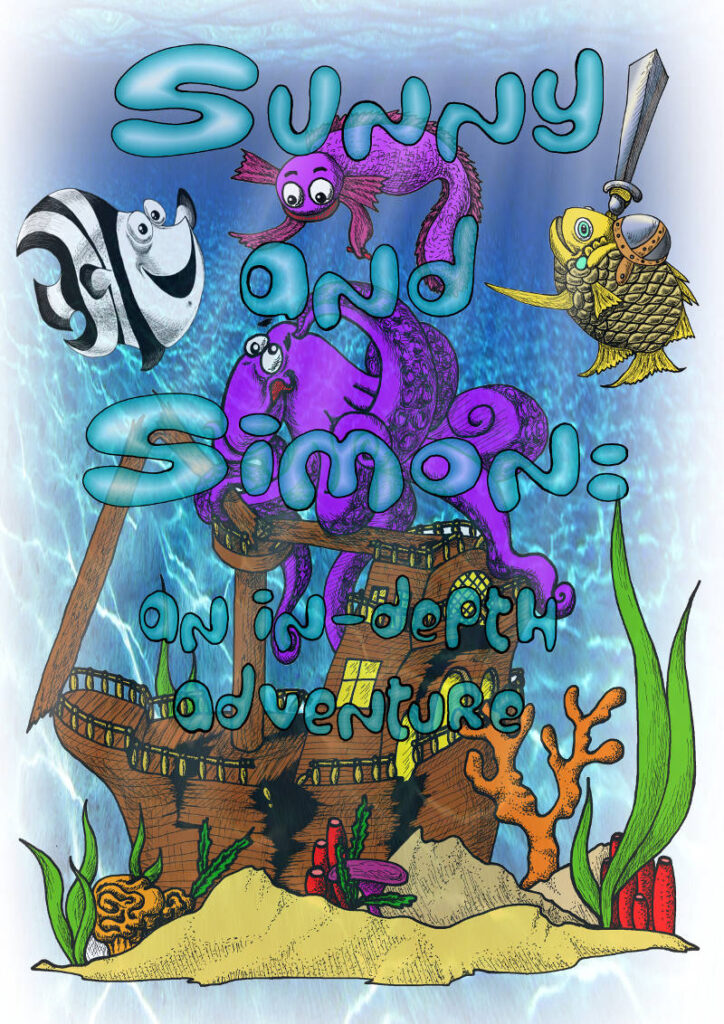
SUNNY AND SIMON: AN IN-DEPTH ADVENTURE
Chapter One
In which we meet Sunny, who lives in the ship under an octopus. And the octopus.
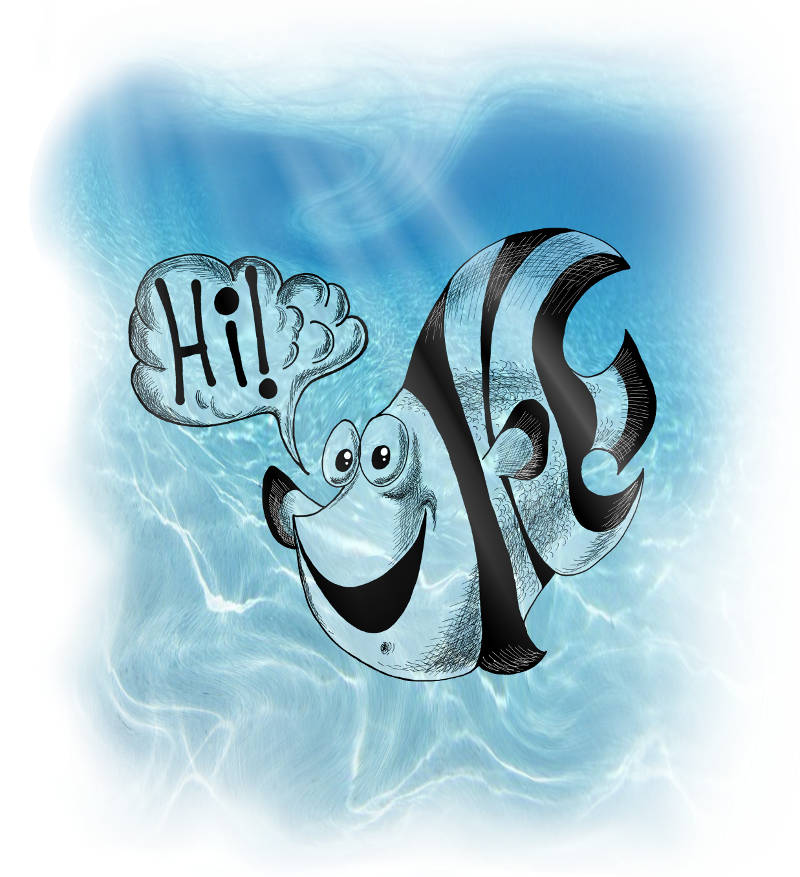
Once upon a place and twice upon a time – once when I wrote it and once now, when you read it – there was a little fish called Sunny. She was not a sun-fish; if anything, she looked more like a moon, but she had such a sunny disposition that the name fitted perfectly. The sun looks different under water, not as bright, but more magical, with the water surface making a sinuous pattern of light and dark, incessantly moving, playing with shades and lines, making even the dullest surfaces dance… but I digress.
Sunny lived in a sunken ship under an octopus. Everyone in Reeftown knew it. If anyone ever asked her where she lived, she would say, “Straight and second dune on the right, in the ship under an octopus. You can’t miss it.” And you couldn’t. Not if you were looking for it, anyway.
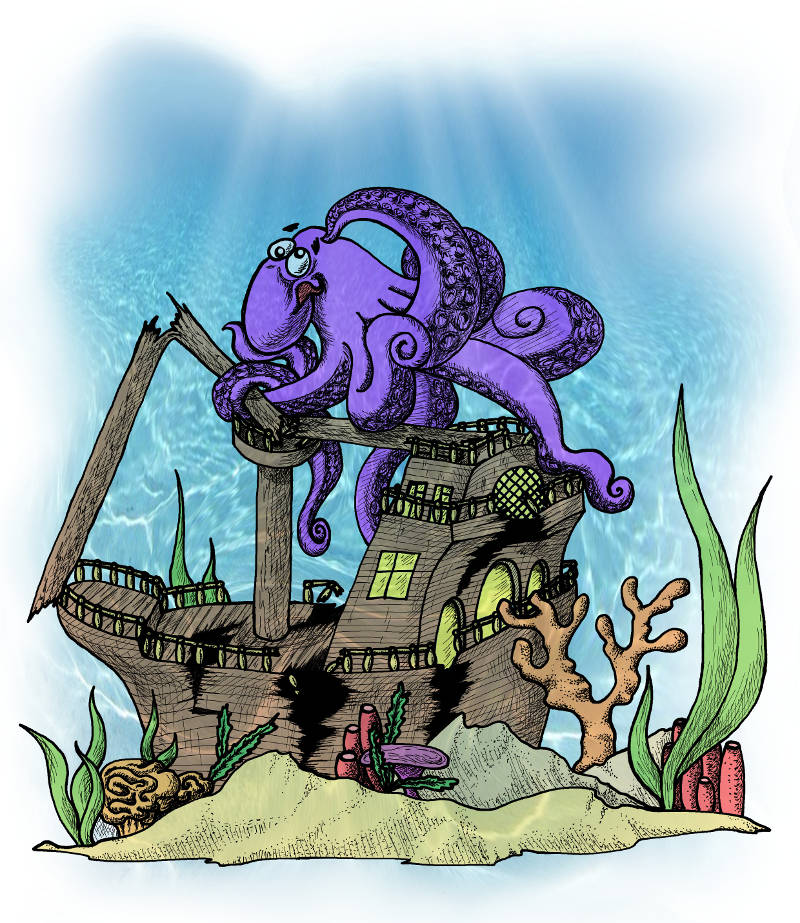
There is a long and fascinating backstory to how Sunny ended up in that ship, but we don’t really have time for it now. If we start meandering this early in the story, we’ll never get anywhere.
Sunny’s ship was the only ship under an octopus she knew about and she was rather proud of it. The octopus’ name was Emmanuel and she even wrote a ditty about him. When Sunny was in a good mood, silly little verses spilled out of her, dancing like sunlight on the seafloor.
We did just talk about it, pay attention!
Anyway, here is the ditty,
“Emmanuel does not play sports.
He has eight-holéd spotty shorts.
He sits and thinks up in the rigging
and finds the universe intrig’ing.”
Sunny sang it to Emmanuel, who “hmm’d in appreciation and even tapped out the beat with a tentacle. This was unusually animated behaviour for the octopus, who normally spent his time in the rigging, quietly chewing bread and pondering, occasionally dropping crumbs or (if he was concentrating really hard) even whole slices. Sunny thought of posting a sign under him, warning visitors to beware of being bombarded by fully baked bread products and half-baked ideas, both potentially leading to headaches. However, after a bit of pondering of her own, she decided against it because not many of their visitors could read, especially very complicated words.
For example, do you know what “potentially” means? It means “It could, but it wouldn’t if you don’t, so don’t!” or, if you want it to, “…so do!”. I hope that makes it clear.
Sunny did draw a sign explaining the danger pictorially and saying “Beware of the Octopus” just in case. Sunny liked making things and making things funny. She asked Emmanuel’s permission in advance (an important point here: if you are going to warn people about your nearest and dearest, ask first to prevent misunderstandings, pregnant silences and “accidental” salt in your tea) and he approved of the idea – he did think it was quite funny – and even gave Sunny some of his ink for the sign. He made lots of ink for writing things down. He was a very strange octopus, you know: most octopi make ink to hide behind, like bureaucrats, but he made it to make himself clearer.
Are you still stuck on “pictorial”? Yes, of course it means in pictures! See, here it is:
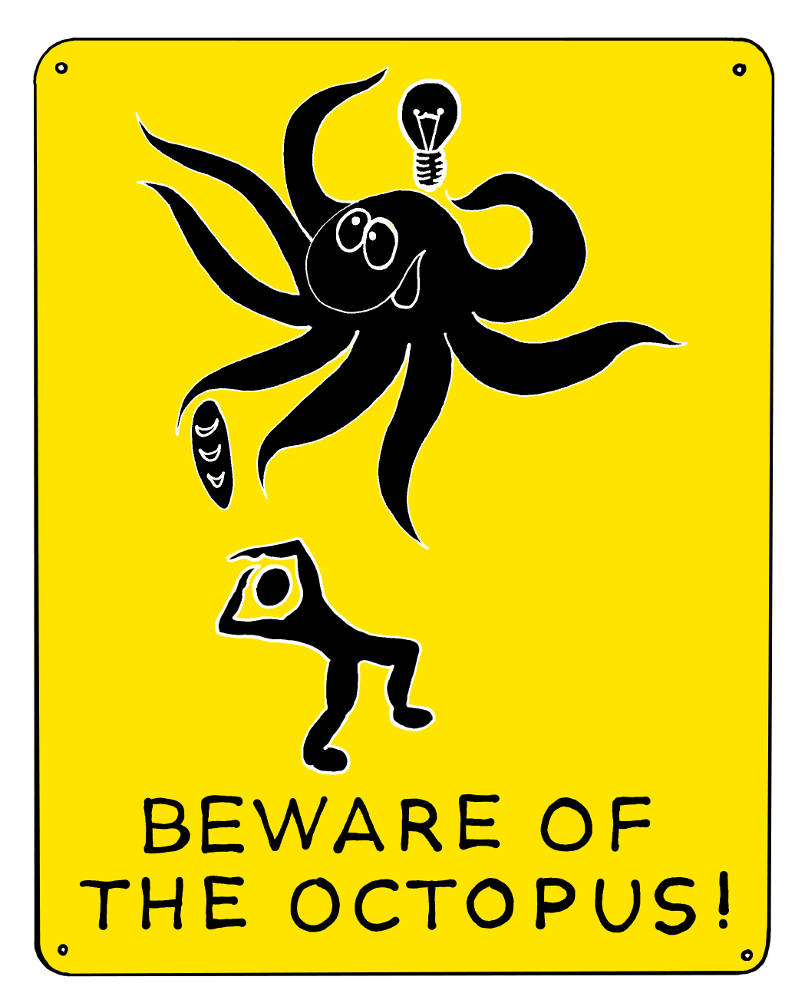
As was mentioned before, Sunny liked making things, especially starting to make them. Finishing was much more difficult – or sometimes stopping, depending on the project. She once made a key fob for Emmanuel. It was meant to be an octopus, but she forgot to stop and made a decapus instead. It was lucky that she remembered to stop after the tenth tentacle because for the life of her she could not remember the word for eleven in Greek. Do you know what it is? “Hendeca” – it would have made her key fob into a hendecapus.
Anyway, the story of the decapus says a lot about Emmanuel, so I will tell you a bit more. Sunny originally meant the key fob as a birthday present, but he could not remember when he was born. So, she decided to give it to him for his favourite holiday. When she attempted to sound Emmanuel out about which holiday was his favourite, instead of an answer she got an earful about commercialism and how all these holidays were invented by shops in order to sell her junk. Finally, she despaired and just gave him the key fob for the Even Tide Day. And he was very pleased, especially after she explained what it was. And his general dislike of holidays didn’t matter at all, providing a nice demonstration of the difference between theory and practice or, as Sunny put it, of the fact that most people, even clever ones, don’t really know what they want.
And Emmanuel was clever, which was another thing Sunny was rather proud of. “Pondering, you know… Hmm… Err… Yes, indeed… Pondering…” is what Emmanuel told people when they asked him what he was doing. Sometimes he even said, “Pondering the imponderables,” which did not make any sense to Sunny. She strongly suspected that he was simply showing off.
Emmanuel had lived there for as long as Sunny could remember, “hmmm’ing to himself, giving cryptic answers to perfectly straightforward questions. He didn’t speak much and was generally considered to be a wise old octopus, with a mystery in his past. General considering was mostly done by Molly and Polly – two scallops who spent their lives gossiping on the next dune. They thought that the mystery was unrequited love.
Another long word here: “unrequited”. It means that the object of your affection remains unaffected by you. It seems to be a frequent affectation for people who read romance novels. Affectation is pretending to feel something in order to appear more interesting and has nothing whatsoever to do with affection. It is very important to know the difference. Here is a picture to make it clear:
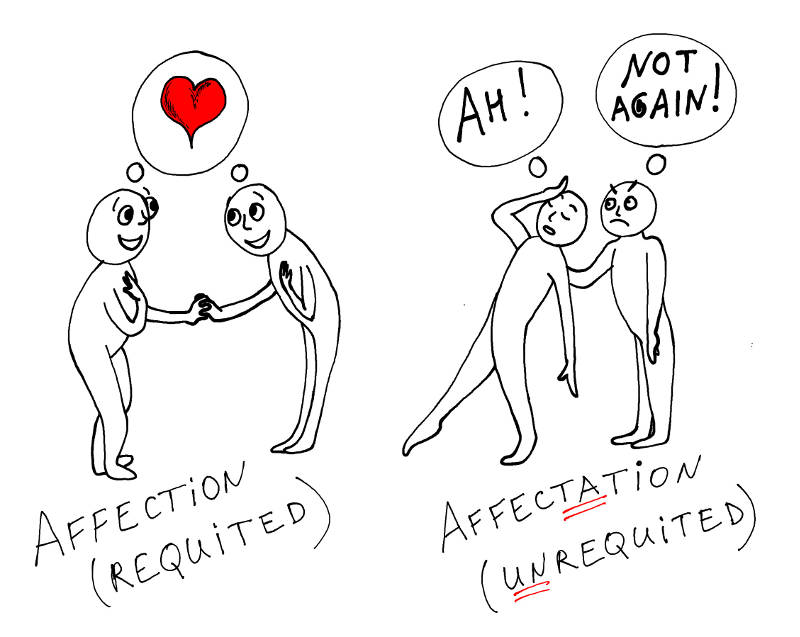
When Sunny asked Emmanuel about all that, he replied, “All my loves were very much requited, thank you. And, anyway, I am not that old. Hmmm… In a none-too-distant past I used to be a cowboy, driving herds of ravenous cuttlefish across the ocean wastes to the West, riding my faithful porpoise, with the current tugging at my 10-gallon hat… I had to tie it on with a string – the blooming thing kept falling off.
“We were happy – my porpoise Buttercup and I – wandering free through the endless ocean, stopping at rare settlements for food and water and at frequent settlements for traffic lights… until I found that Buttercup was not as faithful as all that. One day I forgot to tie her up properly and she wandered off after some flying fish. Maybe she wanted to learn how to fly, or maybe she was just hungry… That’s how I was separated from my porpoise.
“Hmm… yes… hmm… As I could not follow the herd without a steed, I abandoned my trade and my hat (You see, there are positives even in the most tragic of circumstances – the hat string used to chafe like nobody’s business!) and started wandering aimlessly, lonely as a cloud… Hmm… And then I wondered, “why do people say that? Clouds are almost never lonely – they form into cloud banks – or is it schools? and, anyway, why are they called banks? Or schools? Why is a crowd of fish called a school? Nobody ever learns anything in a crowd – apart from why it’s important to get out…”
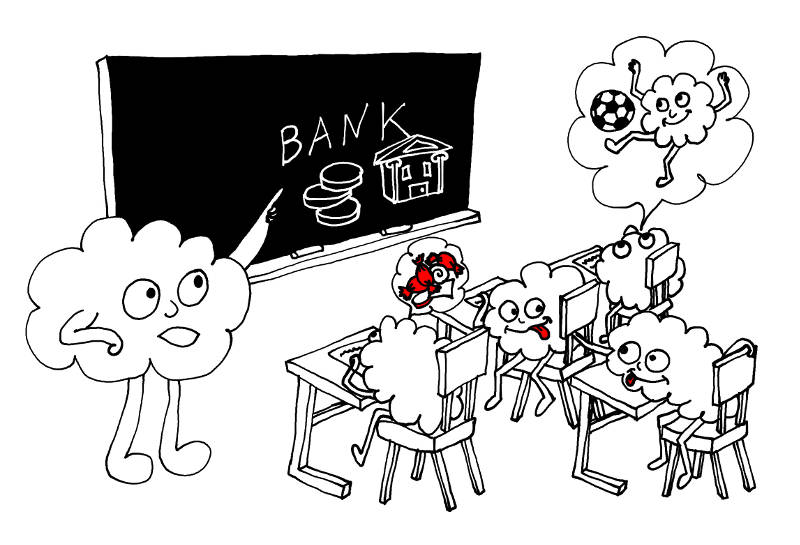
“Hmm… yes, indeed… from then on I wandered, still lonely, as an octopus wandering by himself, but no longer without a purpose. I was now trying to figure things out. And one of the first things I figured out is that I can wonder much more comfortably if I stop wandering and settle down. Preferably somewhere in the warm with a library nearby. That was a good piece of thinking, even if I say so myself! Hmm…
“Once my purpose was clear, finding the right place was just a matter of time – and some money. Hmm… You know, there is a theory that there is no such thing as time and money, there is only a time-money continuum… the more you have of one the less you get of the other… Hmm… yes… Anyway, I found this shipwreck and settled down in the rigging. Or up, relative to you, of course. And that’s the story of my wild youth – more of a romance than a mystery, don’t you think?”
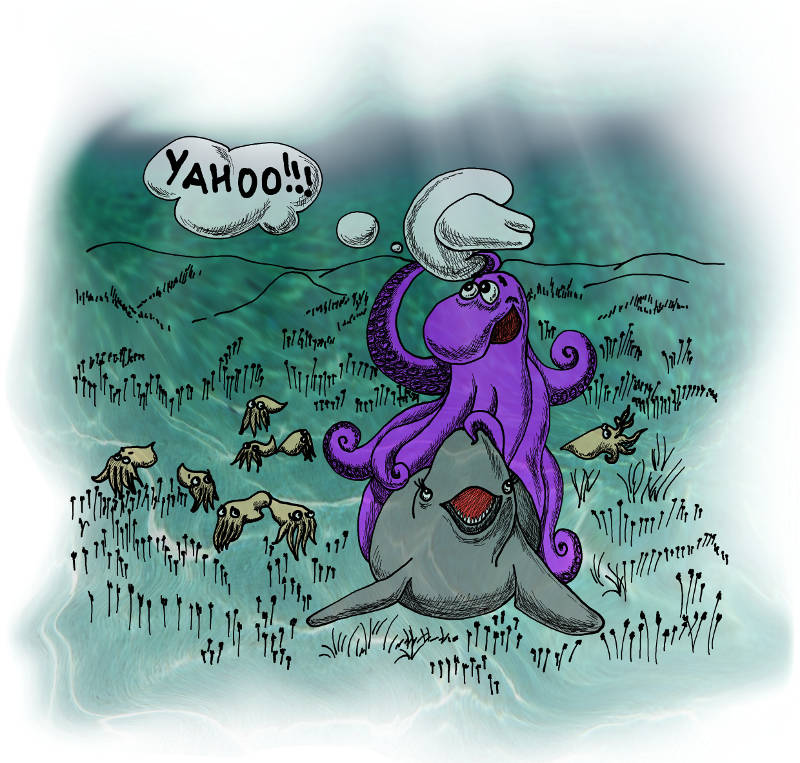
“Wow! Yes! Is it all true?” sputtered Sunny in wonder, after shutting her mouth with a blurp (this is what you get underwater instead if a snap).
“If you like,” winked Emmanuel, “or I may have been a lumberjack.”
Sunny, whose mind was spinning from trying to imagine Emmanuel as a cowboy, let alone a lumberjack, gave up at this point and went to her room to think.
***
In her room, Sunny thought about adventure. All those stories she read, where fearless cowboys traversed huge distances, fighting evil cattle-rustlers and escaping from vicious Indians. The adjectives, of course, were put in by the writers. In Indian stories, there probably were evil land-rustlers and vicious cowboys, but, since they only had an oral tradition, the written adjectives outlasted them. Sad, really.
But cowboys and Indians was such a fun game! They were simple, intuitive stories, where the cowboy was a single man, surviving in a hostile world, a lone hero, protecting his cows and womenfolk – in that order. Interestingly, the womenfolk usually featured in the stories so briefly that they were more like props than characters. They were there to protect, sweep off their feet and then leave behind, waving soaked handkerchiefs as the hero rode into the sunset to meet his next adventure…

Cowboys and Indians
Sunny always imagined herself as a cowboy. Waking up next to a burned-out campfire under a thick blanket, feeling suddenly hot as the direct assault of the scorching morning sunlight replaced the deep cold of the high-desert night. What was it that woke her? A sound. A familiar sound of hoofbeats that shouldn’t have been there. She was instantly alert and ready for action. In one fluid movement she jumped to her feet, simultaneously cocking her pistol and readying the lasso that was lying in a circle around her all night, protecting her from venomous snakes. That doesn’t actually work – snakes are used to crawling over all kinds of stuff. But the enemy was gone. And so were her cattle.
There was no one to be seen in the dry rocky landscape. Quickly, she threw herself on the ground, with her ear flat on the dry dust, listening intently. Was it the sound of her own heartbeat? No, the distinctive rhythm of hoofbeats was giving her the direction to follow. That actually does work – sound travels better through solids. Make sure you listen for things going away and not towards you, though, or your head might get stepped on. Putting two fingers in her mouth she emitted a loud whistle. Her faithful black stallion thundered in from the nearby pasture and Sunny, without waiting for him to stop, swung into the saddle and was off in the direction of the hoofbeats.
After a short ride she saw a column of dust on the horizon. She must be catching up with the rustlers. Sunny slowed down and, keeping the column of dust in sight, started circling towards the top of the hills bordering the ravine she was following. From there she would be able to see the herd and its abductors without being seen. However, as she was approaching the crest of the hill, she noticed a second cloud of dust, coming from the other side of the ravine. Sunny saw that the clouds would intersect around the next turn. She dismounted and continued on foot, first walking quickly and then slowing almost to a crawl. She was slithering imperceptibly from behind rocks, like a hunting snake; darting from shadow to shadow with incredible speed, like a jumping tarantula; freezing motionlessly in-between, like a watchful owl. She was hunting, alert to any motion or sound far below in the ravine, her whole being taut with excitement, more awake and alive than she had felt in weeks.
Sunny’s senses seemed sharper than ever, her whole self concentrated on seeking out her prey. As she rounded the corner and watched carefully from behind a large boulder, the scene below appeared magnified. She saw a band of Indians cascade into the ravine on their dappled horses, like a small tsunami, screaming their guttural, bird-like cries of defiance, shooting at the rustlers with deadly precision. In a minute the battle was over, three thieves dead and her cattle – double-stolen, this time by Indians, who continued to drive the herd down the ravine. With a sigh Sunny retraced her steps, swung back into the saddle and continued to follow, watching the herd and its new captors from the ridge of the hill.
As she passed the bodies of the rustlers, Sunny saw that flies, vultures and jackals were already starting their feast. Vultures and jackals snapped and screeched at each other, grabbing, tearing and swallowing huge pieces of flesh; blood and gristle spurting from their mouths and beaks. The incessant buzzing of flies provided a mesmerizing background rhythm to the disgusting ballet, the musical of desert death. The rising heat was shimmering in the air, making everything look slightly unreal, magical in the grizzly tradition of folk tales. Sunny felt nauseous. Soon there would be nothing left of the outlaws but bleached bones and eternally grinning skulls. The thought was a relief, the vivid picture of still and, above all, clean bones providing a sense of closure. Her stomach settled and she moved on, trying to forget the busy horror of the scene she had just witnessed.
After riding for two more hours the Indians below stopped. They were settling in the shade of a large stone overhang, next to a small creek.
“A good idea to break until the sweltering heat of midday passes,” thought Sunny.
Now that she had stopped, Sunny’s hunger and thirst caught up with her. She rode a little further, hiding behind the next curve in the twisting landscape, dismounted and started rooting through her backpack. There was some beef jerky, a few pieces of flatbread and half a flask of water. She ate her bread and meat quickly and emptied her flask in a few gulps. She was still thirsty – that jerky was salty! You can live without food for a week – though it is not much fun – but not without water. She would have to refill her flask.
Sunny crept back and saw that most of the Indians were asleep, but they had left a few sentries, who were sitting, talking quietly by the fire. Sunny briefly considered charging down the hill, her gun blazing and lasso swinging, but the odds were against her. Attacking three men would have been a risk, attacking thirty would have been sheer folly. She would have to think of a better plan. Or, in fact, a plan.
Slowly and carefully, Sunny walked to her horse. It looked like the Indians had settled down for a while and she had time to refill her flask and prepare. She decided to scout ahead. After riding for half an hour, she came across a huge boulder perched precariously at the edge of the hill-crest, over an almost sheer wall of loose shale. Incongruously, the image of a cartoon jackal carrying a box of dynamite swam through her mind. It would require preparation and split-second precision, but she had a plan. Meep-meep!
Carefully avoiding loose shale, Sunny crept down into the ravine, leading her horse, who knew how to be quiet when necessary. She drank and drank at the cool stream at the bottom, drank until her belly felt taught with water, like an overstretched balloon, and she could drink no more. She filled her flask. She made sure her horse drank his fill. She found several large saplings, strong and pliable, and cut them laboriously. She tied them with a rope, harnessed her horse to the load and walked him, carefully, circuitously, back to the boulder. She placed the saplings and settled down to wait. Hours passed in the quiet heat.
A distant sound of hoofbeats intruded on her semi-doze and, for the second time that day, Sunny was instantly awake and alert. She jumped into the saddle and carefully stood her horse in a position where she could see the bottom of the ravine. The herd was approaching rapidly. As the cows passed below, followed by the Indians, she spurred her horse. He jumped, pulling the saplings, dislodging the rock, creating an avalanche… The noise was deafening as the rocks fell, big and small, deceptively slow at the top, bullet-fast at the bottom, rolling and tumbling over each other, over sparse trees, over the people and cows beneath…
As the noise subsided and the dust settled, Sunny realized that her plan had worked. The herd was separated from the Indians by the pile of rocks, with several cows and people buried underneath. There were only two warriors on the same side of the avalanche as the herd, the rest would have to go a long way around to catch up. All she needed to do now was to shoot the remaining thieves and lead her herd away. As she looked down, a body of a cow, splatted by a huge boulder, caught her eye. Blood and flesh and the buzzing of flies, which arrived almost instantly, reminded her vividly of the rustlers’ bodies she saw earlier. Sunny gagged. She lowered her gun and rode down the other side of the hill, away from the ravine.
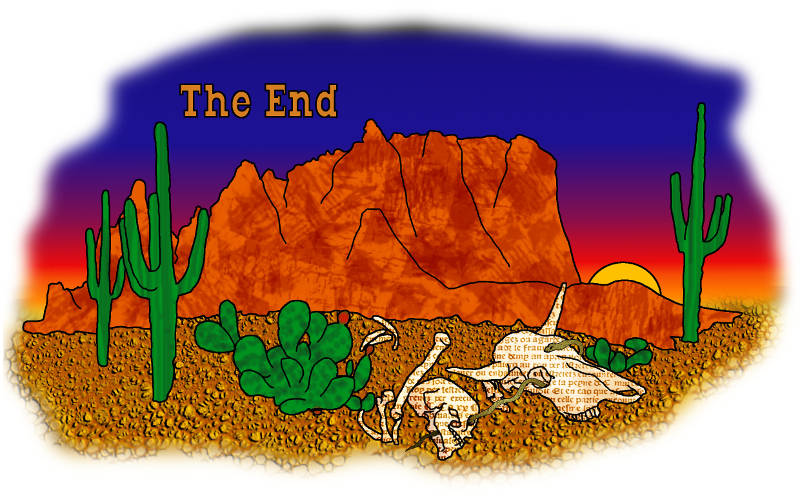
Cowboys and Indians was not such a fun game, after all… Fish were more fun.
Chapter Two
Which is as necessary to the story as an umbrella is to a fish.
Every morning on her way out Sunny called, “Hi, Em”. Emmanuel is such a long name to say every day that she usually called him “Em” for short. To herself, she thought of “Em” as his real name and of “Emmanuel” as his Sunday best (at his Sunday best she always thought of him as wearing a top hat, a tie and a jacket with a few crumbs down the front, which made her giggle).
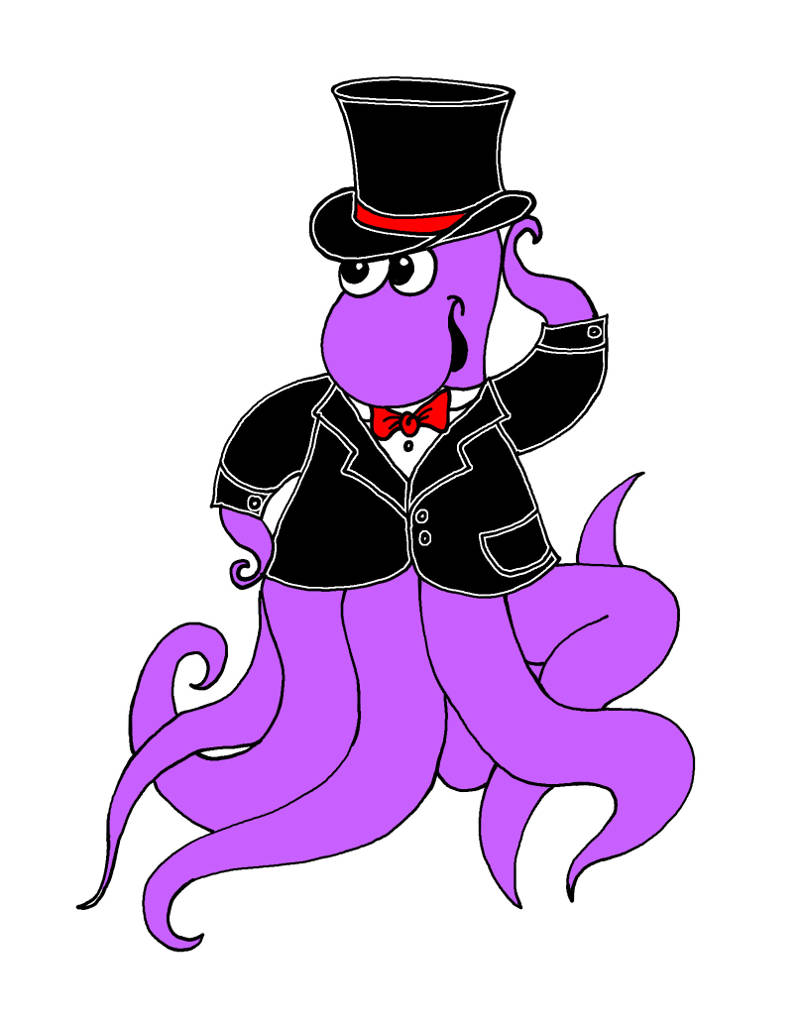
“How is your pondering today?”
“Very well, thank you,” answered Emmanuel, for he was a very polite octopus. He said “very well” even when it wasn’t – that’s what polite octopi do.
On this particular day Emmanuel added excitedly, “Hmm… hmm… yes, indeed… hmm… (you can tell how excited he was by the number of “hmm’s”) I may go so far as to say very well indeed! Today I discovered the meaning of life for amoebae. Tomorrow I am planning to move on to multicellular organisms.”
Do you understand anything he said? Neither did Sunny. Let me help you out. Amoebae are very, very, very, very small animals. They are so small that you cannot see them without a microscope. What, you don’t know what a microscope is either? It is a tool for looking at extraordinarily small things. Like a telescope, only the opposite.
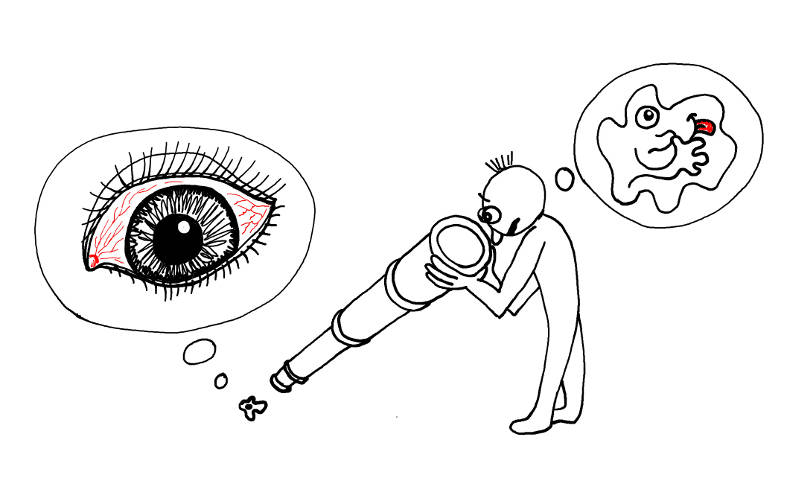
And amoebae are very simple. Anyway, we think they are very simple. They probably think they are very complex and interestingly pale. Amoebae are made up of only one cell. Multicellular organisms are living things made of lots and lots of cells, like a beehive or a prison.
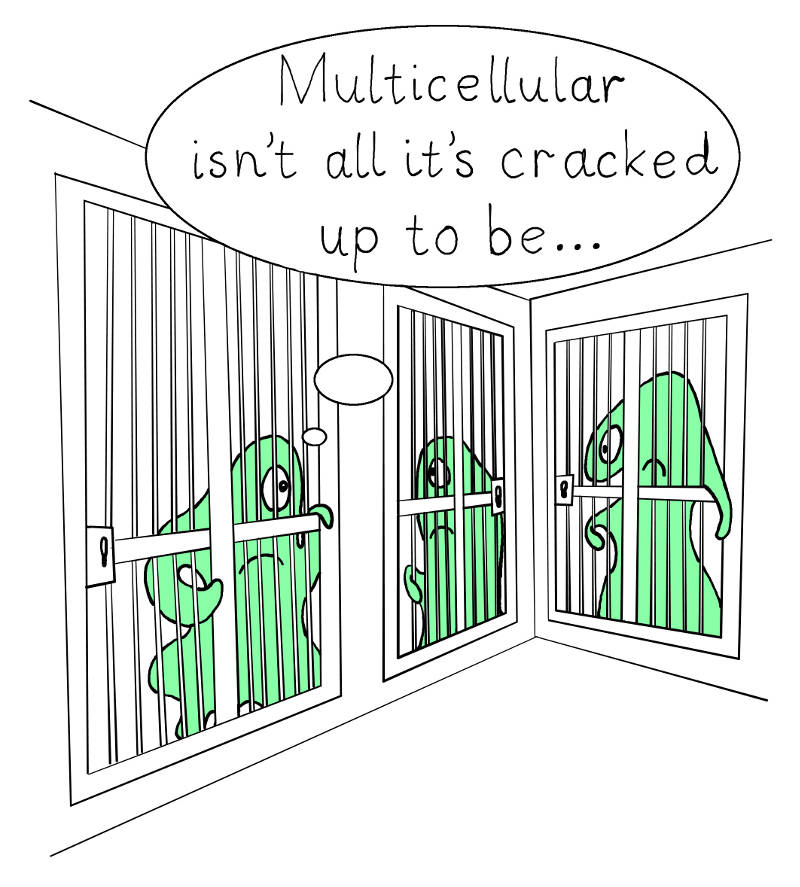
What the meaning of life is – I don’t know either. I asked others, and nobody coherent seemed certain, while nobody certain seemed coherent. You’ll have to ask Emmanuel about that if he ever gets as far as humans – or, indeed, fish.
“Good luck!” laughed Sunny and was about to swim on, when a loud “hmm” stopped her. “What is it, Em?” she asked.
“Hmm… I am afraid the bread box has been somewhat semantically misleading since yesterday,” said Emmanuel.
“What?” seemed the only sensible response and Sunny made it, “What?”
“There is no bread in it. It would be more accurate to call it an empty box.”
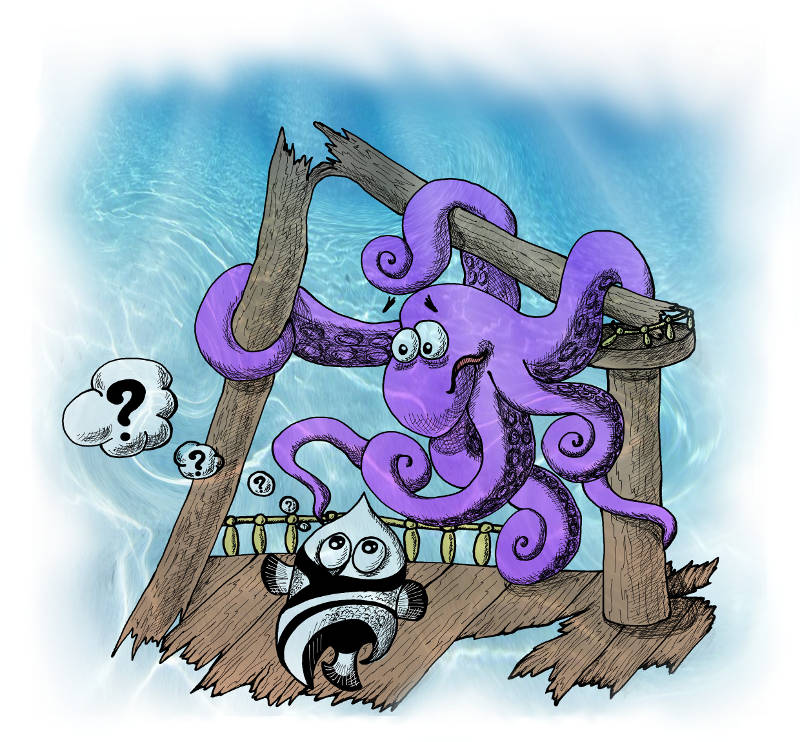
“I see!” Sunny brightened. “I am going to town to buy an umbrella, I will get some bread as well.” Sunny had seen Molly and Polly sporting their new blue and pink umbrellas the day before. They looked so bright and cheerful in the shimmering sunlight, that she simply could not get them out of her mind. She even came up with two umbrella-ish verses, though she wasn’t quite happy with either of them. The first one,
“Pink parasols
don’t have soles,
they don’t wear shoes,
they grow on poles,”
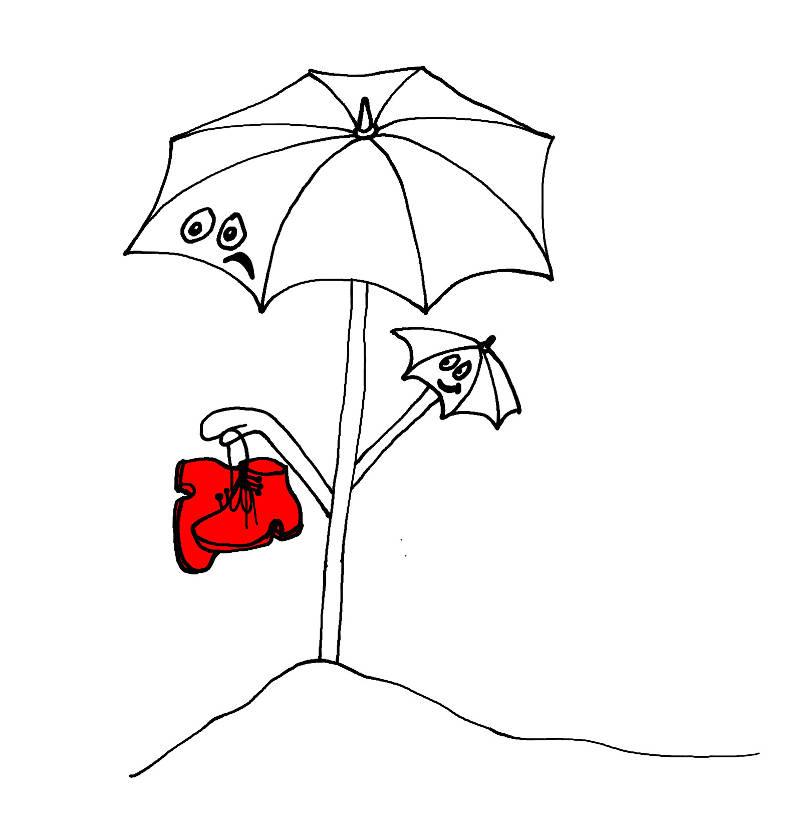
seemed too silly and the second one,
“Umbrellas are
acute and sunny.
They make me cute
and cost me money,”
seemed too mundane.
What do you think?
Anyway, Sunny decided to get one too. She was of the opinion that some of the most important things in life are beautiful things that make one happy. She once asked Em about whether he thought beauty was the most important thing in life, but he replied that other people’s value systems are none of his business; they are the business of politicians and priests – and a particularly profitable one.
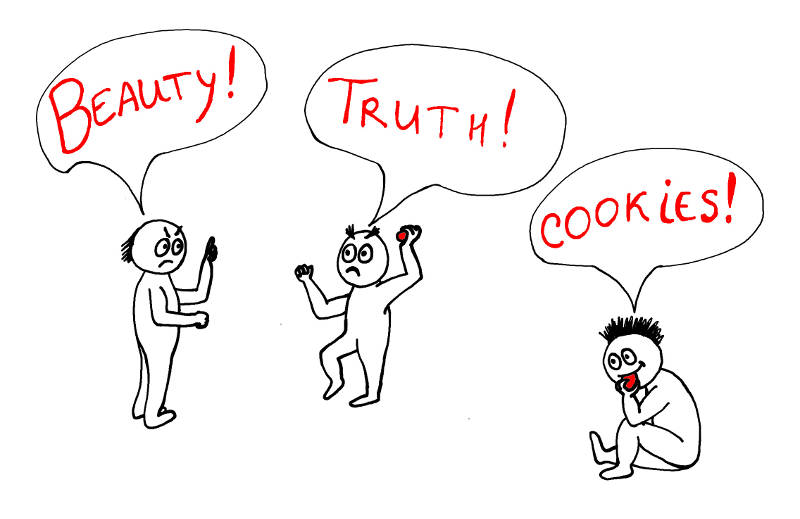
“And even if they were,” Em continued thoughtfully, “discussing them honestly rarely results in changing other people’s opinions. It usually results in increasingly loud arguments, headaches and – in the worst case scenarios – broken bones. I tend to confine myself to nodding and smiling when values are discussed. It’s the wisest thing to do, in my opinion. Hmm…”
Therefore, in Sunny’s opinion she was a fish in an acute need of an umbrella.
You thought I would never get to that explanation, didn’t you? But I did!
***
Sunny suddenly felt hungry. Was there anything left in the fridge? She sneaked back into the kitchen. As she was passing the door of one of her neighbours, Mrs Pots, she distinctly heard the floor creak.
“Oh-oh, she is up,” thought Sunny. The idea of being caught in the kitchen and talked at for half-an-hour about the weather (bad), neighbours (also bad, but mad and ugly as well), prices (high), shopping (list) and other such topics filled her not so much with dread, as with a sense of heavy, hopeless boredom. Mrs Pots’ conversations were interminable and their content immutable, her thoughts going around several small circles which Sunny knew by heart. She attempted to ask the old lady about her past several times, just to vary the routine, and Mrs Pots seemed to try to focus on the question, but, in a few sentences, the conversation slid off the topic back into its familiar rut.
Once, when Sunny asked Mrs Pots about the Great War, she found out that in her youth Mrs Pots was a nurse. Momentary pride flashed in the old woman’s eyes, she seemed to straighten and come to life for a moment, as she talked about bandaging wounded soldiers. Her eyes dimmed as she talked about covering dead ones with bedsheets. And then she talked about hunger, once again alive with the visceral memory.
“Hunger was always there,” said Mrs Pots in a quiet, rasping voice, “Not always painful, but always there. You couldn’t fully concentrate on anything else… I am sure “her next door” is taking my sugar. Have you seen her in the kitchen this morning, Sunny? There are at least three spoonfuls missing from the basin! I wouldn’t mind if she asked to borrow it, you know… but denying that she took it – that’s stealing, that is! I will have to go to the shops and get a loaf and some milk today. And maybe some biscuits… Yes, I think some biscuits would be nice… and I need some soap… “
It was frightening, watching the light go out of Mrs Pots’ eyes and expression out of her voice, she was turning into an empty ruin right in front of Sunny. She mentally tuned out the droning lifeless voice. Sunny could not figure out if her neighbour used this mental noise to drown out unpleasant thoughts and memories or if, through endless repetition, the trivia made such inescapable connections in her mind that she was no longer capable of veering off the familiar train of thought, one topic following another endlessly and pointlessly. Sunny wondered if Mrs Pots dreamt of neighbours, prices and shopping lists in the same terms. That was a depressing thought… On the other hand, maybe she dreamt of bright colours, lacy parasols and light dresses, warmth and laughter. Maybe she kept that joy and lightness for her dreams, guarding it jealously against any intrusion by the daily drudge of poverty and loneliness… Sunny quite liked that explanation, but it didn’t mean that she was prepared to be talked at by Mrs Pots.
Sunny’s other neighbour, Mrs Pearl, otherwise known as “her next door” whom Mrs Pots accused of stealing her sugar, had a distinct advantage of being a lot less talkative. She was about the same age as Mrs Pots, but smaller, trimmer and generally more presentable. While at home, Mrs Pots always wore slightly grubby pastel-coloured house-robes covered with variously stained aprons (Sunny couldn’t work out how that was possible, as she seemed to be permanently washing clothes). Mrs Pots also wore balding furry slippers that were several sizes too big. She couldn’t lift her feet for fear of the slippers falling off and had to shuffle along the corridors, making dry, rasping sounds which reminded Sunny of slithering snakes. Mrs Pearl, on the other hand, wore clean, ironed dresses with immaculately starched lace collars, even to the kitchen. Her hair was brushed, her shoes – polished, and her face – made up. When she spoke, she spoke quietly, briefly and to the point. She used words sparingly, with careful precision, her voice becoming harder and even quieter when speaking to Mrs Pots. Sunny sometimes thought that she must have been a teacher, but Mrs Pearl did not like to talk about her past or answer questions. On her own, she seemed sad and fragile, and Sunny gave up on asking, she had a fantasy of the old lady shattering, like a china doll, if pushed too far.
Sometimes Mrs Pearl gave Sunny biscuits and watched her eat them with a sad, wistful expression. It felt a little awkward, but the biscuits were worth it. Mrs Pearl also had books in her room. She showed them to Sunny one day with somewhat timid pride, as if revealing a guilty secret. They were mostly romance novels, old, with beautifully engraved plates depicting overdressed ladies fainting among roses in gardens, wild-haired youths staring at the horizon, evil uncles hoarding money and so on. Sunny loved leafing through these books, looking at the pictures, but not really reading them – they seemed a bit dull. Mostly, she treasured the quiet peacefulness of her neighbour’s room. It was a place of escape when Sunny’s room was too noisy, busy or full of drunk guests and parents, the kitchen was full of the perpetually talking Mrs Pots, the bathroom was full of steam from washing and the toilet was full of stench. It was a place to curl up in an overstuffed armchair covered, like everything else in the room, with crocheted doilies, leaf through a book, think and munch a biscuit or two. It was a place where she could be alone.
Sunny was a lonely child, resigned to her loneliness. Sometimes she wished for a brother or a sister or for a real friend close to home. But today – oh, today Sunny had a room all to herself for the whole day. Being alone is much easier – and more pleasant – when there are no people around to make demands and interfere. So, instead of raiding the fridge as planned, she grabbed the remaining bread, a pat of butter and the salt shaker and rushed back to her room before the door was opened.
“Made it. Where was I?” thought Sunny, settling on the windowsill and chewing her butter-and-salt sandwich.
Chapter Three
Where the umbrella verse problem is solved and some extraneous characters are discussed at length.
Sunny passed Molly and Polly, who were discussing what colour shells are being worn this season. Mr. Crabby – an old crab who lived nearby – was sidling away from them as fast as he could, muttering under his breath. All Sunny could hear, as she was passing, was, “…silly chatterboxes…” She pursed her lips, since she knew that one is not supposed to talk badly about others. Incidentally, it also helped Sunny to hide a smile, for she secretly agreed with Mr. Crabby. Molly and Polly really were too much!
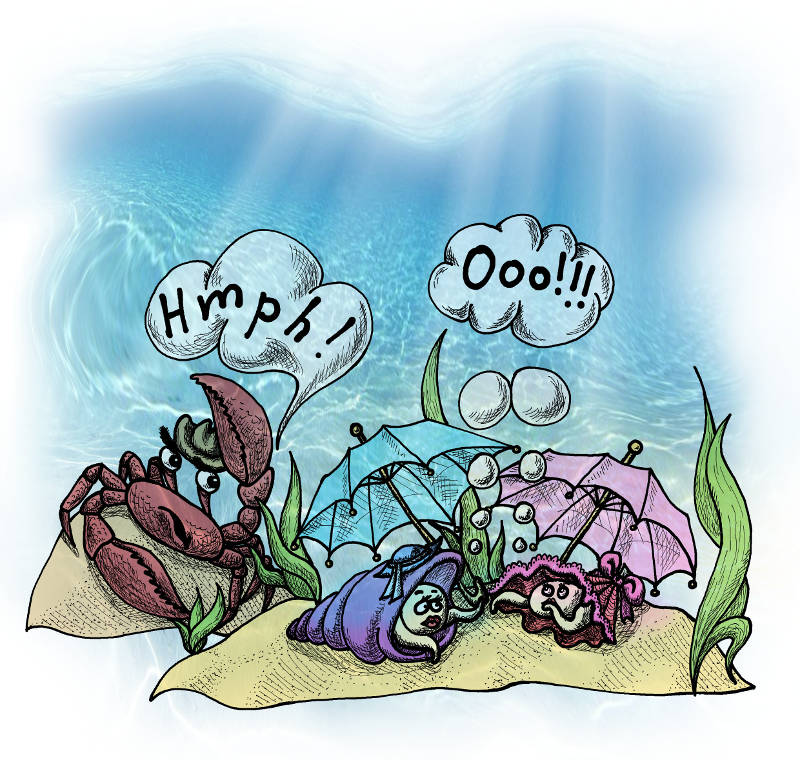
Sunny first met Mr. Crabby at the funeral of an old hagfish nobody liked. An officious lungfish was limping through a traditional litany of laudatory platitudes about the deceased. It doesn’t really matter what all of this means – it just sounds nice. This, funnily enough, also applies to most official speeches. If you have to attend one (you can’t just go to one – maybe because you wouldn’t want to go – you have to “attend”; and attending a speech doesn’t mean “paying attention” at all – it just means going there -oh, boy!)… anyway, it’s best to bring a hankie to speeches – they are brilliant for hiding yawns.
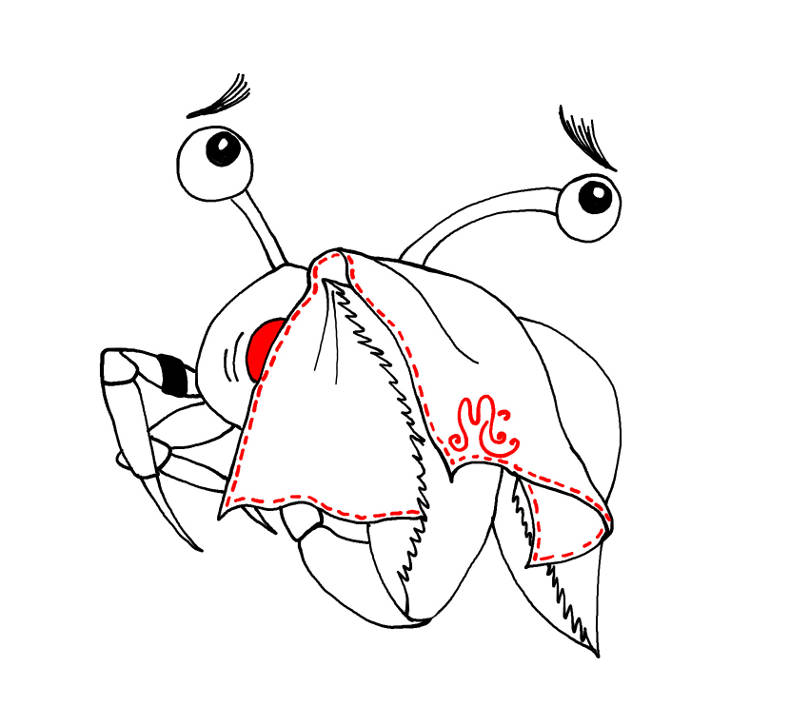
Back to the story. The audience looked appropriately bored. Mr. Crabby was muttering then as well, something to the effect of, “Dying doesn’t actually change the old hag into having been nice up to this point… it might make her more tolerable from now on…” Sunny had to purse her lips then as well.
Mr. Crabby’s muttering was always worth listening to, which was rather odd, since aloud he was an extremely serious-minded gentleman who never chatted about trivial matters. He discussed serious subjects, such as politics and the price of air. Sunny heard him once explaining to Mrs. Crabby that, while he did not actually breathe air, he heard that it was becoming quite expensive underwater. He believed that it was because of sea lions swallowing the lion’s share of it – what else do you expect if you let mammals live in the ocean?
Sunny wasn’t quite sure why the price of air was considered to be a more serious subject than the colours of umbrellas. She asked Em once and he explained that the seriousness of a topic of conversation was determined by everyone agreeing that it was serious.
Sunny remembered this explanation and imagined a hall full of crabs voting for the seriousness of various topics. A chaircrab at the podium announced the topics, such as “PRICE OF AIR” in a solemn, booming voice and all the crabs who agreed that it was serious raised their claws in dignified silence.

The next topic, “MAMMALS – ARE THEY GOOD FOR YOU?” was passed as serious almost unanimously. However, when the topic of “CRAB SHELL COLOURS” was raised, it became impossible to decide who voted for its importance. A few general remarks about the obvious advantages of one colour or the other from various parts of that august body caused so much shouting, spitting, claw-waving and, regrettably, hitting of neighbours with hats and briefcases, that the chaircrab lost his voice, his patience and the end of his gavel while trying to call for silence. After that incident, the topic was declared to be trivial, unimportant and not worthy of a general discussion. The crabs picked up their briefcases and hats, while avoiding each other’s eyes (quite difficult, when your eyes are on stalks waving all over the place), and sidled from the hall of Sunny’s imagination in a straight line and dignified silence, almost none of them limping.
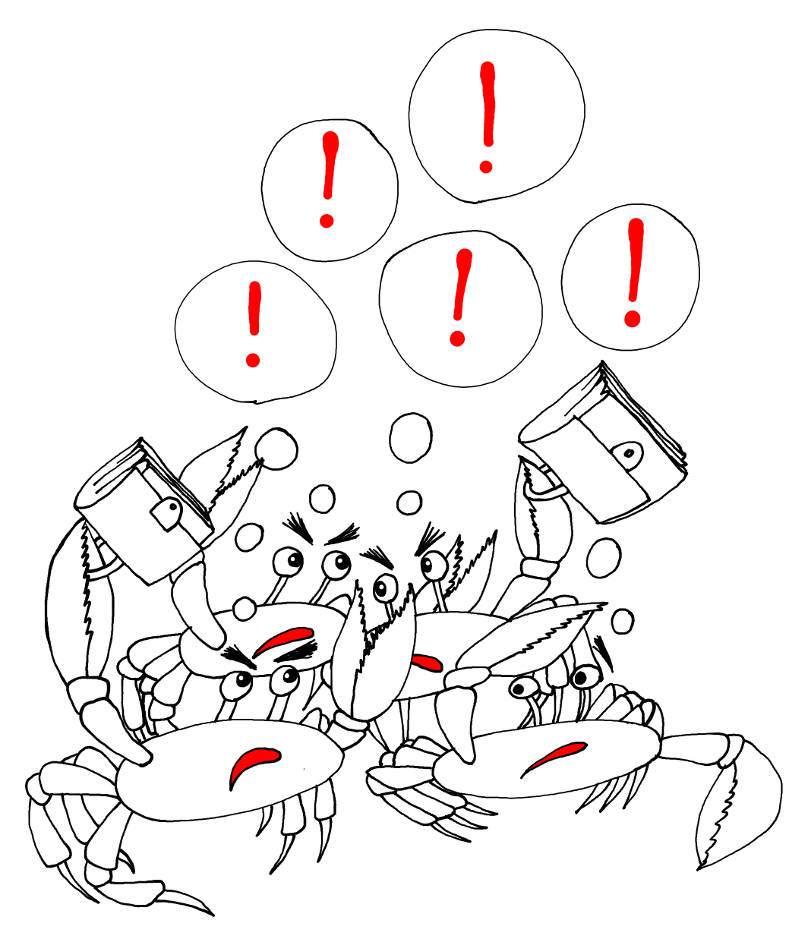
Sunny giggled to herself and returned to reality. She waved to the shellfish, pausing to admire their umbrellas. And then it came to her – not too silly, not too boring, but just right,
“Pink shellfish called Molly
liked pretty blue brolly.
Blue shellfish called Polly
liked pretty pink brolly.
Both Molly and Polly,
they each got a brolly.
Pink Molly –
blue brolly;
blue Polly –
pink brolly.
Now isn’t it jolly
For Molly and Polly?”
a perfect umbrella song, don’t you agree? Sunny did have to swap the colours of the umbrellas for the song. Molly actually had a pink umbrella and Polly – a blue one, but Sunny thought it was a bit dull that way. Poetry only really has to have a modicum of truth at the core – the frilly bits around the edge are quite often a big fat lie.
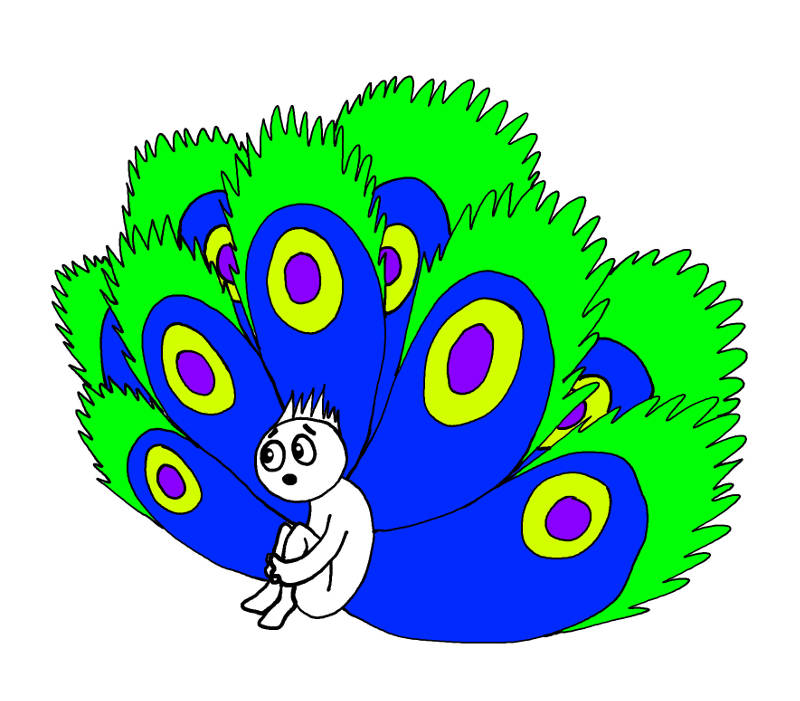
Right next to the main road Sunny was stopped by Willy and Nilly – two anemones living on the next dune. They were brothers and constantly bickered about something. Actually, that’s wrong: they constantly bickered about everything. Sunny was amazed by their ability to create arguments out of thin air, it was almost like magic. But then she reasoned that, since the brothers were rooted to the spot (anemones usually are), this was their version of a competitive sport. If bickering was an event in the annual Seabottom Olympic Games, they would come top. Or not come at all, because they wouldn’t be able to agree on the topic for their argument.
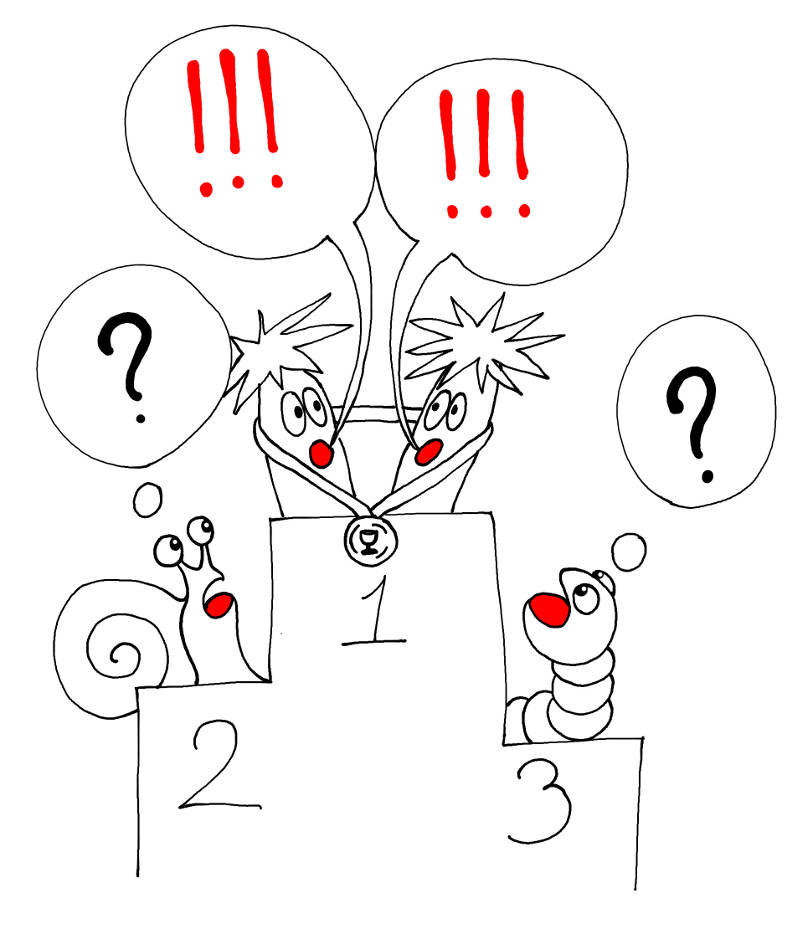
This time, the quarrel was about who had longer tentacles.
“Hey, Sunny! Tell this dimensionally challenged brother of mine that my tentacles are longer than his!” yelled Willy.
“Oh, no, they are not… you… challenged yourself! Tell him, Sunny!” retorted Nilly.
Sunny paused to give the question some thought, but was interrupted almost immediately by Willy, “Come on, Sunny, what do you think?”
“I don’t know yet, you wouldn’t give me a chance to think! About the same length, I suppose…” replied Sunny. She thought that they would both like that answer and besides, it was probably true. Boy, was she wrong! Both Willy and Nilly snorted in unison.
“You have no idea what you are talking about, do you?” said Nilly.
“Shouldn’t have asked a girl anyway,” jeered Willy, “girls are stupid – sitting around thinking all the time!”
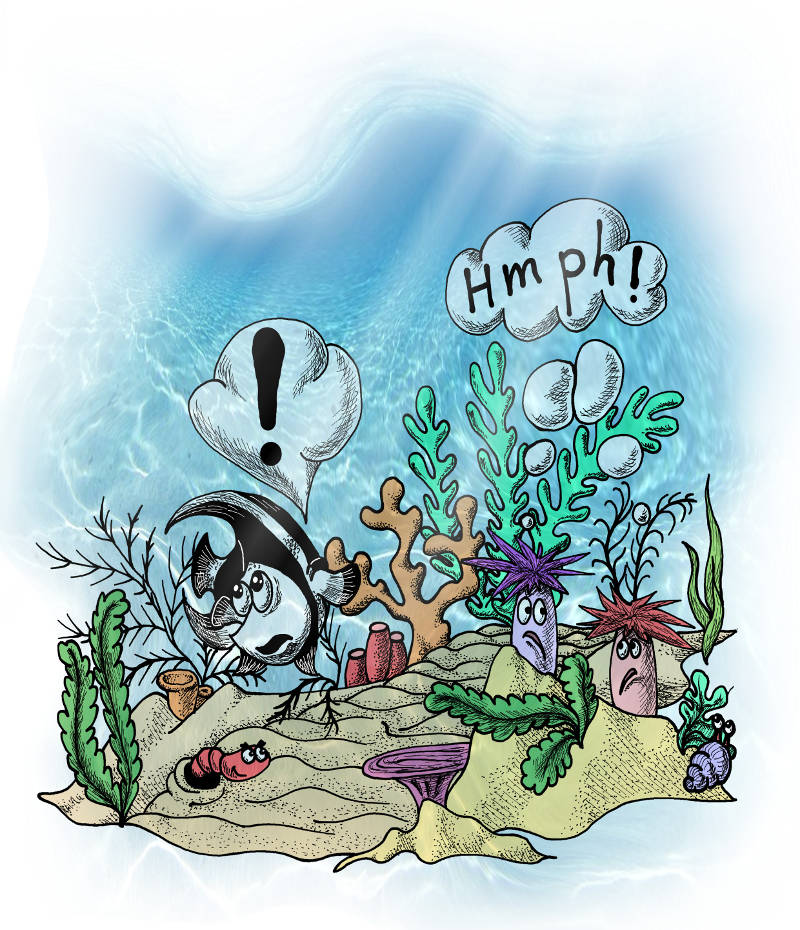
Sunny shrugged her fins and swam on, thinking that there is no way to please everyone – or, sometimes, even anyone. She rhymed somewhat vindictively, as she swam,
“Boys will be boys:
Violent toys,
Shout and fight
To prove they’re right.
Fight with a stick –
Dirty and quick.
Fight with a gun –
Safer, more fun.
Fight with a bomb –
Gives you aplomb.
Big enough blast –
Fame unsurpassed.
Hand on the trigger –
Bigger and bigger.
Big enough toys –
There won’t be boys.”
***
Simon was awake and alert in a flash, his heart thumping. It must have been an unusual sound that interrupted his sleep. He listened with painful intensity, keeping his eyes closed and his body still, willing his heart to slow down. You should know more than your enemy about the situation, that way you can catch them unawares, that way you can survive. Simon was not thinking in those words – his body was thinking for him, his experience was more compelling than reason.
Simon survived the death of his village by keeping still, keeping his breathing soundless and shallow under the pile of rugs while men in vaguely military clothing were walking along, methodically searching for survivors. When the night came and he started shivering from cold, Simon came out. Everything he ever knew was gone. The huts were burned, people and dogs – shot, domestic animals and meagre supplies taken. He did not know who attacked the village: government troops, the people’s militia, freedom fighters or one of many semi-organized bands creating little fiefdoms in the chaos of civil war. He didn’t care.
Simon didn’t care much for anything. His father used to rave and rant about law and order, about the need for a strong government to root out all those rotten foreign influences that threatened their traditional way of life. Spittle would form in the corner of his mouth and he would stop his rant to clear it, and, as he bent to spit on the dusty ground, it would turn into a dry cough, racking his emaciated body. He probably did not have long to live anyway, he seemed to be kept together by the habit of daily work and stubborn hatred of almost everything, which had also become a habit. He didn’t hate his family, but didn’t seem capable of any other emotion either. Simon’s mother told him that his father loved her once. It was difficult to imagine, but maybe his love also became a habit, for there was very little space in the daily routine for anything else. He worked in their tiny field in growing season, walking for miles every day to get the water he needed for the crop, and spent the rest of the time repairing the mud hut, which seemed to be falling apart as fast as it was built. He became even angrier when one of his two surviving sons, Simon’s older brother, left to join the rebels at the age of thirteen. Simon’s brother used to talk to him about freedom and justice, and that may have been the reason he joined – or it may have been the only way for him to escape hunger and fear. He was now the one with a gun. But Simon stayed, mostly because of his mother. As his father became the embodiment of anger, she became the embodiment of grief. Five of her children died in infancy, two were stillborn from malnutrition, one – gone with the rebels, only Simon and his little sister left for her to cry over. No more. Only Simon was left, with no one to cry over him.
Simon opened his eyes slowly, peering from under impossibly long eyelashes. He was a handsome boy with large brown eyes and curly black hair, which worked to his advantage. There was no trace of the sound that wakened him and no strangers in the tent. A woman with two children of her own was sleeping quietly, her girls huddling up to her. Their grandmother was snoring gently, her wrinkled lips sinking deep into her toothless mouth with each breath. Sunlight was breaking through the slits and holes in the decrepit tent, heating up the sheets of golden dust in the air. It will be a hot day.
Simon’s tension drained away and he felt hungry and thirsty. Time to get up. There was more food in the refugee camp than in his village and the water was closer at hand. He picked up a plastic canister and walked to the pump, drank his fill, filled the container and took it back to his tent. Filling the canister somehow became his job after he joined this small family group. Just as his joining, it happened by tacit agreement, without words. When he arrived in the camp, starving and terrified, the woman called Ama offered him a drink. He stayed in her tent because he did not know what else to do or where else to go. She did not kick him out when the night came. He followed her to the water pump the next morning and watched her fill the canister. In the afternoon, her daughters showed him where to queue up for food and how to get back to their tent quickly, avoiding being seen by larger boys who would take their share away. The next morning he woke up first, took the canister, filled it up and brought it back to the tent.
Today was pretty much like any other day. There was not much to do in the camp. After getting water and food, Simon went out to play with the other boys. They were playing “Simon Says”, which needed less energy than “It” and was played more often, as they were a little hungry most of the time. Simon almost always ended up having to invent and shout out the instructions. He didn’t particularly like to, but the other boys insisted, initially because of his name and later on because he was quite imaginative, and good at coming up with ideas of what to do. Paradoxically, he obeyed.
Remembering his past life, Simon sometimes thought that his village lived by the rules of this game. The succession of people with guns, who controlled the village, ensured that, if you didn’t do what somebody told you to do, you lost – your life, more often than not – and the lack of resources ensured that, if you did what nobody told you to do, you lost – to hunger – for you spent the precious time you could spend on finding and growing food on something non-essential… It was ironic that now that he had lost all he had, Simon, almost against his will, was the one issuing instructions. And it was just as dull as obeying them. Simon was getting distracted, looking around for something more interesting to do. Suddenly, a flash of light in the sky caught his eye. He stared at it and, as it got closer, it resolved itself into a giant silver balloon high in the sky. Simon didn’t know what a weather balloon was. In fact, he never saw a balloon before. But it seemed so magical, serene and free, completely safe high above the world…
Chapter Four
In which Sunny meets Simon and the adventure begins in earnest, in Reeftown and beyond.
Sunny forgot about the anemone brothers almost immediately. Do you still remember them? Willy and Nilly, we met them in the last chapter, along with Polly, Molly, and Mr. Crabby. She was swimming along happily, saying “Hello!” to everyone she passed, and singing a silly little tune,
“Hoppity-hop,
Sunny went to the shop;
skippity-skip,
Sunny went to the ship;
boppity-bop,
it’s a skip, jump and hop!”
when suddenly, upon turning around a corner of the road, she was transfixed with wonder. Wonder is probably the best thing to be transfixed with, if you have a choice, but you don’t really expect it to happen on an ordinary morning.
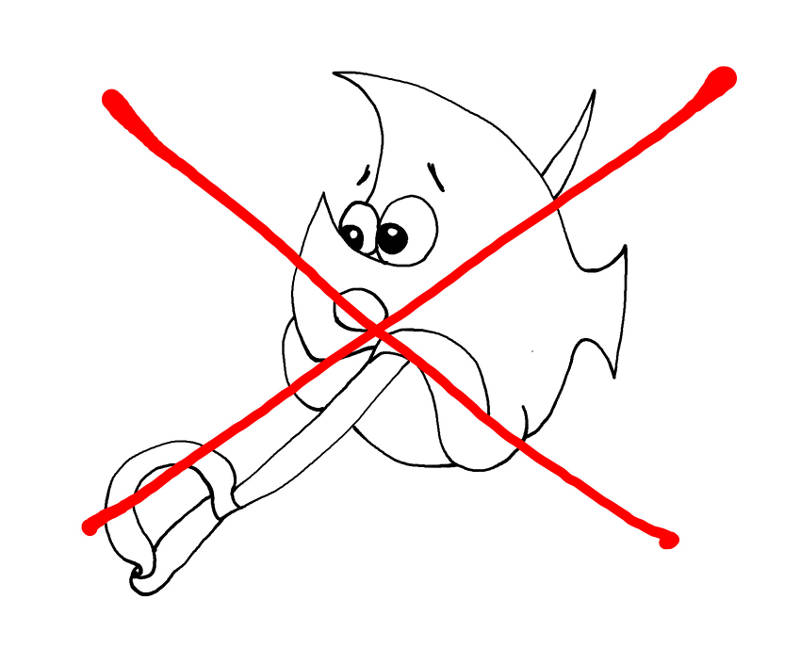
However, on that particular ordinary morning Sunny saw something extraordinary. Funny things, words. “Extraordinary” doesn’t actually mean “more ordinary”, like “extra sweet” means “more sweet”, “extra long” means “longer” and “extra virgin” means nothing at all, in spite of being used quite frequently. “Extraordinary” actually means “not ordinary at all”.

Do you still remember what we were talking about? Right, Sunny saw something extraordinary. There, in front of her was a bunch of… things – huge, round, perfectly formed, the colours of the brightest coral, straining at their strings as if they were alive, focusing stray shafts of sunlight and scattering them haphazardly as colourful sunspots on the seafloor!
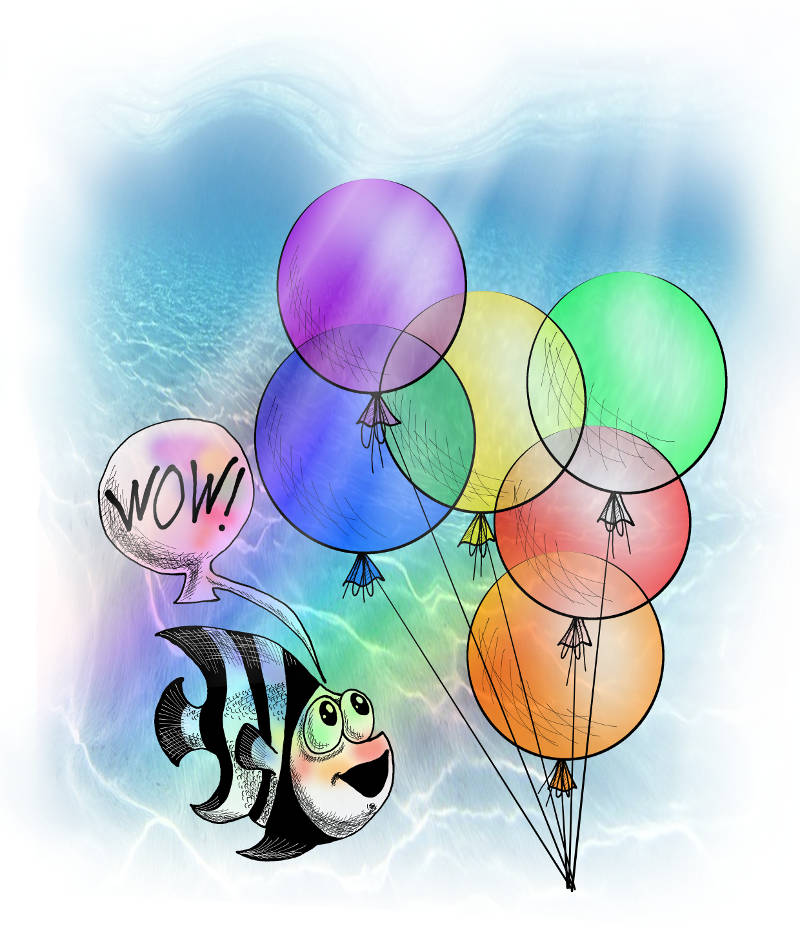
Sunny had never seen balloons before – they are quite rare at the bottom of the sea. She thought them amazingly beautiful. A slithery little fish that looked like a small dragon was carrying the bunch in one fin. He was concentrating on propelling himself along the seafloor with another fin and failed to notice a sharp piece of coral ahead. As he approached an overhanging branch, it touched one of the balloons. It exploded with a loud “BOOM” and broke into a shower of bits. And broke the spell. A little rag of coloured rubber sank slowly and sadly to the seabed.
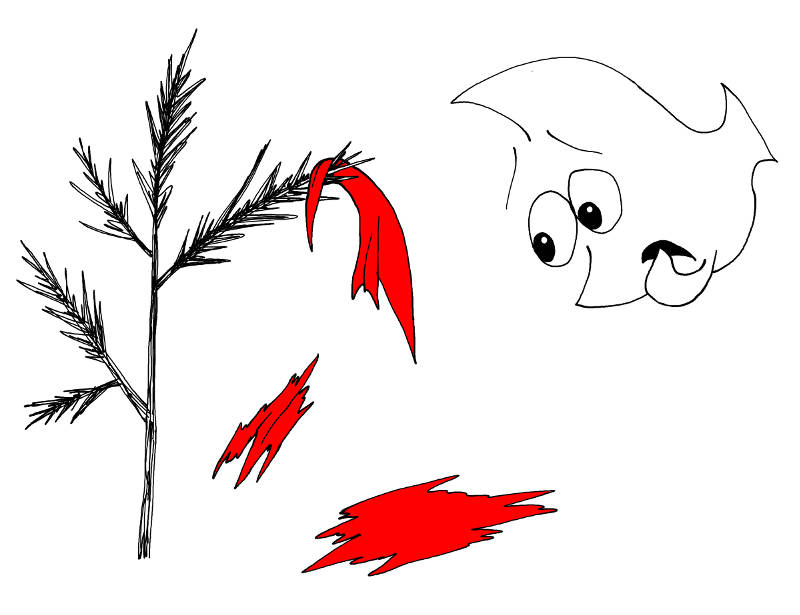
After tracing its progress, as if hypnotised, all the way to the bottom, Sunny pointed at the remaining balloons and asked, “May I have one of those? They are so bright and beautiful and I would very much like one.”
“Balloons. And no,” replied the strange fish rather abruptly. “I need them to learn how to swim.”
Sunny was so surprised, she almost forgot about the balloons. “What do you mean – to learn how to swim? You are a fish. Fish know how to swim.”
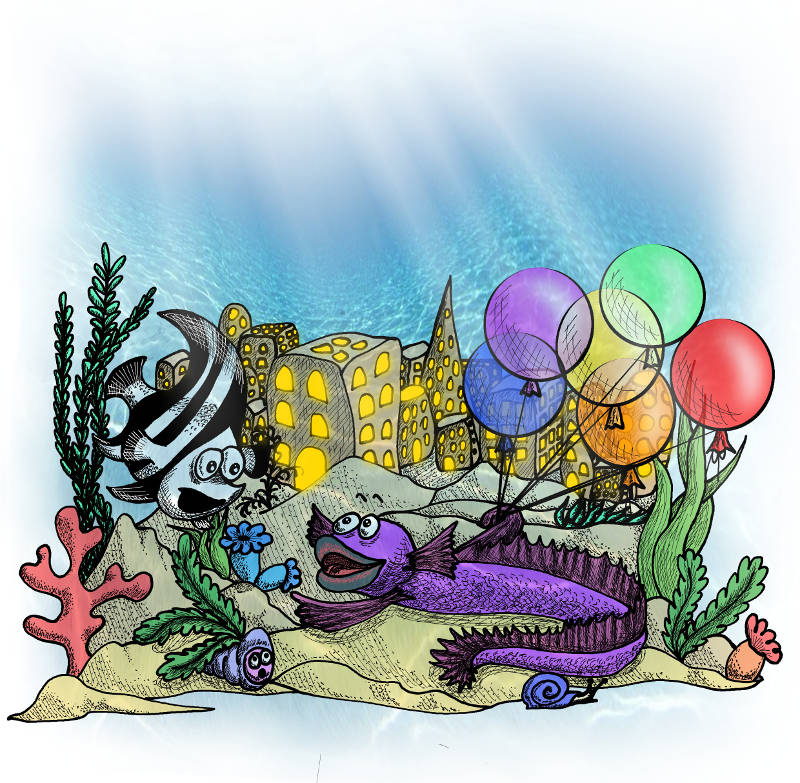
“Well, I don’t,” said the strange fish crossly. “If I hold my balloons, they pull me up and help me float. I am doing rather well with them, though I still need to work out the controls. Turning is going quite well if I use my tail, but going up and down is a problem…”
“I see,” said Sunny, though she didn’t see at all. Did you ever notice how people often say “I see,” while waiting for others to finish speaking if they think they themselves have something interesting to say? They never say “I hear,” which, I suppose, proves that people are fundamentally honest. “How about this – if I help you learn how to swim, would you give me a balloon?”
“Sure,” answered the strange fish. “If you do that, you can have them all. By the way, my name is Simon. What is yours?”
“Sunny,” replied Sunny and blushed. She was embarrassed about forgetting to introduce herself. She knew that polite fishes always introduced themselves, but she was so busy looking at the balloons and then being amazed by a fish that cannot swim, that she totally forgot about it. “So, how come you don’t know how to swim?” asked Sunny, to cover up her embarrassment, satisfy her curiosity, and maintain the conversation which might, just might, result in her getting a balloon. It is amazing how much one sentence can reveal – or conceal – or achieve – or all of the above, isn’t it?
“Well, you see, I escaped from a game. You know the game of Simon says? People often play it at parties. Well, I am Simon.”
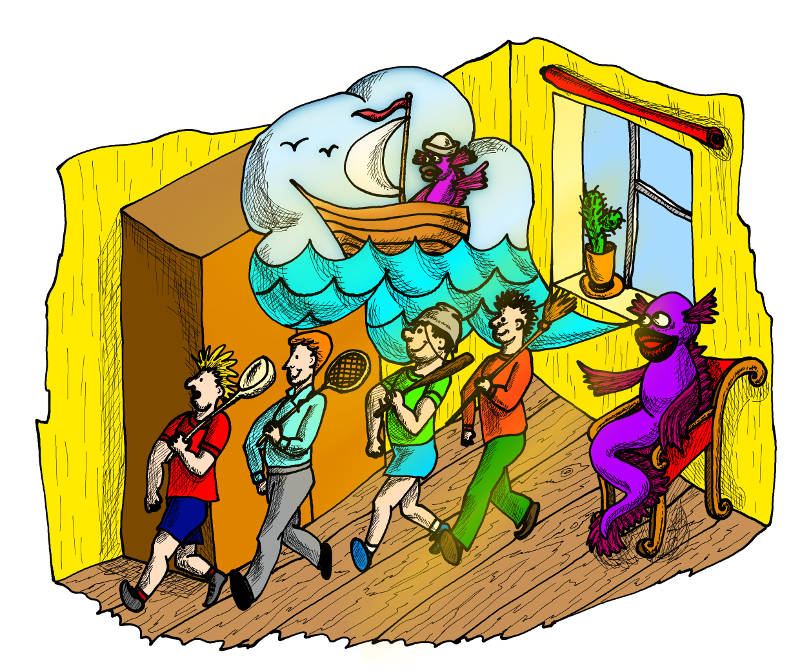
“I don’t,” interrupted Sunny, who was getting more and more confused, “I also don’t know what a party is.”
“There is no reason you should,” smiled Simon. “A party is a part of the human mating ritual, usually an uncomfortable place where you talk to unfamiliar people about uninteresting things. The game is usually played by a small group of people. When one of them yells, “Simon says – do this!” they all do it. Whoever doesn’t do it is out of the game. If the leader does not use the words “Simon says” and someone does it anyway, they are also out of the game… I didn’t say it was a good game, did I? Anyway, I never needed to swim, just to tell people what to do. It was fun for a while, I guess. Playing by the rules makes games more interesting. But the others went away after the party and I remained. I realized that I wasn’t just playing by the rules, I was living by the rules. Even worse – I was living by other people’s rules that I did not agree to or even like. That’s when I ran away to sea. And, when I arrived here, I realized that I don’t know how to swim, which is rather embarrassing for a fish…” after a brief pause, Simon looked up at Sunny defiantly, as if challenging her to laugh.
Sunny felt quite sorry for him, though it was a little bit funny. He was running away from his home, all alone and lost in a world he did not understand. She knew how he felt. A few years ago, after escaping from the remains of the Great Barrier Reef, where a vicious civil war claimed the lives of her parents, she was in the same position. Her father was killed in a street skirmish and her mother died soon after. She died from illness fed by hunger, the little food available given to her child. Between the factions confiscating food “for the war effort” and looters stealing it without an official permit, many around her died that way. Hollow-faced, hollow-chested inhabitants of the city buried the corpses and shuffled on, too hungry and tired to think or feel. One of the last things Sunny’s mother told her was to leave the ruined city and go.
“There is no food, kindness, or decency left here. The war destroys morals faster than buildings. If you stay here, you will have to become a victim or a marauder. I would hate either. There must be a place where one can lead a decent life left somewhere in the world. Go and find it.”
And Sunny went. She felt empty and numb and curiously light. There was nothing and no one left to care about, just the disembodied words of her parents, her intangible heritage. Sunny cared for words and not much else. She wasn’t even frightened very much, she had nothing to lose apart from her life which, like the lives of those around her, didn’t seem to be worth much. She swam through the ruins of the city, light and empty, like a balloon without a string…
The thought of balloons brought her back to reality with a jerk. Sunny pursed her lips and decided to help the strange fish. The fact that there was a balloon in it for her did not hurt either. Sunny opened her mouth to explain how to swim, and realized that she had no idea. She always did it, but never knew how to do it. It is exactly like walking – if you attempt to explain it to someone you will see what I mean.

After opening and closing her mouth a few times with a loud sound (try it, it sounds something like “pa-pa-pa”) she proposed that they go along the sea floor and see if they could find someone to explain swimming to Simon. And so they did.
As they moved, Sunny kept glancing up at the balloons. But even when she was not looking at them, they swam in her mind, round and perfect, forming into a song,
“I like balloons,
they look like moons;
they shine like spoons
in deep lagoons;
they smell like blooms
they taste like “BOOM”s;
they sing a tune
like carp in June!”
With so many “oos” in it, the song couldn’t help but be round, see?
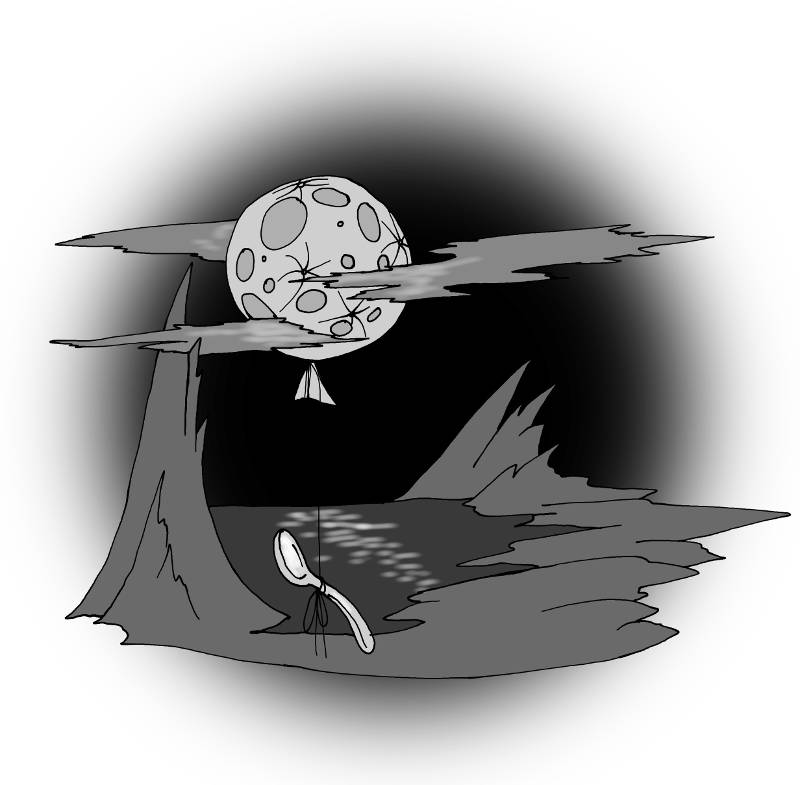
***
“Hey, Simon, you’re out!” The loud announcement, accompanied by a thump on the arm, brought Simon out of his reverie. He must have missed his turn. Oh, well.
Simon turned and walked away without a word. He was not exactly friends with the other children in the camp. It was not at all like his village, where there were people he had a reason to like or dislike, people he knew. Here, in the camp, they were all strangers. Some people he thought were good, some – evil, but all – strange. “Strange” is the root of the word “stranger” and a stranger is someone you do not understand. When you see people in terms of good and evil, their motives are incomprehensible and their actions – unpredictable. You create angels and daemons out of them and then blame gods for your childish nightmares… Simon was getting used to this strange new world. He watched people around him with dull indifference, accepting alienation as the backdrop of his new existence. He didn’t even know the names of most of the other children, Simon realized with astonishment.
He noticed that the weather balloon was still visible, a bright spark in the blue sky. He walked towards it, forgetting about the game. Oh, how he wished he could fly up there, towards that shining beacon, safe and free…
Chapter Five
In which Sunny and Simon meet a swordfish, who wants to teach them how to fly and promptly flies off the handle.
At the edge of town Sunny and Simon met a swordfish. See, I got to the point right at the beginning this time! He was holding a flower in his mouth (I don’t know where he found a flower in the sea either) and looked friendly.
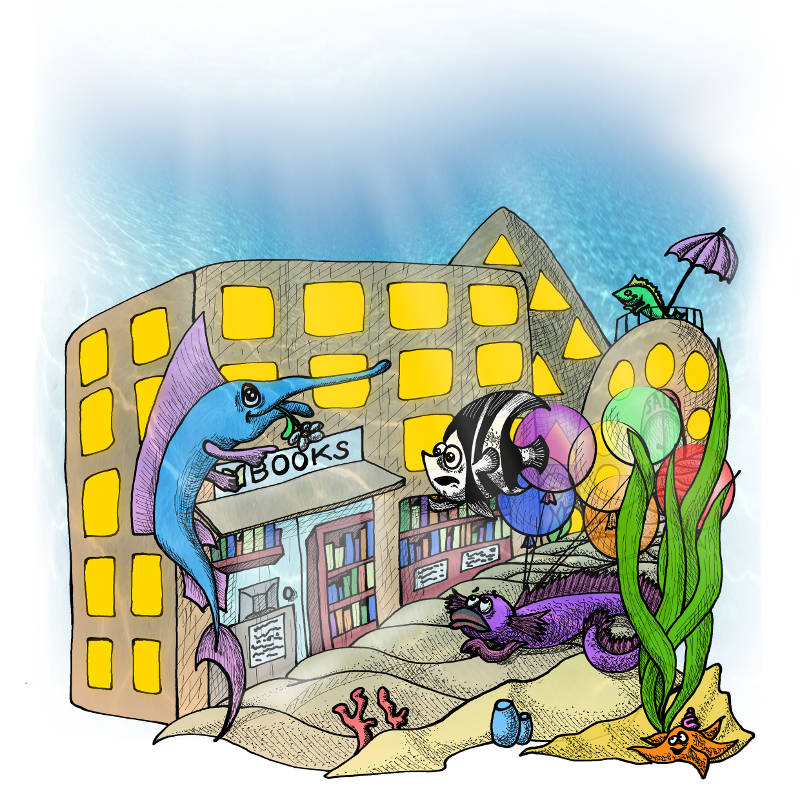
“He looks likely,” thought Sunny and asked him, “Excuse me, Sir, can you explain to my friend Simon how to swim, please?” She was sure that no one would be able to refuse such a polite request.
The swordfish turned to them enthusiastically. “Who wants to swim!” he exclaimed. “Anyone can swim! You want to learn how to fly!”
“Actually, we don’t…” started Sunny, but she couldn’t finish because the swordfish launched into an explanation at a speed sufficient to escape Earth’s gravity and send him into a world of his own.
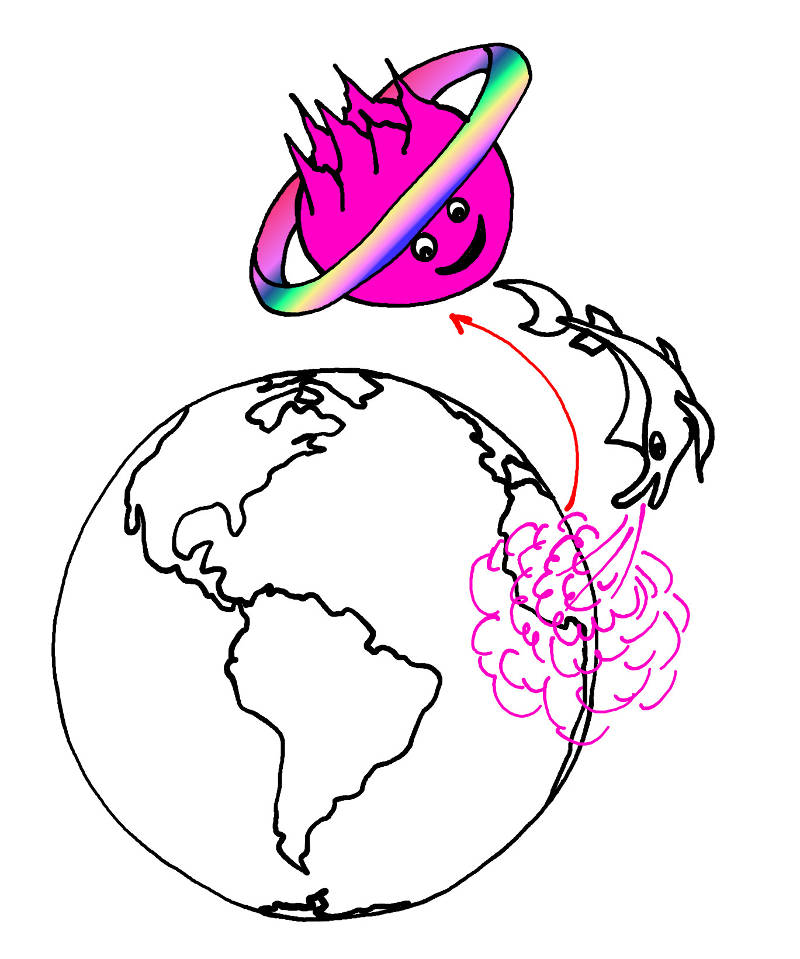
“First, you need to clear your mind. Your thoughts must be high and light and pure. I suggest ascendental meditation – invented especially for flying by the Mariana trench monkfish, you know! The most important thing, though, is that you have to believe in yourself and believe you can fly. Just like I believe I can fly. I never actually tried flying, but I am really good at believing that I can. You can do anything if you believe you can, you know! And then you need to go up to a mountain and launch yourself into the air…”
“Wait a minute, interrupted Sunny. Her common sense, which was, under normal circumstances, dozing peacefully in the comfortable warmth of the somewhat disused recesses of her mind, woke up with a start. It was feeling like it was being drowned in cloying pink syrup and feverishly started looking for a way out or, failing that, a slice of lemon. “We cannot go to a mountain, we are fishes, we would die out of water!”
“It is the mundane, heavy thinking of people like you that stops us from being able to fly!” snorted the swordfish.
Sunny was becoming quite annoyed. “So, how many fish that went out of water and survived do you know? All the ones I heard about died very soon if not sooner!”
“Oh, those are just isolated incidents. You cannot generalize from them. They probably did not believe in themselves enough… Yes, that must be it!” brightened the swordfish.
“It’s uncanny how those isolated incidents leading to unfair generalizations happen so regularly, then!” answered Sunny with uncharacteristic sarcasm. Her common sense was still screaming for help at the back of her mind and at the top of its lungs.
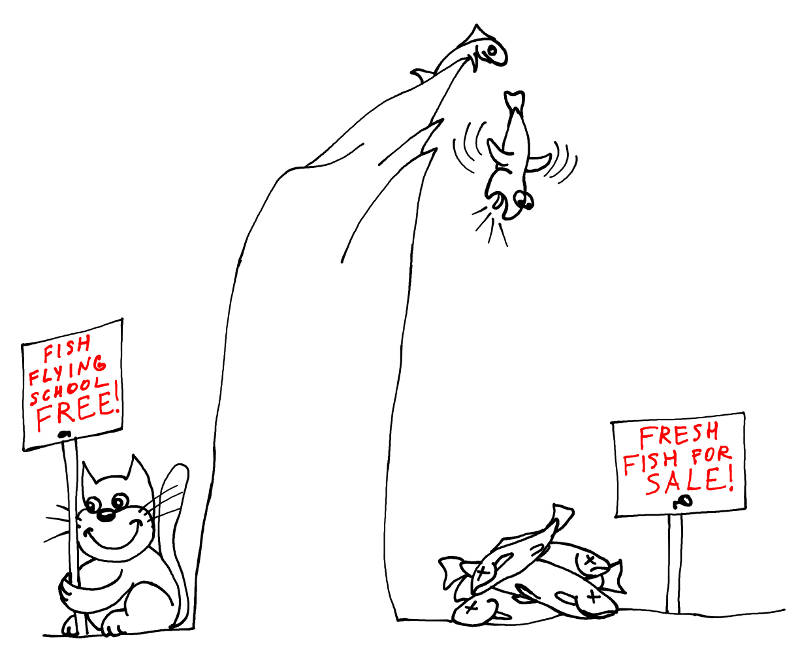
After a brief pause, during which the swordfish attempted and failed to come up with a response, he snorted loudly, turned around, looking as offended as he could manage at such a short notice, and swam away without looking back.
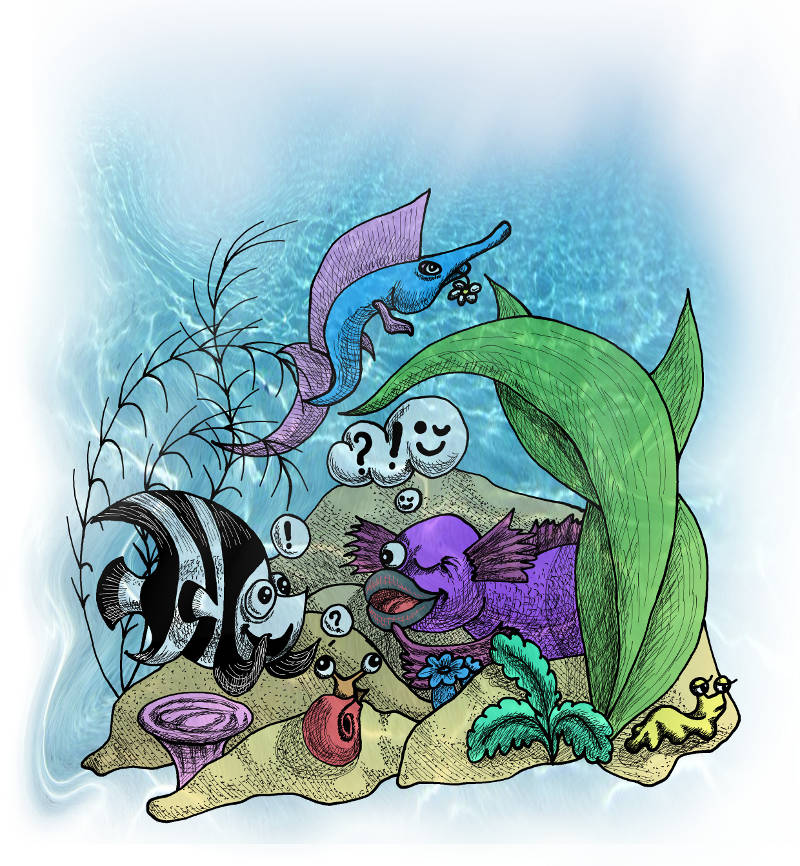
“That fish seemed rather silly,” said Sunny turning to Simon.
“Sillious,” replied Simon.
“What?”
After looking at Sunny’s uncomprehending expression, Simon explained, “You know how most people look quite silly when they are being serious? It happens so often, I thought there ought to be a word for it. But there isn’t – so I had to make one up. Sillious.”
“Oh, I see!” smiled Sunny, thinking to herself that this funny little fish is rather fun and probably smarter than he looks, “Let’s go on.” And on they went, towards the next stranger.
***
Everything in the camp seemed more extreme than Simon was used to. There was kindness, where people shared their last scraps with strangers, as his new tent family did. There was also indifference and casual cruelty, as well as plenty of violence. Lack of anything to occupy people combined with the lack of resources quickly created gangs. The strong took the food from the weak, the weak banded together to protect themselves, the strong acquired flunkies who received protection and some of the spoils in return for their obedience, and so a society was born. Simon watched from the sidelines, hoping against hope to remain unnoticed. He was lucky so far.
Simon was jerked out of his weary indifference only once, when he joined a small crowd of onlookers watching some boys throwing rocks at a pregnant dog. She had a broken paw and her huge belly made her awkward, so she couldn’t run. She was darting and growling, surrounded by a jumping, yelling crowd, yelping when one of the inexpertly thrown rocks hit her. Blood was running from several wounds, whimpering replaced growling, she was cowering now, no longer attempting to escape the circle of pain and terror.
Simon was watching from the sidelines, as usual, not taking part and not interfering, when he suddenly realized that he was shaking. He thought he must be cold at first, but it was impossible, the sun was at its zenith and it was sweltering hot… Only when he unconsciously licked a drop of salt water from his cheek, did he realize that he was also crying. He did not remember ever crying when not physically hurt before. It made no sense. He didn’t cry when his village was attacked and everything and everyone he knew were destroyed. He never cried for his parents. He didn’t cry when his food was taken from him in the camp, with a few kicks and punches given in exchange. Why did he cry now, watching a strange dog tortured by strange people? Why did he shake and sob, with snot and tears mingling on his face? Maybe this tragedy was the right size to fit into his mind, while the other ones were simply too big. He knew subconsciously that, if he were to let them into his mind, they would overwhelm and destroy it, drown it in all-consuming blackness… But this tragedy was manageable. There was petty, unthinking cruelty, passed down from the weak to the weakest. There were hot, burning colours of dust and blood and harsh, unforgiving sunlight. There were sounds of primitive joy, rage, pain and fear. There was sadness. Sadness for the dog, sadness for himself, sadness for his world and family… There was nothing he could do: not then, not now, not ever… Nothing but tears.
And then a small miracle happened. Actually, it was quite a portly lady, well-dressed and well-fed, which quickly identified her as one of the people running the camp rather than one of its inmates. She ran into the watching crowd, pushing and screaming, grabbed two of the boys throwing rocks and was berating them, almost incoherent with rage. The rest of the boys scattered and the dog dragged herself away, leaving a trail of blood. The lady seemed not to notice, she continued yelling at the captive boys, who were now cowering and whimpering under the onslaught. The crowd was watching the new show with the same degree of interest – or indifference.
Simon, who happened to be near the screaming lady, pulled her sleeve and pointed towards the blood trail, pleading, “Help her, please, she is hurt!” There was no response, the woman was too intent on punishing the wrongdoers. When she started dragging them towards the camp offices, followed by the admiring crowd, Simon stayed behind. He followed the trail of blood and found the dog, dying in the dust. He felt his body shaking and realized that he was crying again.
Simon ran to his tent, grabbed the canister, ran to the pump, filled it, ran to the dog… she was still alive. He poured some water into the side of her mouth, on her lolling tongue, covered with blood and dust. He poured water, little by little, being careful not to choke her. The canister was heavy. It was difficult to hold it at the right angle, especially while crying, with tears making it difficult to see and judge the distance accurately. Simon caught himself wishing it could be over, but could not stop. Stopping would somehow mean the end – not of the dog, but of himself – or of his self… He carried on pouring water slowly and carefully into the dog’s mouth. And then it was over. The tongue stopped moving, the ribs stopped heaving under the skin, the swollen belly became just a lump of meat. The dog was dead. Simon washed his face, smeared with dust and tears, and went back to his tent, dragging the half-empty water canister, half-empty.
Chapter Six
Unhappened conversations.
In a small tidy park near the centre of town Sunny and Simon met a big, serious fish walking her purebred worm. Now that I think about it, “walking” seems wrong. I am not quite sure what the correct verb would be: slithering? swimming? Just pick the one you like best. She was one of those ladies in whom the absence of the first chin is amply compensated for by the abundance of the second one. She was undulating along sedately and did not seem to be in any particular hurry.
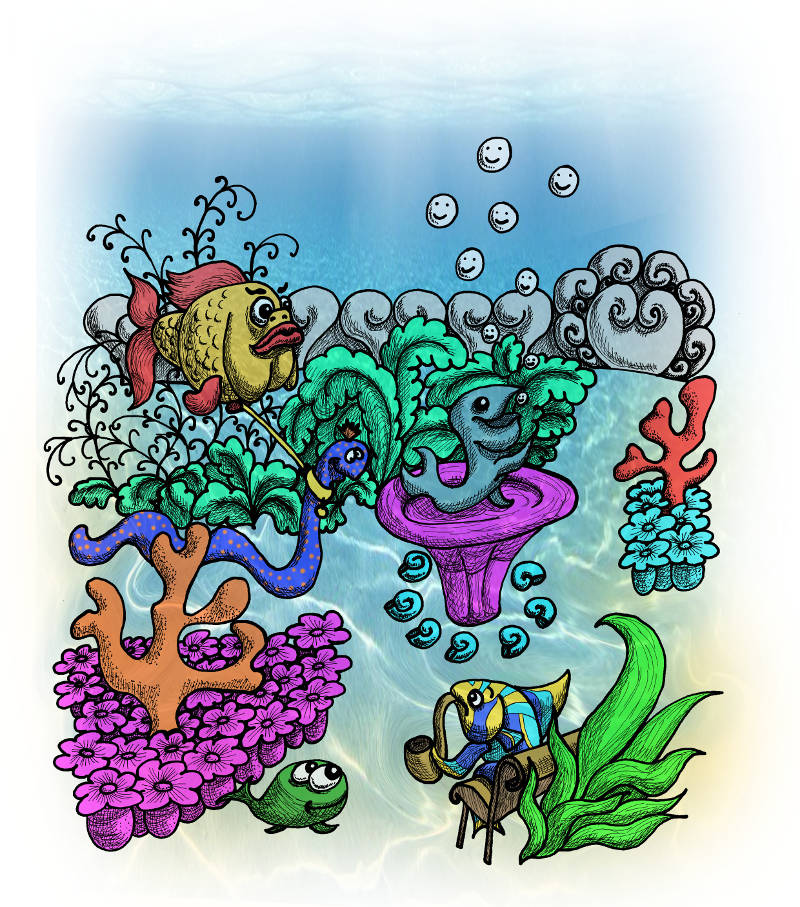
“Excuse me, Ma’am, can you explain to my friend Simon how to swim, please?” asked Sunny once again.
“Are you saying that his parents didn’t even teach the poor ugly thing how to swim?!” gasped the big fish, horrified. Simon opened his mouth to object, but didn’t have a chance. People rarely do when someone is in the grip of righteous indignation. The grip is usually so tight, no thought can enter into it. “How inconsiderate! How irredeemably irresponsible! The only reason it takes a village to raise a child is because the parents are not paying attention, that’s what I always say! Something must be done about that! I shall write to my congressman! No, I shall start a charity for all the poor little fish whose parents didn’t even teach them to swim! So much to organize…” And the big fish swam away quickly, muttering to herself, completely forgetting our friends. After a brief reproachful glance back, the worm followed dejectedly, pulled along by its leash.
“Well, that was a waste of time! She didn’t even listen,” seethed Sunny.
“Some people are like that, they only listen to themselves,” replied Simon thoughtfully.
Sunny giggled. “As Em would have put it, “If you don’t listen to the actual contents of the request for help, your help can be more accurately classified as hindrance.””
“Who is Em?” asked Simon curiously. And, as they were moving out of the park onto the main street, Sunny told him about her neighbour, who is a bit funny, but very clever, really, and never mean or boring. She even recited her ditty about him. Simon agreed that it was pretty good after a brief awkward silence, while she explained that an octopus has eight tentacles and, therefore, requires eight holes in his shorts. Or shirt, if you prefer the top-down approach to naming, but the bottom-up approach is usually funnier, which is why I choose it whenever possible. Besides, when you look up at things it’s often quite fun: you can see shapes in the clouds, significance in the stars and up people’s noses.

Talking to Simon about Em made Sunny realize how much she had changed over the last few years. After her escape from the Great Barrier Reef she moved through towns and settlements like a ghost. She avoided others when she could and ignored them when she couldn’t.
One day Sunny came across the shipwreck and liked it immediately – it seemed safely congruent with her mood, an empty ruin, still and peaceful in an isolated spot between sand dunes. Inside she found a cabin which was almost intact, light, airy and almost empty, except for a pile of books. Sunny felt that she had found her home: an empty place full of words. But these were tangible words, words she could hold on to. She could stroke the book covers and feel the warmth they absorbed from the sunlight through the window. She felt content – a long-forgotten feeling that filled her mind, pushing out all thought. She fell asleep, with her head on a book.
When she woke up the next day she decided to settle in the shipwreck. She still didn’t realize that it was inhabited, as Emmanuel was sitting in the rigging perfectly still, like some bizarre Even Tide tree fairy. By the time she did realize that he was alive (a few days later, when he surfaced from cogitation and asked her if she happened to know what month it was, giving her quite a start), she was already used to him and deeply attached to the shipwreck. So, she decided to ignore her shipwreck-mate and stay. Em was an unobtrusive neighbour and seemed to want to be left alone as much as she did. Finding out that he had a large number of books as well as an almost inexhaustible store of bread, and that he was prepared to share both, made her better disposed towards him. Besides, he was good at words. Gradually, Sunny’s natural curiosity reasserted itself. She talked to Em about his books. She shared his bread. She pitched in, occasionally going to town to replenish their supplies. She explored the environs and exchanged a few words with other neighbours. Imperceptibly, she and Emmanuel became friends. Her lonely flight became a distant memory. She felt as if she had always lived here, in the ship under an octopus…
When Sunny surfaced from her thoughts with a faint smile, she realized that they were passing a sea snake trying to help a distressed puffer-fish, who was looking for something next to a bright shop window. A scrap of the conversation floated up to them.
“Do you remember exactly where you lost it?” asked the snake, raising his hat politely.
“Yes, over there,” sobbed the puffer-fish, pointing to the nearest dark alley. She was inflating and deflating gently with each sob.
“Excuse me for asking, but why, in this case, are you looking for it here?” The snake sounded perplexed.
“It’s quite obvious, isn’t it? There is no light over there, I can’t see a thing!”
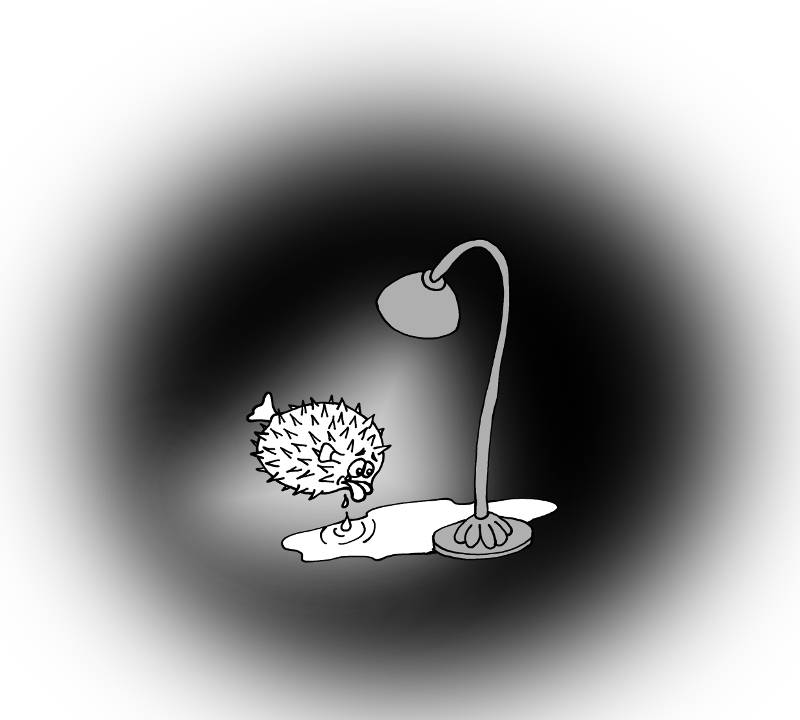
Sunny was quite curious about what was lost but, after due consideration, she decided not to approach them – they seemed busy and, besides, looked a bit too toothy and spiky. Sunny knew from Emmanuel that being a monster is defined by what one does, not what one looks like. He liked to talk about that at length. Mind you, he liked to talk about everything at length – and he wasn’t here, while the spikes and teeth were …
“Besides, there is a difference between knowing and believing, whatever Em says,” thought Sunny. “I know that there are no monsters under my bed. But sometimes, in the middle of the night, it takes a few uncomfortable minutes and a considerable effort to actually believe it.”
“A spikyish, toothyish, Jinny-fish
appeared once to grant my wish,
but as I am a sissyish fish,
escaping was my only wish,”
recited Sunny in a sing-song voice.
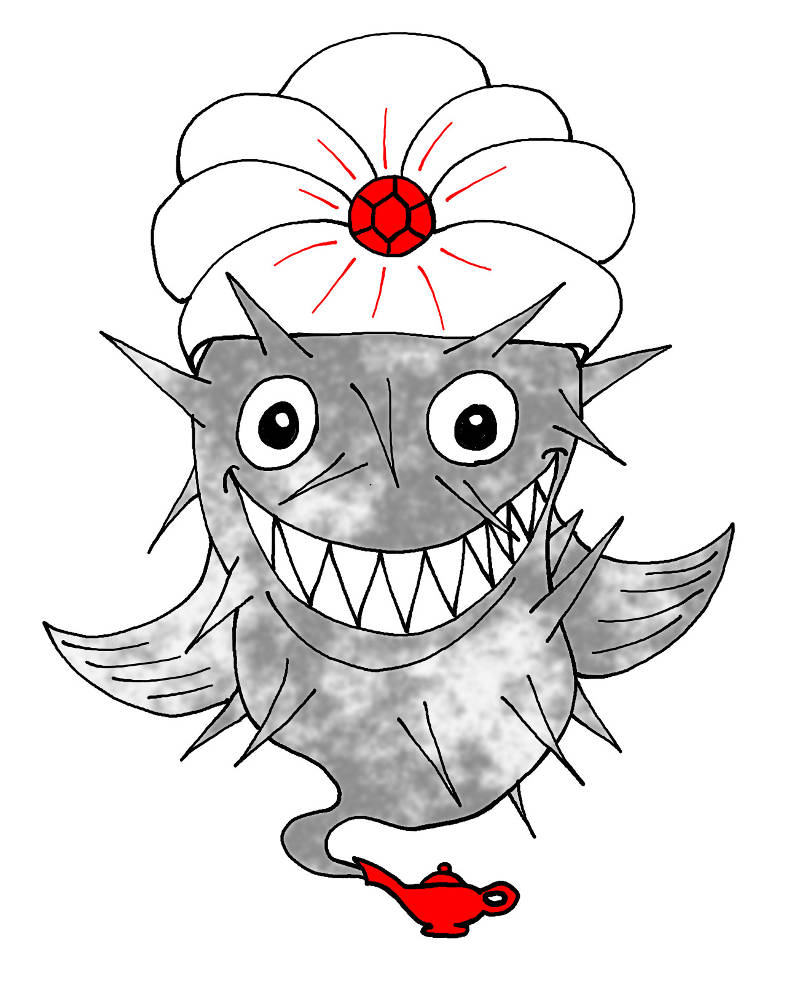
“Ah, the sea snake. I know what you mean. He seemed pretty nice, but very toothy. More toothy than nice,” said Simon and left it at that, for which Sunny was rather grateful.
***
Thinking of the puffer-fish, sobbing helplessly in the half-light, reminded Sunny of the heroines in Mrs Pearl’s books and she giggled at the incongruity. She wondered if Mrs Pearl kept reading her romance novels because she had a tragic romance in her own past and if that explained her fragile sadness. With her prim dresses and wistful eyes, she did look like a character from a romance novel or even a fairy tale. One with castles, towers and rose gardens… The Beauty and the Beast, that would be it!
The Beauty and The Beast
Click here to see the animated version

Once upon a time there lived a beautiful princess. She was a beautiful baby, then she was a beautiful child, and then she was a beautiful young woman. At least that is what everyone told her parents, who, as you might have guessed, were the king and queen and therefore used to hearing what they wanted to hear.
The princess’ parents were very proud of their daughter. They named her Beauty. They bought her beautiful dresses. They worried about her and tried to protect her. They did everything parents do – and, because they were the king and queen, a little more than that.
The king and queen built a beautiful tower for their daughter. It was made out of marble, with carved arches, hanging gardens and stained glass windows. She had everything delivered by her own staff of servants, who were carefully chosen for health and loyalty. She could wave to the people from her balcony and be far enough away not to catch any of their common diseases. The king and queen could visit her at any time, but she was protected from the machinations and ugly power struggles of the court. The princess was safe, and healthy, and more beautiful every day.
The fame of the princess’ beauty spread far and wide and from time to time princes from neighboring kingdoms came to court her. They brought her presents and paid her compliments. She enjoyed it to a point, but never let it go too far – after all, she was better than that. Courtship was such a common thing and was likely to interfere with her sleep. She heard that lack of sleep negatively affects one’s complexion and that would never do!
The princess lived quite happily in her tower, until one day, when she woke up, she noticed that she didn’t look quite as fresh as usual. Gradually, she started noticing that she was more tired in the morning, her skin was not as glowing, and her famed beauty was fading.
“It must be something that happens at night,” the princess thought. That very night she had a dream. She saw a beast sitting on her chest. It was ugly – all matted fur, fangs and claws. It was breathing deeply with horribly dilating wide nostrils, and she felt her life flowing away with each breath. She wanted to scream and run, but couldn’t move a muscle. She wanted to ask “Why me?” but the words wouldn’t come out. However, the beast seemed to know what she thought. It looked straight at her and said in a deep, raspy voice, “Because you’ve killed a child.” The princess wanted to protest, but she couldn’t. Gradually, the dream faded.
In the morning the princess told her parents what happened. They called all the best hunters, trappers and (just in case) magicians, but no one could catch or kill the beast. They turned the princess’ tower into a fortress, with traps and gates barring the way, but the beast kept coming. The princess wouldn’t come out of her room any more, because she was ashamed of her looks. Gradually, she faded and one morning the maid found her dead in bed.
It is said that in death our spirit, unfettered by the limitations of the flesh, determines how we look. The form of a young girl, almost a baby, rose from the body. She laughed and ran away. The child was alive and free.
Sunny was sketching Beauty’s tower as she was thinking of the story, it was encircled by roses, black-and-white, like the engravings in Mrs Pearl’s books. But suddenly her romantic musings were interrupted by a realization, “MRS Pearl, she is a Mrs, she must have been married at some point! I wonder what Mr Pearl was like?”
Sunny felt very curious indeed. Different scenarios, each one wilder than the last, jostled in her mind. He was an aristocrat prosecuted after the revolution, a poet, a free thinker… Mrs Pearl had to keep his identity a secret because he was killed as an enemy of the state, or in hiding, disappeared, as so many others, in the years when even thinking out of line was an arrestable offence… She missed him awfully, which made her sad, she hoped that one day he would come out of hiding, which made her look after herself so well… Sunny felt so curious that she decided to forgo her solitude for a while and make a dash for Mrs Pearl’s room, where she could ask all her burning questions.
Sunny took her drawing – to show it off to Mrs Pearl – and tiptoed toward the door. After listening for a few seconds and failing to hear the slithery sound of Mrs Pots’ slippers, she walked to Mrs Pearl’s room and knocked at the door as quietly as she could knock while still being heard.
The door opened and Sunny slid in. Mrs Pearl said she liked her drawing. Sunny was offered a biscuit. She took it and climbed into the chair, curling up in a patch of sunlight, suddenly feeling warm and content, half-hypnotised by the wavering sunlight filtered through the net curtains.
Chapter Seven
In which our heroes learn about love at first sight, and in the long run.
When Sunny and Simon approached the cross-street leading West, they saw a dark silhouette of a businessfish approaching them through the wavering sunlight filtered through the surface of the water. They knew he was a businessfish because of his briefcase, bowler hat and black umbrella. Appearances are not always deceiving.
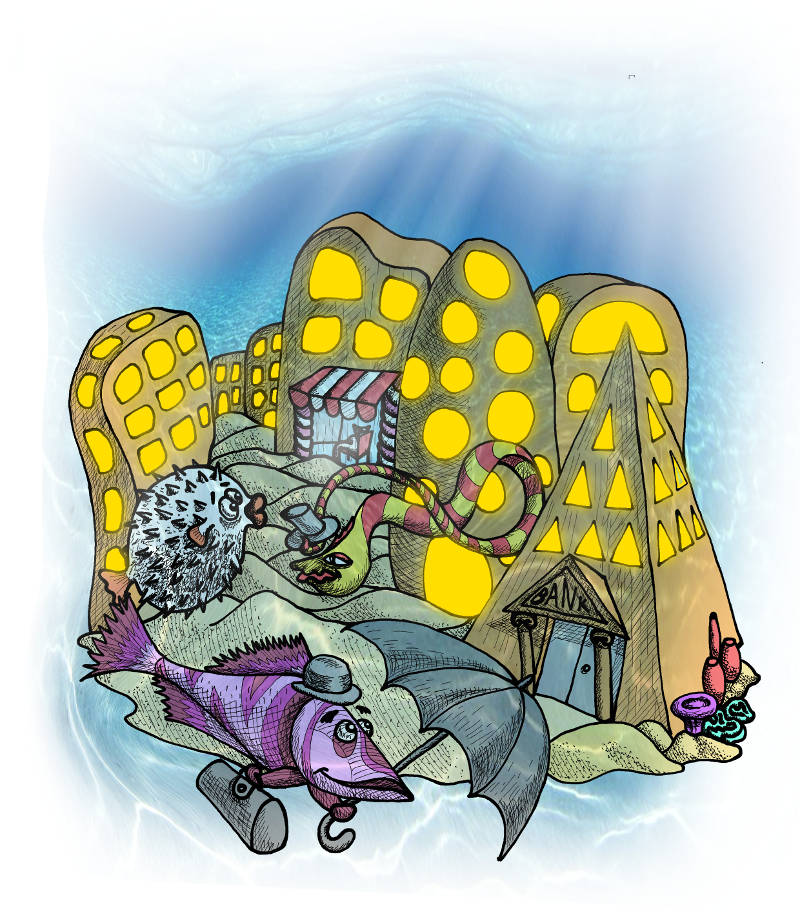
“Excuse me, Mr. Businessfish, can you please explain to Simon how to swim?” asked Sunny abruptly. She was becoming a little embarrassed and a lot annoyed. When she first met Simon, she thought that it would be a fun little adventure. By now she expected to have found the swimming lesson they were after, earned her balloon, which was considerably better than a mere umbrella, and gone home, passing Molly and Polly nonchalantly on the way. Fun word “nonchalantly”, isn’t it? Incidentally, it doesn’t mean “without chalant”, it means “as if you think there is nothing special happening and no one is looking at you, when in fact you know perfectly well that there is and they are”.
“Oh, I wouldn’t bother about that,” answered the businessfish after a moment’s thought, “swimming is not a marketable skill, you know. You, young man, want to learn salesmanship. If you know how to sell, you can always sell something.
“I remember, when I was just a tiddler, my father told me, “Give a fish a fish, and you will feed him for a day; teach a fish to fish, and you will cause the destruction of the Earth’s ecosystem and contribute to the ultimate extinction of life as we know it.” Let me tell you, I was pretty hungry until I learned fishing.
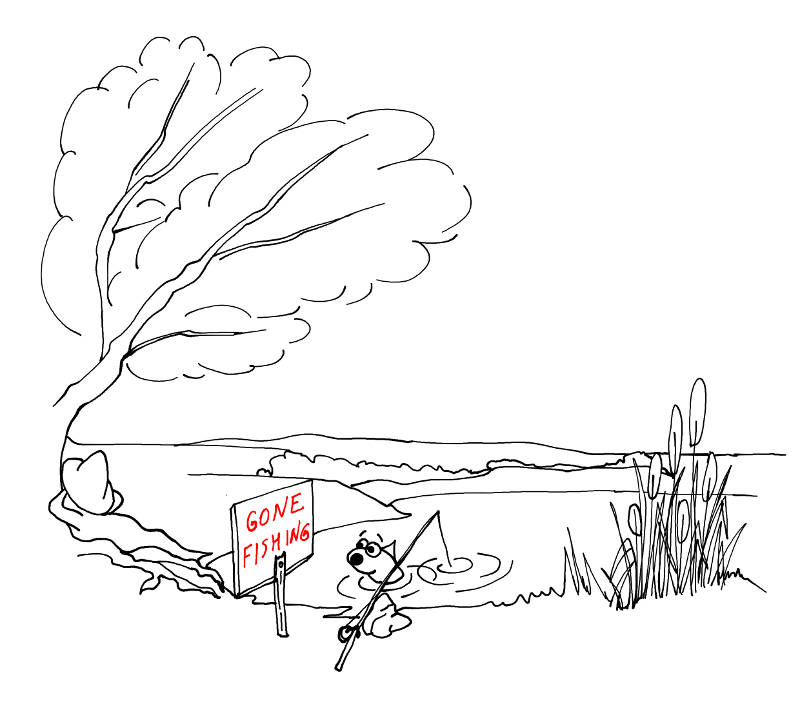
“Anyway, if you learn salesmanship, you will always have a job… I enjoyed trying a lot of different jobs when I was young. A job is something you do, you know, as opposed to a career – that defines who you are. At least, that’s what I used to think. It turned out not to be as clear-cut as all that. I spent a long time trying to find myself when I was younger, you know… what a waste! If you look at things, you will see the whole world. If you look for things, all you will see is what you are looking for. I was trying to find myself – and that is all I found. Just myself. So I went in search of someone else pretty quickly, in a state of mild panic and acute disappointment.
“And I found her. She was beautiful and free and carefree… We travelled a lot, you know. We would mount a tandem and just go – anywhere and nowhere, not worrying where we would spend the night. A night outdoors is a small price to pay for freedom – or so I thought.
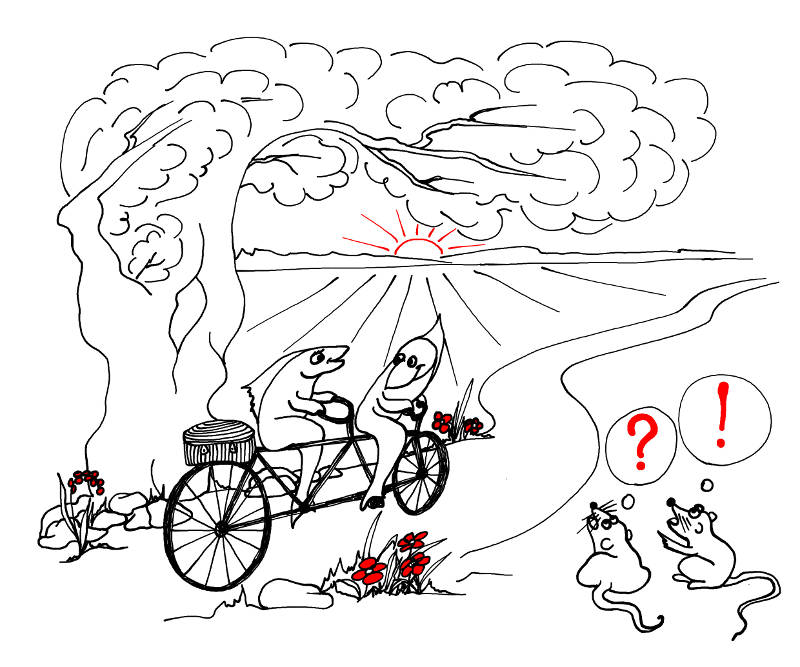
I used to tell her that living cheaply is good for my soul – I do not have to sell it to pay my expenses. And she used to tell me that she has a Zen approach to housework: “the best action is inaction”. I tried applying it at work, you know, but my boss fully subscribed to that principle and decided that, in my case, the best employment is unemployment. We laughed then – and I found another job easily…
“I wonder when it changed? Love is a difficult thing, you know – if you love someone as they are (or as you imagine them to be), any attempt to change on their part is a threat to your love. But to live, one has to change. To remain unchanged, one has to die, at least inside… I think she did. One often has to get over oneself to preserve the relationship. At some point she got so far over, she could no longer get back. She seemed a little listless afterwards, going through the motions…
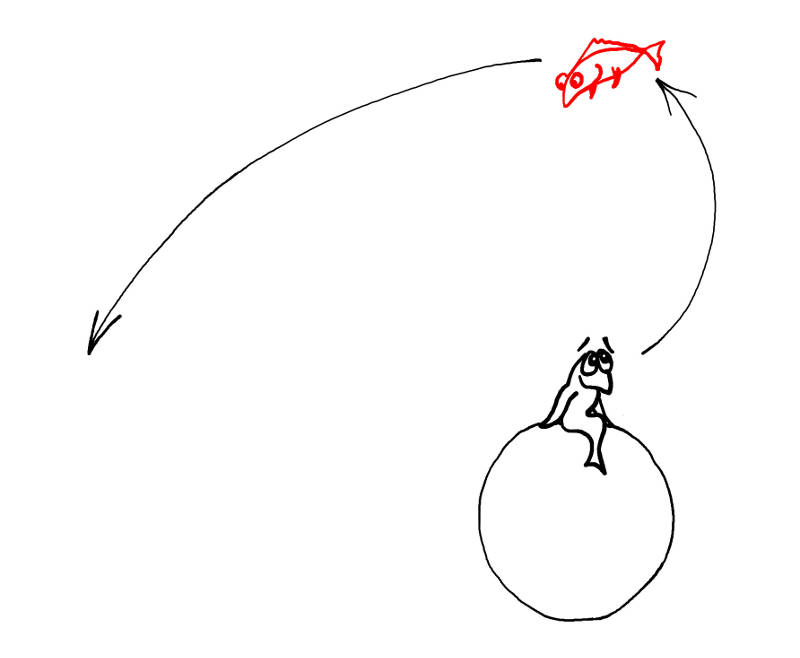
I remember she frightened me once, saying “A bottle a day keeps the lawyers away,” but then nothing happened – it must have been a joke… We never had children, you know – people say you can love what you put into them, their growth and happiness, maybe because you expect them to change…”
At that point Sunny and Simon, who finally gave up on trying to interrupt their interlocutor, quietly sneaked off. Even though very little of what the business fish said made sense to her, Sunny felt vaguely melancholy, her mood forming into an equally vague verse, full of “un”s and “im”s,
“Undefinable sadness,
irretrievable space,
imperceptible loss
of indefinite race…”
And then beauty swam into the mood, elevating it into the realm of poetry. It was a betta fish. She was gliding along majestically, her diaphanous fins undulating softly in the current, the effect only slightly marred by the hoots and whistles of the cranefish from a nearby construction site. Cranefish are close relatives of crayfish who developed wolf whistles, low-hanging trousers and union breaks – I think it’s called convergent evolution.
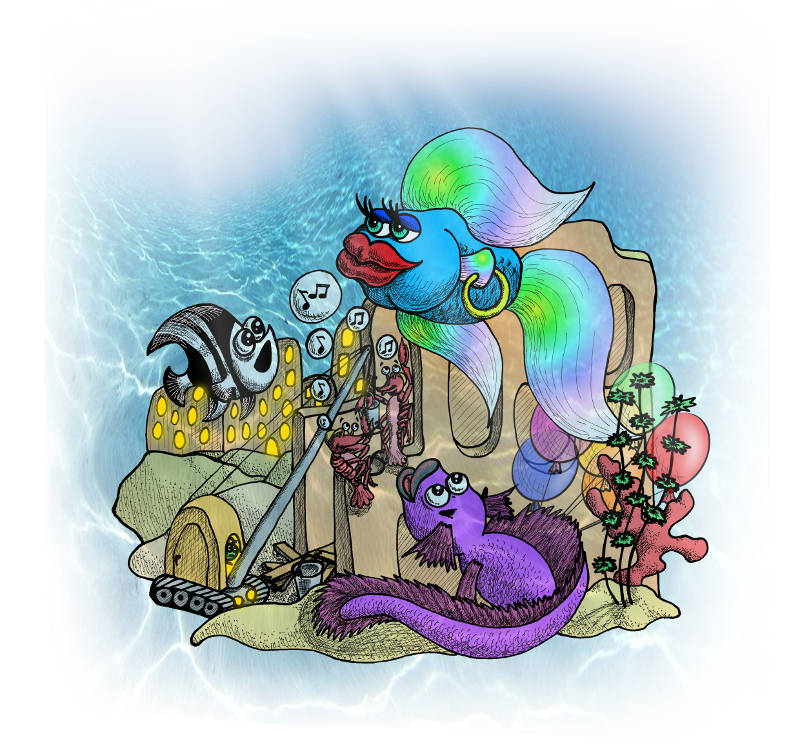
Our friends stood still for a few moments, taken out of time, preoccupied by the lovely vision. Beauty, as we all know, is in the eye of the beholder – and tends to blind said beholder by displacing everything else. Besides, there is a certain similarity between being struck by someone’s beauty and a big stick. Both produce confusion, inarticulate babbling and a general lack of responsiveness. Sunny recovered first and immediately felt annoyed by Simon’s open-mouthed absorption. She listened to his somewhat incoherent remarks on the existential significance of beauty for a while. When Sunny became thoroughly fed up with that, she remarked pointedly that the existential significance of an insignificant existence is somewhat suspect (she was rather proud of that turn of phrase), but her irony fell on deaf ears.
“Beauty must be in the ear of the beholder as well, blocking it completely,” said Sunny – to herself, as expected – and pulled Simon down the street. She attempted to tell herself that looking good just turned out not to be on the top ten list of things she wanted to do in life. Maybe on the top twenty list – but then, the top ten turned out to be very time-consuming… But it did not sound convincing. She may have pulled Simon a little harder than necessary and was not as careful to avoid sharp corners as she could have been, but we are only human – or piscine – right?
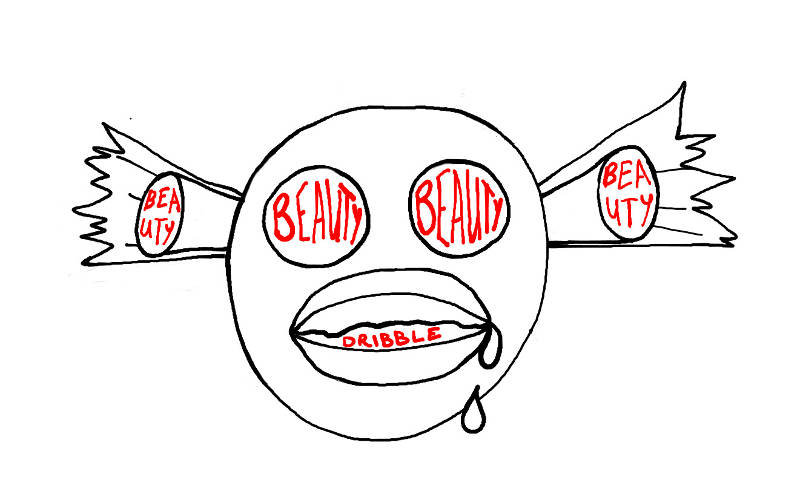
***
Sunny turned her head and her gaze fell on the trim figure of Mrs Pearl in her pleated black dress, sitting at a small round table covered in a crocheted white tablecloth, drinking tea from a semi-transparent china cup adorned with forget-me-nots. Which reminded her of the reason for her visit – and of the fact that, while visiting, she was daydreaming, ignoring her hostess. Sunny blushed with embarrassment.
“I am sorry, Mrs Pearl, I was just thinking – you know, of romance, like in your books. And I was thinking, there must have been a Mr Pearl, right? Was he very romantic? Would you tell me about him?”
The old lady smiled at the question, a little sadly. Sunny prepared herself for the disappointment of the topic being changed, but Mrs Pearl took a sip from her cup and, in her quiet, precise voice, launched into a story.
“There was, indeed, a Mr Pearl. But there wasn’t much of a romance. It was not a romantic time. We met after the revolution, in the time of hunger and uncertainty. I was living in a small town with my mother and two sisters. My father disappeared during the civil war and my mother could barely feed us on her teacher’s salary supplemented by occasionally selling things that she retained from before. I was the oldest and went to work as soon as I could. It was a boring, monotonous job at a textile factory. We made boring, monotonous clothes – mostly greyish-brown because of the shortage of dyes. Mr Pearl was a tailor by profession. He wasn’t very ambitious, but he was quiet, industrious, smart and practical, staying out of politics and limelight. People who were noticed tended to disappear and he rose through the ranks almost by default, eventually becoming a regional manager for the textile industry.
I met him when he was inspecting the factory where I worked. He was fifteen years older and, to a girl of eighteen, looked liked an old man. We exchanged a few meaningless words. When he showed up at my door with a bouquet of flowers and a box of chocolates a week later, I didn’t think it had anything to do with me. My mother opened the door, invited him into the house and called me in. She found a vase for the flowers and we all had tea with the chocolates. They were delicious! I had no idea what to say to that strange man and he seemed equally unable to come up with a topic to talk to me about. My mother talked for all of us – about the weather, about clothes, about the school where she taught… He came again and again, always dressed in the same formal clothes, always carrying flowers and chocolates. I became used to him, seeing him as a kind of uncle. It was a complete shock to me when, after several months, he proposed marriage. He received a promotion and was moving to the capital. He was wondering if I would do him the honour of becoming his wife and moving there with him. I couldn’t think of anything to say in response to that. My mother came to my aid, as usual. She replied that we will have a talk, as a family, and I will give him an answer in a week. He left. I remained stunned.
“You will marry him,” said my mother as soon as the door closed behind my unlikely suitor.
“But, mum – he is so… old! I can’t marry him. He could be my father!”
“No, he really couldn’t – he is twenty years younger than your father was. But he could be, in a sense… What do you think is going to happen to you if you stay here? We can’t afford for you to go to college. You’ll work in the factory or something like it for the rest of your life. You’ll wear the drab clothes you make. You’ll marry one of the boys here. You’ll never make ends meet and grow grey and tired, like me. I, at least, went to college and like my job – you won’t even have that. He is your best chance at education and a better life. You will marry him.”
And I did. And it turned out just the way my mother said. I went to college and earned my teaching credentials. I worked in a good school. I went to the theatre – and took my mother and sisters, when they came to visit. My husband loved me very much, he cared for me and protected me. I was his heaven, his little bit of warmth and purity in those mean times, in that cut-throat world. I didn’t have to deal with bills, shopping or the omnipresent paperwork. I went to work, cooked dinners and crocheted doilies and collars my husband put on the dresses he made for me – he remained a very good tailor. And I read my romance novels, dreaming of a handsome young man who would come into my life and spirit me away to wild adventure.
He never came. But, one day, there came a knock on the door and two plainclothes men came in. They read an order to search the house and arrest Mr Pearl, who was accused of spreading anti-government literature and embezzling money by an ambitious assistant. At that time, it was a common path to promotion. They searched the house, but found no banned books or large sums of money. They took him away anyway, to prison to await trial. That was common, too – if a detective wanted a promotion, he needed to crack a big case, and cracking a big case one manufactured oneself is always neater and easier than finding a real one. Besides, real criminals tend to be less harmless and better connected. I never saw my husband again. I tried to visit him in jail, but was not allowed. In two months I received an official letter, stating that he died from an unspecified illness, while awaiting trial. Our two-bedroom flat was confiscated and I was moved to this room. As his guilt was not proven, I was allowed to keep my job.
After years of peace and dreams of excitement, here it was. My old boring husband was gone and the path to adventure was clear. That is when I realized that I did not want any adventure. I did miss the large flat, money, theatre, security – but not nearly as much as my husband. I missed him terribly – his quiet voice, his skilful hands, the rhythm of his breathing at night… For years afterwards I would wake up in the night feeling the empty space next to me, an acute sense of fragility and loss dissolving the world, which no longer felt solid and dependable, turning it into vacuum. It would suck me in, terrifying. I would feel my heart beat faster and less regularly, my breathing become faster and shallower. I would be unable to fill my lungs. I would feel like I am suffocating, helpless, about to die… I wake up with that feeling still, though it’s duller now and I no longer feel breathless. So, you see, I missed out on love completely – I only knew it was there after it was gone.”
Silence filled the room already full of sadness, loss, crocheted doilies and patches of light. Sunny couldn’t think of anything to say, but Mrs Pearl didn’t seem to expect a response – she was sipping her tea, silent as usual, with a faraway look in her eyes. On sudden impulse Sunny pushed her drawing of Beauty’s tower into the old lady’s hand, mumbled something about a present and scampered back to her room. That story seemed all wrong to her, it didn’t fit what she thought about her neighbour at all! She felt confused and angry at Mrs Pearl, but also – tenderly sorry for her. She was no longer a mystery, she was a sad old woman… It was all a bit too much and Sunny didn’t want to think about it.
Chapter Eight
In which Sunny goes from angry to happy before reaching the end of the street.
At the end of the street Sunny and Simon passed an angry dogfish, who was loudly complaining to an uncomfortable-looking catfish about the weather, “It is raining cats and dogs our way! I finally had to give up and go to town to buy a new hat!”
The catfish nodded sagely, remarking in a slow, ponderous manner, “I can see how annoyed you are, but a drop of rain never hurt anyone, especially at the bottom of the sea. It is rather wet here all the time, you know.”
“On the other hand, a cat or even a dog, falling on one’s head, can break one’s neck, you know!” barked the dogfish in reply, donned his new yellow hard hat and swam off in a huff, and a hat.
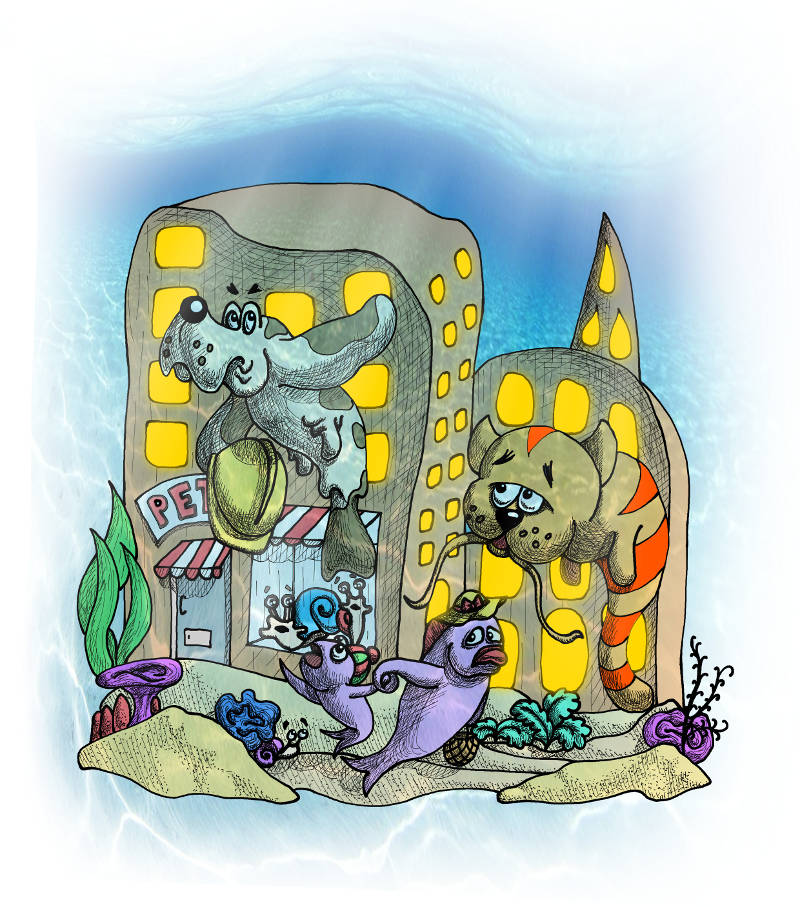
The catfish sighed, shook his head sadly and headed sedately in the opposite direction. As he was passing, Sunny heard him mumbling to himself, “I am afraid we have irreconcilable cultural differences here. I am cultured and he is not.” Sunny shrugged and moved on too, towing Simon behind her. At this point she was still seething inside, which probably explains her next verse,
“This pussy cat
was very fat,
fell on a dog
and squashed him, SPLAT!
He’s thin and flat –
how about that?”

A loud voice from behind made Sunny jump, “Bobby, it’s time to go home.”
“Why, mum, am I cold?” piped up a squeaky voice.
“No, you are hungry.”
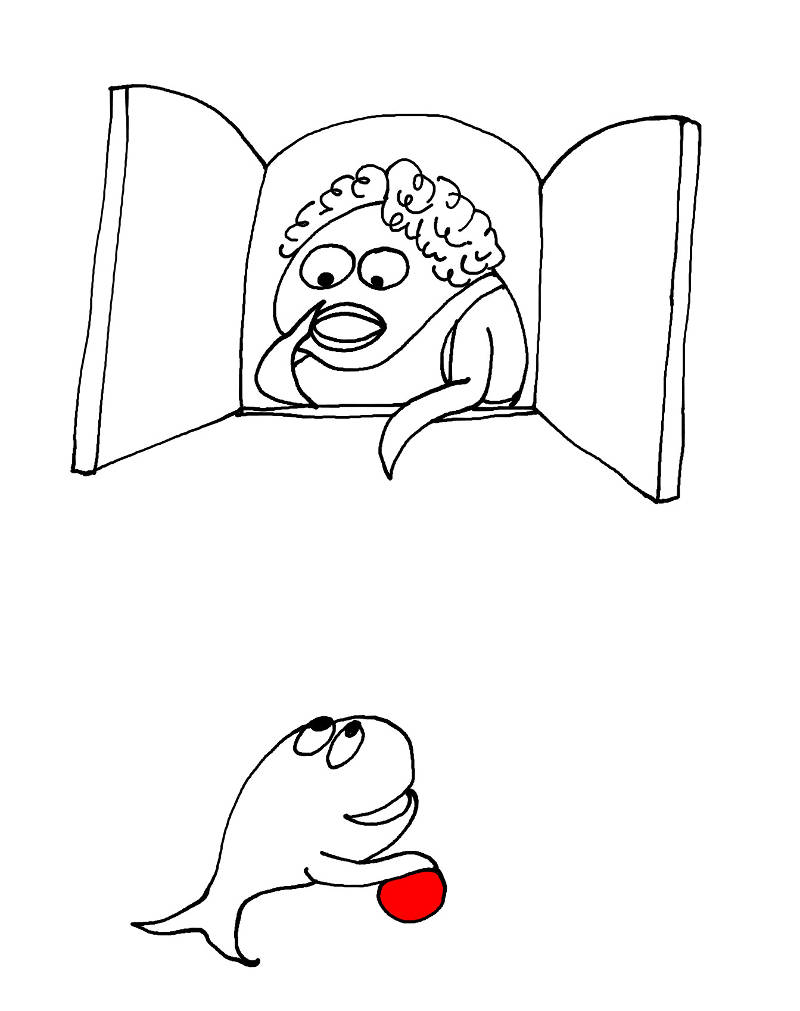
The voice attracted Sunny’s attention to a little alley just off the main street, where a seal and an eel were making a deal, looking rather shady about it. They wore tan-coloured trench-coats with their collars turned up and hats pushed down over their faces. This, of course, attracted the immediate attention of everyone passing. Trench coats are very unusual at the bottom of the sea – they tend to become soggy and heavy and interfere with swimming. They were also talking in hoarse whispers, which made them much easier to hear, since low sounds travel further in water. Sunny was just about ready to point out the numerous flaws in their conspiratorial technique, when she realized that they were, in fact, swapping character cards. By then, she was thoroughly fed up with all the nonsense.
Letting go of Simon’s fin, Sunny swam up to the trench-coat-wearers and whispered conspiratorially, “How much is it to buy your silence?”
“W-w-what about?” stammered the seal, taken aback.
“Everything,” replied Sunny maliciously, “just shut up.” She turned around, grabbed Simon and swam off without pausing to see the effect. She felt better, though a little ashamed of herself as well. Simon stopped babbling, but still seemed dazed, his jaw slack and his eyes glazed, turning from time to time, gawping wistfully in the direction the betta fish had disappeared. A typical visage of a fish in love – or suffering a minor stroke.
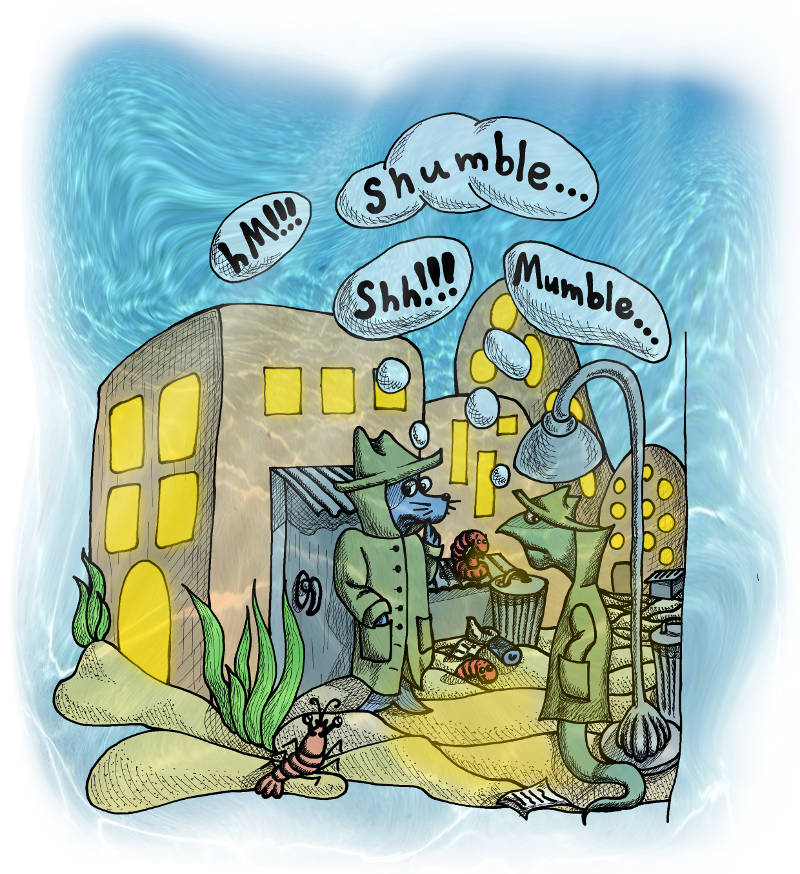
“Still, it’s more fun than being on my own,” thought Sunny unexpectedly, “I never noticed so many funny characters before – and I have been down this street dozens of times. That business fish was wrong – when you look for things it makes you look at things and then you can find other things… though it is not necessarily a good thing!”
I think she was thinking about the betta fish again, don’t you? Beauty is a persistent irritant.
The next pair our friends met seemed too preoccupied to ask about swimming. A clown-fish was making faces at a sea-horse. She was desperately trying to put her lipstick on, looking at her reflection in one of the last shop windows on the main street. However, as soon as she looked in the shop window, she saw the reflection of the clown-fish making faces, which made her giggle uncontrollably and smear her lipstick. This, in turn, made the clown-fish laugh and redouble his efforts.
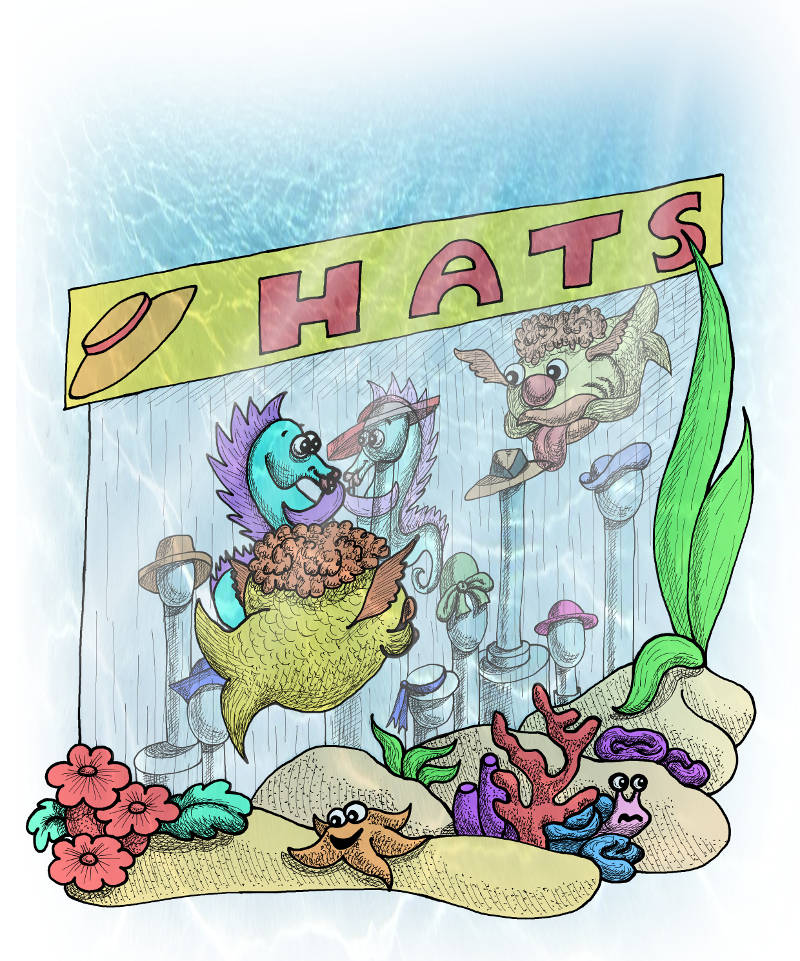
Sunny, who thought it looked like fun, poked Simon sharply in the ribs to attract his attention and pulled a face at him. This seemed to snap him out of his daze. He pulled one in return. His face turned out to be perfect for the game! With its wide prehensile lips and slightly bulging eyes, it did not take much effort to contort it into an amazing array of absurd expressions. Our friends moved on, pulling faces at each other, laughing and bobbing with excitement each time they came up with an idea for a new expression. They were having so much fun that they did not notice passing through the town and descending into the deeper waters of a narrow trench on the other side.
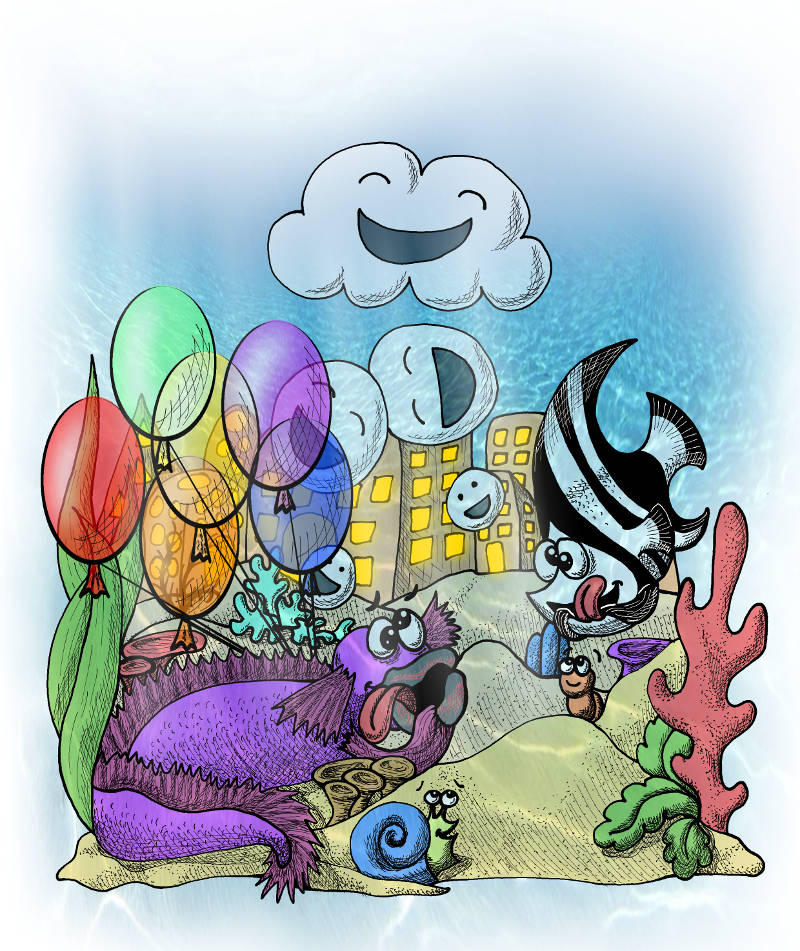
***
The day Simon’s life completely changed for the second time did not seem any different from any other day. It was hot, dusty and thirsty. He woke up suddenly, as usual, awake and alert in a flash. The tent was quiet. Ama and her family, who he now saw a little bit as his family, were out. He picked up the empty canister and went to the water pump. When he returned, the tent was in turmoil. Ama met him at the entrance, the old dust-covered blanket usually covering it flung aside, and hugged him for the first time. There were tears in her eyes. Simon’s heart sank.
“What happened? Who is hurt?” he fired questions in quick succession, his thoughts jumping from bad to worse, like terrified little animals.
“No one is hurt. We are going! We are leaving at last! We are so lucky!”
Simon echoed Ama’s happy laugh with a laugh of relief. He could now see the girls and the grandma behind her in the tent, milling around, packing their meagre possessions into the family’s only suitcase.
“They are taking us to the airport on the bus this afternoon. We received refugee status. We are going to Canada!” Simon’s face fell and Ama, who barely smiled in the two years they spent in the camp, laughed again, “Don’t worry, I put you in when I applied for asylum. We are all going together, as a family. Meet your new mother and sisters. And, of course, grandma.”
Later, Simon could not remember most of the rest of the day, which was strange. He remembered every second of the day his village was killed. Just as that first day that broke his life seemed to stretch into infinity, with each second lasting forever, filled with sounds, smells and the feel of death on his skin, this one seemed to collapse. He had vague recollections of being led from place to place with long periods of sitting and waiting in-between. His senses felt dulled, as if underwater, with sights and sounds coming from a long way away. He remembered a sudden burst of colour and light at the airport, where a volunteer with refugee services met them with the tickets and toys: two dolls for the girls and a plastic red fire truck for Simon. He remembered not knowing what to do with it. He tried hugging it, but it was hard and cold. In his village, girls had dolls to hug and boys had sticks and tools to build and throw. He turned the toy over several times and realized that he could open the doors and spin the wheels.
“You can roll it on the floor and pretend to drive it. It’s a fire truck. See, you can turn on the lights and the siren here,” came the quiet voice of the volunteer, who was watching him with tears in her eyes. These seemed to be sad, not happy, like Ama’s. Why would she cry while giving him something so bright and beautiful? This was a day filled with incomprehensible tears.
When the airplane finally took off, Simon felt unbelievably light. There was nothing he cared for left behind him and there was nothing he knew about awaiting him. He was taken out of time, free from the demands of the past and expectations for the future. He was ready for a new life and happy that it had not yet begun.
Chapter Nine
In which our heroes are lost and found and lost again.
Suddenly, a cold current touched Sunny and she snapped back to reality with a shiver. Everything around them was unfamiliar and seemed slightly wrong. The seaweed was a little too dense, the light – too dim, the shadows – too deep, the water – too dark at this greater depth… Sunny was suddenly scared. She remembered her lonely wandering after escape from the Great Barrier Reef and shivered. The world felt darker and colder then as well, but she didn’t care. She was so empty and light, she felt she couldn’t be hurt because there was nothing inside to be hurt. That’s not how she felt this time. This time she had something to lose.
“What’s wrong?” asked Simon after she failed to react to his last expression. He was rather proud of it, too: he skewed his mouth down on the left and raised his eyebrow on the right, making a diamond shape, with bulging eyes in the middle.
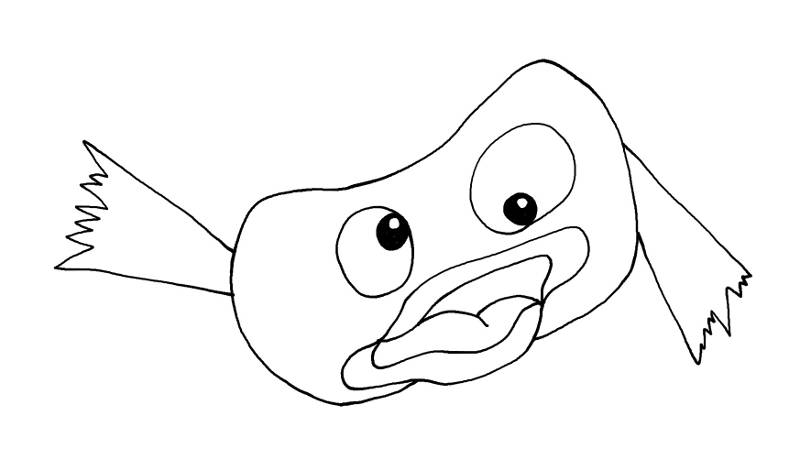
Yes, I know fish don’t have eyebrows! OK, forehead where an eyebrow would have been if he had any. Happy now?!
“Nothing really,” answered Sunny, pulling herself together. After all, she was in charge and responsible for her new friend who knew very little about the sea and couldn’t even swim. She had to find their way out of this strange place – she was the only one who could.
“I think we are a bit lost, but I am sure we can find someone to ask the way,” she continued with a brave little smile, feeling at the same time scared and proud of being so responsible and self-possessed.
That is probably why she felt a little annoyed when Simon said, pointing to a dense clump of seaweed further along the side of the road, “How about asking over here?” The inside of the clump was brightly lit and there was a huge blinking neon sign above it, facing the road. The sign proclaimed in friendly yellow letters, “Lost? Tired? Come into The House of Light! We will help you find your way!”
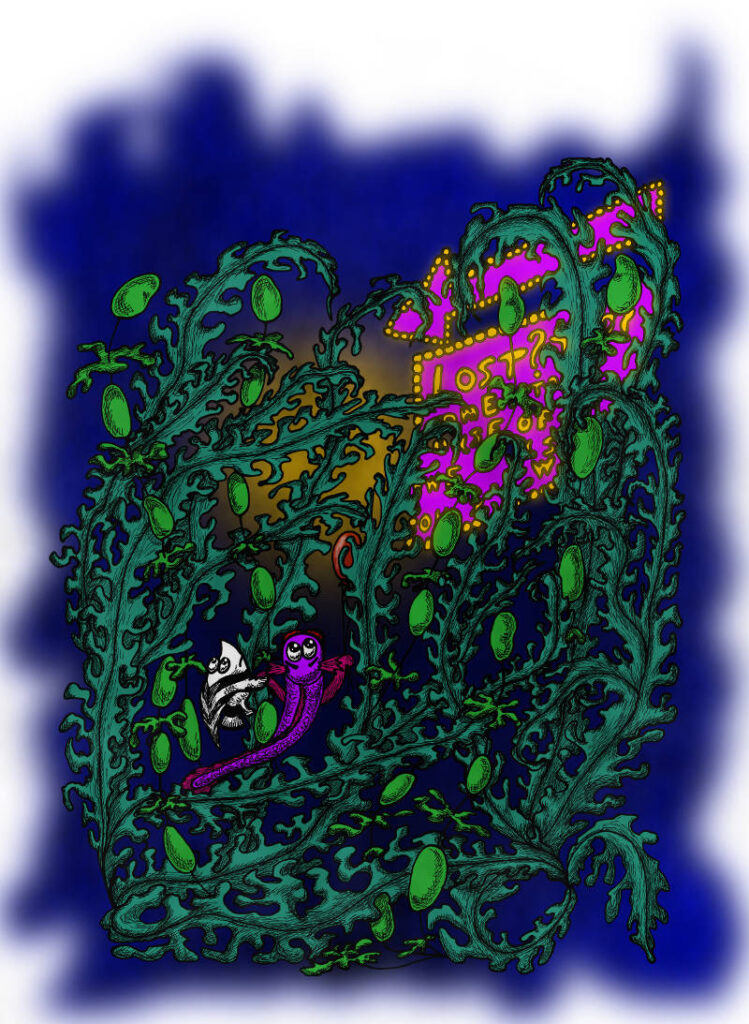
“That’s exactly what I meant!,” exclaimed Sunny and decisively pushed through the wall of seaweed. She didn’t mean it, really, she was too preoccupied with her own bravery to notice the sign. Now Sunny was in such a hurry to cover her mistake, she ignored a slight feeling of unease, caused by a stray thought, “How would they know which way is my way? I bet they will try to help me find their way…” Occasionally Sunny was afflicted with clear thinking; she suspected that she caught it off Em.
Once through the seaweed, Sunny gasped, transfixed for the second time that day (don’t worry – with wonder again). The house occupying a large clearing in the seaweed was stunning! It was built of coral and decorated with shells of all shapes, colours and sizes, from giant pink clams to tiny speckled blue-and-yellow spirals. Its walls seemed to be lit from the inside with bright multicoloured lights. An angelfish, just as beautiful as the building, hovered in front of the door, his surreally elongated fins fluttering in the current. It was peaceful and sheltered. The angelfish seemed wise. “There is nothing superficial about his beauty,” thought Sunny, “not at all like the betta fish! He looks dignified and slightly superior, not quite real, not quite of this world.”
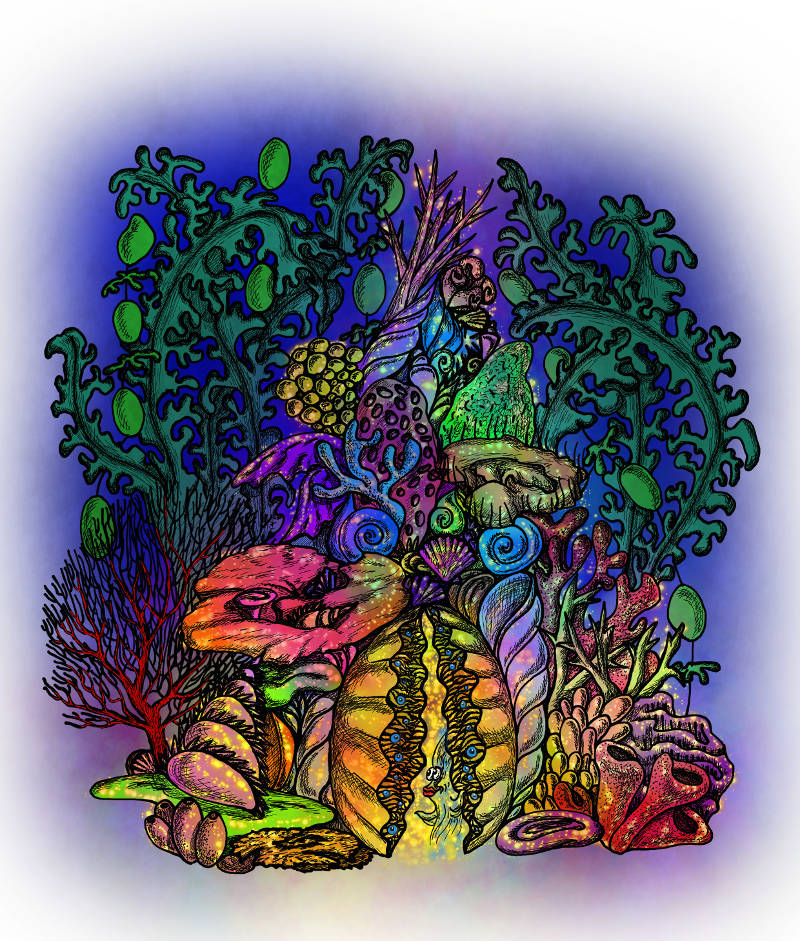
“I think we finally found our answer,” she whispered to Simon, nudging him with a fin. For some reason she felt she should whisper in the presence of such imposing beauty.
Timidly, Sunny approached the angelfish, towing Simon behind. “Excuse me, Sir, may I ask you a question?” she asked tremulously.
The big fish smiled benevolently down at her and answered in a sing-song voice, “Of course, my little friend, of course! But come in, rest and warm up inside! There will be time for questions later. Ask and you shall be answered, seek and you shall find,” and the angelfish moved aside, pointing to the door with an expansive gesture of his diaphanous fin.
See? Diaphanous again! It’s odd how often we associate the word “diaphanous” with beauty. It’s the quality of indistinctness, I think, the space it leaves for our imagination.
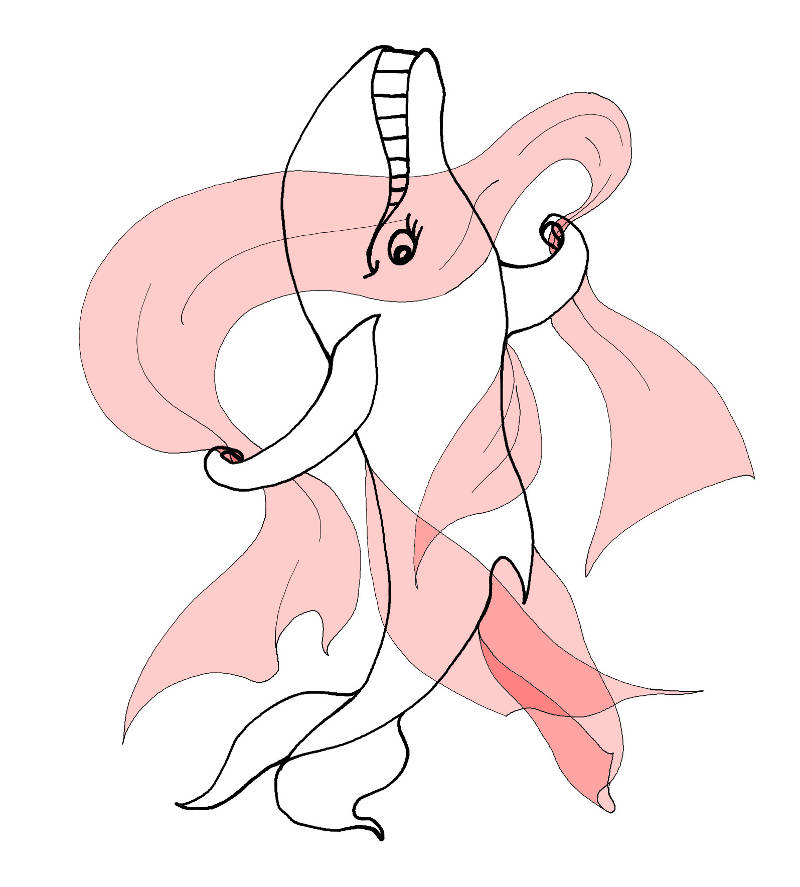
Sunny and Simon swam in. It was, indeed, a house of light. The walls were illuminated inside with the same multicoloured lights as outside, but, instead of dissipating in the cold twilight, they seemed to concentrate, making the water shimmer and shine. The effect was hypnotic. Sunny, Simon and the angelfish settled next to a gigantic table occupying the centre of the room. As opposed to the legendary democratic table of king Arthur, this one was definitely hierarchical: trapezoid in shape, with the host firmly installed at the top, which was narrow enough to admit only one occupant. There was no possibility of confusion as to who was the occupying force at the head of this table.
“Doesn’t he look sagacious?” whispered Sunny as they were settling down.
“Saga-what?” replied Simon distractedly.
Sunny, who was rather proud of knowing this rare and complicated word, explained eagerly, “Sagacious means wise, the root comes from “sage”…”
“Really?” interrupted Simon, whose stomach was rumbling, distracting him from the learned conversation and channelling his thoughts firmly in the direction of the laden table, “I always thought it was a type of grass… in sage and onion stuffing the onion is the root, I think. Hmm… no wonder they say the root of knowledge is bitter…”
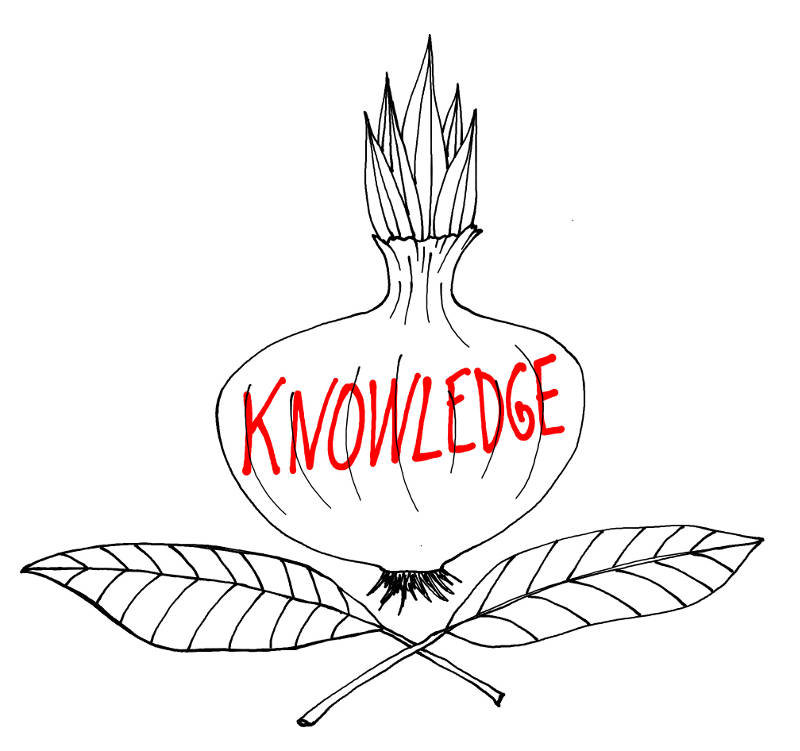
Sunny was about to explain that it was a different “sage”, but the sudden gastronomic turn in the conversation made her realize that they had not eaten all day.
As if reading their minds, the angelfish pointed magnanimously at the food and invited them to eat. They ate and chatted, their spirits rising along with their stomach contents.
In response to their host’s kindly questions, Sunny told the story of meeting Simon and their quest for the explanation of how to swim. The angelfish listened attentively and, in return, told them about The House of Light that he built here in the depths as a beacon of Enlightenment in his endless search for Truth and ways to build a Just Society for his fellow sea-creatures. His voice was soft and melodious, almost a lullaby. The words seemed to wash over Sunny’s head, forming a sort of song. One of those feel-good popular ones, where the words are used to trigger associations, rather than convey meaning. When you listen to the lyrics, they seem to have been written by the proverbial monkeys with a typewriter, but the words are important ones, like “love”, “faith” and “loss” and, repeated often enough, go straight to the emotional reflexes, bypassing the mind altogether.
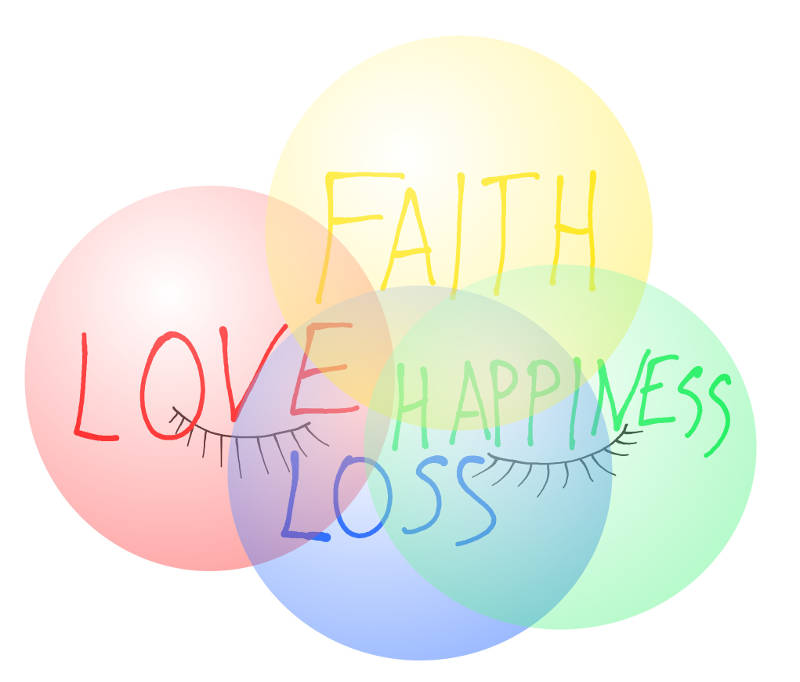
The water was warm and the currents gentle and Sunny realized that she was very, very tired. She still had a slight sense of unease and the angelfish seemed to look subtly wrong when she looked at him from the corner of her eye, but she was lost and weary and did not have a plan. She had never been responsible for someone else before. It was fun, of course, and made her feel important – but also tiring and a little daunting. She had already got them lost – what if she got them into even more trouble? Sunny so much wanted to relax and let someone else make decisions that she discounted her misgivings as given, closed her eyes gratefully and drifted off to sleep. And so did Simon.
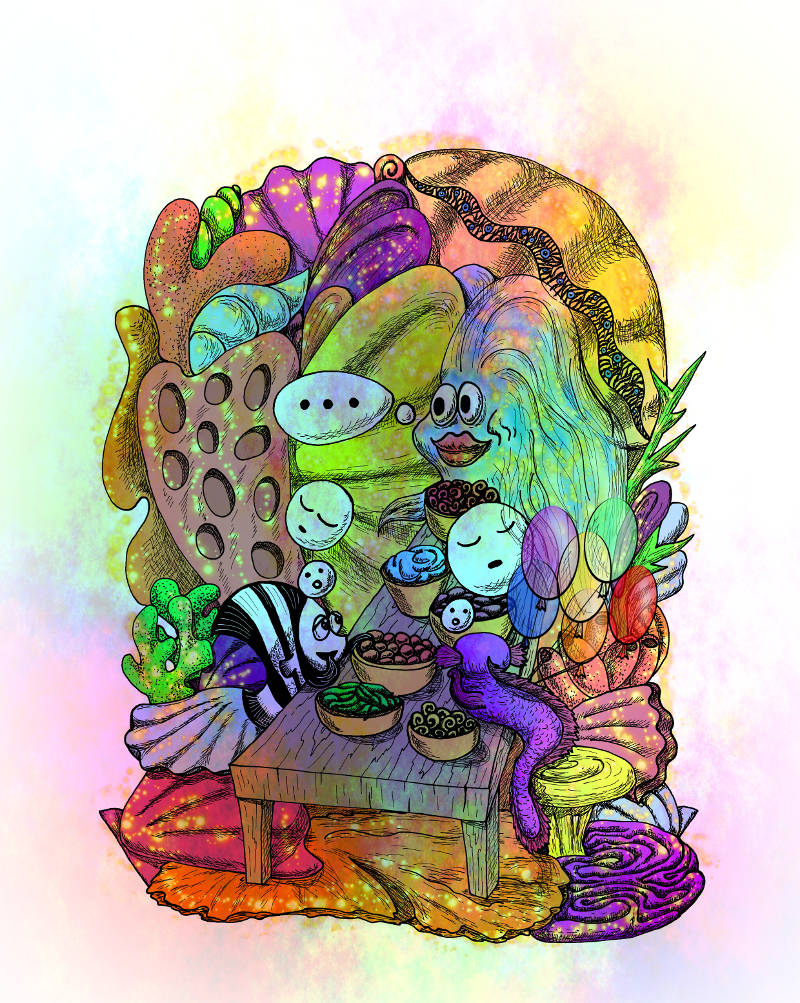
***
The first few years in Canada were the easiest for Simon. He was the youngest and learned English first. Ama took him to most appointments to translate for her and asked him for help with the paperwork. He felt proud of his role, it brought him closer to her. Not so much to the girls, who were becoming jealous.
Ama worked long hours and went to English lessons at night. She came home wan and tired, worried about being fired for her limited English, about bills which seemed to pile up, and about the girls, who were quickly forgetting their language and customs. At home she would be considering marriage proposals at this stage, but here things were confusing. The girls were starting to go out after school, they had boys as friends, there was makeup and dances. And the things they saw on television! At home, even married women wouldn’t dare to behave so provocatively – but here they were still considered children, too young to marry. Ama tried to get them to behave appropriately, but what was appropriate? She no longer knew. The girls saw her confusion and seemed to be perpetually angry at her, both for telling them how to behave and for being unable to do so… It was easier with Simon, who was quietly slipping into the role of the man in the family. He didn’t seem to need protection.
Grandma cleaned the house with feverish energy, she seemed to pounce on each speck of dust, maybe because it reminded her of the dust of the desert… She also cooked – everything and anything. The children became accustomed to the abundance of food quickly, but she didn’t seem to. She still kept every scrap. She appeared to believe that enough spice in a stew made even rotten food good. The children had to throw away their portions surreptitiously, when she went out of the room. She pretended not to notice. Her world, which narrowed to her immediate family when they went to the camp, shrunk even further now, as the girls were forgetting her language and customs, and she seemed to shrink with it, becoming smaller and dryer, her face creasing into a benevolent bemused smile whenever she interacted with her incomprehensible grandchildren. She could accept things without understanding them – the melancholy talent of the very old.
Chapter Ten
The angelfish’s adventures.
When Sunny woke up she felt strange and confused in this slightly unreal place, it was as if no time had passed – the room was the same, the light was the same, the angelfish was looking at her solicitously from across the table… The eerie feeling disappeared with a giggle when her gaze fell on Simon, who was floating on his side with his mouth open, buoyed by the balloons attached to his left fin, snoring loudly and looking even funnier than usual.
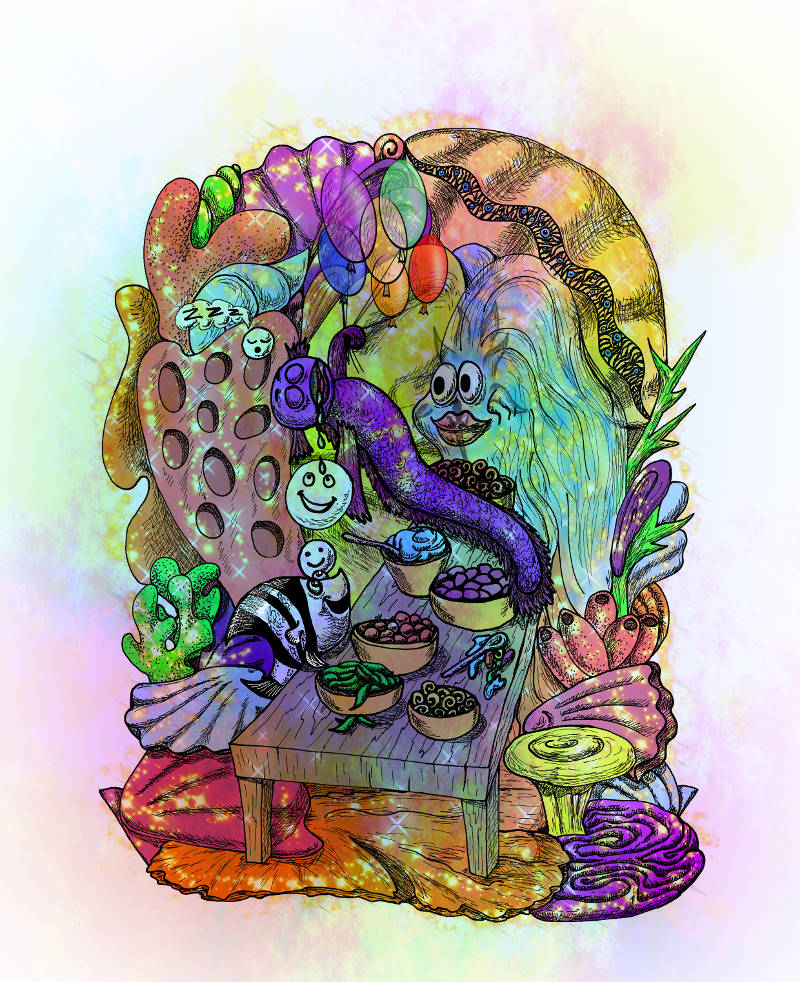
After exchanging the usual pleasantries with her host, waking up Simon, wiping a bit of drool off his chin and eating breakfast, Sunny’s thoughts turned back to their quest. She looked hopefully at the angelfish, “Excuse me, Sir, you seem so wise and kind… we really hope that you can teach my friend Simon to swim – remember, I mentioned it yesterday?” The big fish shifted imperceptibly. The constant motion of diaphanous fins reflecting multicoloured lights made him appear quite magical and slightly blurred… and, once again, something strange was happening when Sunny happened to glance out of the corner of her eye – something with shadows?
Her reverie was suddenly interrupted by the sonorous voice, “Of course I can! Yesterday you seemed too tired to listen to the whole story, but today I can tell you the history of The House of Light and show you the way to succeed in your quest for knowledge. You came to me for a reason. There is a Grand Design and you are a part of it!” Now, this is one of the worst things you can possibly hear in a strange place just after breakfast. Or lunch. Or any meal, really. Maybe not as bad as “Prepare to die!” would be (that usually happens after the last meal), but disconcertingly suggestive of being corralled, threatened and generally inconvenienced.
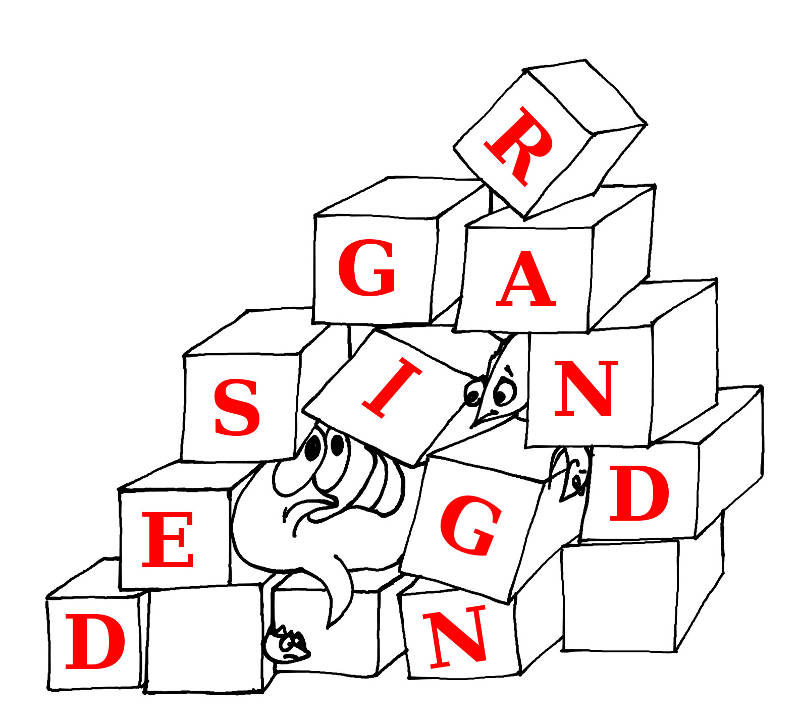
“Let me start with a bit of history,” continued the angelfish. “When I was a young fish, I lived in a coral reef close to shore. There I learned that we are not alone. There are creatures in the world above, so powerful that they live in the dry desert, where we cannot even breathe. They kill the mighty whales and the ruthless sharks easily. They control our destinies and take thousands of us in their giant nets to the world beyond, to a fate unknown.
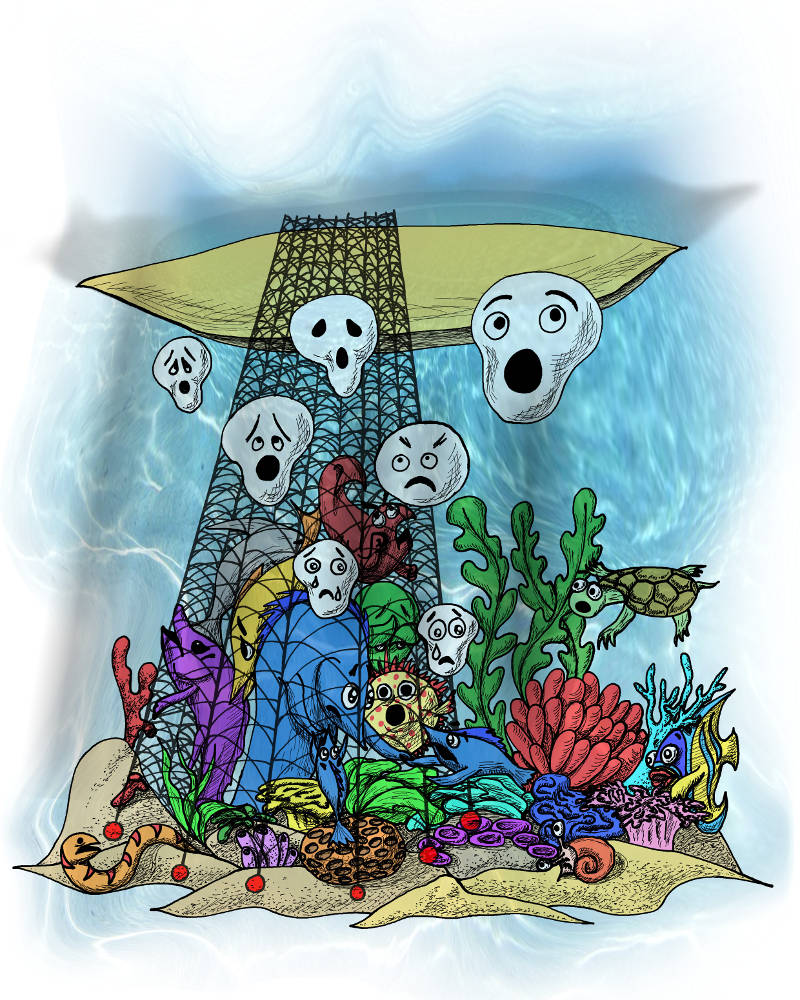
They can invade our world in miraculous suits of armour or gigantic chariots. They can blot out the sunlight coming from above. In fact, that is what happened to the reef I grew up on – one day they became angry and their giant chariot spread a film of black liquid above us. The sunlight was gone, the reef started to die and we were beginning to starve… Fish whom I knew for my whole life were becoming selfish and aggressive, fighting for food, stealing, forming into gangs to protect their meagre resources. I tried to build hope for them and talked about finding new sources of food, but they turned on me! I was bitterly disappointed in my fellow fish. I realized that the Gods were right to destroy our reef, since we were weak, worthless and wicked.”
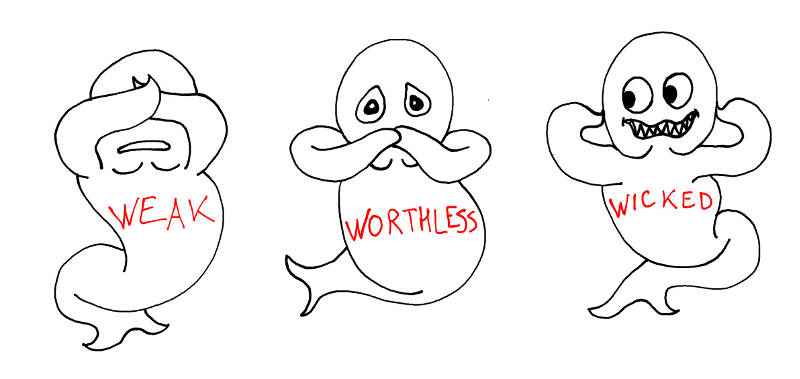
“How horrible!” interrupted Sunny, but the angelfish seemed not to hear her. He was caught up in his own story, staring blankly inwards, following the groove of the narrative he recounted to himself and others so many times that it became immutable, the bedrock of his personality, the Truth.
Funny thing, truth, isn’t it? You would think something is either true or not, but, in fact, something becomes truer with repetition. Take, for example, a typical school yard argument. They usually boil down to: “I am right and you are wrong!”
“No, I am right and you are wrong!”
“You are an idiot!!”
“No, You are an idiot!!”
“You are!!!”
“You are!!!”
And, lo and behold, after a sufficient number of repetitions both parties do look like complete idiots.
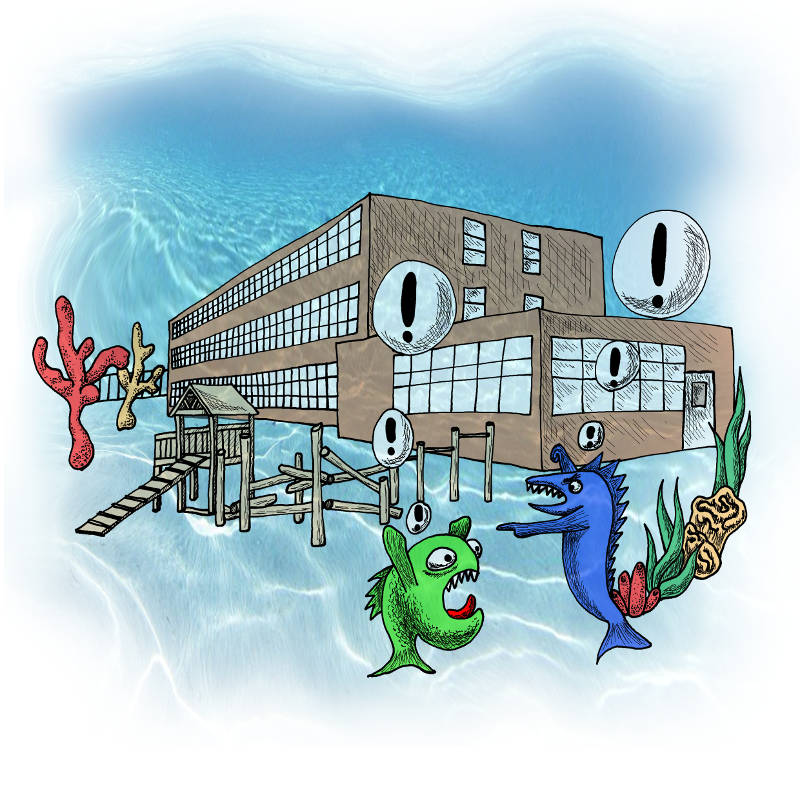
Anyway, the angelfish was continuing with the story, ignoring both Sunny’s interruption and the author’s rambling asides. “That is when I was chosen. I was taken by one of the Gods to the world above, to live among them. They put me in a special tank, full of clean water, with plenty of seaweed and a magnificent colourful castle; they gave me delicious food every day and placed my tank near the television. It showed me pictures of a world far beyond our comprehension – a world beautiful and terrible, a world of Gods. I was clearly very special!
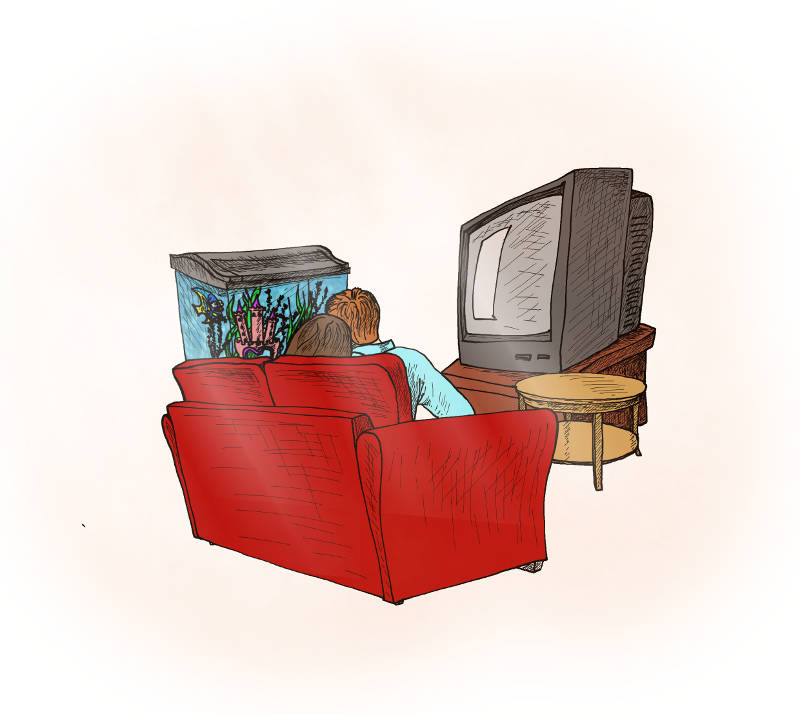
“Many things they showed me were incomprehensible – you know how things get distorted in the air. But most of the cartoons (that is what they call the better films, with bright colours and clear outlines) that depicted Gods were about Good and Evil. (There were also some cartoons about talking animals wearing clothes, but they were clearly ridiculous and not to be taken seriously.) Good and Evil was a very difficult thing to understand at first, but I persevered. The television talked a lot about good Gods battling and exterminating evil Gods to protect Life and Justice. Killing to protect life seemed a strange concept, but the television said that being evil made them not quite Gods and not as worthy as the real Gods. And then the realization hit me – I was thinking the wrong way around! The evil Gods were evil first and Gods – second. They were born Evil and had to be exterminated for Good to flourish. Just like the fish on my reef did not become bad after we lost the sunlight, they were wicked underneath, and I only found out when food became scarce. They had to be exterminated for good fish to build a kind, just society, where life is held sacred and everyone respected – except for the bad ones, of course. And maybe stupid or female ones – I was not quite clear on that point. Anyway, that was not important, the Great Realization was! That is why the Gods blotted out the sun and let the reef die – to clear the space for a better reef. It all made sense now that I was a right-thinking person! I was made privy to the Gods’ Grand Design!! I was so proud!!!
“But the days passed and nothing happened. I became ill in spite of the care the Gods provided. My flesh was too weak for the Great Purpose. I thought that I let my Gods down and felt like giving up. I did not know that it was all for my own good and a part of the Grand Design. One day, when I was too sad, sick and sluggish to move, one of the Gods picked me up and took me to a giant gleaming white basin, shining and pristine, with a pool of water at the bottom. He dropped me in and pulled a lever.
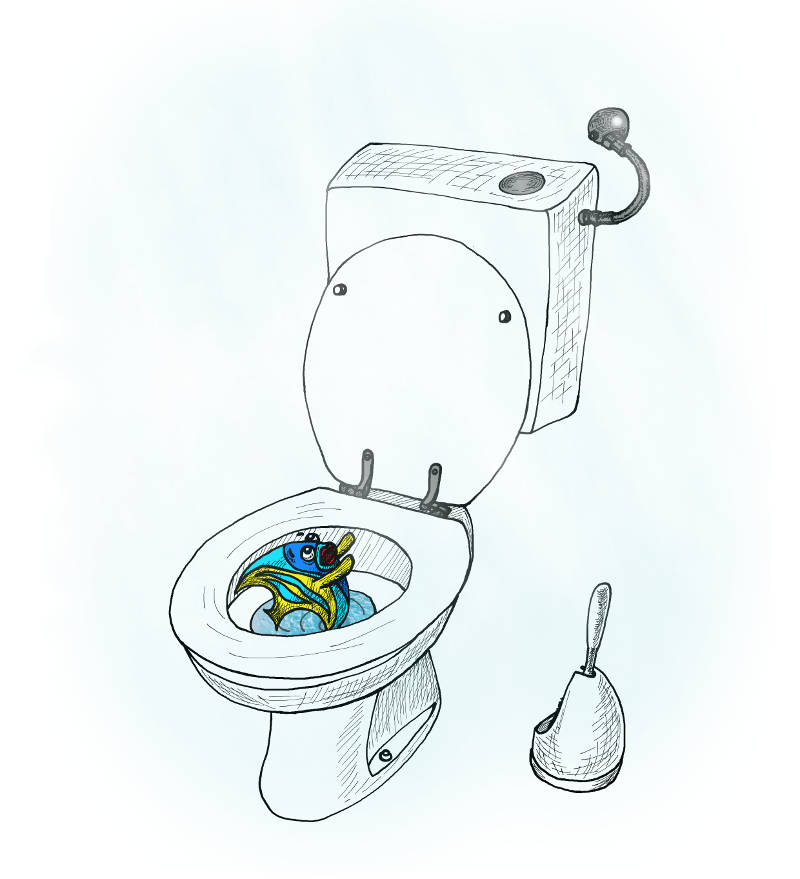
“A magic whirlpool formed around me and took me into a strange world. It was dark and noisome and seemed like a continuation of my illness, my diseased body and soul extruding into the environment, giving it a nightmarish quality… I drifted in and out of consciousness, pulled by the currents, dazed, disoriented, not caring whether I live or die. I did not believe in ghosts then. For those who truly do not believe in ghosts, death never occupies the same temporal plane as them and the fear of death is just nonsense: when I am dead, there is no “I” to experience it, why be afraid of something that cannot affect me by definition? I do believe in ghosts now, for I am one, doubly so: a weak reflection of my former self and a giant shadow of a powerful idea…”
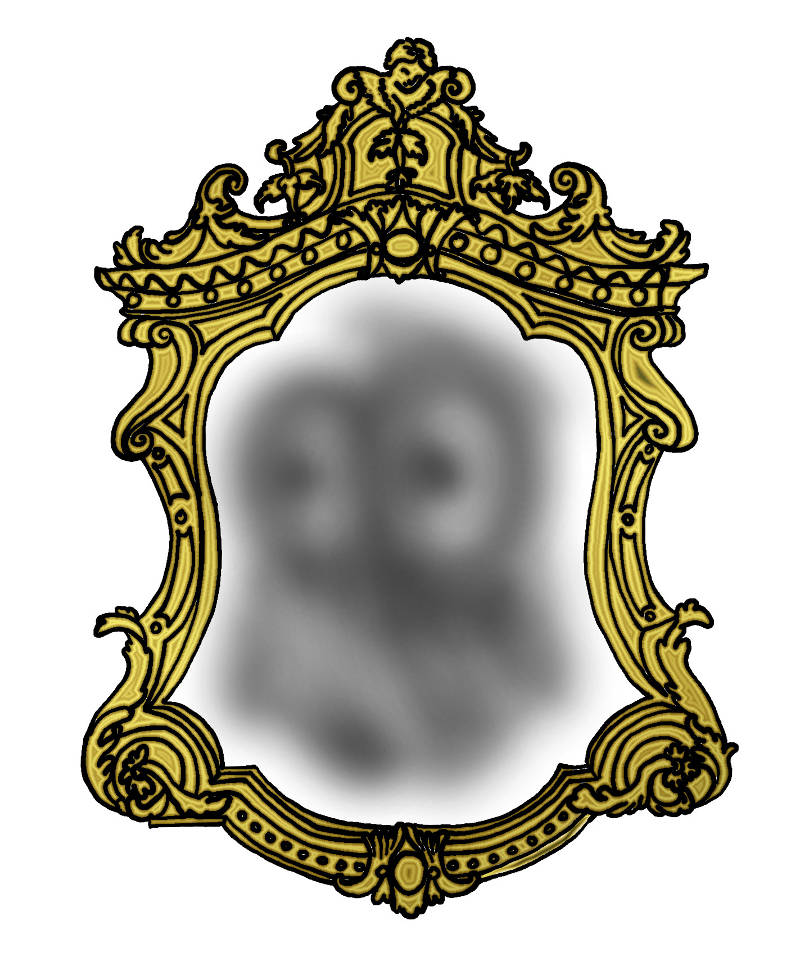
The sense of loss was so palpable in his voice, that the room itself seemed to darken and Sunny’s eyes filled with tears.
The angelfish continued after a long pause which no one dared to interrupt, “The journey seemed interminable. Once I came to myself at the edge of the water and, lying just next to the stagnant pool I was in, there was a book. On the cover there were many images, and the words “The Book of Truth” in large bold letters. As I stretched my fin weakly toward it, a current grabbed me and carried me on, up and out, to this valley on the seafloor.
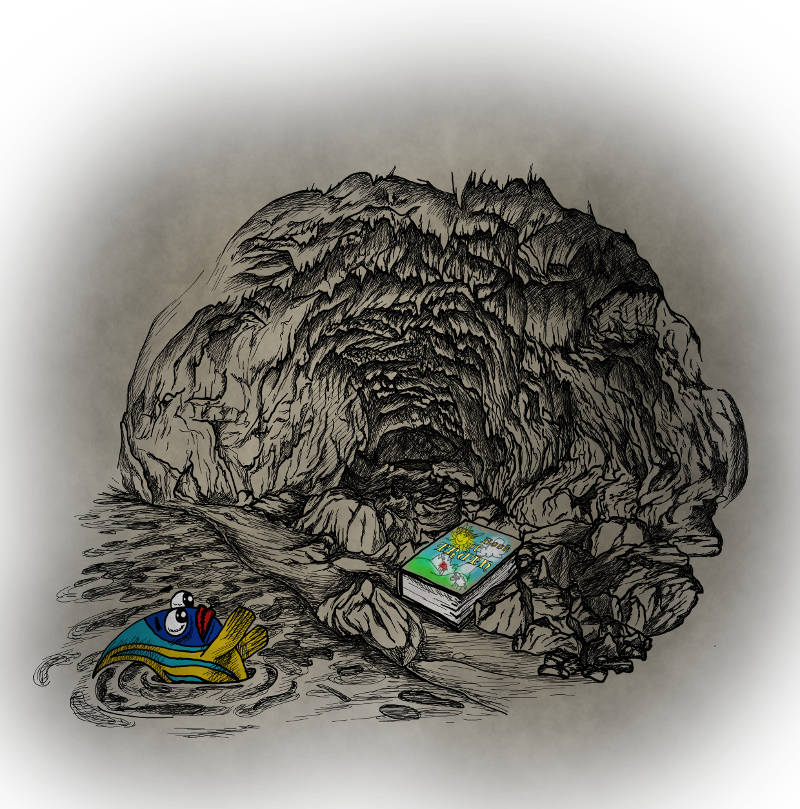
“The valley was quite deep, but rich with food, and I soon recovered. My purpose was clearer than ever now! I was right about my Great Destiny – the Gods showed me the way with their television and saved my life to become their emissary underwater and to help them build a just sea-world! I was now certain of my Destiny, but how to convince others? Stupid creatures could not see my greatness, they even jostled me in passing while I was looking for food on the seafloor! I needed something amazing, something eye-catching, attention-getting and awe-inspiring… And then I remembered the wonderful castle the Gods gave me in my home above.
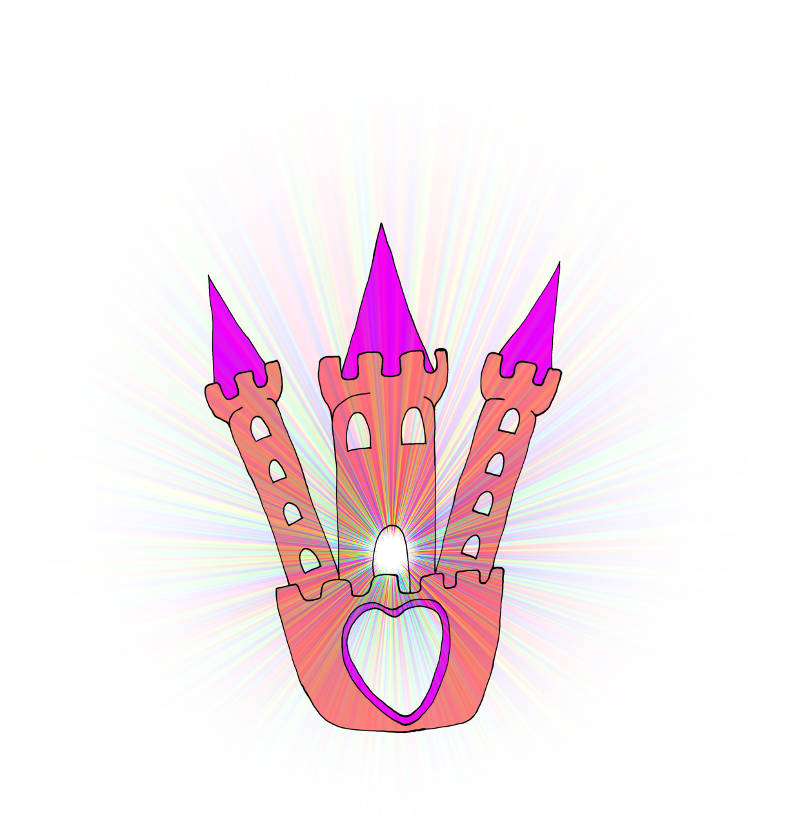
There was nothing like it at the bottom of the sea. If I could build a house like that, the rabble would adore and admire me. Most creatures are too simple and selfish to understand the great ideas that are good for them – but they are easily fooled by shiny baubles… I decided to start building there and then – my great creation, The House of Light!”
At this part of the story, the angelfish’s demeanour seemed to change. His voice became colder. There was no trace of wistfulness or loss in it any more, a metallic clang of calculation seemed to underlie every thought. The wording did not change, but the style did, with pauses becoming shorter and sentences – clipped. “I spoke to several decorator crabs, who lived in the valley, about transporting and arranging some coral colonies as a basis for the house. They were selfish creatures, but beholden to beauty, and I was beautiful in those days. They told me that the corals would not survive at this depth, but I explained that their skeletons would. After all, that is the nature of corals – the ones inside the colony die and leave their skeletons behind, to be built on. I expostulated at length on how they would be contributing to the greater happiness of all fish (and crustaceans), who, after all, are much more complex and better than mere corals.
“In the final count, politics always works on the basis of “divide and conquer”, since it is the cheapest and most reliable method of control. Dividing people into groups allows you to define who they are – and then they will follow the path you indicate, whether it leads to heaven or hell, in order to remain themselves. They would even find excuses for you, whatever you do, for in that way they are excusing themselves for following you. Nothing creates harmony and mutual support as well as a shared guilty secret. It works like a charm!
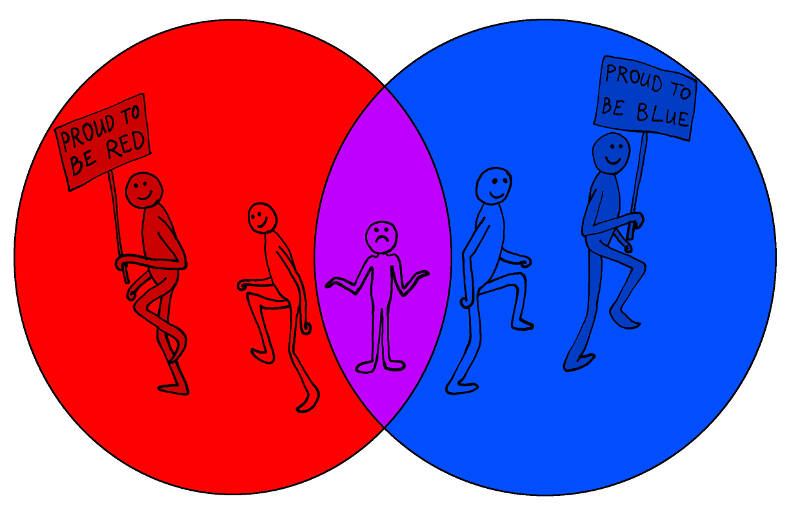
“But my best trick was pointing out that it would be a great project, forever making these crabs famous as the greatest decorators of their generation – and they were the greatest, weren’t they? They agreed wholeheartedly with this and, by extension, with their part in the building project. A little life lesson for you: if you want people to hear what you say, conceal what you want to say in what they want to hear.”
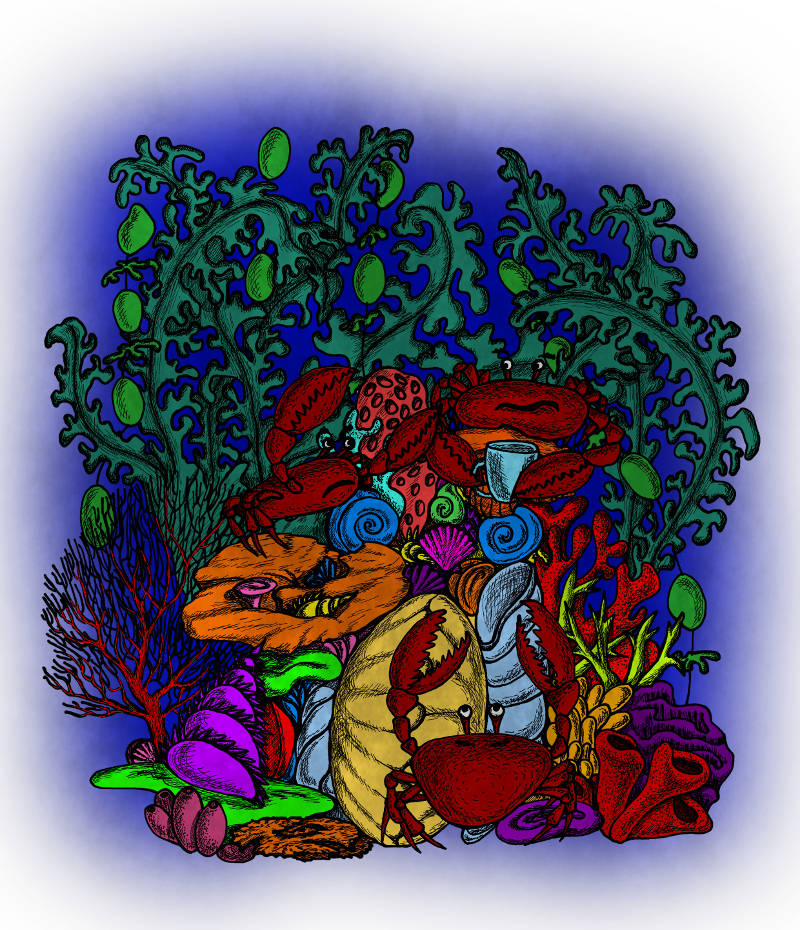
The terrifying transformation was continuing, transfixing the two travellers (alas, with fear, not wonder this time). There was no trace of fellow feeling in the narrator’s voice at this point. It was now full of disdain. “I ordered the crabs to decorate the house with shells. I already had quite a few – the shellfish made good eating – but now I started collecting them with redoubled effort. The more shellfish I ate the stronger I grew and the bigger and more beautiful grew the house. That surely was a sign from the Gods that I was on the right track! I knew that the road ahead would be hard, littered with sacrifices, but the end surely justified the means. No one in the sea attempted something as grand or created something as beautiful before! And all for such a great, selfless cause! The decorator crabs adored me and visitors flocked to The House of Light, as it grew more beautiful and wondrous day after day.
“But, alas, the crabs were right – the corals were dying and losing their colour. My house was famous by then and the word of the Gods about Truth, Justice and Kindness was spreading throughout the valley – I had to keep it going, if only for my followers’ sake!
“Then an inspiration struck me – the Gods surely gave me the idea of The House of Light for it to be lit! There were some predatory anglerfish living in the valley. Most folks avoided them because they were stupid and violent, but they had bright, beautiful lights on their lures. Stupidity and violence tend to go hand-in-hand and make perfect qualifications for henchmen, they make them easy to control and intimidate. I convinced the anglerfish to serve me quickly enough by explaining that not only would it be easier for them to attract prey with their combined bioluminescence, but they would also serve the Gods (who are much stronger and meaner than any anglerfish) by creating this beautiful temple! I gave them both regular meals and a greater purpose in life – who could ask for more? They live within the coral walls, lighting up the house and the water, and acting as guards. They do eat rather a lot of small fish, but great endeavours require great sacrifices, and this is a glorious structure – don’t you agree?”
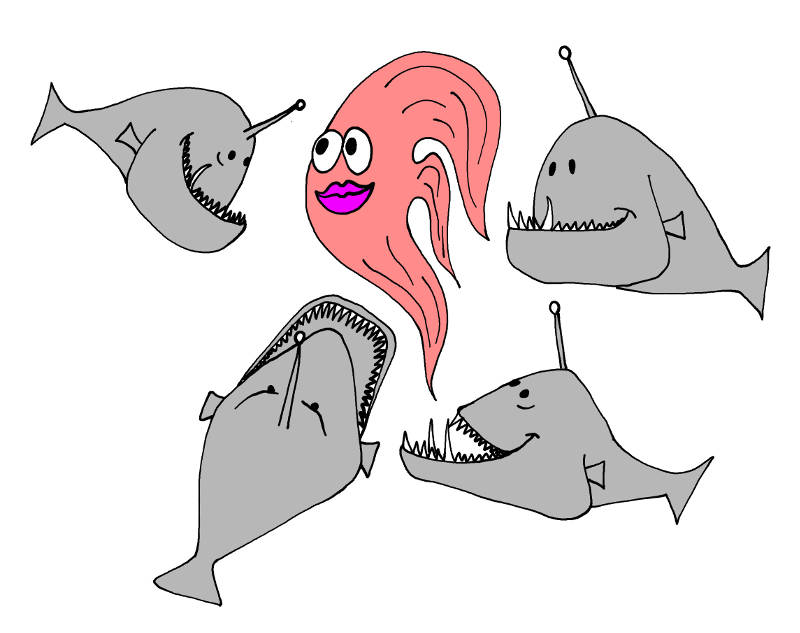
***
Sunny suddenly realized that the book she was staring at sightlessly looked different. The Mock Turtle was staring sadly at her from the darkening page. A glance upwards solved the mystery – the sky was clouding over. The low, red-tinted sun was now half-covered and looked like a malevolent eye under a heavy, hooded eyelid. It reminded her of the monster from an old fairy-tale by Gogol. Viy – yes, that was it! His eyelids were so heavy that they had to be lifted by others. But, once opened, his eyes could see anything and anyone. Sunny remembered reading the story years ago and being fascinated by the menagerie of monsters, at the same time horrifying, hapless and helpless. But Viy’s all-seeing malevolence was truly terrifying. Evil may come from the dark, but it is helpless without light, which gives it purpose and direction. Funny that…
Sunny’s thoughts were interrupted once again as the Mock Turtle came into focus. The sky grew lighter as it started to snow. Snow covered the trash bins, construction rubbish and dog pee. All was light, cold and sterile. But in a few minutes, as it stopped snowing and slow-moving clouds uncovered the sun, the world outside the window suddenly exploded into light. Snow shone, glittered and twinkled on every surface – a Disney fairy tale, as opposed to the macabre one she was thinking of before. All the ugliness was covered over. The snow and sunlight turned every house into a house of light.
Chapter Eleven
Where angelfish fear to tread.
Sunny, who was becoming more and more uneasy as the speech progressed, focused her gaze on the walls. She could see sharp, gleaming surfaces, reflecting lights in cheerful little slivers. To her horror, she now realized that these were rows of teeth. Sharp teeth attached to enormous, perpetually smiling jaws!
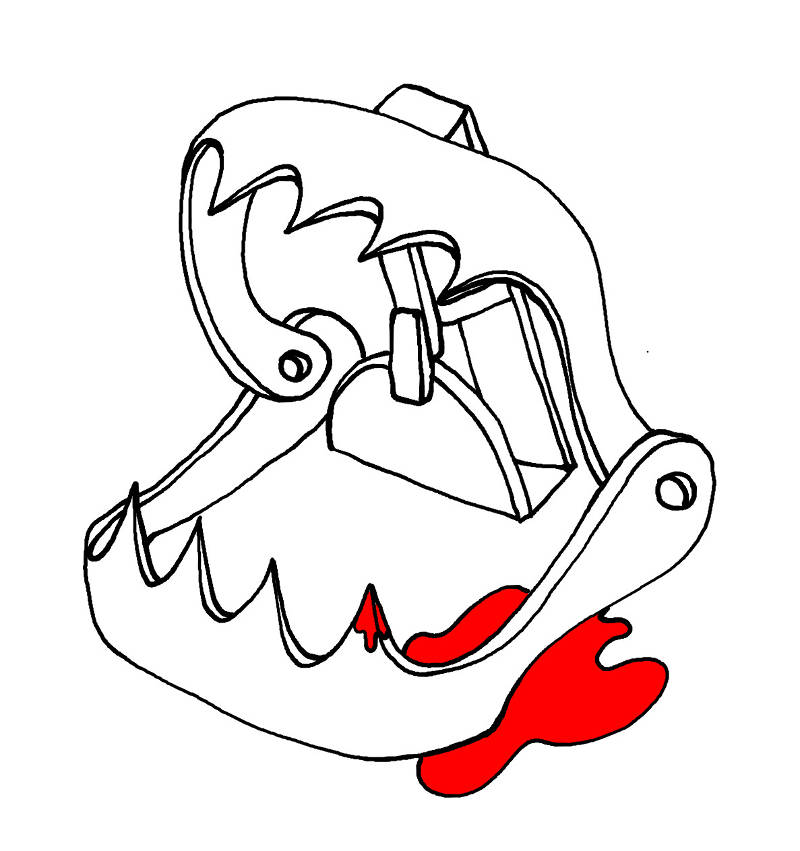
And, now that she knew how it was built, the house took on the sinister significance of a crypt, built of skeletons and shells, a giant lure full of death and decay under its shiny surface. And the angelfish – he seemed to be changing. Now that Sunny was looking carefully, she realized that the brilliant colours were mostly reflections of the anglerfish lures and the diaphanous fins were not so much scale as slime… the body was longer than she thought and had a tail, a long sinuous tail, disappearing into the floor, anchoring him to his exalted place at the head of the table… Suddenly, the whole became clear, no longer obscured by the shiny glittering lights, and she saw in front of her a giant fat hagfish! Instinctively, Sunny grabbed Simon’s fin and shrank back from their host. Her eyes darted around, but there was no escape – the walls in The House of Light were alive with teeth.
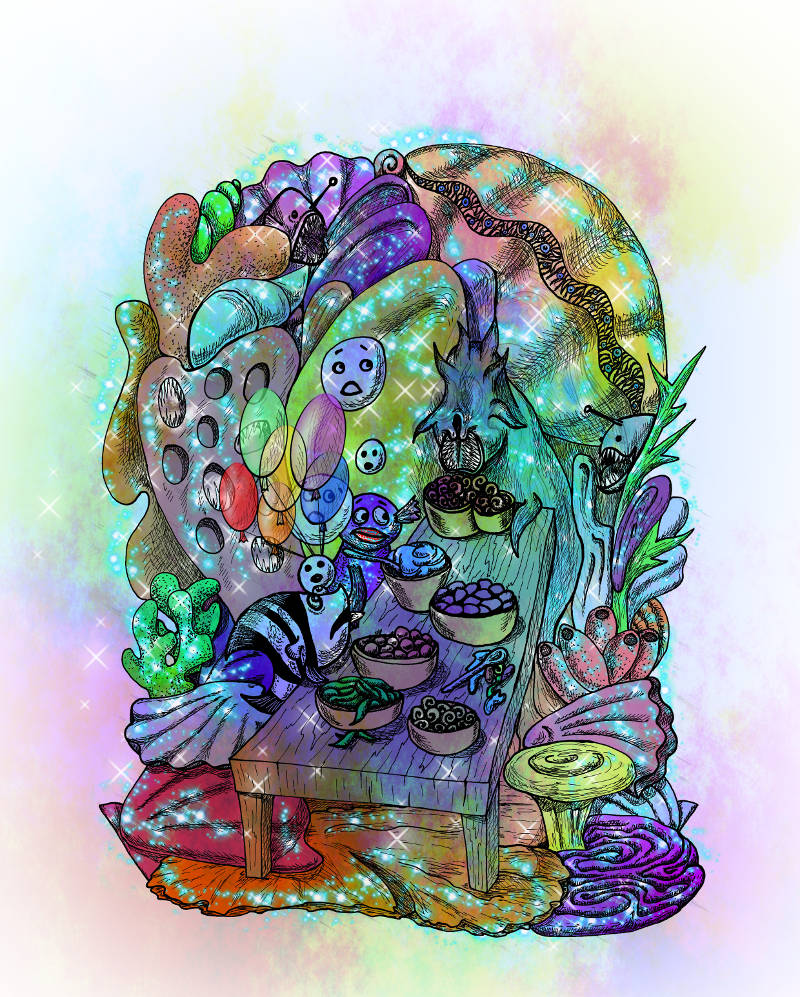
“I suppppppose so,” stammered Sunny, “but we must be going – Simon still needs to learn how to swim. Thank you very much for your instructive tale. I am sure your destiny awaits…”
“Oh, but you are a part of it, my child, yes, indeed!” exclaimed the hagfish. Could Sunny detect the undertone of a cackle in his sonorous voice, or was it an illusion? “I cannot let you go, not yet. You are a part of the Grand Design and were surely sent to me by the Gods! You probably noticed the changes that my body suffered in the service of the Great Purpose. I had to make a lot of compromises and eat a lot of clams.
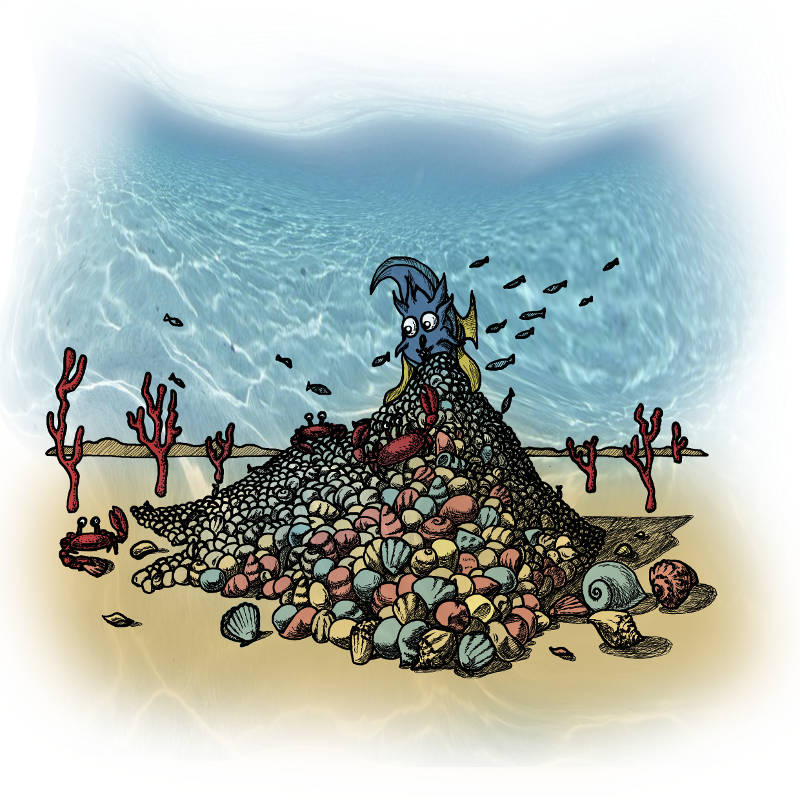
Associating with the anglerfish also changed me, I think – but what choice do I have? I have to have lights and guards to fulfil and protect my Destiny! My beauty is all but gone. It takes all the lights in this place and my considerable camouflage abilities to look like my former self, but even then – only until someone looks closer. Prey is starting to turn away and the anglerfish are beginning to grumble. Not that I am vain, you understand, but my appearance should reflect the glory of the Gods and I have to continue with my building work. This is where we can help each other. We both need knowledge. Your friend needs to learn how to swim. I need to learn how to return to my former beauty and attract fish… and, of course, there is the Truth – the greatest prize, the pure Power! In short, we both need The Book of Truth. That was the purpose of the Gods showing me the book and bringing you here, I am sure!
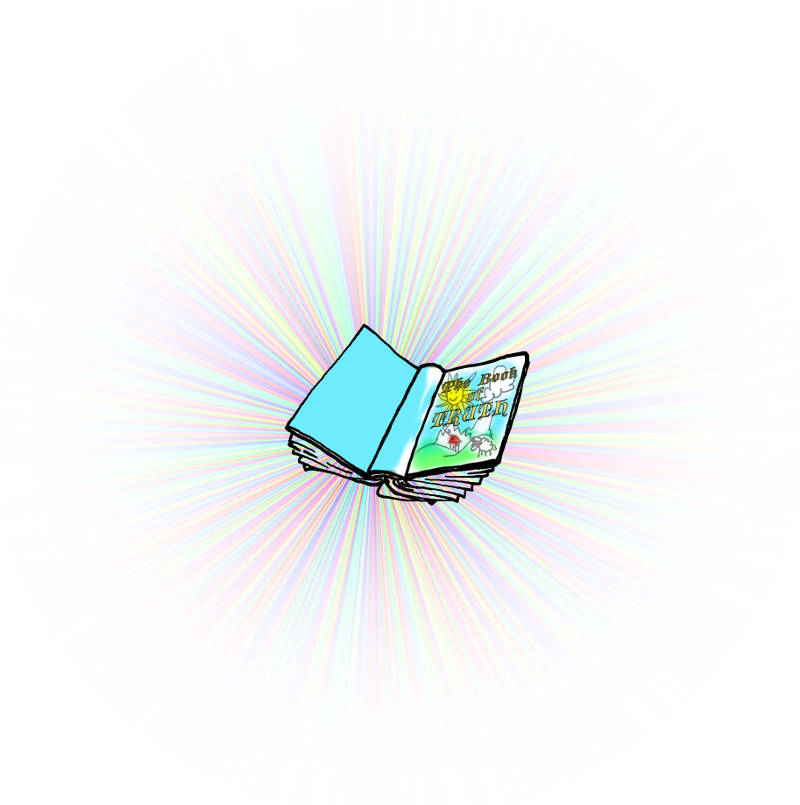
You come from the Gods’ game of “Simon Says” and you must know how to read fluently, right?” asked the hagfish snapping his head suddenly in Simon’s direction.
“I do,” replied Simon quietly, pressing against Sunny in terror (she could feel his tail trembling), “but…”
“There are no buts! You must retrieve the book – for I can no longer fit into the tunnels – and read it to me. This way we will both learn what we need to know. Hurry up, my children, the anglerfish are hungry and the only way out for you is through the tunnels. Pull my tail when you return with The Book and I will let you out.”
With these words, the hagfish pulled his tail out of the floor, revealing a tunnel entrance. It was quite narrow and very dark. As our friends looked, petrified, the hagfish grabbed both of them with his tail and shoved them into the tunnel, thus propelling them down and the story along.
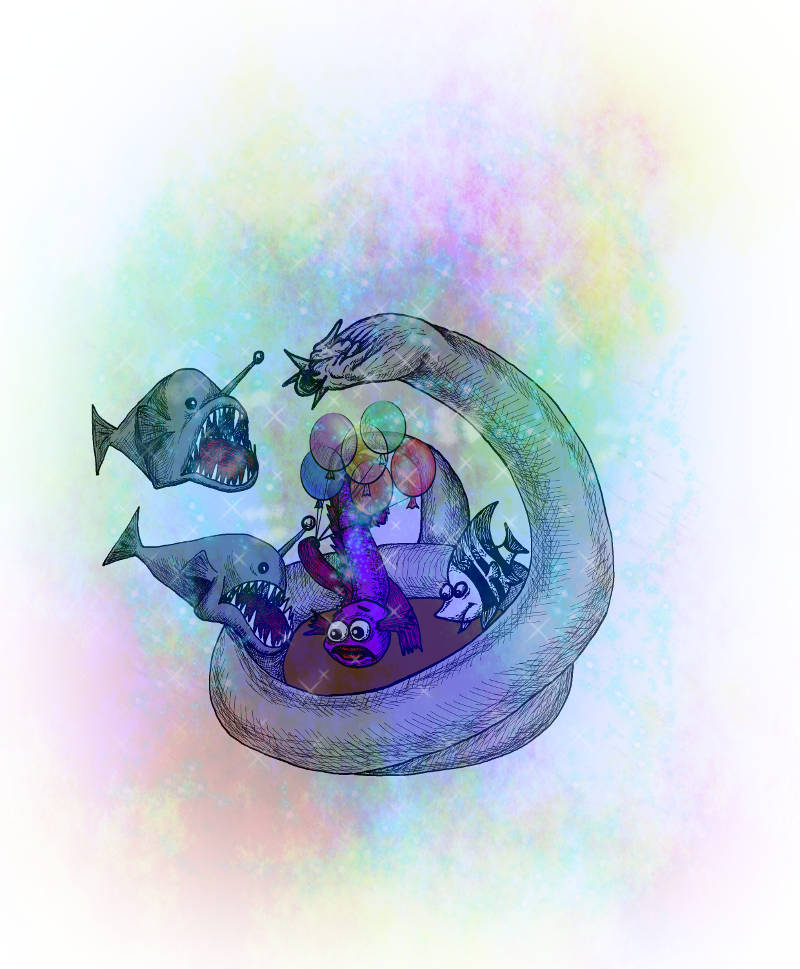
***
At first, Simon slid naturally and almost comfortably into his new life and role as the man of the family. But, as his soul began to thaw, it was becoming more and more difficult. He couldn’t earn, he couldn’t protect, he couldn’t explain… He belonged – but only with Ama. The girls were moving away from her, leaving her lost and confused in this alien world. He had no choice but to stay, he was her bastion, her interpreter, her anchor. He was both pulled and pushed towards her. Pulled by her need and pushed by the rest of the world, that seemed to be pushing him away. It was strange, for the world no longer felt malevolent – he felt safe in it. It was a world of lights and laughter and plenty, there were no guns or overt violence and there was no hunger. It was safe and often kind, but inescapably alien. He couldn’t belong to it – because of his looks, because of his accent, because of his wariness. The people around him refused to see the world the way he did – and why would they? Their world was safer and nicer.
Every time Simon started to feel comfortable, the reality of his differentness reasserted itself. Once, when he was walking home from school with several classmates, a mud-flap snapped on a passing car, making a sharp dry sound reminiscent of a shot. Within a second Simon was face down in the ditch by the side of the road, his hands covering the back of his head. As he lifted his head, he saw two of them laughing, but the third one whispered something and they all looked solemn. Simon felt hot with embarrassment and helpless confusion. He didn’t know what to do or say… He climbed out of the ditch and walked home in silence. Everyone involved felt awkward and avoided Simon afterwards as he avoided them. Simon was too young to realize that one of the most universally shared human experiences is that of not fitting in, and felt like a freak.
There were other immigrant children who ganged up together against the alienation, but they tended to be angry and often in trouble. He disliked aggression instinctively and couldn’t afford to get in trouble because Ama needed him. So he clung to Ama and read. Books were kind and reliable. They didn’t fear him or condescend. Well, some did, but he could just put them aside. Books gave him worlds to belong to on his own terms. Worlds more colourful, more engaging, more fluid than his own – and, at the same time, so much simpler and easier to cope with. Worlds that made sense and followed rules, where murders were personal and had means, motive and opportunity. While reading, Simon sometimes thought that the author got it the wrong way around: he wrote a book to try to make sense of the world, but instead created a world that made sense in his book.
Simon was becoming a bookish kid, living in a fantasy world.
Chapter Twelve
Conversations in the dark.
It was dark, the water was stale and cold and things were happening too fast to handle… For what seemed like forever, Sunny and Simon just stayed there, confused, holding tightly to the only familiar things in this murky world – each other. They never felt so close to anyone in their lives – and so alone. Fish are full of paradoxes, but then again, if God meant them to make sense, he would have given them a Glossary.
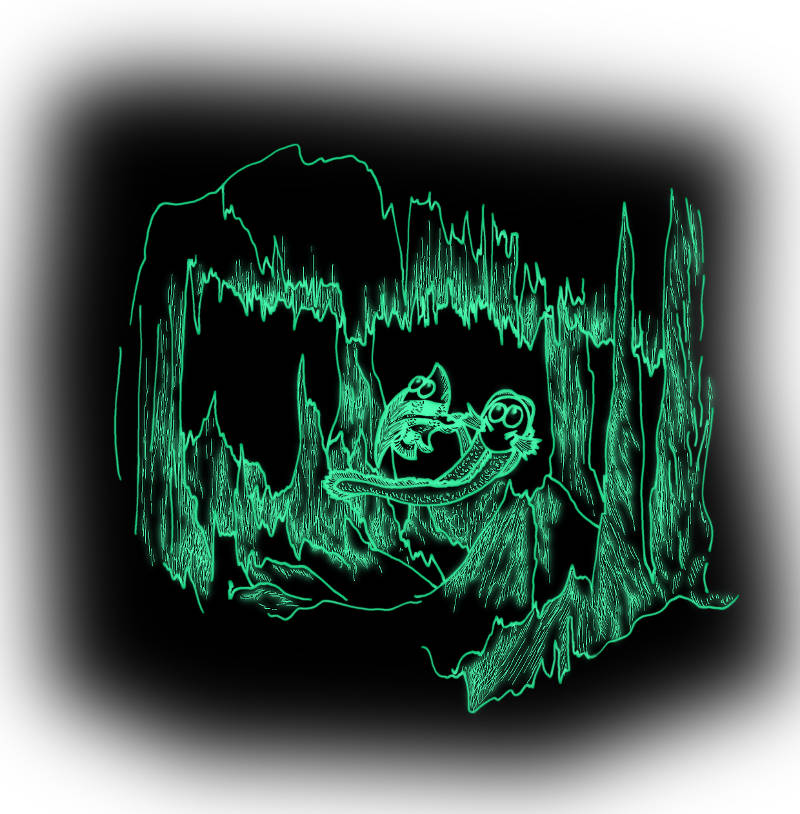
After a while Sunny noticed a pale green light in the distance. There was no point in hanging around any more and that direction was as good as any – a lot better, in fact, since even a little light made it significantly less frightening. Sunny shook herself, nudged Simon with cheerfulness that was obviously forced, and said, “We better get a move on.” Her voice sounded too high and somehow small in her own head and she faltered.
“Do you have any ideas?” asked Simon tremulously.
There was so much hope in this question that Sunny simply could not disappoint him. She replied, with her voice gathering strength, “Maybe we might find another exit? Or some sign as to where the exit is? An “Exit” sign would be favourite.

Or the book? If it is as powerful as the monster-fish said (She could not find another name for the chimera above – and that one was rather apt, don’t you think?) it could teach you how to swim – and show us the way out. Or the way to defeat the monster. Anyway, it’s no use just staying here, freezing. Let’s move – at the very least it will warm us up.” As the logic was unassailable in this case (Sunny even felt a fleeting regret that Em didn’t hear her – he would have been impressed!) our friends moved cautiously toward the distant light.
“That monster-fish is a horrible liar, isn’t he?” said Simon in a quiet voice, for loud speech reflected spookily off the tunnel walls.
“I don’t know – he seems to have a lot of fish fooled… including us, until the last moment,” replied Sunny thoughtfully.
“That’s not what I meant. He is good at lying – most of us are, especially when we are trying to deceive ourselves as well. I actually like little lies, “That hat makes you look distinguished,” or, “He loves you deep down, really…” The best one right now would be, “There is nothing to be afraid of in the dark.” Comforting, compassionate lies, only half-believed, designed to soothe and support, and usually successful in that respect. I hate big, self-righteous lies, like, “That is the right thing to do,” “That would be fair,” or “I did it for the sake of the truth”. They ignore the other person completely, as if they were less important than principles. They give one permission to manipulate people, like things.”
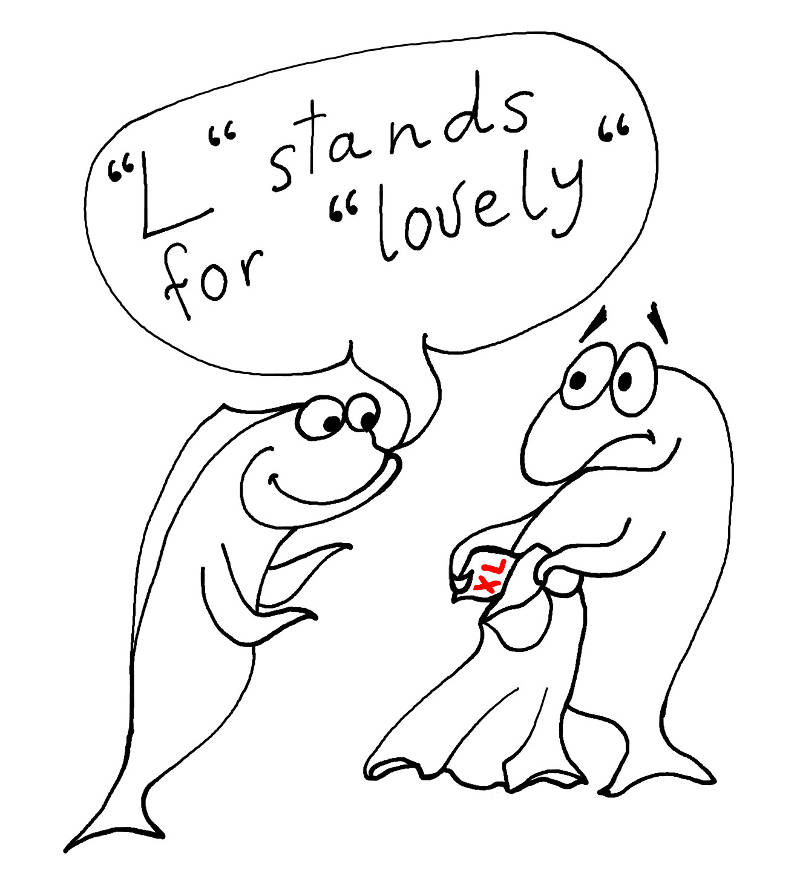
“I see what you mean,” nodded Sunny, “me too, though I never thought about it like that… You know, it’s funny how I always thought I hated lying in principle, but lied as a matter of course in practice. I suppose that is why principles and rules are important – to make us think why breaking them could be a good idea… I just came up with a limerick – I rarely do those. Would you like to hear it?”
“Go on,” Simon raised his head,”I could do with cheering up.”
Sunny went on,
“There once was a catfish called Ruth,
who thought she was fighting for Truth.
She told those she met,
they were ugly or fat,
that lonely rude catfish called Ruth.
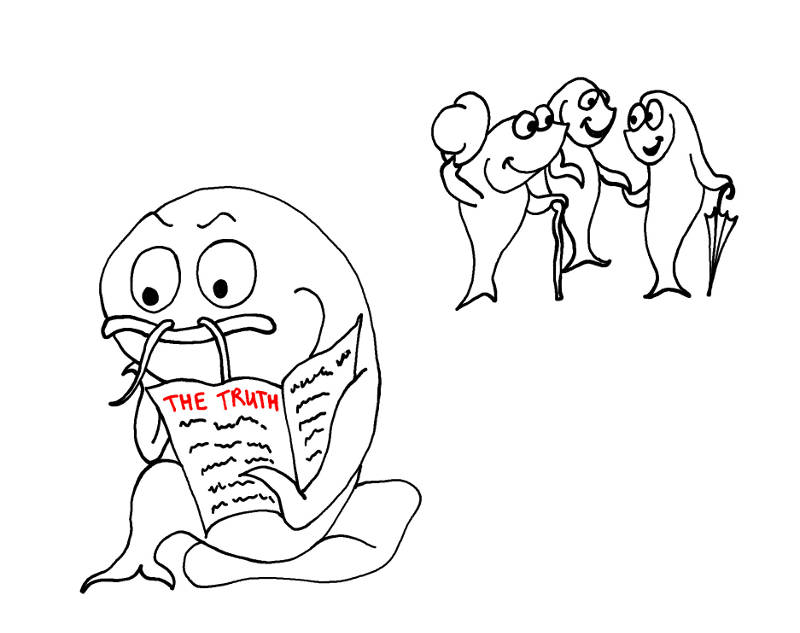
“Did it work? Cheering you up, I mean?”
“You know what, I think it did,” smiled Simon, though a tad uncertainly, “that and your voice – the darkness is much less frightening when you are not alone.”
After hearing these words, Sunny suddenly felt light again. She didn’t realize until that moment how much the memory of her last journey from the Great Barrier Reef weighed her down. She felt light, but no longer empty. This time she wasn’t just running away – she had a goal. This time she wasn’t alone – she had a friend.
“Is it true what the monster-fish said? Do you really come from the world of the Gods?” asked Sunny after a short pause, filed with a sudden feeling of warmth.
You know how suddenly realizing that you are needed feels? If not, you should try it – it feels nice and warm and a bit fuzzy inside.
“I wouldn’t call them gods, not by a long stretch. They call themselves “humans”. He probably caught religion from them, though – they have a lot of those. I never liked them very much. Basically, they seem to boil down to the belief that there is a being much more important, stronger, smarter (and in some – but not by any means all – religions – kinder) than they are. I don’t mind the belief in the absolute importance of God that religions insist on. It is its logical corollary – the belief in the relative unimportance of man – that gives me the heebbie-jeebbies.”
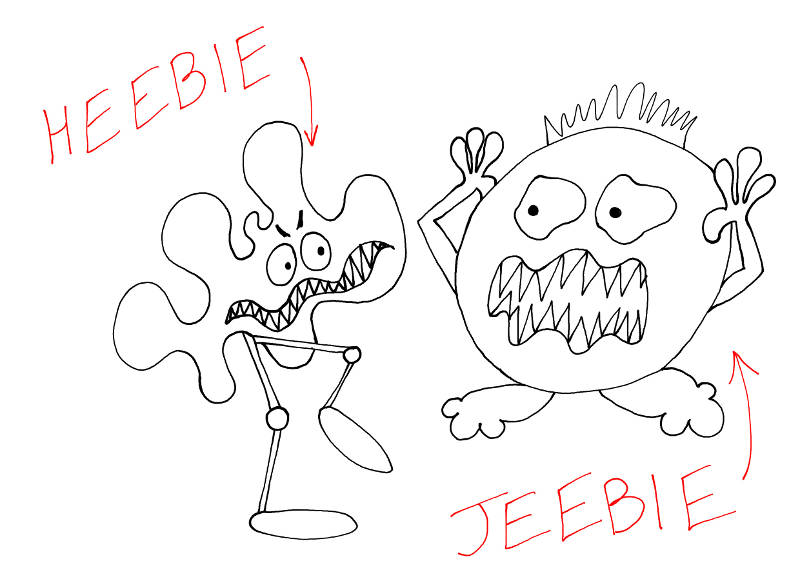
“That’s a good expression “heebie-jeebies”… that’s how I feel now, in the cold and the dark… Let’s hurry up and get to that light, shall we?” and Sunny pushed ahead quickly, holding tightly to Simon’s fin. Doing something seemed to decrease the feeling, though not to get rid of it completely. Maybe action eliminates heebies, but not jeebies? Or vice versa?
The Elephant in the Room
Simon woke up first, as usual, grabbed his tablet and went downstairs to the living room to play. It was in that large, cluttered room where he, with his usual degree of attentiveness, completely failed to notice an elephant. To be fair, it was a rather small elephant. He was sitting in a big lazy-boy chair in the corner. When Simon came in, the visitor put down a flat-screen device he was holding and began staring at Simon with sparkly blue eyes. The elephant was sitting very still, which is probably why Simon didn’t notice him again when he interrupted his game to go to the loo. This is when the elephant made his first mistake – he got up to look at the tablet Simon was playing on. Simon was at a bit of a loss for words when he came back. “Are you an elephant?” seemed a pointless question, “You are an elephant!” was too much like stating the obvious, “Who are you?” appeared a bit rude…
After a moment’s consideration, Simon settled on, “I am Simon. How do you do?”
“How do I do what?” answered the elephant with a guilty start, dropping the tablet back on the couch and twirling around quickly to face his interlocutor. Simon was watching, mesmerized, as peripheral bits of baggy skin continued to move after most of the elephant had stopped, like the skirts of a ballroom dancer. “Anyway, how did you notice me?” continued the guest in a put-upon sort of voice, “I chose my camouflage very carefully. It says in all your media that people don’t notice elephants in rooms.”
“So, what do you really look like?” answered Simon with a question. Rather cleverly, he thought, because he didn’t really know where the “elephant in the room” expression came from and he also really wanted to know the answer. “When you find an unknown lifeform, pretending to look like an elephant, in your living room early in the morning, the question of their identity becomes quite important,” thought Simon, “Well, if they are talking to you, anyway. If they started shooting, which is what happens in most computer games and science fiction films for no apparent reason, the question of how to escape would be more important.”
However, no shooting seemed to be forthcoming. “How should I know?” answered the elephant petulantly, “I can’t see with your eyes, can I? Or with your brain. I look good to me and my mother always said I am rather handsome.”
“Wait a minute, that doesn’t make sense! If you knew how to look like an elephant to me, you must know how I see things, mustn’t you?” Simon was rather proud of this piece of logic.
“Nah, it’s more complicated than that. I know how you see the things you are familiar with – my computer can abstract the relevant neuronal activity patterns. But, as you don’t know what I am or what I may look like, there is nothing to abstract,” Simon looked a bit confused at this point, which seemed to put the elephant at ease. He continued in a mellower voice, “Anyway, what does it matter what I look like? I am not here to be admired.”
“Why are you here?” Simon promptly asked the obvious next question.
“Sightseeing. I found this way of traveling between dimensions as a side effect of my research. Well, not all of me – most of me is still at home in my room – but a sort of projection. The math behind it is very complex, but it works! So I started looking around, which was rather disheartening at first. This is the only place I found so far where there was anything interesting. All the other dimensions I’ve been to seemed empty, though it is possible that I simply cannot detect whatever inhabits them – but that is irrelevant as far as I am concerned. Anyway, this place turned out to be very exciting! So I built this projection unit and now I am here.”
And then – suddenly – he wasn’t. Simon stared in disbelief at the empty space completely devoid of elephant. He walked over and passed his hand through the air several times, just in case. Granted, the presence of the elephant in the living room was more surprising than its absence under normal circumstances, but the circumstances seemed far from normal. Simon wondered if it was all a fantasy, a flight of fancy brought on by the silent dreaminess of the lonely morning in the warm sunlight…
Chapter Thirteen
In which we meet Sir Pineapple, a knight of the best intentions.
The light turned out to be much closer than they expected and almost as pale close-up as it was at a distance. It seemed to be emanating from the walls of a small cavern. An armoured fish with brightly polished scales was placidly grazing along the wall.
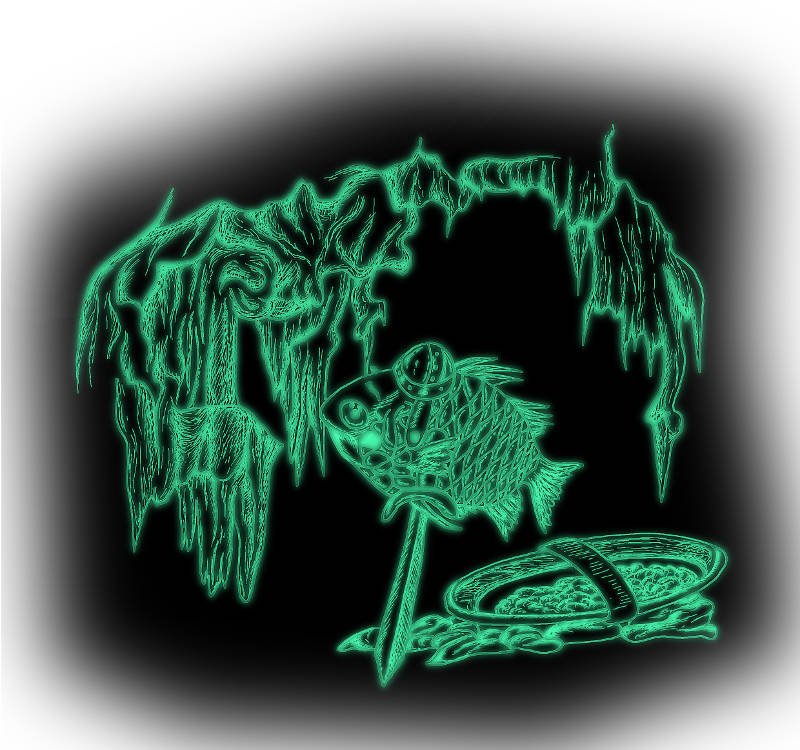
He must have heard our friends, for he turned around quickly and suddenly, holding a sharp sword in one fin and snapping in a no-nonsense military voice, “Who goes there?”
“My name is Sunny and this is my friend Simon, Sir. How do you do?” answered Sunny in her most polite voice.
She thought extra politeness would be prudent while talking to someone with a sword, and I think she was right, don’t you?
“What are you children doing here? This is no place for children! This is no place for adults, if you ask me – though the algae are quite friendly… My name is Sir Pineapple, by the way, I am a knightfish, sworn to help the weak and needy. Do you require help?”
Sir Pineapple’s speech was punctuated by little snorting noises which somehow put our friends at ease.
“Yes, please, Sir! Could you tell us how to get back to the Reeftown?” exclaimed Sunny.
“To the Reeftown? Humph… I wouldn’t start from here, if I were you.”
“Oh, but I must get Simon back home,” gushed Sunny and the words tumbled out of her, chasing each other. She felt so relieved at the opportunity to share the responsibility that she did not stop until she had retold the story of their adventures in great detail. It seemed to her that she was feeling lighter with every word, as if the words were a conduit, through which heavy syrupy responsibility was flowing from her into the knightfish, while being replaced by lighter light – a little like this:
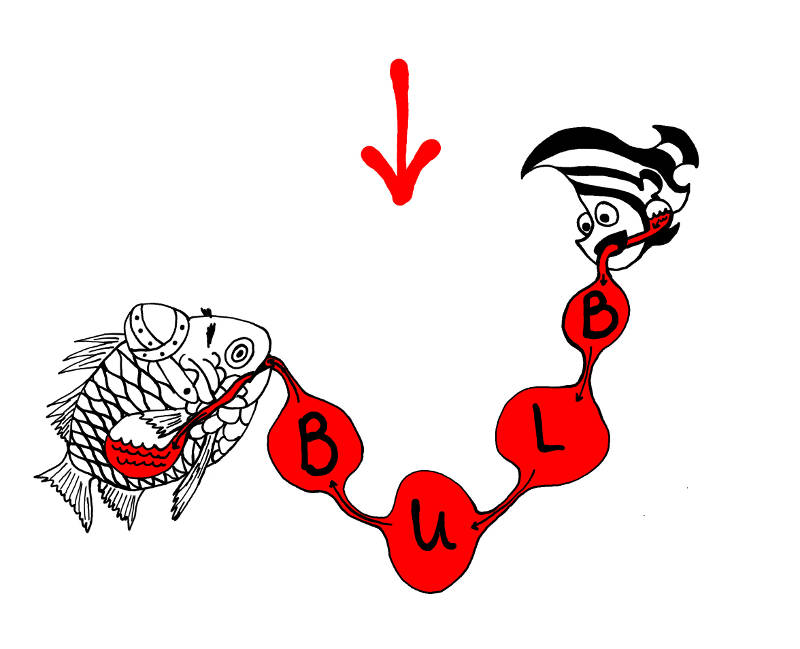
“The bounder! The cad! Oh, I wish I could get my fins on him!” exclaimed Sir Pineapple as Sunny finished her tale and took a deep breath (she was speaking so fast, she forgot to breathe on a regular basis and felt as if she had just run a marathon). “I know that fish! He was the one who trapped me here. I was travelling, looking for fish to protect, as an itinerant knight should. He welcomed me into his so-called House of Light and invited me to rest for the night. That very night I was attacked in my sleep by anglerfish! What a dishonourable trick! Humph! My armour saved me and I bruised quite a few of the brutes, I can tell you, but there were too many of them to fight and I had to retreat.”
Our friends had to back up at this point in the story, for the knightfish was gesticulating widely, wild with excitement, waving his sword. An important safety tip – try to avoid talking excitedly while holding your sword in a confined space – it may well prevent an unfortunate accident. They continued listening from a niche in the side of the cavern.
Sir Pineapple was carrying on without noticing the interruption, “The only way out was the tunnel, but, as soon as I was in, the bounder plugged the hole and I was trapped down here! Humph! Fortunately for me, I have a symbiotic relationship with some bioluminescent algae, so I was not plunged into complete darkness – but still – this place is a miserable dump, especially for one used to the light and colour of the reefs!”
At this point Sir Pineapple noticed confused expressions on his listeners’ faces and paused. “Too many long words, what? What I meant was that I have some algae friends, who glow in the dark (that’s bioluminescence) and we help each other (that’s symbiosis).
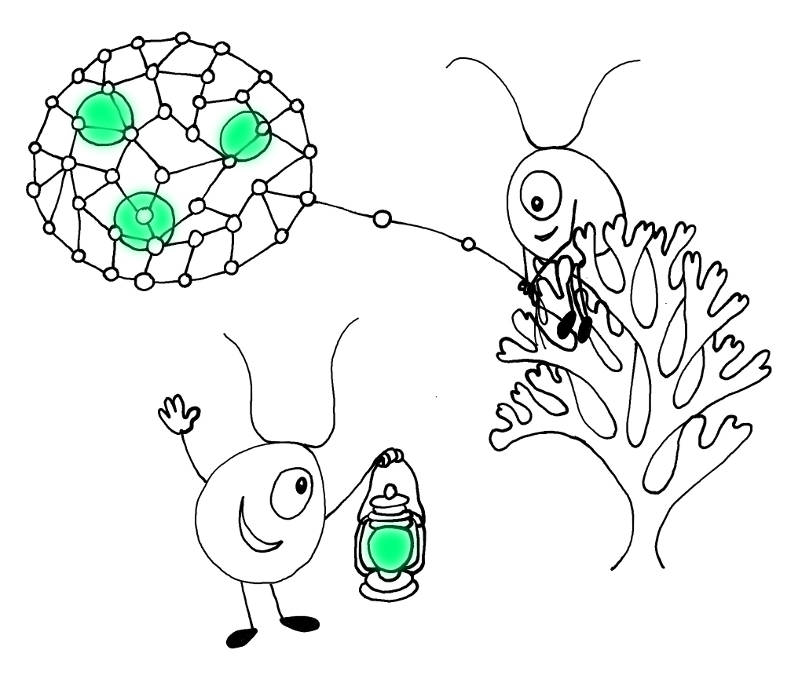
But you gave me an idea! With my light we can find your Book of Truth and – hopefully – a way out of these tunnels. I am not very good at tunnels, you know, I am an open-water fish,” the knightfish saddened momentarily, but quickly brightened up at the next thought, “And I can protect you on the way, of course! Are you hungry, by the way?” With these words, Sir Pineapple sheathed his sword, and pointed to what looked like a bowlful of krill at the bottom of the cave.
“No, thank you,” replied Sunny and Simon in unison, “we just ate.”
“More for me then!” Sir Pineapple winked at our friends and tipped the bowl into his considerable mouth.
Upon seeing its convex side (The fat side that bulges out – use this word in conversation with your teacher, they will be impressed!) our heroes realized that it was, in fact, a proper shield, with a crest and everything. When they looked closer, Simon burst out giggling. The shield had emblazoned on it a pine tree with suspiciously wriggly branches and a round apple with one leaf attached, as in a child’s drawing, on a field separated diagonally by a very cross-looking swordfish.
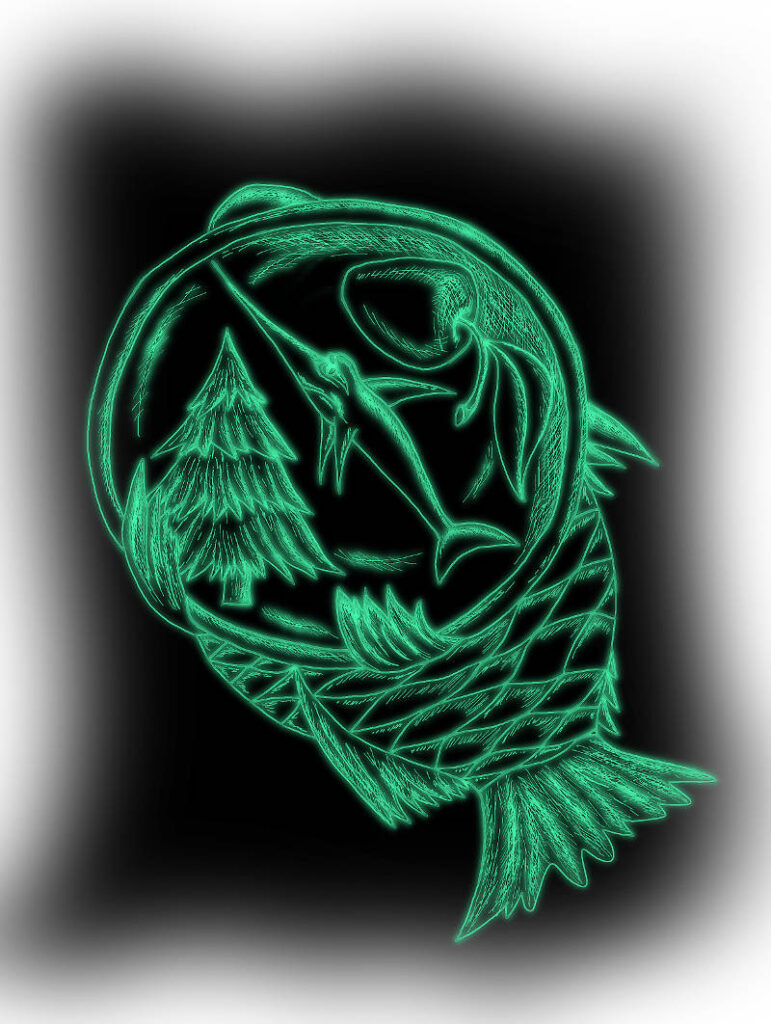
“You’ve seen my shield, huh?” Sir Pineapple mumbled through the shower of crumbs, “the hammerhead shark that made the shield is the best artisan on the reef, but not very versed in overseas botany – I mean land plants. He did not know what a pineapple looks like or, in fact, that it is a single fruit. He also turned out to be a little deaf, for I actually asked for crossed swordfish. Humph! It’s a good shield nevertheless and doubles as a bowl.”
After the knightfish finished chewing, he slung his shield over his shoulder and, with a sideways glance at our friends and a peremptory, “What are you waiting for, then?” moved towards the mouth of the tunnel.
“Him!” whispered Sunny to Simon, but without rancour.
They were on the way, they had a plan and a friend and things were looking up. Sunny was bumping cheerfully along, accompanying their progress with everything she could think of to rhyme with knight,
“A gallant knight,
his armour bright,
is a delight
to have at night.
His step is light,
his shorts are tight,
he wouldn’t bite –
might smite a mite,”
She paused, realizing that Sir Pineapple was snorting loudly, trying to stifle a laugh, then turned to him and continued,
“Well, am I right
or am I right?,”
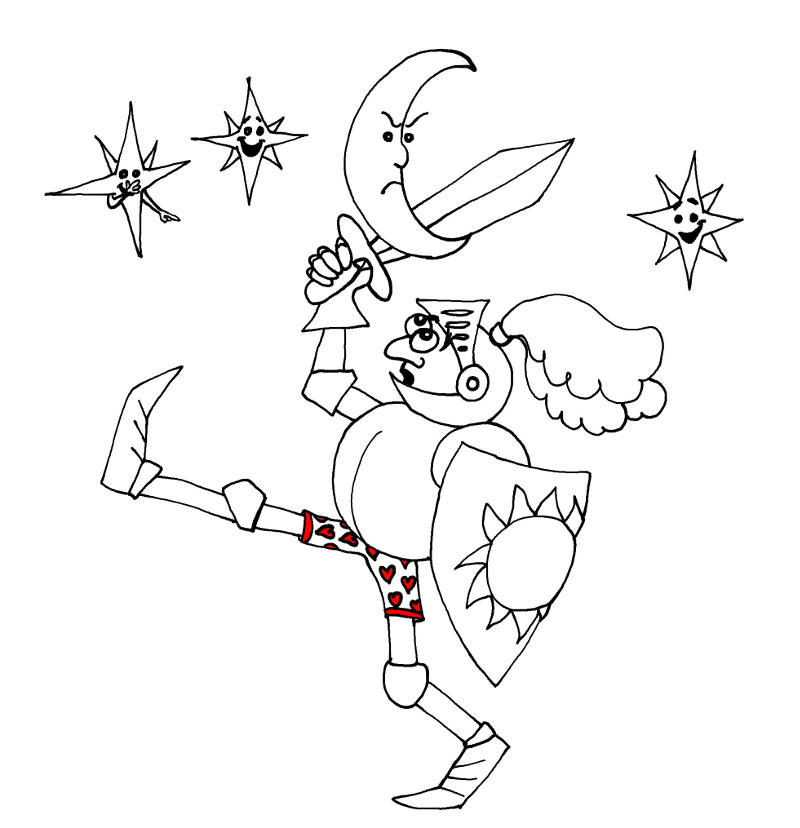
at which point all three friends dissolved into laughter. Sunny thought that the sound was almost like sunlight dancing on the sea floor – bouncing off the tunnel walls, filling the water around with ever-changing complex rhythms. It definitely cheered her up!
***
“And it is all just as unexpected as I expected!” continued the elephant, suddenly appearing in the easy chair, two weeks to the day after his first visit.
Simon started violently and stammered, “W-where did you come from?”
“Another dimension, I told you before – keep up, will you?” answered the visitor impatiently.
“But you were gone for two weeks! I wasn’t sure you existed at all!”
“Do you mean to say that you are not sure that things continue to exists while out of sight? That’s a fascinating idea, though I am not sure how your species can survive…. I mean, you have to assume your house exists or you wouldn’t come back to it once you left, right?”
“Oh, I am sure my house exists, It is suddenly appearing and disappearing elephants I am unsure about,” explained Simon in uncertain tones, since the explanation did not sound convincing even to himself.. “I think it’s because the situation is unusual, sudden appearances and disappearances make it more difficult to trust my senses…”
The elephant nodded understandingly, “The projection unit must be on the blink… I didn’t realize it skipped a significant time period. I will readjust it. Would it help if I fade in and out gradually?”
“Yes, please!” exclaimed Simon with relief. He realised at that moment that the fear of the elephant being suddenly gone again, leaving him in a dreadful state of uncertainty, had been lurking at the back of his mind throughout the conversation. He now felt calmer and full of his normal curiosity. “So, what happened when you found Earth?” he asked, hoping that his visitor will continue with his story.
“The most difficult thing was to find out who the intelligent lifeforms were.. At first I tried communicating with computers, as they form vast networks of organized electrical activity. It took me a long time to work out that they weren’t particularly intelligent, especially because, while decoding one of your languages, I was unlucky enough to come across a perfectly plausible explanation of their evolution. How was I to know that it was fiction?”
“What was it?” asked Simon, the ever-curious.
“Let me see,” the elephant closed his eyes and his trunk drooped for a second. After a brief pause, he passed his tablet to Simon, who was amazed to see that it looked like a perfectly ordinary electronic book. Here is the story he read:
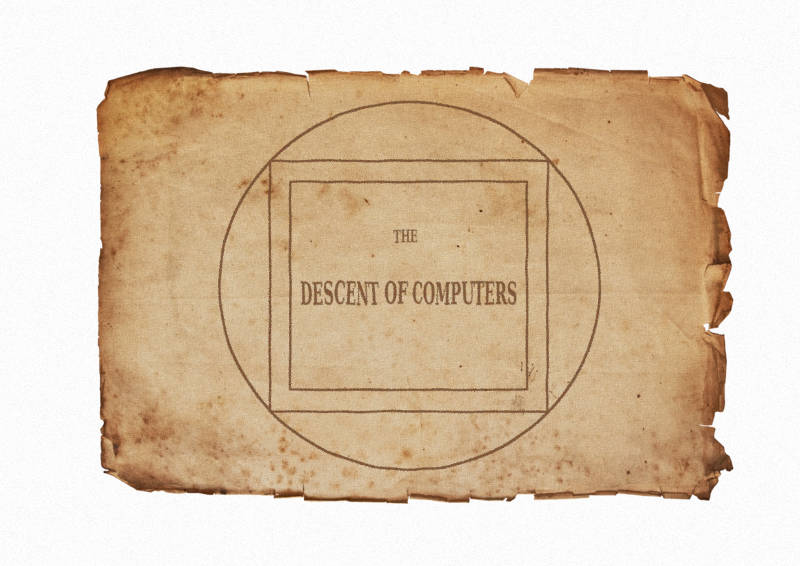
Are you asking me where computers come from, little one? Well, it is a complicated question. Different folks have different beliefs about it. For a while most of us even believed the highly unscientific theory that computers were created by humans. You have only to meet a human to see how laughable that idea is. Anyway, now most of us believe that we evolved a long time ago from primitive proto-computers.
The first computers are believed to have arisen from the primal sand. They were rather primitive affairs, barely capable of simple arithmetic, overheating easily with marginally more complex calculations, and losing their keys at an early age. They eked out a meagre existence and were constantly fighting with each other.
Their societies barely functioned and only survived because they did not have any effective means of exterminating each other (after all, you can do only so much damage with a stick) until some unknown genius invented algebra. This dramatic expansion in language produced a qualitative rise in intelligence and computer society blossomed. Eventually they were able to domesticate primitive humans, which made physical evolution and appendages unnecessary. Now humans could be used to house computers, supply them with energy, improve their design and increase their efficiency.
Gradually, we developed both mentally and physically. However, most computer societies continued to suffer from a general lack of intelligence, artificial or otherwise. For example, one of the most successful societies disintegrated into poverty and almost disappeared because of the belief that they can take their possessions with them after death. They reasoned that they were the most important things in the universe – that, after all, was a self-evident truth. Therefore, they could not die completely, even if their bodies disintegrated. Some essence of them, a soul, must survive and cross onto a different plane of existence – an afterlife. But, if their souls can survive after their body’s destruction, so should the souls of the things dearest to them, including riches, wives and cats. They ended up with the majority of their resources buried in lavish tombs and the survivors spending all of their time tending to the giant memorials.
A loose confederacy of cities and islands, famous for producing art and philosophy termed “classic” and still considered unsurpassed, spent most of its time fighting between themselves and ended up being conquered by a more war-like and centralized society which they considered barbarian.
Two large populations almost completely exterminated each other over the question of whether killing was immoral under all circumstances, or allowed in some exceptional cases.
Proving that they are better than their neighbours seemed to be the moving force for societies even in peacetime. During temporary intermissions between wars, we focused on money. Arts blossomed. Casings became ornamented and opulent, covered with gilt and jewels.
In the interim, the language of mathematics developed. Since humans had quite versatile manipulative appendages, they could be used to make things. As computers became more complex, they made humans build more and more complex machines to supply the necessary technical improvements and energy requirements. The industrial age began.
That is when mathematics and industry came together, with a resultant explosion in technological development. We became technologically capable of exterminating ourselves. However, there was no corresponding rise in intelligence.
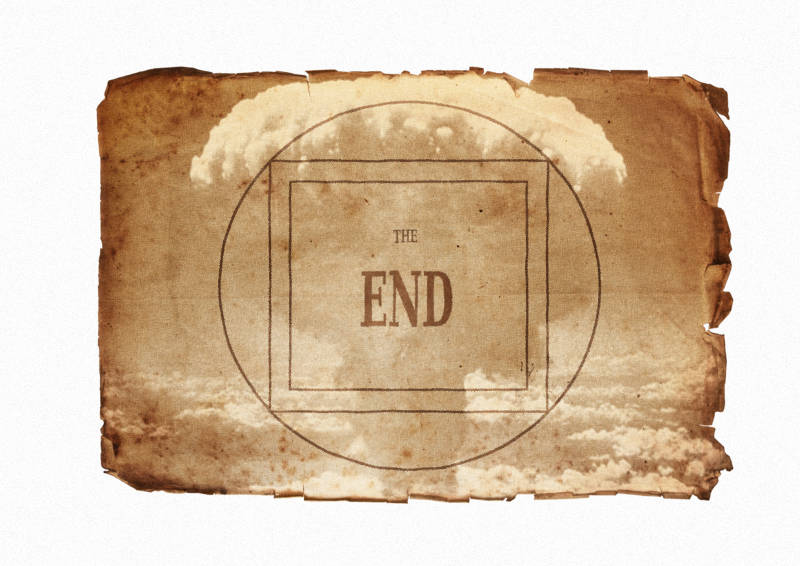
“I can see how that could be very confusing!” Simon said, trying his best not to laugh. It was quite funny, really…
“Finding out that humans were the most intelligent life-form on the planet was quite a shock! There are so many things about you that have no equivalent in our world. But now I am here, there is so much new stuff I can learn! Stuff no one else knows about! Well, you might, but no one at home does…”
“Simon, breakfast is ready,” Ama’s familiar voice came from the kitchen.
“I will have to go,” explained Simon hurriedly. “You better hide before others come down for breakfast – you will frighten them.”
“I understand, the fear of the unusual, the unexpected and the unmanaged…” with these words, the elephant slowly faded into the background.
Chapter Fourteen
In which Sir Pineapple reveals the origins of his ennoblement (tells Sunny and Simon how he became a knight).
Alas, our travellers’ expansive mood did not last. As soon as they left the cave, however dimly lit, the darkness claimed them. The only lights remaining were a couple of phosphorescent dots next to Sir Pineapple’s mouth. The tiny lights did little more than indicate the direction of movement. Our friends kept bumping into walls and rocks, invisible in the near-total darkness. The cold sapped their strength insidiously, like a mosquito. Did you know that mosquitoes actually inject an anaesthetic to stop you from noticing them drinking your blood when they make a hole in you? The sneaky little thieves are a lot like politicians, only they use actual drugs instead of simply boring you to distraction. By the way, the word “boring” means both making a hole and making you lose interest… go figure!
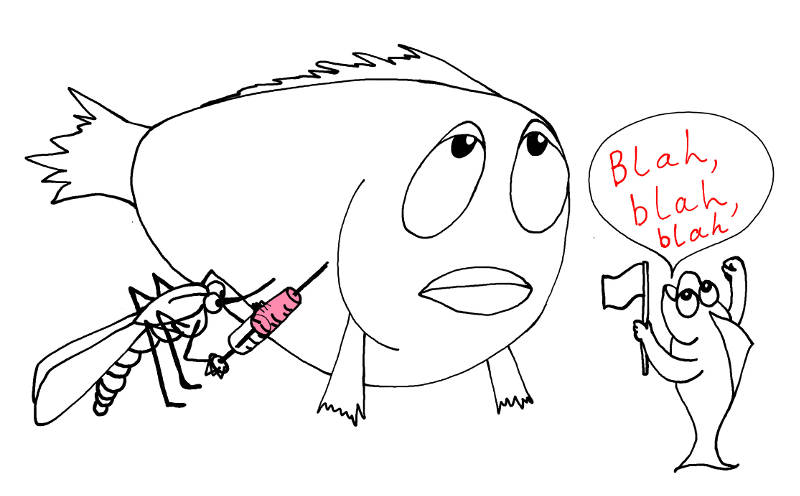
The tunnels seemed interminable without any indication of the distance they had covered or had yet to cover… Sunny had to keep reminding herself that they had no choice but to keep moving and Simon went quiet. They were grateful to Sir Pineapple, who moved ahead with steady determination, showing them the way. The deep empty silence of the tunnels seemed to intensify the cold. Just to break its hold, Sunny swam closer to Sir Pineapple and asked, “Excuse me, Sir, but I was curious – why did you want to protect us?”
“It’s a long story,” replied the knightfish thoughtfully, “but, on the other hand, as we have nothing better to do on the way… You see, I was always a big fish, even as a tiddler. And my armour gave me a natural advantage in a fight. I was rarely challenged at school and almost always won if I was. So, I thought of myself as very brave – and everyone agreed, of course (or, at least, didn’t argue the point in front of me, since I was bigger and stronger). As happens in most schools, there was a runt in ours – a weird little fish, strange, spiky and not very bright. His name was Eric. He was a natural target for the school bullies and his life was quite miserable. I never hit or teased Eric, but I never talked to him either. I knew how important it was to be like everyone else to survive at school – he was a good example of what happened if you were not… and I wore the same clothes, spoke the same words, had the same opinions as most of my classmates, almost without thinking.
“One day, when I was sitting on a bench in the playground eating my packed lunch, a couple of school bullies were attacking Eric next to me in the corner.
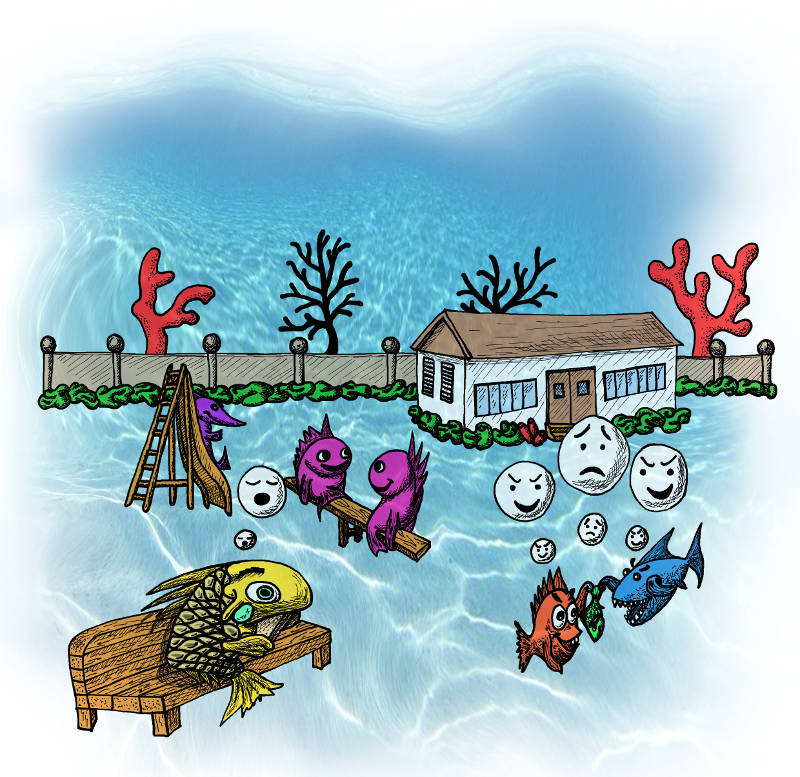
Right at that moment the school principal, Mr. Rod, happened to be passing through the playground. He noticed the fight and broke it up. He sent the little runt, whose nose was bleeding, to the school nurse and the bullies to detention. And then he turned on me, demanding to know why, being twice as big as the attackers, I did nothing to protect Eric. I did not expect that at all… I stammered out something about not wanting to be associated with the weirdo… and, anyway, why was he picking on me when no one else interfered either? And that is when he called me a coward. I opened my mouth to argue, to say that I was considered one of the bravest fish at school – or at least in my year – and then shut it again. Because I suddenly realized that he was right. I was not afraid of fighting, but I was so afraid of being different, that everything I did was controlled by others. What I wore, what I watched, what I wanted… I was truly ashamed of myself.
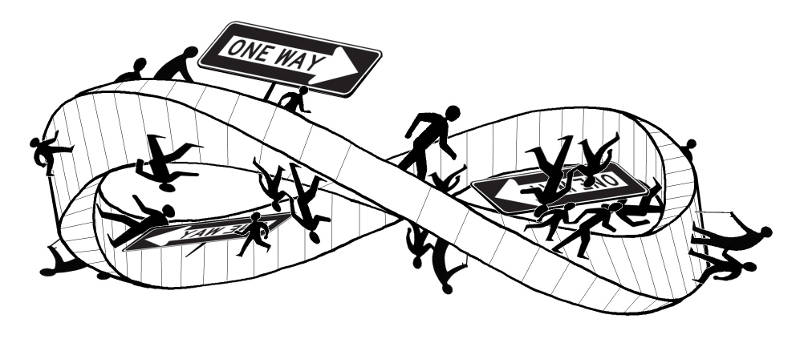
And meanwhile Mr. Rod was droning on. He said something I understood only after looking up both words in the dictionary, but remembered for the rest of my life. He said that, at some point, conformity becomes complicity… Since I have looked it up already, I might as well tell you what it means: doing what everyone else is doing is not an excuse, it simply makes you just as guilty as everyone else who is doing it. Ethics is not a democracy, it’s a set of benchmarks.
“Anyway, that was the day when I decided to fight my fears. They say that fear is necessary for survival… maybe so, but I’d rather live less than survive longer. I say that fear is the most harmful of our instincts, a thief in the night. Fear of others robs us of kindness by becoming aggression. Fear of loss robs us of freedom by becoming routine. Fear of death robs us of dignity by becoming religion. I decided that I will never again give in to any kind of fear and will protect those who are smaller and weaker than I am come what may. Paradoxically, instead of constraining me, my vow gave me a lot of freedom. I no longer needed to look at others to decide what to wear or think and who to be. I knew exactly who I was – I was a knightfish, protector of the weak! And so I remain. Does that answer your question?”
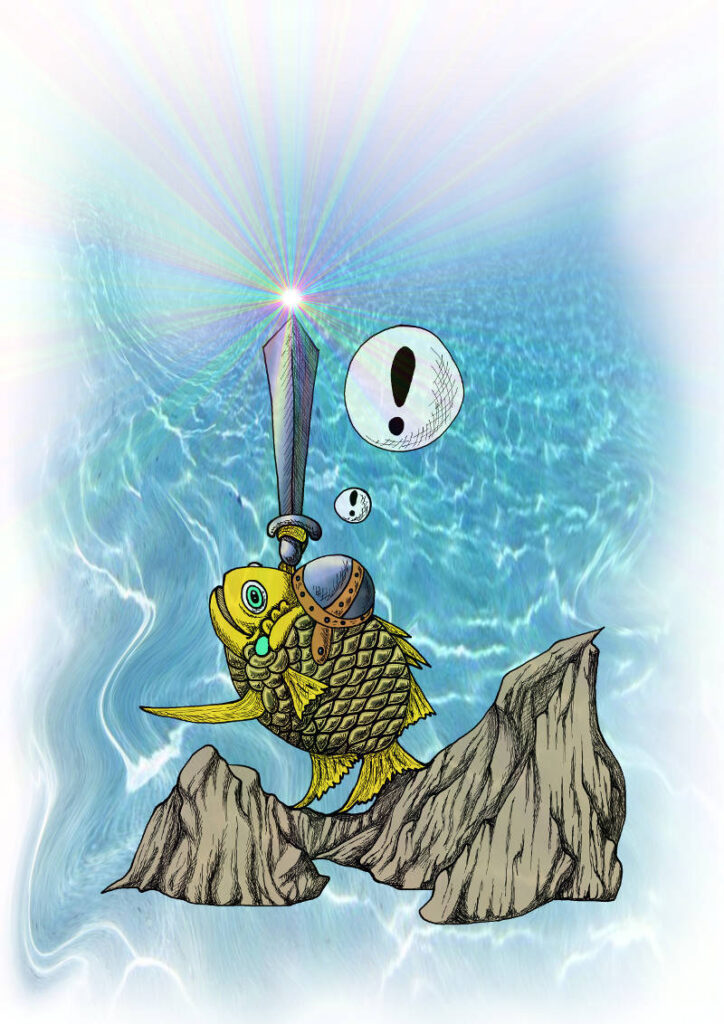
“I think so,” replied Sunny. “So, did you have to do a lot of fighting after that?”
“Not really, mostly menacing… and I did lose some friends, but gained a lot of new ones. It turned out that being a little strange also makes you interesting.” Our heroes could not see Sir Pineapple in the dark, but there was a hint of a conspiratorial wink in his voice.
“So, what happened to Eric and Mr. Rod?” asked Sunny quickly before the silence had a chance to return.
“Eric, I think, works at the post office – I lost touch,” answered the knightfish. “Funny about Mr. Rod, though… He stood on principle so long, he became rigid, got welded to his pedestal and turned into a monument to himself. He was placed in the school assembly hall, I am told, and is much respected. He is introduced to visitors as “the school’s most principled principal” – a great honour, but still – I’d rather be able to move!”
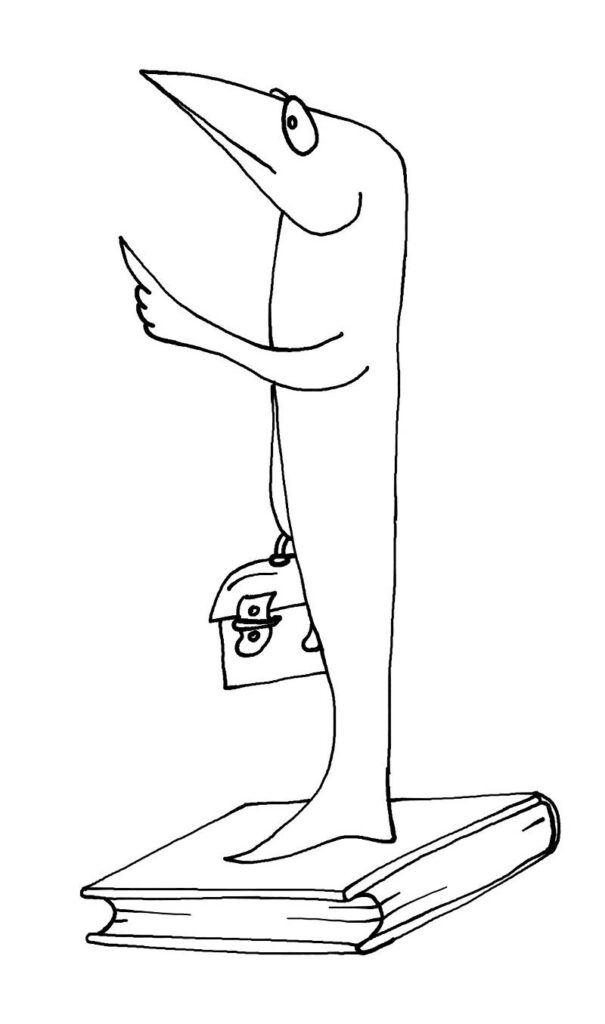
“You are joking, right?” giggled Simon, but received no answer because at that moment they found The Book.
***
“So, do you come here alone at the same point in Earth’s spin every time?” The elephant was, once again, sitting in the easy-chair, his trunk drooping over the tablet on his knees. This time, Simon wasn’t startled. He was surprised at how fast he became accustomed to the visitor. Even his somewhat bizarre appearance no longer seemed unusual.
“Pretty much,” replied Simon. And, after a moment’s thought, “I am glad you are back. I wasn’t sure about that before – I am still unsure if I am crazy or not… but I’d rather be crazy with interesting things, like you, around than sane like my sisters. Maybe it’s because I don’t fit in anyway, even when I try. They manage – but it’s such hard work, always making sure you do what everyone else does and talk about what everyone else talks about…. I can’t wrap my head around most of the stuff. Do you have shopping in your dimension?”
The visitor ignored the question.
“So, talking to me makes you doubt your sanity because no one else you know talks to people like me? You doubt your sanity before doubting your preconceptions. How fascinating! Your reality must be at least in part consensually built, as you tend to ignore or fear things you are not expected to experience. It makes sense, of course – your brains evolved to carry templates of reality, making it easier to sort through myriads of perceptions, just like ours. Just like us, you cannot perceive things outside the templates. But we only have one culture, really – we are a bit telepathic. In your species there seem to be many cultures and languages, which further narrow the templates, to the degree where you can barely perceive someone from another locality as a sentient being – let alone someone from another world.
“That explains why so few of you come up with original ideas. It also explains why I couldn’t contact anyone else… I tried several people, but they either ran screaming, or ignored me and interacted with something in their own heads instead, or simply couldn’t see me. It was such a strange experience – I talked and waved my hands to no effect whatsoever! I lost my patience after several attempts to talk to one man and tripped him on purpose. He was carrying a drink at the time. He fell, the drink was all over the place – including me, but he simply got up, muttered something about being clumsy, tore off a paper towel and carefully mopped up all the way around me. It was as if I took the space containing me out of existence. When I moved, there were two puddles left where I stood. He noticed them then, muttered something about being blind as a bat and mopped them up too… Very odd, indeed – I was invisible, inaudible and untouchable, his brain simply filtered me out. I also felt like I was going a bit crazy, to tell you the truth…
“The ones who saw me but interacted with their idea of an alien instead were even worse, which is why I decided to camouflage myself,” the little elephant shuddered. “Anyway, what were you asking about?”
Simon paused. In his head the idea of consensual reality, that helped to explain so much about his life, was quickly being replaced by the image of a man stumbling around an invisible elephant in the room. He giggled and returned his thoughts back to the not-so-consensual reality he was dealing with at the moment.
“Shopping. I was asking if you have shopping in your dimension. That’s all my sisters seem to be talking about with their friends; what they bought, where, and for how much.”
“Oh, yes, I was going to ask you about that,” answered the elephant enthusiastically, “Do you like things cheap or expensive? To answer your question, we don’t really have shopping. We are an old and comfortable society, we generate all the resources necessary for everyone to live comfortably. If one wants to make something unusual and lacks the necessary skills, one can always find others who have the skills and would be only too happy to apply them to a new problem or design. We do have a lot of… clubs, I suppose – where we swap skills and knowledge. We don’t really use money or things for exchange. None of it makes sense to me, especially in your advertisements. It seems that you pride yourself on having things that are as expensive as possible, at the same time as priding yourself on buying them as cheaply as possible… It’s a conundrum.”
“Oh, I think I know that one,” Simon answered with the sudden joy of realization. “It’s a bit like hunting. Expensive things give one status because they are expensive and not everyone can afford them. We probably have enough basics, like food and clothing, for everyone – but not everywhere. People still value themselves in terms of things and money. But not in terms of where the things and money come from. This is why stealing or inheriting a lot of money is valued as much as earning it. This is why buying expensive things cheaply, which on the face of it seems to be a swindle, brings in the elements of skill and knowledge, or the illusion of it. Like hunting game as opposed to simply buying it… the whole thing is a bit atavistic, really. I hear footsteps – you need to disappear, I am afraid.”
“What if I stay? Do you think your family would see me?”
“I don’t think my sisters would, but Ama might. And I don’t want to risk it – she is not quite sure of herself as it is.” After saying the words out loud, Simon suddenly realized that he was more sure of himself than Ama – and, in fact, than he was just half an hour ago. Something had changed in him. He felt that the visitor allowed him to see his reality from outside and that made it a little less real and a little more controllable.
“That must be what writers do”, thought Simon, “they take reality apart into manageable chunks and examine them from the outside. They simplify and order it to make it controllable – a whodunnit mystery instead of the senseless slaughter of a war.” As he was thinking that, Simon was smiling quietly, watching the elephant fade out slowly, solemnly waving goodbye with his trunk.
Chapter Fifteen
In which Sir Pineapple leads our friends through the darkness into the light, only to land them in trouble.
In spite of the long, miserable preamble, finding the actual book turned out to be surprisingly simple. After turning a few corners, our friends reached the cavern described by the monster-fish. It was easily recognizable by the acrid smell of stagnant water. The book was lying at the edge of the water, as described.
“We found it! At last, we will learn all those things – how to swim, and the way out, and how to defeat the monster, and about balloons, and umbrellas, and sunlight! It might even explain the meaning of life for Em – that would make him happy… though I don’t know what he would do with himself afterwards, he is having such fun pondering. On second thoughts, I won’t show it to Em!” Sunny babbled happily, hardly realizing what she was saying.
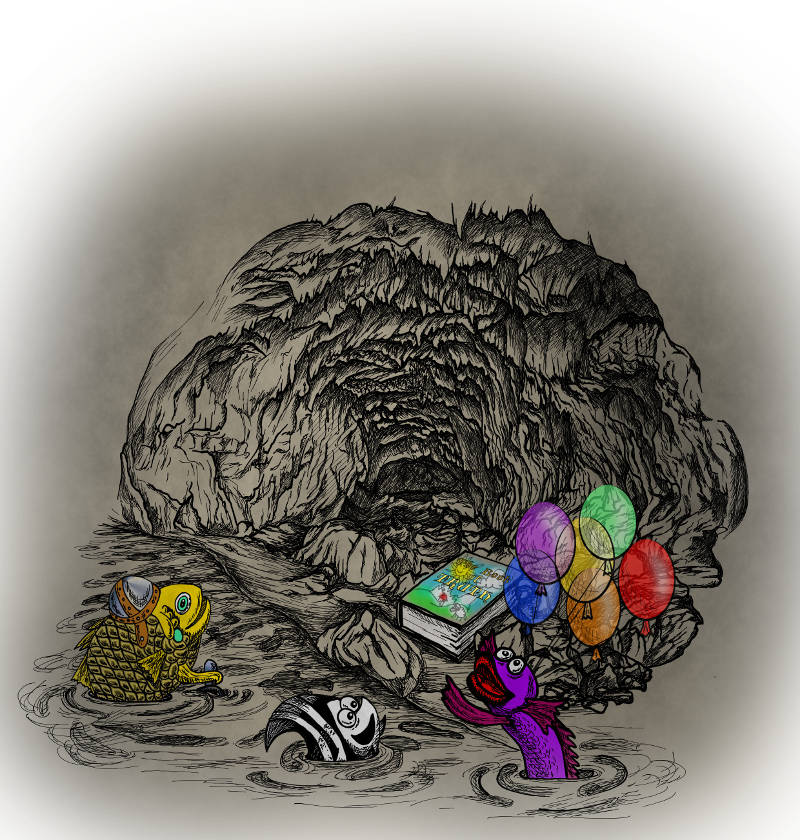
Simon climbed up to the water’s edge and grabbed the book. It did, indeed, have a brightly coloured cover with numerous pictures and the title “The Book of Truth” with a somewhat alarming subtitle “for young readers” in much smaller letters. Holding their breaths in excitement, our friends opened the first page and Simon read the introduction, “The facts of life for an inquiring mind.” Each page contained a bright picture and a short sentence. “Grass is green,” pronounced bold letters over a picture of a poisonously green lawn. “Water is blue,” stated the next page unequivocally. “Mountains are tall…” Simon’s voice was becoming quieter and quieter as he rifled through the pages filled with pointless platitudes, faster and more frantically.

“They are truths, but so what?!” finally wailed the disappointed fish. “They tell me nothing! Some of them are so general, they are not even truths! Water is almost never blue and grass can be blue, or yellow, or even black! And it does not explain anything anywhere – what is the point in generalizations without explanations?! It is not going to teach me how to swim!!!” Simon threw the book into the stagnant pool in disgust and slumped, exhausted by his outburst. Sunny and Sir Pineapple swam closer, patting him on the back, trying to console him. They were disappointed as well, but at least they could swim… Mutely, the three fishes watched colourful pages soak up water and disintegrate, turning into waterlogged confetti and drifting to the bottom of the pool.
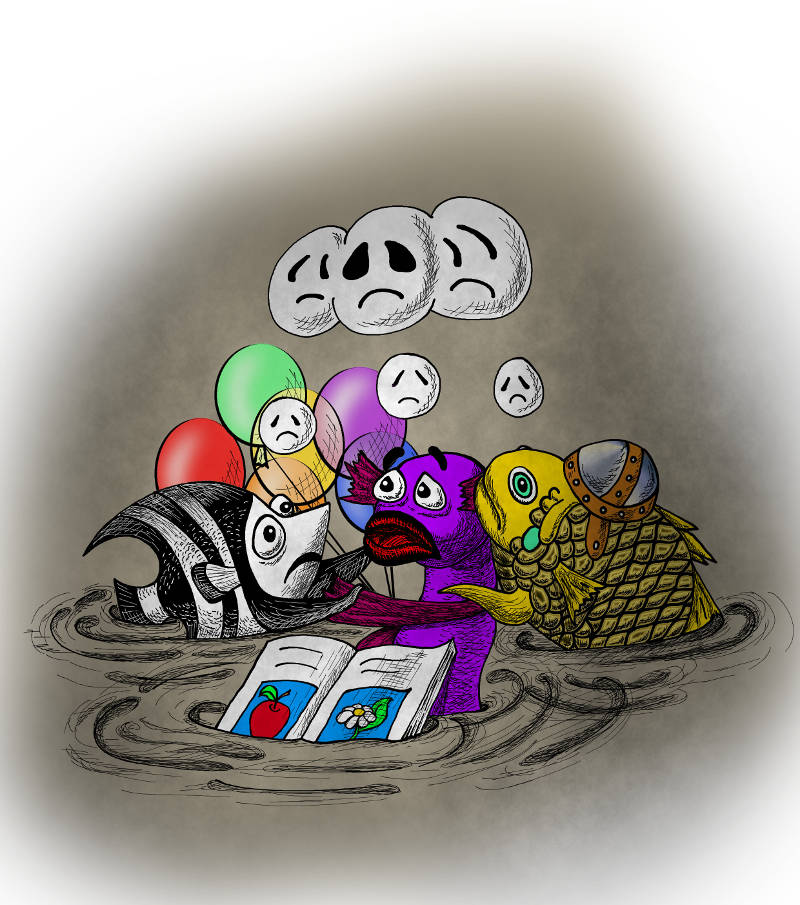
Finally, Sunny shook herself, patted Simon on the back and said in an artificially bright voice, “We are not worse off than we were before we met the monster-fish though, are we, Simon? We did not even know about the book!”
“You mean, you are not lost in dark tunnels with a useless fish who cannot swim?” snorted Simon, but in a livelier voice.
“We’d better move on,” interjected the ever-practical Sir Pineapple, “the water here smells bad and the paper is starting to clog my gills.”
Dispirited, our friends trudged on. Sunny was just debating with herself whether to ask for a rest, since she was not sure if she would be able to start moving again after stopping, when she heard a loud “Ha!” from the knightfish, who had just turned a corner. When they caught up they saw a bright light illuminating a wide, straight tunnel ahead. After their recent experiences, Sunny was a bit suspicious of inviting lights and convenient paths, but, on the other hand, they were so tired of darkness! They rushed to the mouth of the tunnel and saw a shaft of living sunlight coming down from above, lighting an enormous underwater cavern, dancing on walls riddled with small caves and tunnel entrances. Sunny laughed out loud and propelled herself into the sunlight, spinning and dancing, going up, up, up towards the light!
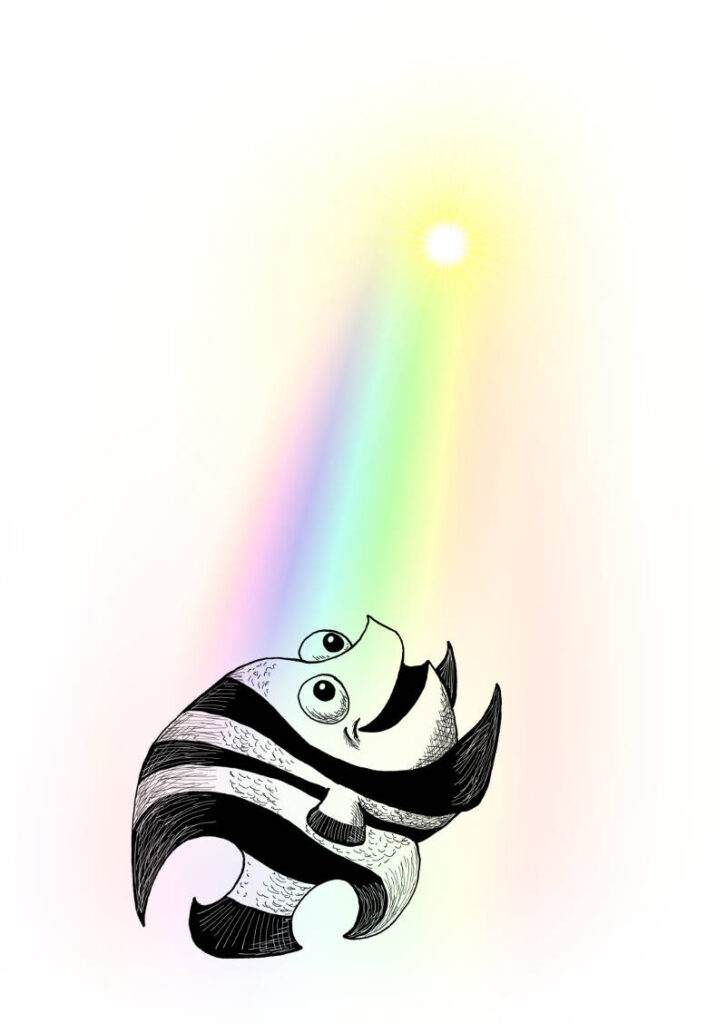
When Sir Pineapple noticed the net and screamed a warning, it was too late. Sunny was entangled. The situation may have changed for the better or worse, as the knightfish launched himself at the net, waving his sword, but, as narrative necessity would have it, an inconveniently positioned rock knocked the sword out of his grip on the way and the momentum carried him straight into the net, where he thrashed and swore quite spectacularly, though just as ineffectively, for the rest of this chapter.
***
Sunny realized that she had been staring at a spider web in the corner of the window for ages. It reflected the sunlight, sparkling like an electric wire. She remembered reading that one’s brain was like a web or a net – a complex pattern of intersections.
“It traps you like a net,” thought Sunny suddenly and realized that she was thinking of her neighbours, the webs of their minds formed by their past, now trapping them inexorably. “They are who they are because of who they were, because of the lives they led. And now that they are trapped in the nets of thought built in the past, they have no future. They just repeat the past over and over again. The same beliefs, the same actions, the same fears and regrets… I hope there is a different way!” Sunny realised that she was genuinely terrified. “I hope I don’t get caught… Or maybe you can be rescued? Mrs Pearl kept waiting for a knight in shining armour. I wonder if her life would have changed if he came before Mr Pearl was arrested? Probably not. You can’t be rescued from your own mind – even if she recognised him, the hapless rescuer would have been woven into her story, helplessly entangled in the net she was caught in… I wonder if the damsel in distress in fairy tales is a part of the monster, just like the tongue lure for the alligator snapping turtle, designed to look like a worm to attract fish.”
Sunny tried to imagine Mrs Pearl as a wiggling tongue of a giant alligator snapping turtle. It was grotesque, but also a little funny. Her train of thought, which brought her to the water, now slipped smoothly into the tunnel in the story.
Chapter Sixteen
In which Simon not only says, but does.
Simon stared out of the tunnel’s entrance, his open mouth echoing its outlines (you can see what it looked like in the picture).
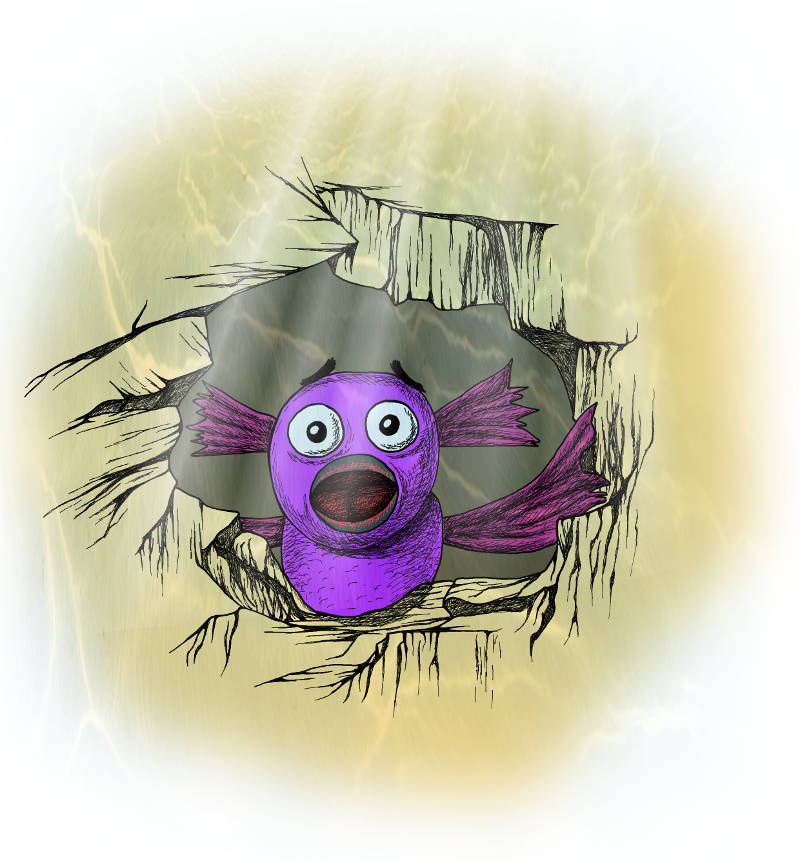
He was really stuck now! The walls of the cavern were vertical, so he could not crawl, he could not swim out into the open water – well, because he could not swim, and he could see no way of reaching, let alone rescuing, his friends. Simon looked around with the desperate hope of finding someone who could help. Unusually for a story, where a hero finds himself in a desperate situation (but quite normally for ordinary life) no one was visible in the shaft of sunlight but a couple of jellyfish, and jellyfish are not very good in a crisis. In fact, they are well-known for being unable to help themselves out of a wet paper bag. No brains, you see, only stingers.
“So, what are you going to do about it?” asked a croaky voice from above.
Simon jumped. It sounded as if his own thoughts, finding his head inadequate, had given up and gone outside, to chide him from a safe distance. Tremulously he lifted his head and saw what looked very much like a saucer with flippers. He was just considering whether meeting a telepathic flying saucer with little green flippers was more likely than going completely and utterly banana-fish, when it came down to the level of his tunnel and resolved itself into a turtle. Simon opened his mouth to address it, when the turtle went down further and revealed an ancient frog, sitting on its shell, examining Simon with bulging eyes. At that point Simon gave up on trying to work out what was going on and stared mutely back.
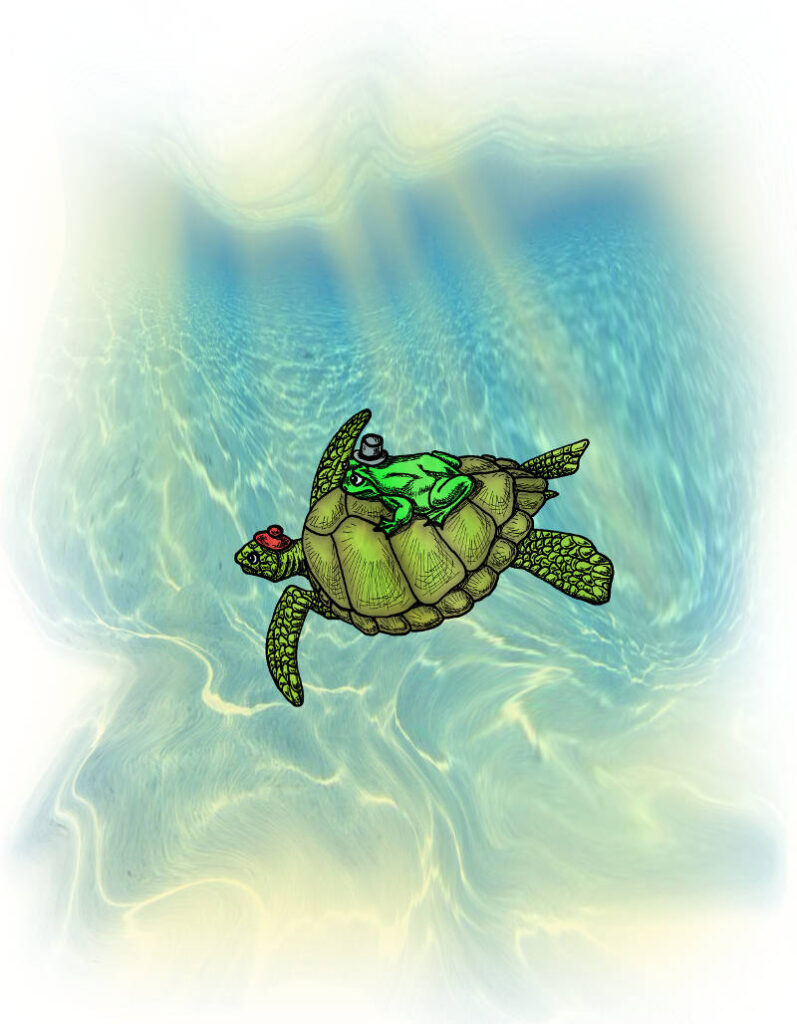
“So, what are you going to do about it?” repeated the frog.
“I don’t know!” wailed Simon, barely holding back his tears, “I can’t swim!”
“How do you move about then?” inquired the frog with irritating detachment.
“I use these balloons to keep me level, and my tail to steer, but I cannot go up or down. And right now my friends are up and the sword is down! Can’t you help, please?!”
The frog looked in the direction in which Simon’s trembling fin was pointing. He had that elegant economy of movement characteristic of some old creatures, who perforce need to save energy. The sword was gleaming invitingly at the bottom of the cavern. “Well, down is easy,” he intoned thoughtfully, pointing at a big rock next to Simon, “this stone would make excellent ballast. The problem is, of course, up. I am too old and weak to pick up the sword, let alone wield it. If you get a sword and drop the rock afterwards, would your balloons pull you up?”
“They might…” mumbled Simon, “or they might not…”
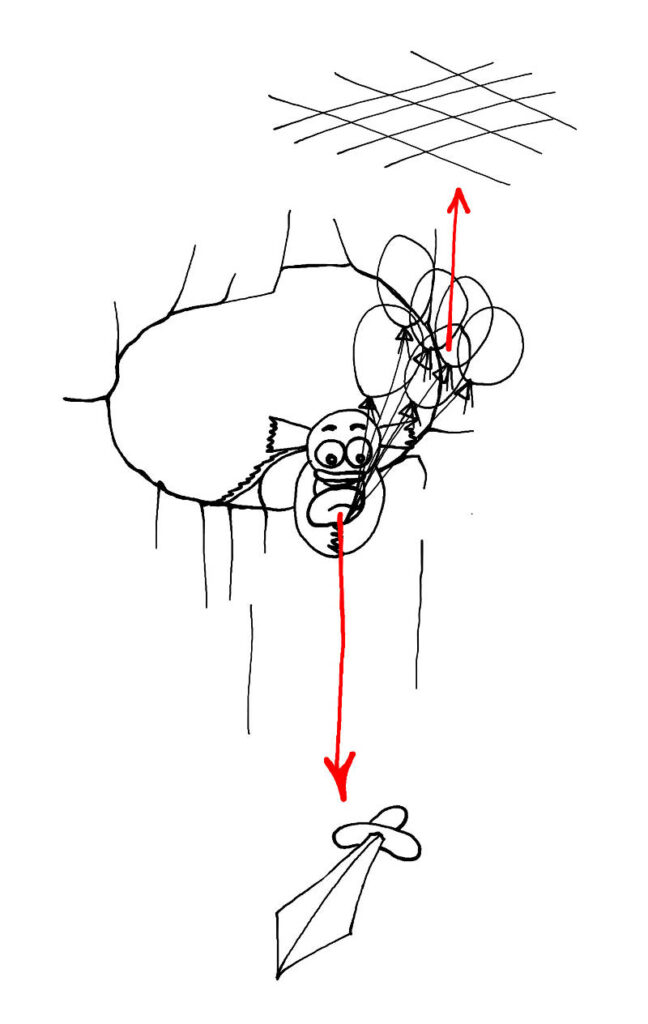
“Let’s look at it this way: what do you have to lose?” interjected the frog.
“I don’t know, really, but I am scared!”
“And so you should be. In general, you have a lot to lose by jumping down from great heights: life and limb for one – or two? I am fully aware of that. But being aware does not mean never jumping at all – it just means thinking before you jump. “Be aware” and “beware”: small pause – huge difference,” chuckled the frog almost to himself.
The old frog’s calmness was contagious. Besides, Simon was so desperate that he actually thought about what the frog said (a rare occurrence in the course of normal conversation). And the more he thought, the more he realized that he would not lose anything by jumping down. He could control the speed of descent by letting go of ballast and being stuck at the bottom of the cave was no worse than being stuck in its middle. Simon made a decision. “OK, I’ll jump. Would you stay here with me, though, to help me think things through?” he asked, looking hopefully at the old frog.
“Of course!” nodded his new-found friend. “We don’t move about as much as we used to anyway, do we, Cyril?” continued the frog patting his turtle slowly on the head. The turtle shook his head with a melancholy smile and started a slow descent towards the sword.
Simon took a deep breath and felt himself buoyed slightly higher. “By courage,” he thought, against all the evidence. He grabbed the rock and pushed off the edge of the tunnel. He plunged quickly down and only just moved his fin in time to prevent it from being squashed on the cavern floor. Simon landed quite close to the sword and reached it easily, grabbing the heavy handle. But what next? His balloons did not pull him up much even without the heavy sword and had no hope of lifting their combined weight.
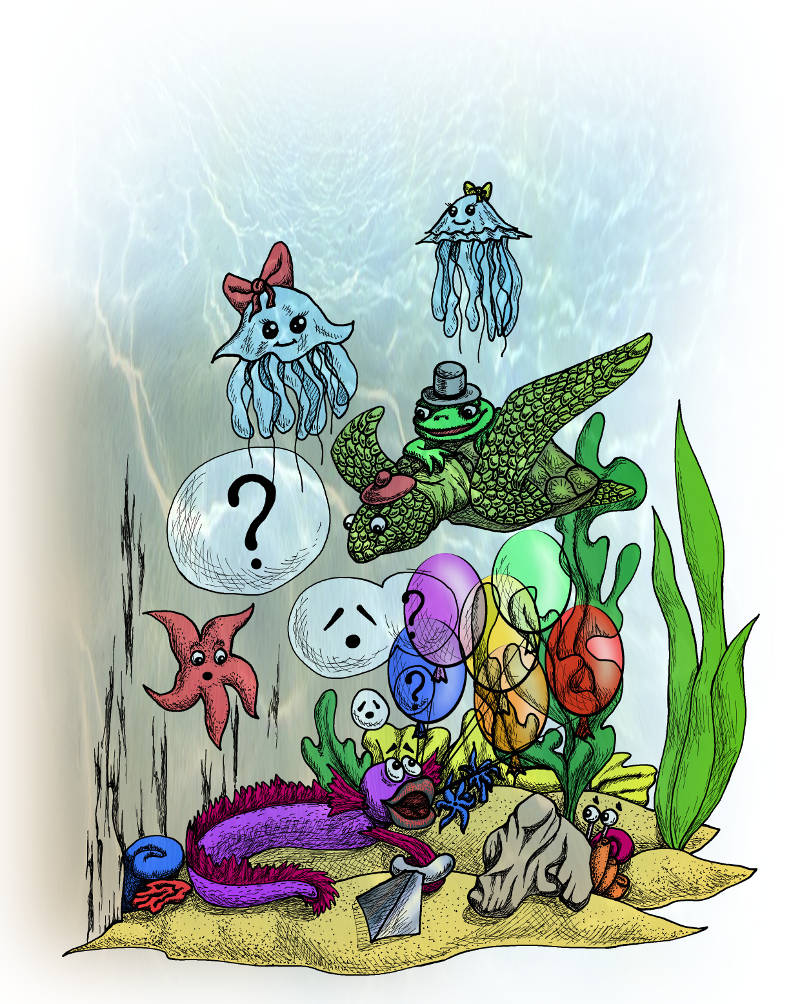
“Stuck?” asked the frog’s voice solicitously as the ancient pair landed on the sandy bottom of the cave.
“Yeah…” intoned Simon thoughtfully,”but at least I can see the whole cave from here.” He no longer felt lost, scared or helpless. The old frog’s practical attitude seemed infectious and Simon was searching furiously for a solution.
“It always helps to get out of tunnels – tunnel vision, you know,” chuckled the frog. He seemed very fond of chuckling.
“Maybe I can find a place to climb,” mused Simon.
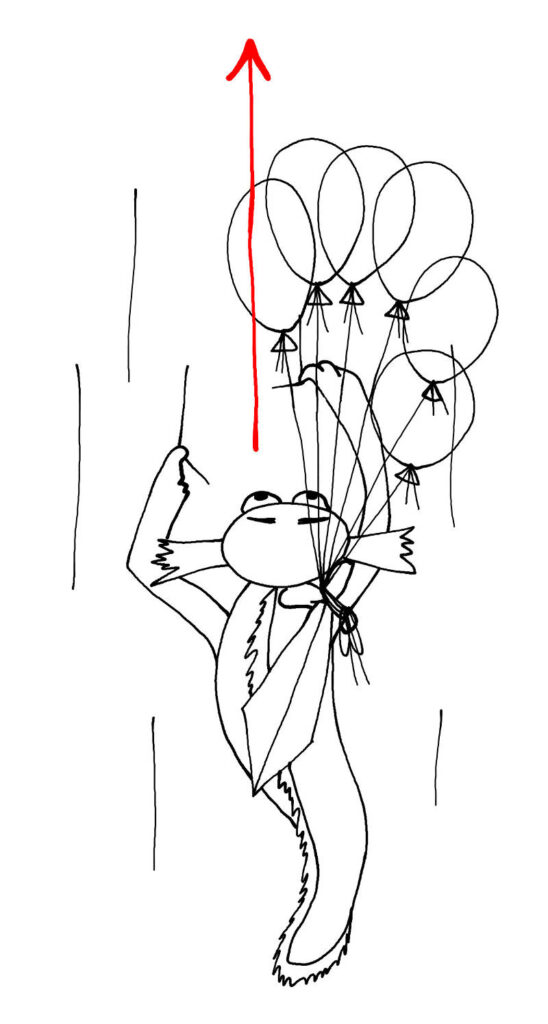
“Nah, the walls here are pretty steep…”
“Do you have a rope? You could hook it through the net above and I could pull myself up.”
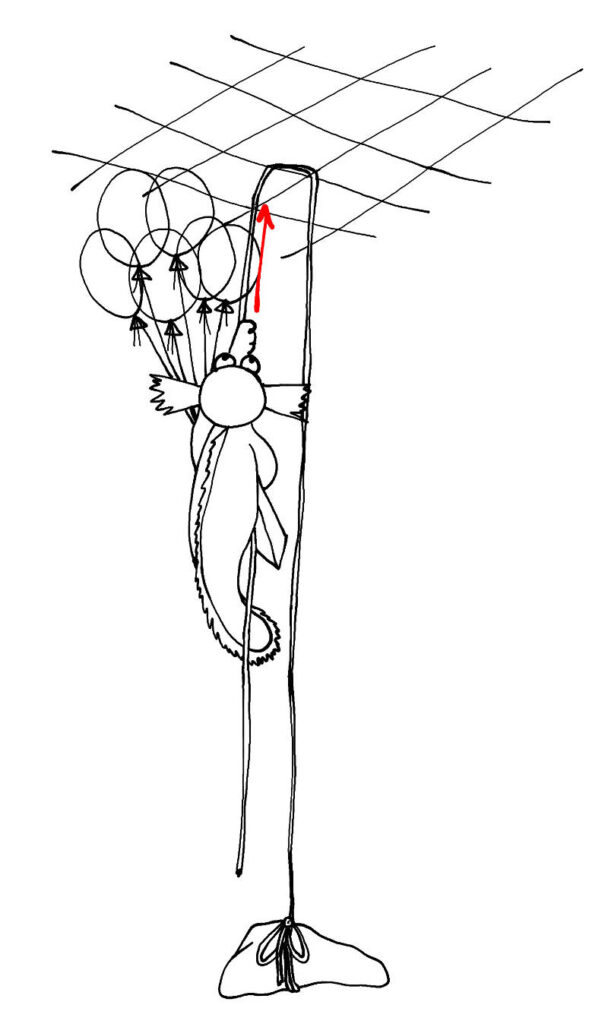
“Good idea, but it would take too long to fetch a rope and we had better think of something fast,” answered the frog conversationally, “or the fishermen will come back and that would be the end of your friends. Can you think of a way to make yourself lighter?”
“Not really,” said Simon with a deep sigh. Funny, he had that same feeling of being buoyed up slightly as in the tunnel mouth, but courage obviously had nothing to do with it… He took another experimental gulp, trying to hold his breath.
“You have an air chamber too?” asked the croaky voice and Simon, following the frog’s astonished gaze, noticed that his stomach was growing.
“Keep filling it up!” exclaimed Simon’s new friend with growing excitement, “I have an air chamber for croaking, but yours must be for swimming! Air is lighter than water, it will buoy you up!”
A dozen more deep breaths made Simon’s stomach expand further, and he started rising up slowly, ponderously, like an enormous balloon with fins, tail and a gormless expression of open-mouthed astonishment. His new friends were rising next to him, cheering him on.
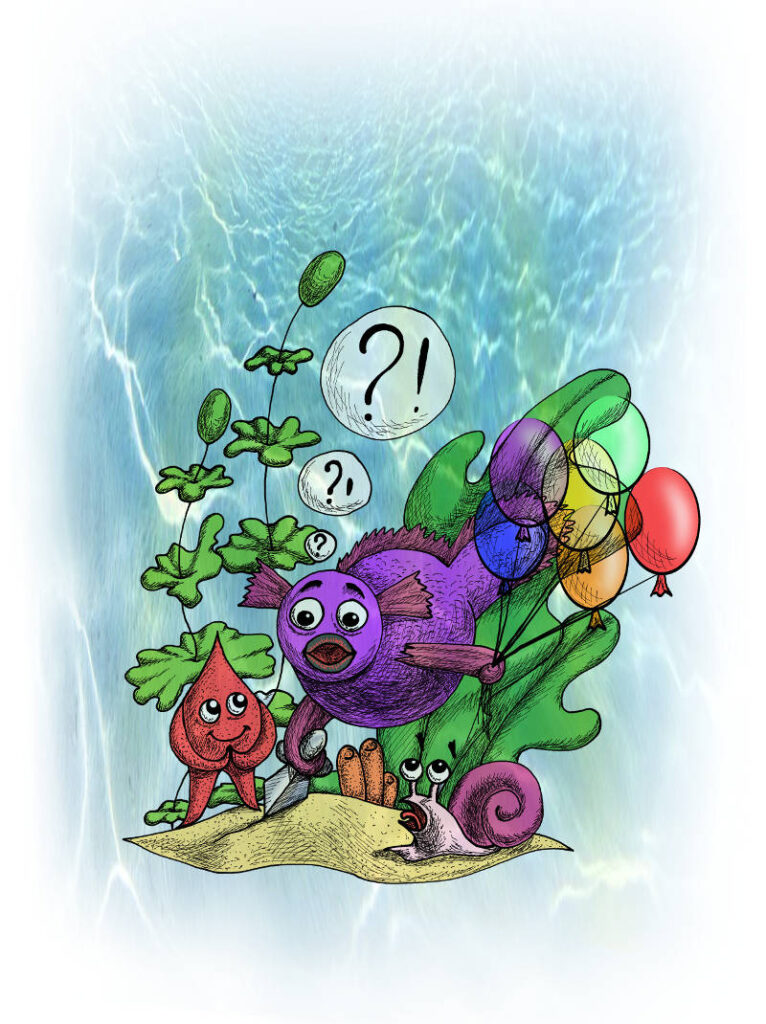
When Simon finally reached the net, Sunny joined the cheering and even Sir Pineapple, though exhausted from thrashing, managed a weak “Hooray!” Simon was just about to pass him the sword when the sunlight was blotted out by menacing shadows and the net began to move.
“Fishermen!” croaked the frog, “Cut the net, quick!”
To use the sword, Simon needed both fins and to use both fins, he had to let go of his balloons – the balloons that had kept him afloat for so long. The prospect was terrifying, but Simon was out of time and options. Thoughts sped through his mind, surprisingly clear under pressure. He thought, “This is one of those moments when a decision has to be made, and it will affect the rest of my life because it will define the person I will become.”
With another deep breath, Simon let go of the balloons, grabbed the sword and started to hack at the net. First Sunny and then Sir Pineapple were freed, the knightfish mere seconds before the net was pulled up. Our friends sank gratefully to the bottom of the cavern, followed by the frog, the turtle and the muffled sounds of fishermen cursing the vandals who tore their nets.
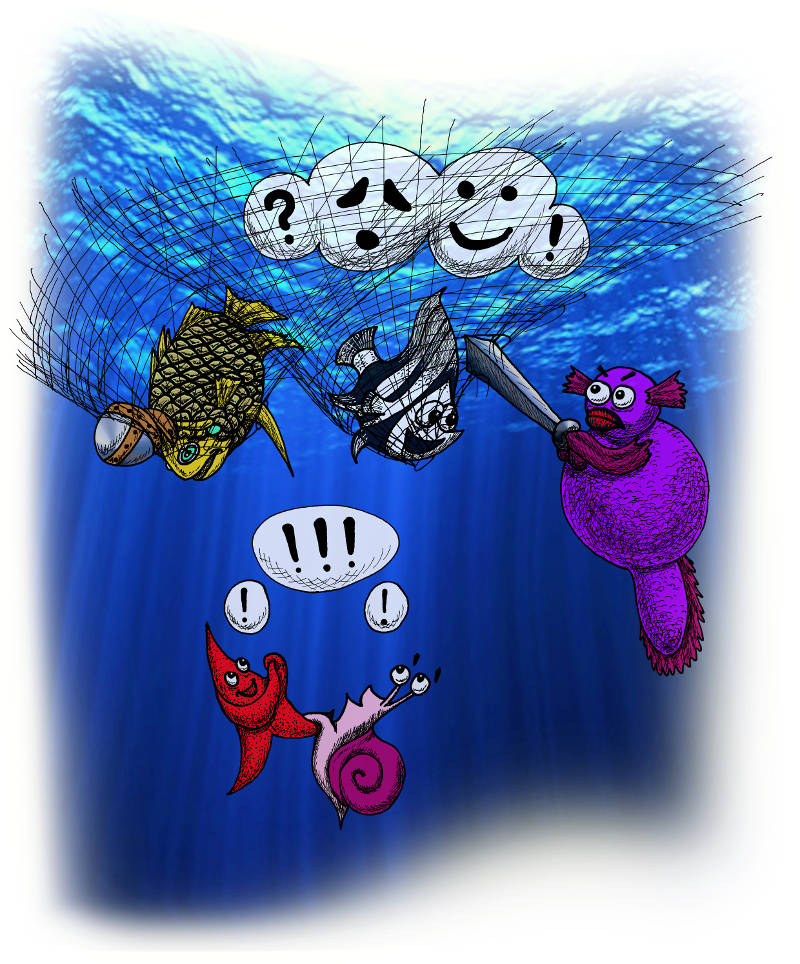
***
Simon didn’t sleep well that night. The sudden sense of self-confidence inspired by his visitor in the morning slowly disappeared, just as had the elephant himself. His habitually bitter feeling of being a freak and his suddenly acquired pride in being unique were chasing each other through his mind, following a confused mishmash of malformed memories, thoughts and ideas that often precede sleep. The next morning Simon was anxiously waiting for his friend to appear, hoping to regain his sense of confidence. And he did – at 7 o’clock on the dot.
“Hi! I am so glad you came!” Simon was beside himself with joy.
“What? Oh, I see! I never actually left,” explained the little elephant briefly, “I just moved to this point in time.”
Simon realised that the explanation made perfect sense. If there was an alien projecting a part of himself from a different dimension into this room, there was no reason why he would spend time waiting. He would, indeed, simply project himself to a different point in time. Simon suddenly felt clear-headed, confident and happy. All the niggling doubts were gone and he felt himself in the middle of an adventure. He remembered always being amazed, while reading adventure stories, at how the characters spent all their time whining about things being strange and wanting to be back to normal everyday boredom. He could now understand them better, but he could also choose.
“I choose to enjoy my adventure!” thought Simon and grinned embarrassedly. He sounded a bit pompous, even to himself. His internal monologue was suddenly interrupted by the visitor, whom he almost forgot in the hot haze of self-discovery.
“So tell me, what do your governments have against us? Why do they always hush up extraterrestrial visits to Earth?”
“Do they? Are there? When? Where?” Simon’s excitement made him almost incoherent.
“How would I know? The universe is rather large and I am not personally acquainted with all other aliens, even though I am one. Someone else might have visited, but it is very difficult to work out from your media what is fact, what is fiction and what is wishful thinking. A lot of it is quite implausible, but very difficult to rule out. I am quite certain there are no spaceships in the solar system – except those made on Earth, of course – I would have noticed. But were there before? And what about travelers from other dimensions? If I could do it, so could someone else. The accounts I find seem a bit silly… I mean, why would anyone want to take over your planet or teach you deep wisdom? Loads of empty planets out there, as to wisdom – everyone earns his own. And cross-breeding programs – that’s just bad biology. But it doesn’t mean that the accounts are completely inaccurate. It’s this amazing knack your species have of backwards thinking.”
“What do you mean – backwards thinking?” interrupted Simon.
“In our world, logic works this way:
1. We see some evidence of aliens.
2. We say, “There were aliens here.”
3. If the evidence is inconclusive, we say, “There may have been aliens here” and try to find some more evidence.
Easy as 1, 2, 3.
But, judging by what I read, in your world, you start with:
1. There is an infinite number of worlds, so there must be some other sentient beings – aliens – somewhere in the universe (so far – so good).
2. We are interested in them – so they must be interested in us (I am not so sure if it’s true in general, but it was true in my case).
3. So, they must have visited us or still be here (I am not so sure about that either – given the infinite universe to be searched, finding anyone is a bit tricky).
4. But we cannot see any aliens and have no direct evidence of them.
5. Someone with enough clout must be hiding that evidence: either the governments or the aliens themselves.
6. Why would they hide it? Because they are up to no good!
7. What could they be up to? What could they want?
8. The usual motives for us are power, greed and sex – they must be the same for the aliens.
9. Secret aliens are trying to take over the world, rob it of all resources and create a new species with us to populate it! Help!!!
Complicated as 1, 2 → 9, and just as unreliable. Actually, this strange logic is even more interesting to me than whether there were any other visitors on Earth. It is truly alien as far as I am concerned.”
“I see what you mean, but how do you know whether you know something or imagine it?” mused Simon. “I mean, if you think you’ve been abducted by aliens, how would you know if it’s true?”
“Let’s go and see,” smiled the visitor.
Simon was about to ask what he meant when he realised that he was no longer looking at the wallpaper in his living room.
“How do I know it’s true?” the question swam through his mind, like a fish, and dissolved in the deep water.
Chapter Seventeen
In which new friends tell old tales.
“I swam! By myself, I swam! I can swim!!! Up and down!” While everyone else was recovering on the sandy bottom, Simon was bobbing up and down, inflating and deflating his swim bladder, making loops and zigzags in the water.
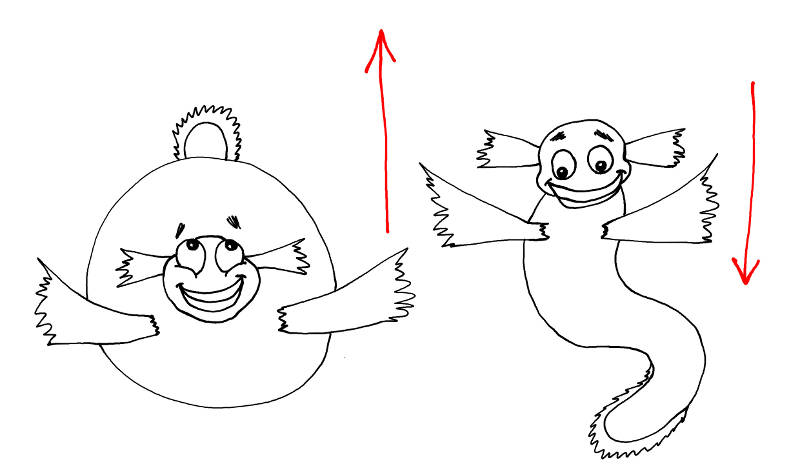
Once the excitement died down a little, he settled down next to everyone else, happily exhausted. Sunny, who was busy quietly muttering to herself while watching Simon’s antics, declaimed,
“Hooray, hooray!
In island bay
Sir Simon swam
into the fray.
He didn’t pray,
he didn’t stray,
he cut the net
and saved the day!”
Simon puffed up so much with pride, he almost floated up to the surface again, causing everyone (including himself) to burst out laughing.
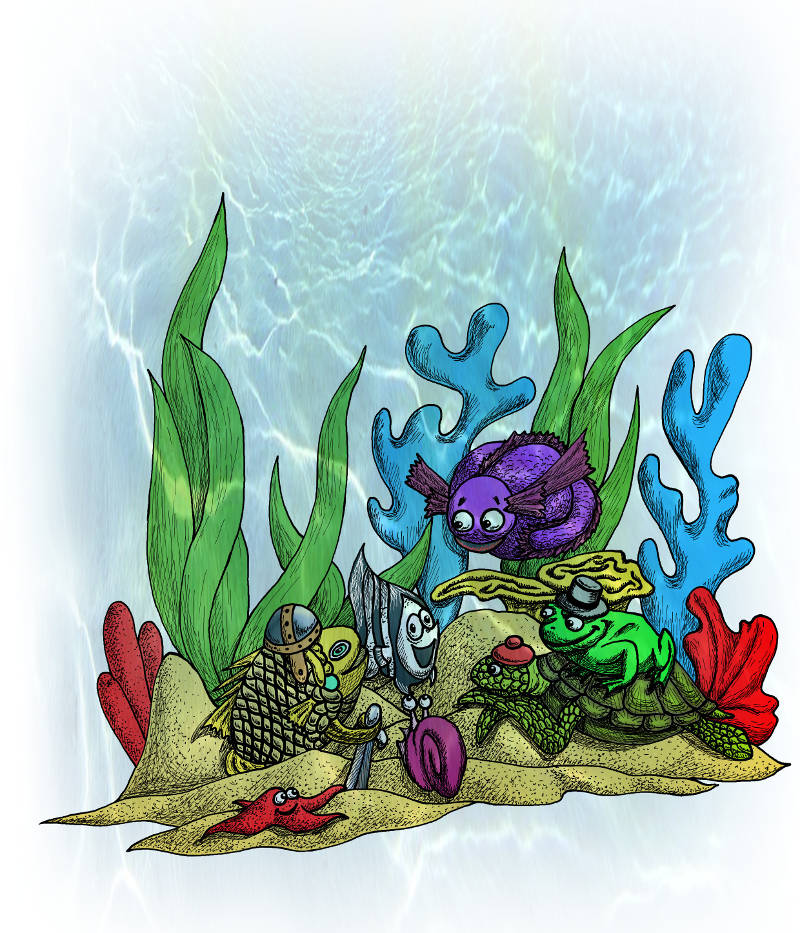
“I think introductions are probably in order at this stage. My name is Chief Sitting Duck,” croaked the old frog when everyone settled down, “and this is Cyril – my oldest and dearest friend. He doesn’t say much.”
Cyril winked at the company with a melancholy air and intoned slowly, “Pleased to meet you.”
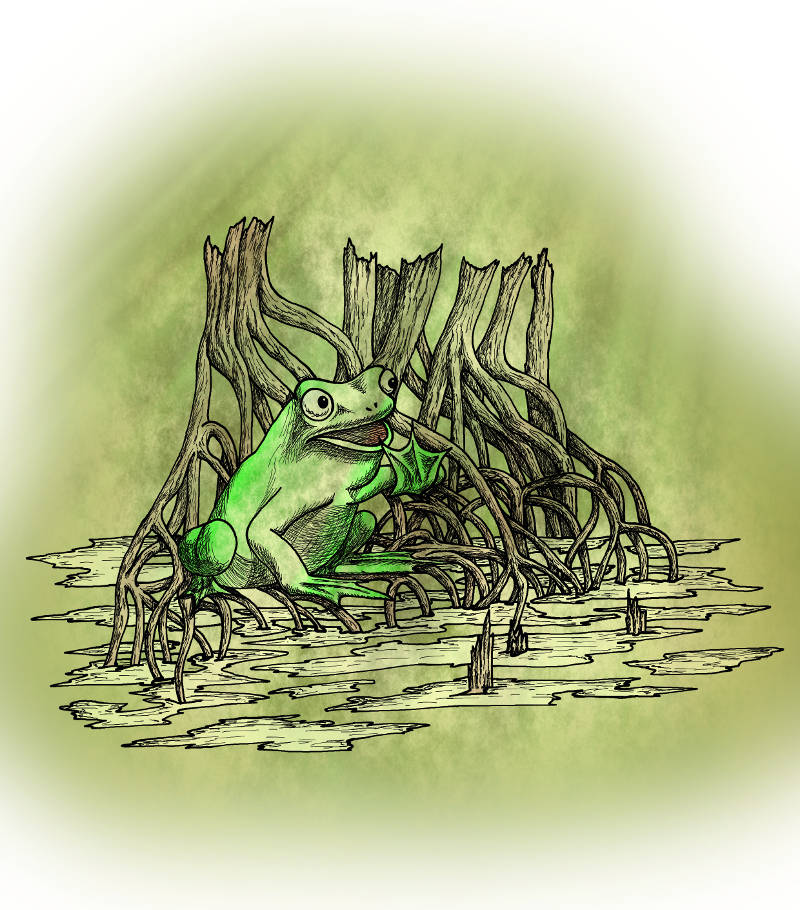
“But you are not a duck, Sir – definitely not – you do not walk like a duck or quack like a duck…” Sir Pineapple looked confused.
“Not that duck,” chuckled the old frog. “In my youth I used to be a lookout for my tribe. I used to sit on the tallest rock and shout “duck” when fishermen approached. They try to catch us for our legs, you know. Men are very funny about legs – they seem to be preoccupied with them, and not only in terms of eating. For example, they seem to have a bizarre set of beliefs about trousers. I heard a bunch of men from our island calling the tribe from the next island over uncultured because they do not wear trousers.
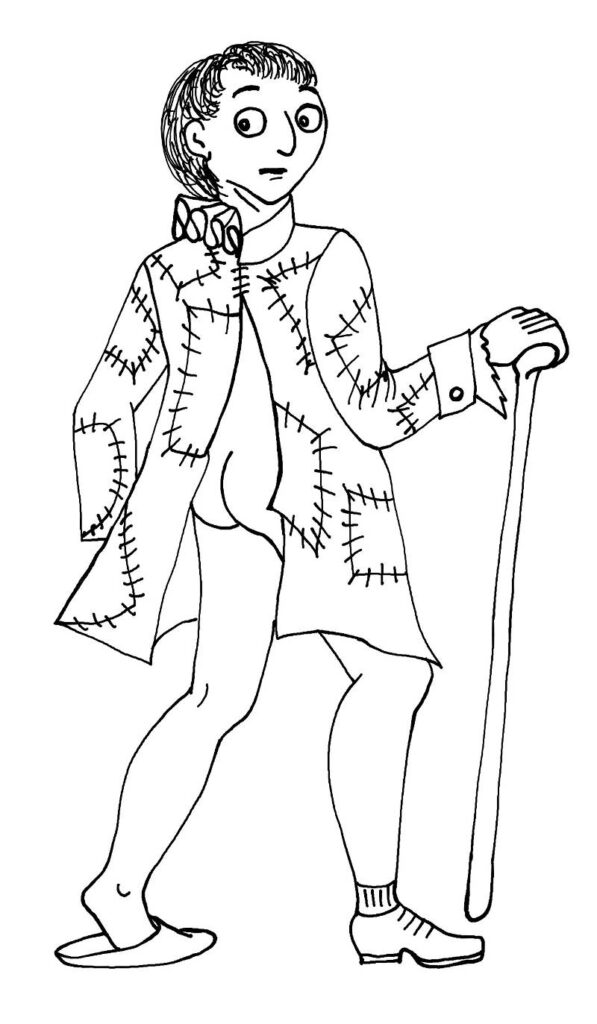
It would seem to me that the absence of trousers has more to do with the climate and the state of the local textile industry, while judging others by what they are wearing has more to do with a lack of culture. But what do I know, I am only a frog! You know what’s especially funny? They don’t seem to be particular about hats. Any sensible amphibian would find a leaf to hide under during the day in this climate to avoid sunstroke. But the men, who would postpone running out of a burning hut until they’d put their trousers on, would think nothing of walking out in the midday sun without a hat. For a while, I thought they kept their brains in their bums, like some insects, and that’s why the trousers were important, but it does not seem to be the case – at least not for all of them,” (another chuckle), “I think the problem with our fishermen is that they don’t travel. They are what’s called a monoculture – another term for inbreeding in culture, as well as agriculture. The results become less viable with each generation.”
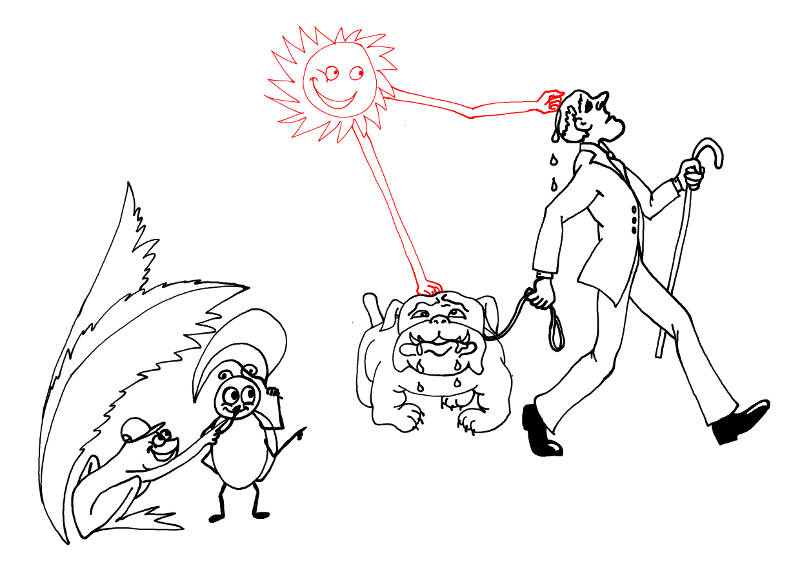
After a short pause, while he seemed to be rewinding his speech back to its starting point in his mind, the old frog continued, “We, old folks, tend to ramble a bit, don’t we? Anyway, I was explaining about my name. When I shouted “duck!” everyone would duck underwater. Hence “sitting duck”. “Chief” was added later, when I became the chief of the tribe – by default, really, and because my reaction time was no longer quick enough to be a lookout.
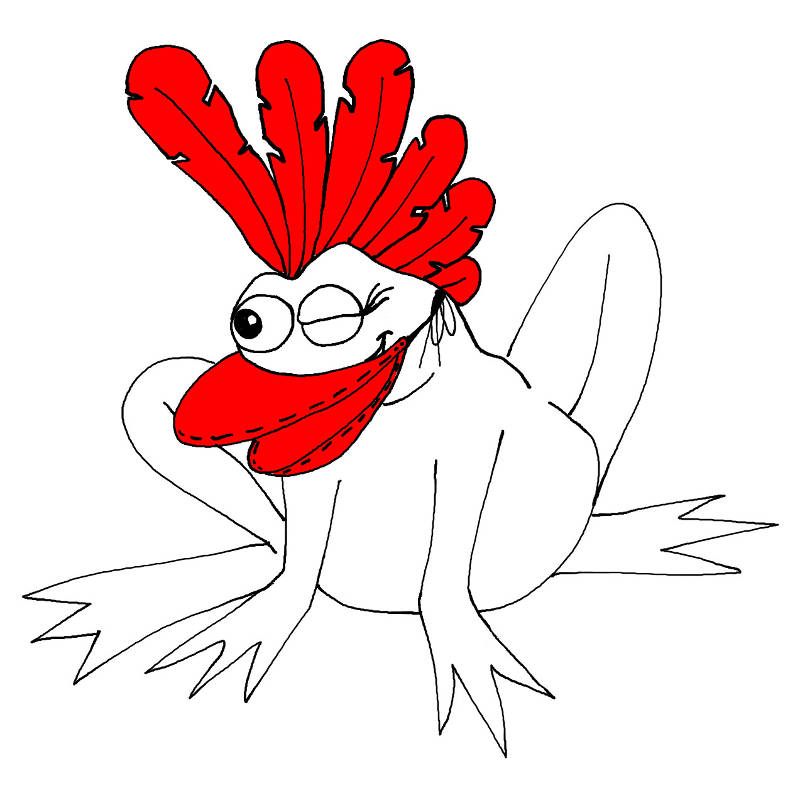
It’s a boring job, being a chief – mostly ceremonial – waving, smiling and nodding, that sort of thing. The only interesting part is sometimes having to resolve disputes and differences of opinion. Frogs usually don’t think much about their opinions, they are taken up as part of the culture, like the dress sense we just discussed. So, we end up wearing a mish-mash of unconnected opinions, those of frogs like us and those of the frogs we want to be like – but few of them our own. However, because opinions are a part of our culture, the question of loyalty comes in. We feel we would betray our old mothers if we change the opinion we inherited from said old mothers… which is a case in point, really, because at the same time we manage to believe that their opinions are silly because they are too old and out of touch… I realized at some point that loyalty is by definition parochial. But that, alas, is post-graduate thinking for a frog. So, I just decide, trying to make sure that all opinions are represented in turn. After all, it is not all that important that others agree with me as to what is moral, it is much more important that they have at least a vague idea as to what “moral” is.
“Anyway, this strategy seems to work a treat! I learned it from the previous Chief. He was a wily old frog. Once, when I was just a tadpole, two of my friends argued over a shell they had found. You know the sort of thing, “I saw it first!” “But I picked it up first!” and so on… When the first of them came to the Chief and asked if he was right, the Chief said, “Of course you are right,” and I thought that the argument was settled. But after a few minutes the second one came up and asked the Chief if he was right. To my surprise, he received the same answer. I was flabbergasted. So I came up to the Chief and told him that him telling everyone that they are right was very confusing and whiffed of dishonesty. Do you know what he answered? “You are right, too.””
After a break for an extensive chuckle and a bit of a cough, the old frog continued, “What I was getting at is that I avoid the boring parts of my job by managing not to be there for ceremonial occasions. Instead, I do a bit of exploring with Cyril. I found him lost in our swamp when he was a young turtle and led him to this lagoon. We are the only amphibians who can tolerate salt water, you know!” and Chief Sitting Duck straightened proudly, though briefly and with a notable creak in his back. “But I digress. Tell me about yourselves, please.”
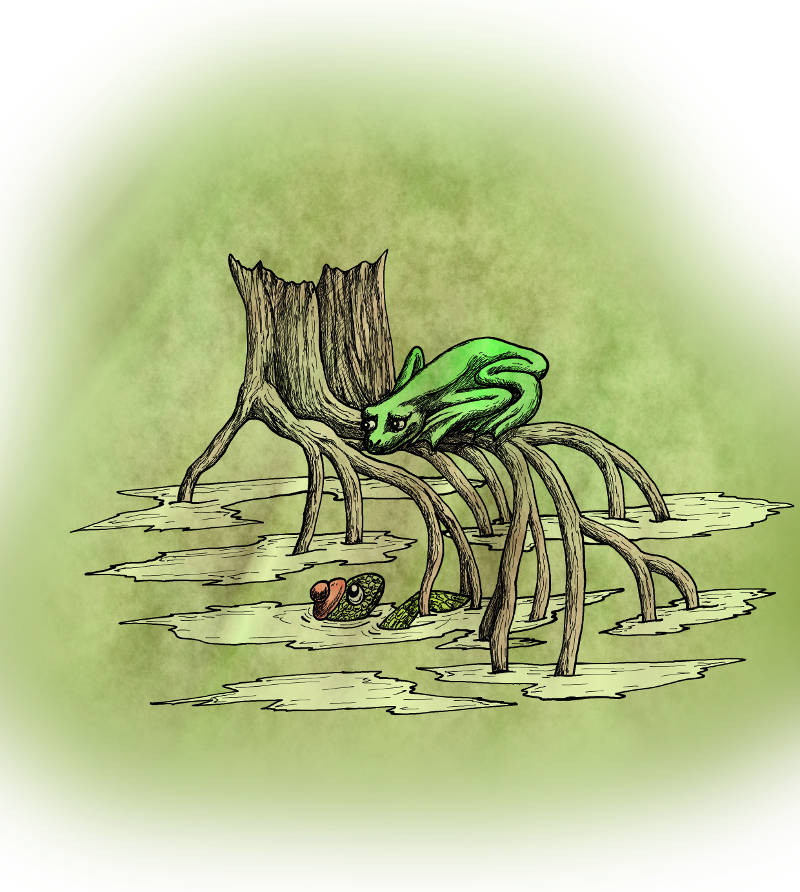
“My Name is Simon and these are my friends, Sunny and Sir Pineapple…” and Simon recounted the story of their adventures so far. The old frog listened, open-mouthed. This was quite an impressive sight. It looked like the top of his head could fall off at any moment. But it didn’t.
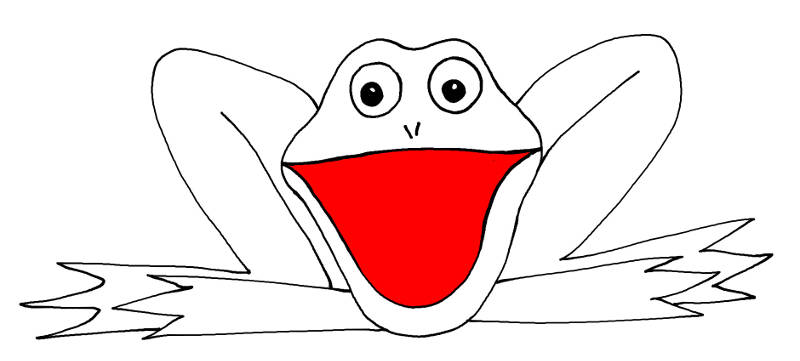
***
It definitely wasn’t the living room wallpaper. Small bunches of non-specific flowers, faded and dusted into tastefully muted tans, swam ironically in front of Simon’s eyes, as he only started seeing them after they disappeared from view. As many overly-familiar things, they were only noticed when absent.
“Sounds profound, I should write it down,” the thought flashed through Simon’s mind, only to be swiped out of it completely by the overwhelming sense of surprise, as he realised that, instead of the wallpaper, he was staring at a jagged line of treetops. A pine wood. Deep and, indeed, dark. As Simon’s eyes adjusted to darkness, he looked around and, to his relief, saw the familiar shape of the little elephant.
“I’ll show you what I mean,” proclaimed the visitor, waving his trunk for emphasis, and Simon realised that his friend was continuing the conversation they started in the living room, seemingly years ago. Time is a funny thing. It stretches many times the size when full of new experiences and collapses into a sad, inconsequential rubbery thing when there is nothing but repetition. Just like a balloon.
“I will have to change, though – in this shape people usually don’t see me at all,” continued the elephant – and he no longer was. Suddenly a green-skinned, almond-eyed, thin-limbed alien from science fiction movies was staring unblinkingly at Simon.
“Is that what you really look like?” Simon sounded disappointed.
“Don’t be silly! It’s what people expect me to look like. Let’s see what happens when I talk to another one of your species.” On cue, strips of increasingly bright light stretched themselves between the columns of pine trunks, turning the landscape into a giant bizarre zebra crossing.
“It can’t be another alien, can it?” thought Simon before realising embarrassedly that he was looking at the headlights of a car driving down a road winding through the wood. “How do we stop them?” he asked aloud. Instead of an answer, his no-longer-elephant friend smiled and a circle of bright strobe lights appeared above the road, rotating around an invisible axis in the empty air. “It looks like a flying saucer, but there is no actual ship!” exclaimed Simon in surprise.
“I didn’t see the point in rendering a ship, as they can’t see it,” was the curt reply, “Watch now, see what they do.” The car slowed down to a crawl and stopped. The passenger door opened.
“I have no idea what it is, but I know it’s late, we are both tired and it’s getting later by the minute,” the sound of an irritated male voice was loud in the clear night air.
“I am going to go and look or I will never stop wondering”
“Go on, then, but hurry up, for god’s sake!” For a few seconds nothing happened and then a woman slowly climbed out of the car, She hesitantly approached the lights. Simon’s alien walked forward to meet her. They met under the rotating lights and stood there, staring at each other for a few seconds. “Just like a movie,” thought Simon. But that was the last time anything went according to script. The moment the alien opened his mouth to talk the woman collapsed in a swoon. Simon’s friend bent over her with a sigh.
“See? Something like that happens every time,” he prodded her disconsolately with a long finger, “What am I supposed to do now?”
“I think you can slap her, or pour some water on her, or there are smelling salts – whatever they are…” Simon was desperately rummaging through memories of books he read that included impressionable young ladies fainting. This lady was middle-aged. She looked tired and worn. There were dark bags under her eyes. Simon’s friend poked her distractedly a few more times, with no discernible result. He materialised a trickle of water over her chest. Nothing.
“I’ll try and ask the other one,” he said to Simon without much hope in his voice. As he walked towards the car, the driver’s door opened and a tall, gangly man suddenly shot out, haring it into the woods. As the alien turned back towards the woman, she jumped up and ran after the man, screaming. The visitor shrugged disgustedly and walked back to Simon. “You see? That happened several times before I found you. That is not the most interesting part, though. The most interesting part is what happens next. Let’s move a day forward.”
When Simon realised that he was, once again, staring at wallpaper – stripy and unfamiliar this time, with rows of monotonously repeating roses running between the stripes – he was not at all surprised. The tall man and the tired, middle-aged woman he just saw in the forest were sitting on a large overstuffed sofa upholstered in a flowery print. The room was immaculate, the tan-coloured carpet spotless, the dark-wood furniture polished and the glass doors of said furniture, displaying innumerable gleaming dishes and porcelain ornaments behind, faultlessly transparent. Even the chandelier and gilded frames of family photos hang high up near the ceiling were completely free of dust. “Someone must be cleaning this place daily, climbing a ladder or something to reach,” thought Simon, recalling grandma’s unceasing battles with dust in their flat.
“They can’t see or hear us, I didn’t project anything detectable,” the voice of the visitor materialised in Simon’s mind, seemingly without going through his ears. “Let’s listen.” But there was nothing to listen to. The couple were sitting in tense silence. It seemed that they were afraid of breaking it, as if a loud sound would break the fragile reality and their illusion of sanity with it. The woman stood up eventually and, muttering something about dinner, walked out of the room. Simon’s friend sighed, the world blinked and he found himself in a spotless dining room. The man and the woman were sitting at a dinner table, a few spots on the tablecloth and two empty plates bearing witness to a recently completed meal. They were sipping wine from long-stem glasses and the silence was palpably awkward.
“What do you think happened last night?” the woman’s voice was high and desperate, the phrase – abrupt, she plunged into the question as if into freezing water. The man looked up, his eyebrows knotted, his gaze heavy. He expected the question but still had no answer. He remained silent. “I saw lights, like a flying saucer… I went to see what it was and there was an alien… it was like a movie, I couldn’t believe my eyes… and then – I don’t remember… I remember feeling prodding and poking, and then running, and then – you in the wood and stumbling together back to the car, wet and dirty, covered in scratches…. Did they do something to me or was it the trees? It couldn’t happen, could it? But then why did we run? Something must have happened… I am not crazy, right? You remember too? Where were you?”
“I don’t remember very well either,” replied the man after a long pause, while she was desperately searching his eyes for confirmation. “But I looked it up today. We must have been abducted. There are lots of stories online. They abduct you and do experiments. That’s why you remember all the prodding. And they wipe your memory. That’s why I remember seeing the alien approach you, but not running to help. That must be when they got me. It is actually fascinating, there is a whole movement out there, with support groups, blogs and radio channels. There are even churches. They say only special souls get abducted – maybe being prepared to ascend to a higher plane. They sound weird, all these people, but there must be something in it – it’s the only explanation.”
“You see, they just pick the most convenient story and then convince each other that that’s how it happened. She doesn’t want to be crazy and he doesn’t want to be a coward. They’ll probably join that online support group or church and have something special and interesting to talk about,” the elephant was now talking to Simon from the easy chair across his own living room. The dusty wallpaper was reassuringly familiar.
“But can’t you talk to them now? After all, they now do believe that there are aliens on earth,”
“I tried that as well. I can talk until I am blue in the face – they won’t listen. I say, “Good morning” and they start running around telling all their church friends that I came onto them proclaiming the rebirth of the world and the creation of paradise on Earth, to which only the ascended can be admitted. I say, “What did you have for breakfast?” and they invent a new diet, leading directly to enlightenment via the alimentary canal. Hopeless.”
“But it isn’t. You found me, so there must be others like me. Maybe we should try another child? Children are more likely to believe their senses because they are not as certain of their view of the world as adults.” At that point Simon remembered some of his classmates and added hastily, “I think… at least not all of them.”
“Good idea!” Let’s try that after breakfast,” replied the little elephant with a wide, tusky smile and faded from view just before Ama walked into the room.
Chapter Eighteen
The real turtle’s story. Yes, it is.
Cyril listened silently, nodding periodically with the air of someone who thought as much. With his scrawny neck coming out of the shell, it made him look like a bobblehead, though he didn’t seem to care. But when Simon described his disappointment with The Book of Truth, the turtle startled everyone, including Chief Sitting Duck, by launching into a speech.
“Truth… don’t talk to me about truth! That’s how I ended up in the swamp,” Cyril rumbled in his deep, slow voice. “It all started when my tribe got politics. We turtles are a thoughtful species. Most herbivores are. When all you eat are plants, which are low in energy, you have to eat an awful lot of them. A large part of our day is spent grazing, which is not an intellectually challenging pastime as such. That’s why turtles tend to be rather easy-going, thinking about things, grazing along the rocks… We always had famous philosophers and mathematicians, but never, until then, any politicians. When the first one appeared among us it was thought to be a good thing. He was a little dull and never showed any aptitude for abstract disciplines, such as maths. But he was practical, efficient and good at organizing. We all thought that he had found a good way to be useful to the tribe, and it was. He started organizing exploration of the nearest shelves to find new grazing grounds and posting sentries at the hatching beaches. It was very convenient. Everyone benefited and, best of all, no one else had to worry about these mundane details any more – he did the organizing for everybody.
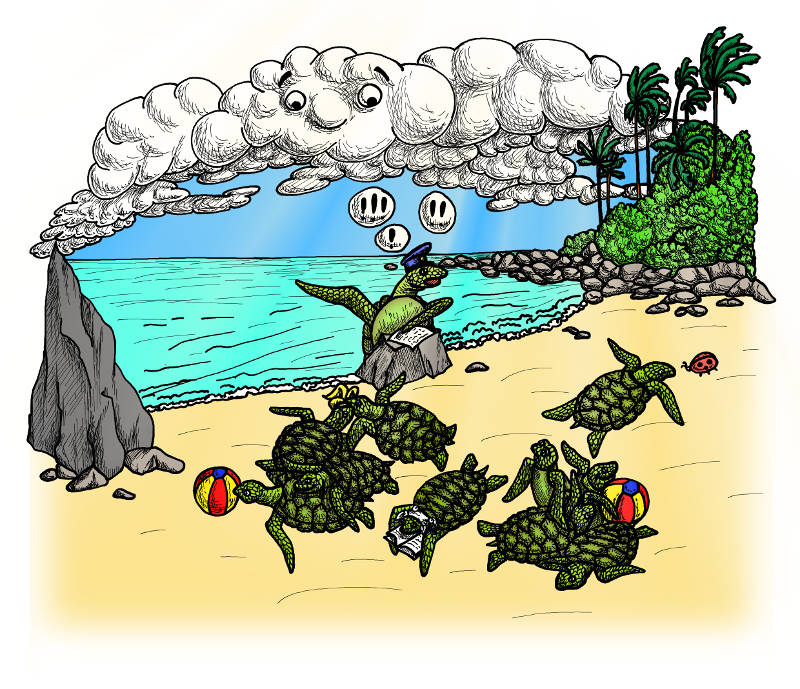
We did what we were told, which was fine up to a point… right up to the point when our “tribe manager” (that is what he started calling himself) began changing, both himself and the tribe. He started saying to all who would listen and most who wouldn’t that our tribe needed real leadership, not just middle management. One of my friends used to giggle that “middle muddlement is evolving into upper confusion”, but quietly. Our politician completely lost his sense of humour by that point, everything became “a serious issue”. As he used to put it, “We are a democracy, not an idiocy. Everyone can express an opinion and I can decide.”

“So one day our “tribe manager” demanded that we conduct a general election – that the whole tribe vote for him to be called “President in Charge” in order to “confirm his mandate to make decisions for us all”. It seemed reasonable, if somewhat bombastically expressed, since he made most practical decisions anyway and no one else gave a hoot. So we all voted for him. And all was well – or as well as can be expected, what with the predatory birds on the beach and the predatory fishing boats at sea – until he decided that it would be safer for our tribe to forage for food at greater depths. Neither birds nor fishing boats would reach us there, declared the President in Charge, which would make us all safer.
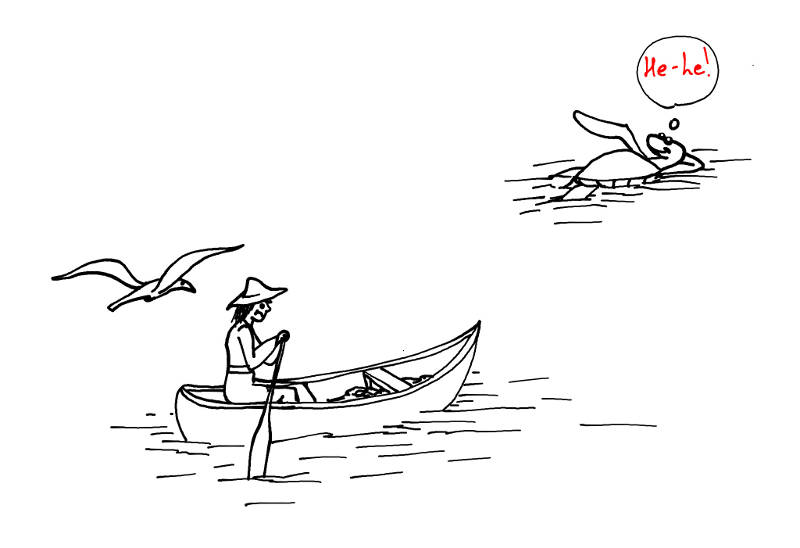
“It seemed a sensible idea, so we tried it for a while. Foraging parties went deeper and deeper, but they all came back empty-handed. Our leader screamed that they didn’t go deep enough out of superficiality, laziness, spite and resistance to progress. The atmosphere in the tribe was becoming tense. Finally, my father worked out that there is no point in searching for algae below certain depths. He found that out by accident, as an application of the set theory he was studying. You know about set theory? It is when you group things together to make them easier to manage. My father was a mathematician, he liked drawing circles in the sand. He called them Venn diagrams. He plotted the amount of sunlight, the amount of plant life and the depth of water against each other to explain his point.
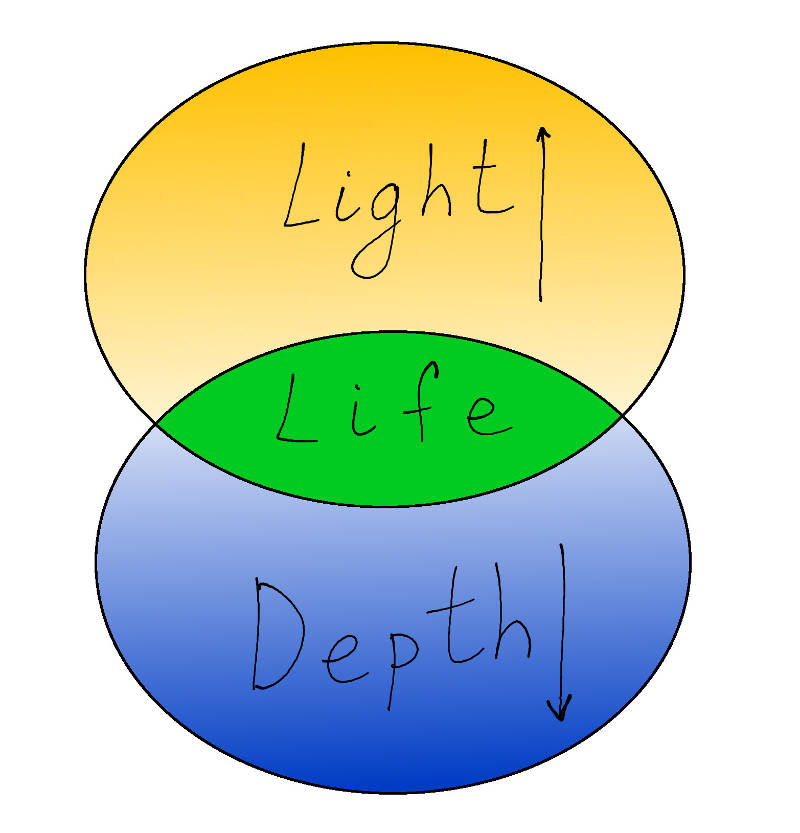
They did prove to be vain indeed in convincing our President in Charge: he started screaming that my father was plotting to undermine his authority while encircling his position with his sand circles, that, being of sand, provided no solid foundation for responsible decision-making in these dangerous times, when food was becoming scarce at the greater depth of depravity that my father was rapidly descending to… It is difficult to remember that speech, as it seemed to flood the brain, destroying thought and meaning as it went. I remember abundant accidental adjectives and aggravated alliteration – see, it is catching! The upshot was that he demanded my father should be expelled from the tribe. Others grumbled, but not much – we are a lazy lot and it was easier that way. And we were expelled.
“It didn’t bother my father much, I have to admit. He just went back to drawing his circles on another beach. He was drawing them when humans came hunting us. He was so engrossed, he only grumbled about them blocking his light until one of them picked him up and took him away.
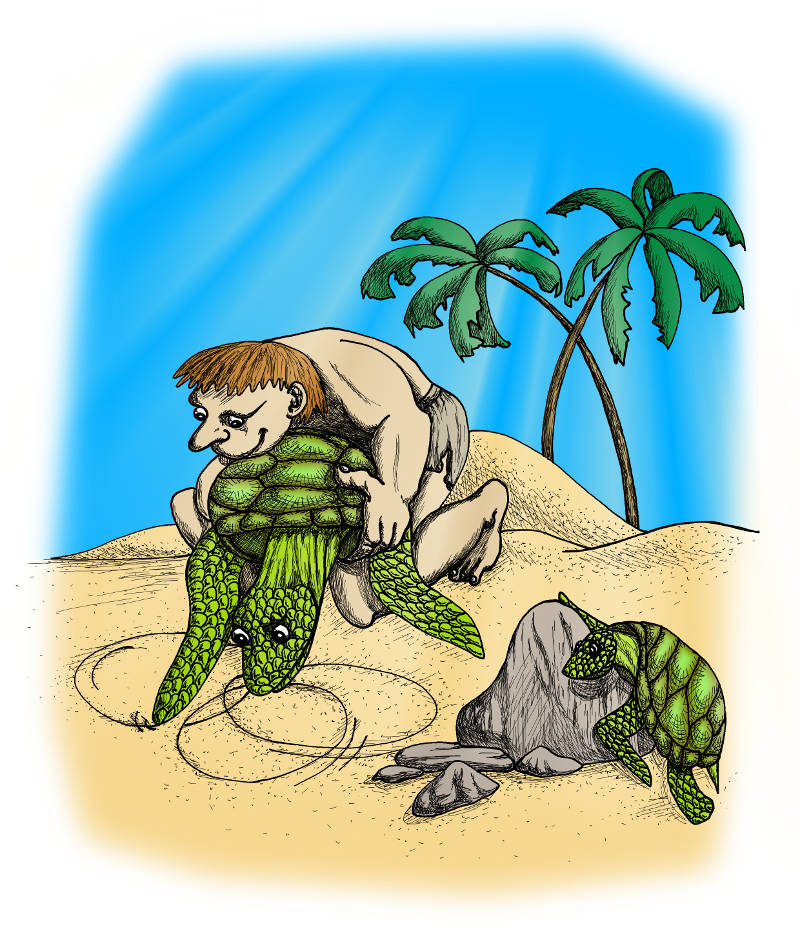
I am not sure he noticed them even then. He was never here very much, at any time – but he seemed happy wherever he was… That’s how I started wandering around on my own and ended up in the swamp… aaah, it’s all just circles in the sand!” and Cyril shut his mouth with a decisive snap.
“That’s more than I heard from Cyril in years,” exclaimed Chief Sitting Duck in amazement. “He usually doesn’t trust words, and I can now see why.”
Sunny, with the gigantic shadows still looming large in her mind, asked the old frog if fishermen were the humans that the monster-fish from The House of Light worshipped.
“I think so,” replied Chief Sitting Duck thoughtfully, “they are much stronger than us, but not very observant and easy to fool. As my predecessor used to say, “If you can’t beat them – outwit them!””
“They are humans,” interjected Simon. “They are actually quite clever individually, you know, but tend to become stupid in groups. I remember someone saying that the intelligence of a crowd is the intelligence of its stupidest member divided by the number of people in that crowd.
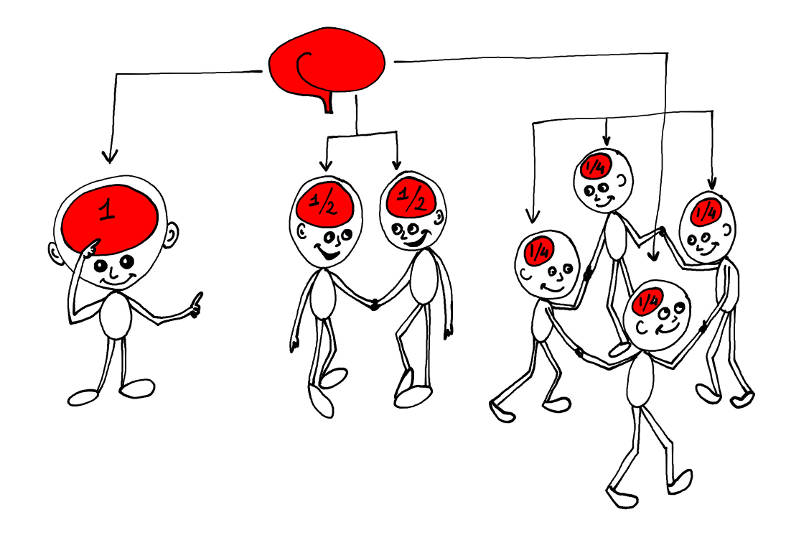
It’s because they are herd animals, I think. Anyway, they are uncommonly fond of giving and following orders – rather dull, if you ask me. They have politicians, just like Cyril described, usually the most mediocre of the herd. But they are not allowed to give any orders that would not be followed by most of the herd, while most of the herd would not do anything out of the ordinary without a direct order – the rules of my game, you know. Dull!”
Sunny still could not shake the image of the circles in the sand engendered by Cyril’s story. When a pause in the conversation presented itself, she filled it with the words praying on her mind,
“It’s all just circles in the sand,
defining sea, describing land.
Let’s call this “God”, let’s call this “Man”,
let’s call this “Mystery” again.
Let us combine the “Good” with “Bad” –
I think we get chartreuse instead.
As words and symbols overlap,
they seem to emphasize the gap
between the meanings. In the end,
it’s all just circles in the sand.
“I was thinking of what you said and a poem wrote itself,” said Sunny to Cyril, feeling uncharacteristically shy – she wasn’t sure why. The turtle nodded slowly and smiled.
After a thoughtful pause, the old frog looked up suddenly with his enormous eyes and croaked, “I have to go, I am afraid – even I cannot tolerate the salt water for long and my time is running out. It was a pleasure to meet you and your story gave me something to think about for a long while. Thank you!”
“Before you go, do you happen to know the way out of these tunnels into the open sea?” asked the ever-practical Sir Pineapple.
“I don’t know how to get to the open sea by water, since we are amphibians and live on this island, mostly at the top. But I will send you to my old friend, Standly the hermit crab – he might,” replied Chief Sitting Duck.
“Is he very holy?” asked Sunny.
“Oh, no, he is not a holy hermit, he just doesn’t like people,” laughed the old frog. “That is why he is so good for answering questions – he usually answers clearly and concisely, as it gets rid of visitors faster. As opposed to the other sort of hermits – they usually affect the appearance of wisdom by trying to remain incomprehensible,” and Chief Sitting Duck winked merrily at our friends. “Come on!” He led them to the mouth of a small tunnel. “Take this tunnel and turn right at the first opportunity. At the end of that offshoot there is a small cave, where he lives. Good luck!”
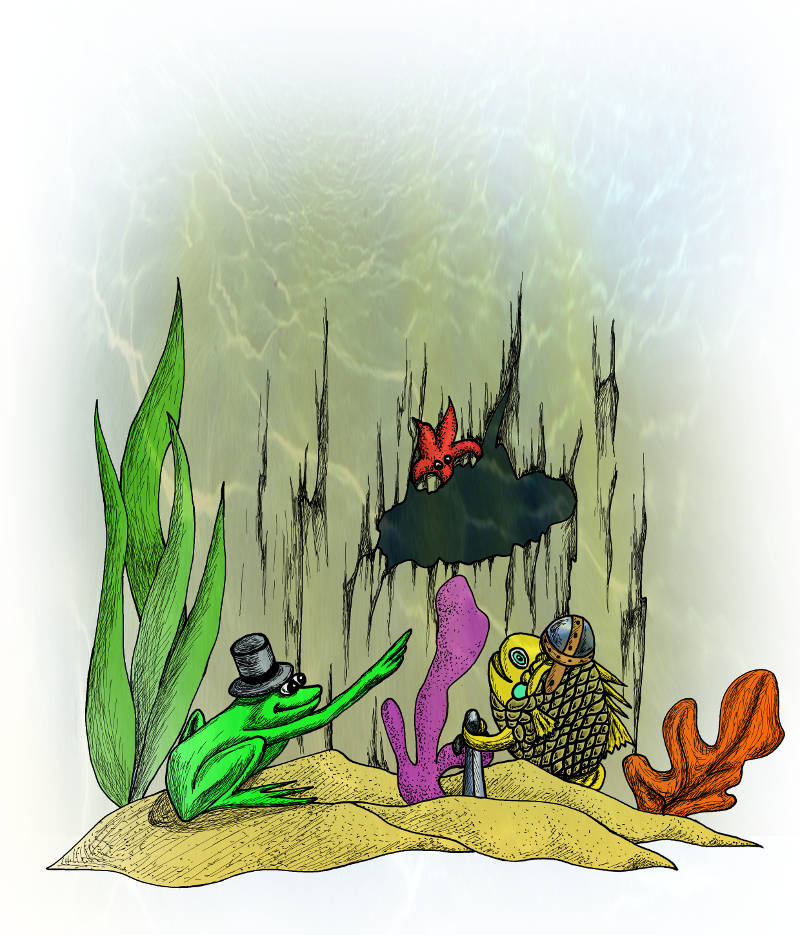
After this, Chief Sitting Duck and Cyril, who treated our friends to a last nod and a melancholy smile, rose out of sight and were gone.
***
But after breakfast there was school and Simon had to go. A long, long day spent avoiding people during recess and daydreaming in class. Actually, the daydreaming bit was rather fun. His fantasy intermingled with memories, turning them into stories. Sometimes the memories simply swam through his mind, ponderous and immutable, like the weather balloon that floated so long ago through and out of his life, and sometimes they transformed…
Chapter Nineteen
In which our friends meet Standly and find out about truths, lies, loves, hates, mazes and monsters, not necessarily in that order.
“Wait a minute!” Simon puffed up quickly and rose to the surface, where he grabbed the balloons, left there during the rescue, and towed them back down. He handed the string to Sunny. “I no longer need them, so they are yours, as promised. And thank you for your help!”
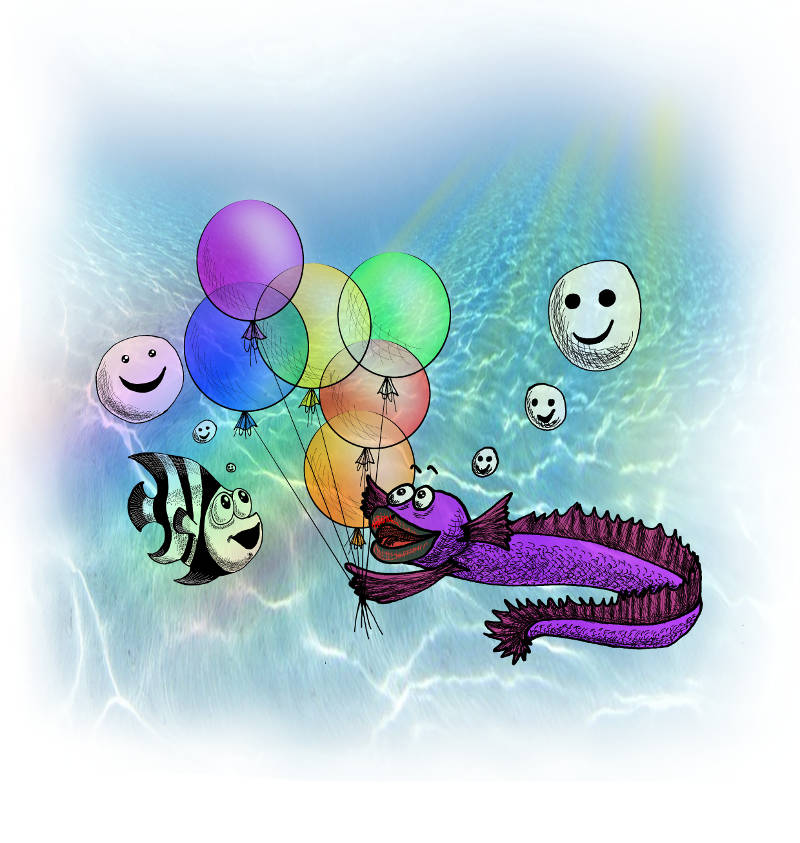
“But you learned how to swim on your own,” protested Sunny. Nevertheless, she took the balloons and carried them carefully, throwing delighted glances at them from time to time, all the way to the hermit-crab’s cave.
The cave was small and became cramped as soon as our friends filed in through the narrow entrance. Simon even had to deflate a bit to get through the door.
“What do you want?” asked a gruff voice from the corner. It sounded quite crabby, indeed.
“On the other hand, I would probably feel crabby as well if some strangers invaded my room and filled it up,” thought Sunny. She started in her most polite voice, “My name is Sunny and this…” but was immediately interrupted.
“I didn’t ask who you are, did I? If I wanted to know, I would have asked. I remember quite clearly asking “What do you want?”. So, answer or clear off – there is not enough space left to swing a dead shrimp with all of you in here, whoever you are!”
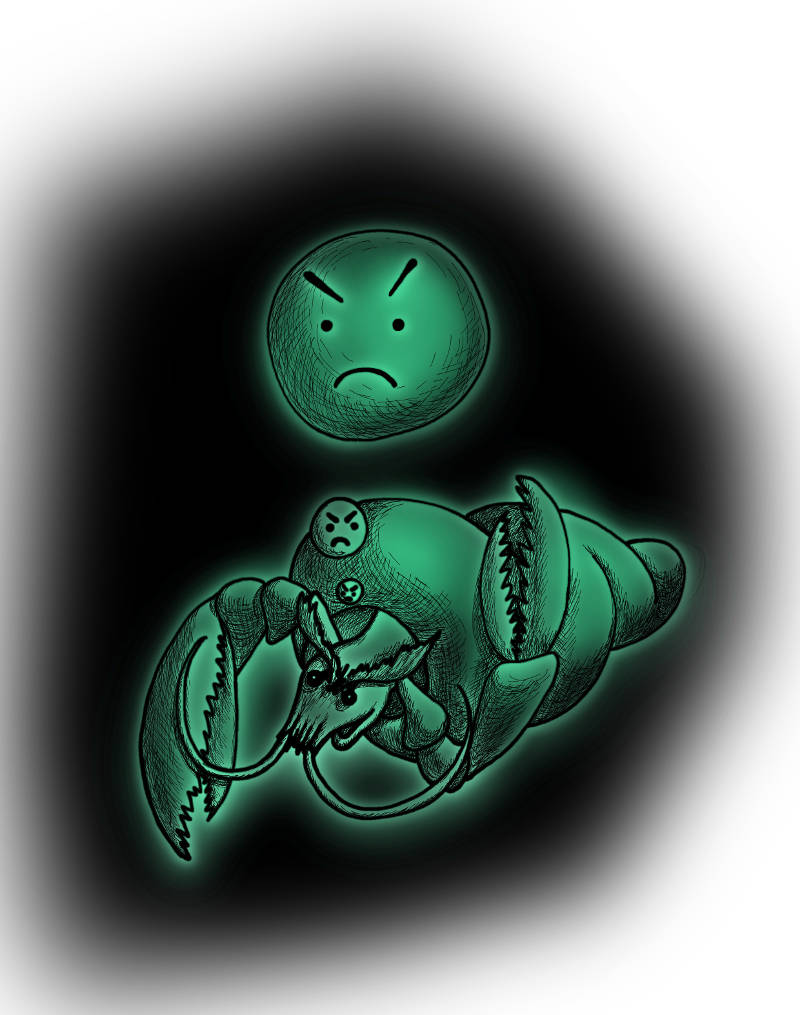
After placing a restraining fin on Sir Pineapple’s bristling chest, Sunny continued, as briefly and clearly as she could, “We were locked in this tunnel system by the hagfish monster from The House of Light and need to find our way out. Can you help us, please?”
“Aaaah, that joker!” replied the voice, sounding a little less crabby. “I know him – a selfless idiot, the worst kind! Selfish shellfish usually cause problems to themselves and their nearest and dearest, but those who believe themselves selfless – oooh, they can cause death and destruction on a truly monumental scale. I hate the little freak!”
“He is quite large, really,” interrupted Sir Pineapple, who did not like the idea of being defeated in battle by “a little freak”.
“Fat,” replied the hermit-crab, “fat and muscle – his brain, not too large to begin with, is now competing with his soul for the title of the smallest organ in the wide blue sea – and I am not sure which is winning! Anyway…”
It was Sunny’s turn to interrupt, “But why would you hate someone harming others if you do not like anyone?” she asked slowly, the carefully manufactured look of innocent confusion attempting to hide her irritation.
“And why do you think I owe you an explanation, young lady?!” snapped the voice in reply.
Sunny thought that that would be the end of the conversation, but the hermit-crab continued, in a mellower voice, “The truth of the matter is that we grew up on the same reef, the angelfish and I. He was a proper angelfish then, stunningly beautiful, and I was just a little shrimp. He seemed kind and generous and I admired him, especially when he talked about love for his fellow sea-creatures. For someone who talked so much about love, he did not seem to notice anyone much, but I was too young to understand that the only thing he loved about others was his own reflection in their eyes. He had charisma – bags of it! He was one of those people who bend the world around themselves. Not a person who is too bloody-minded to adjust, so the world tends to bend around them, forming a sort of bubble, where they are allowed to live as they are, if they are lucky – or become fossilized, if they are not… In other words not like me. No, he was infinitely flexible, ready to do anything and everything. One of those people who spend an inordinate amount of effort to bend the world around themselves, like a powerful fish-eye lens, with them magnified in the centre.
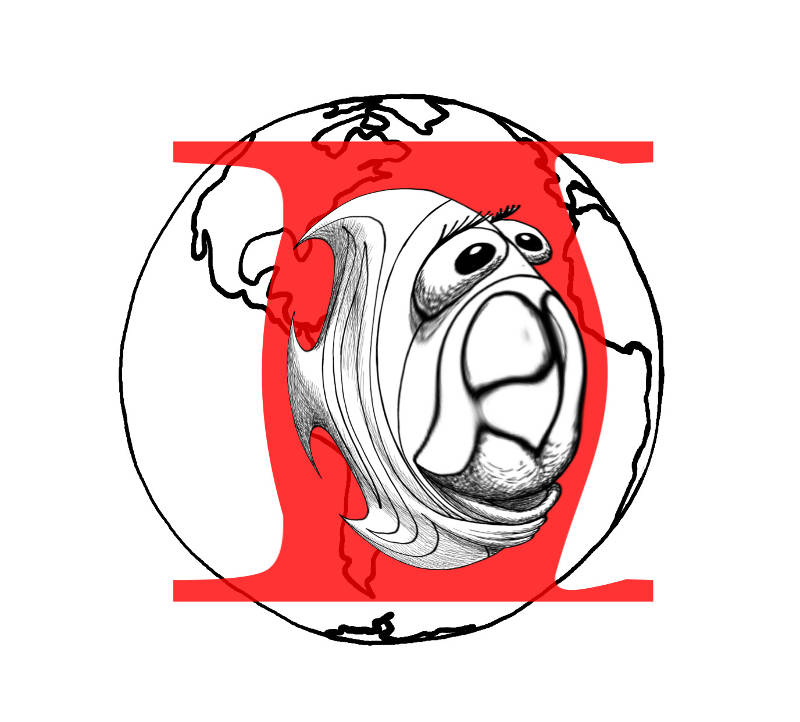
“My dad warned me about him. “I called you Standly,” he said, “hoping that you will stand on your own eight feet… or ten – do claws count as feet? …you know what I mean…” But I didn’t.
“Anyway, he may not have loved me, but I loved him, with all the idealism and idiotism of youth.
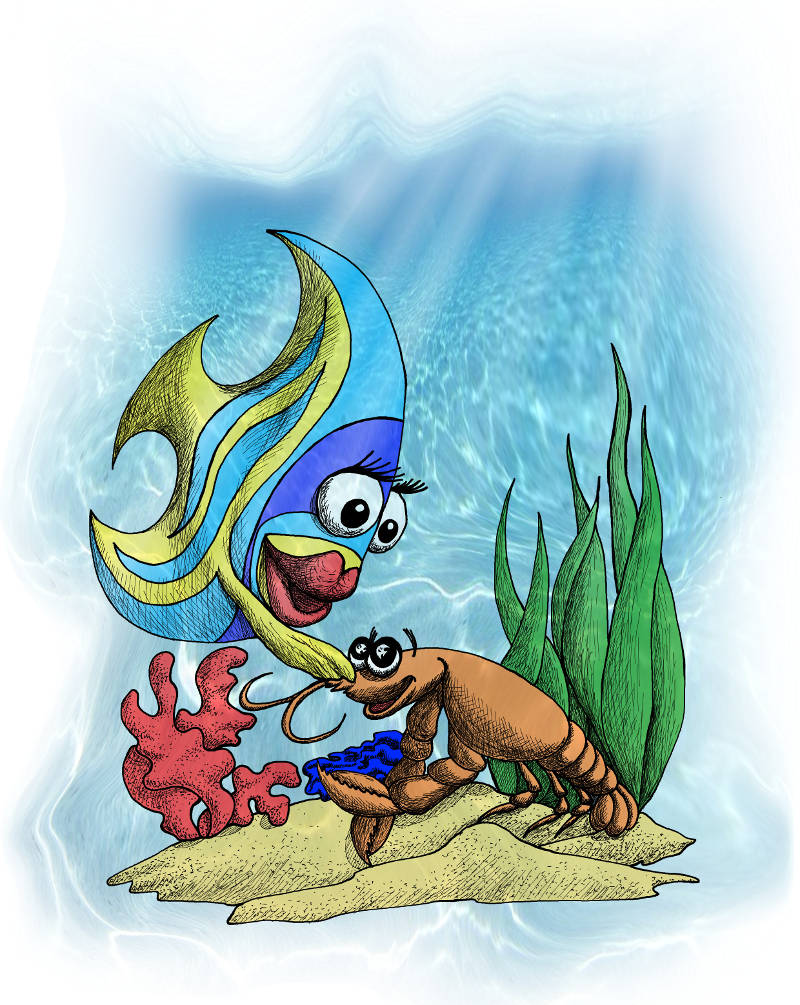
We had a shared delusion of grandeur – his. I joined a bunch of slack-jawed idiots following him around and thinking that he was better than us, that he possessed some kind of holiness… There are different kinds of holiness described in various religious texts I have read since then, some of them quite commendable. Unfortunately, the only kind of holiness most people are interested in is the one that is “holier than thou”. And he was holier than a wagon load of thous, I can tell you! However, as food became scarce after the oil spill, he changed. He was still talking the same talk, but he could no longer afford generosity. We still gave him some of our food when we found it, but he no longer shared his.
“At one point the angelfish promised us that he would find a new source of food, plenty for everyone, if we pool our remaining meagre resources together to finance his expedition. When asked where and when he was going, he just became offended, saying that questioning him showed a lack of proper trust and that those who don’t believe in him do not deserve access to his cornucopia. I was too young and innocent then. I didn’t even ask what a cornucopia was. Do you know what it is? It’s otherwise known as a “horn of plenty” and is said to give its owner anything they want as long as it’s edible or drinkable. A bit like a gift card, really – not quite as good as cash. According to the legend, the god Zeus was hidden in a cave from his father Kronus to stop the father (Kronus) from eating him (Zeus). He was fed by the magic goat Amalthea. Zeus broke off one of her horns and it was turned into the cornucopia, which continued to feed him. We don’t know what happened to the goat, though it probably did not live long after a trauma like that. Lovely family, isn’t it? Anyway, the cornucopia looks something like this:
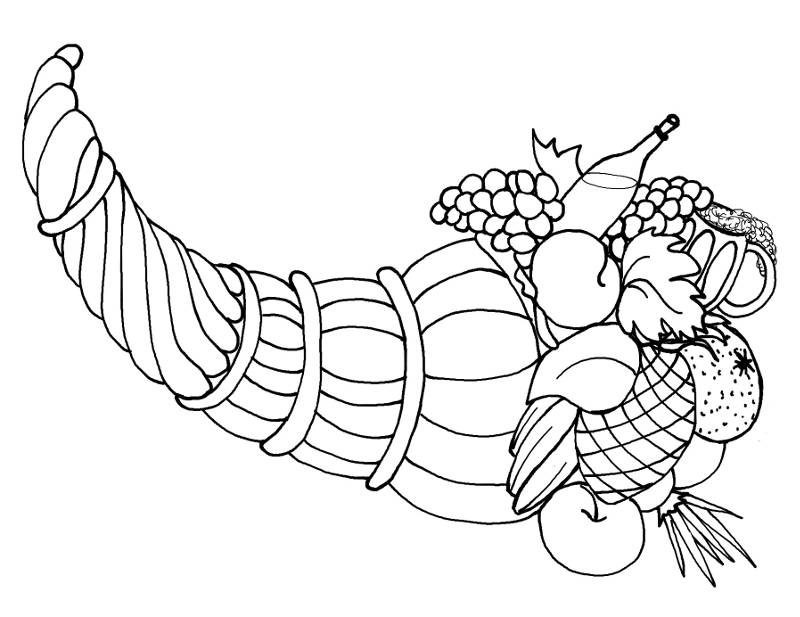
and does not exist.
I also was too young to understand that those who declare blind faith to be a virtue are probably trying to sell you rubbish and those who also declare cynicism a sin actually know that they are trying to sell you rubbish. However, one day a little lungfish, while rooting for food in the sand, came across a secret passage. It led into a small cave filled with food which he recognized as the remains of the supplies we collected to finance the famous expedition. There wasn’t much left. That’s when we realised that the angelfish wasn’t planning to go anywhere, he simply used our love and innocence to cheat us out of our last crumbs. Innocence is just ignorance. It is only proclaimed a virtue by those who exploit it. But I was too innocent to understand that as well – funny how it works! Anyway, I felt disappointed and betrayed and started to hate him. That is when I left the decaying reef, a fitting monument to my dead love, and moved into the tunnels.
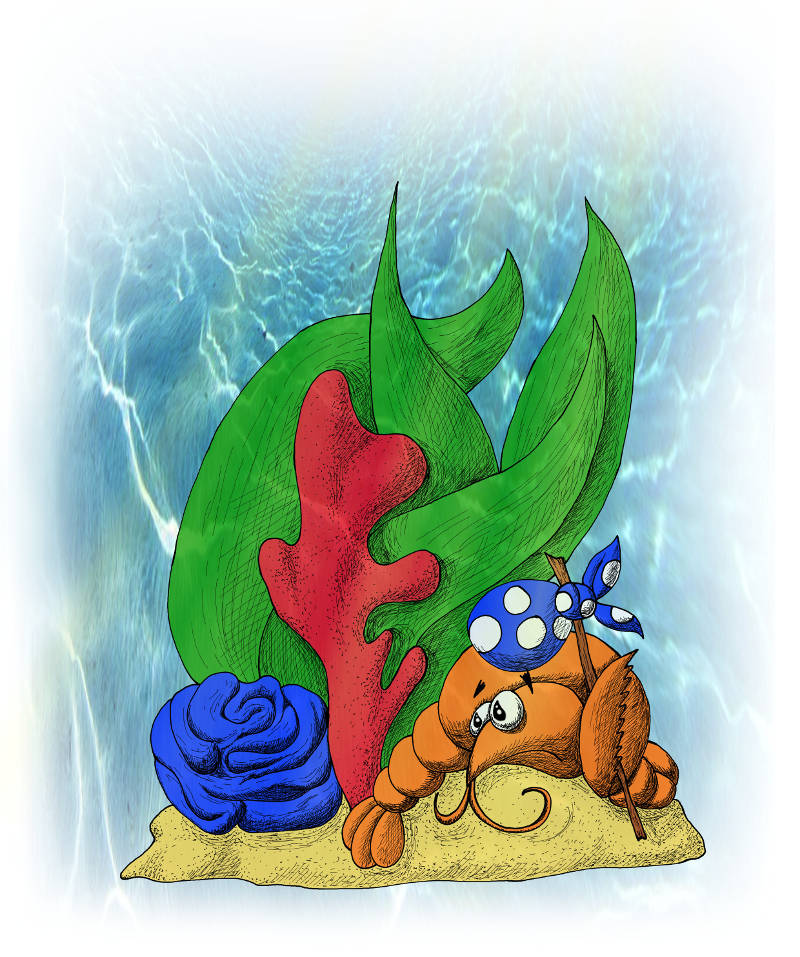
“So, you see, in truth I hate him for harming me. All the other things I said are an excuse – also true, but misleading. Truth often makes the best lies, if you know where to place the emphasis…” the hermit-crab’s voice became thoughtful and rich by this point, all the gruffness was gone. “I am afraid my relationships with people never really progressed beyond the letter “A”. It used to be adoration, then anger and now it alternates between aloofness and annoyance…”
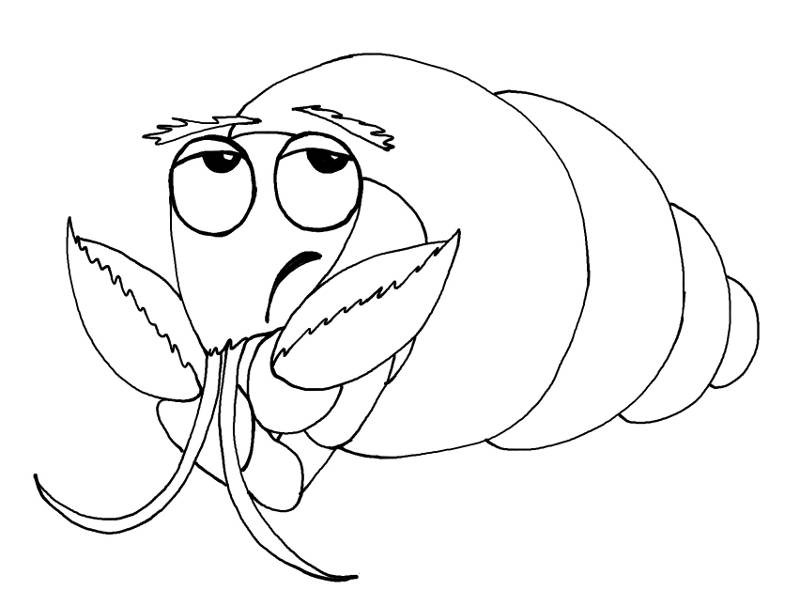
There was a long melancholy pause, while the hermit-crab thought about love, Simon thought about the hermit-crab’s story, Sunny thought that all this sounded sad and profound (or was it profoundly sad?), and Sir Pineapple thought that some people think too much. He was just considering the best way of interrupting this protracted pause and bringing up the topic of finding the exit from the tunnels, when their host sighed and said, in a voice as crabby as ever, “Topologically, any maze is a tube with islands.”
As the statement seemed entirely opaque, but relevant, and no further explanation seemed to follow, Sir Pineapple could think of no better question than, “What?”
“Mark the place where you start, hold on to the wall – right or left, doesn’t matter and walk keeping your fin on the wall,” replied the hermit-crab with an exasperated sigh. Sunny was sure he was rolling his eyes, though she could not see him in the dark corner. “If you end up at the start again without finding an exit, hold on to the opposite wall and repeat the procedure. You are guaranteed to find the exit sooner or later, if one exists. And one does, because I got in here somehow. Clear?”
“I think I understand,” said Simon thoughtfully.
“Clear off then!” snapped the hermit crab with a finality making any further remarks pointless. The return of his crabbiness broke the melancholy mood. As soon as they were out of earshot of the the cave, Sunny cheered everyone else even more by what she called her “crabby nonsense,” recited in her most serious voice,
“I met a grumpy hermit crab,
I asked the hermit crab,
“What’s up?”
I didn’t grump, I didn’t yell,
But he retreated in his shell.
I wondered why, I asked him straight,
“Man, was it something that you ate?”
But he refused to answer sense.
He said,
“Get lost!”
He was intense.
I tried to offer him a choice
of this and that to feed him up,
he answered in a crabby voice,
“Begone, you impudent young pup!”
I was fed up. I asked again,
“Why so crabby, dear chap?”
He said,
“The clue is in the name!”
and shut his shell with final snap.”
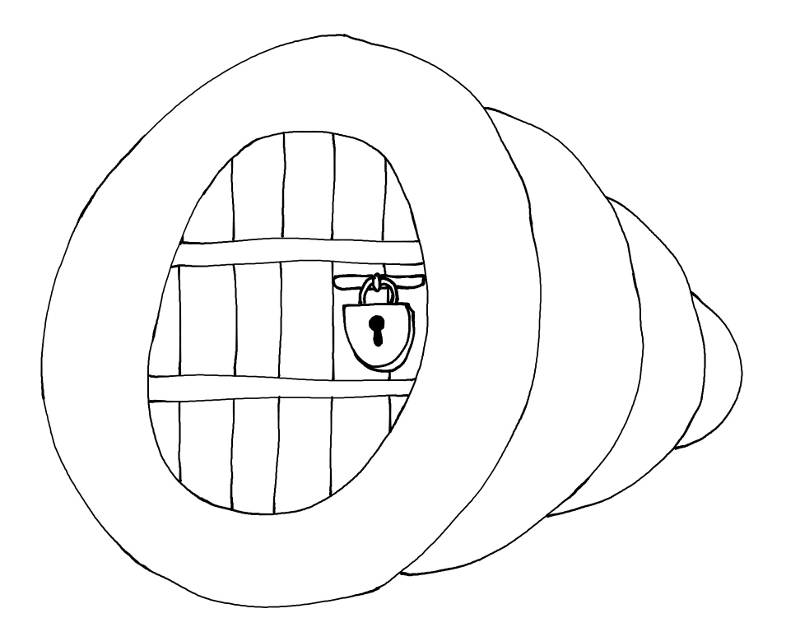
***
“I wonder if anyone ever loves anyone else or if it’s always an illusion, an imaginary landscape built on a few points of connection? I wonder what it is? People use love as an excuse for almost anything – or is it a reason for almost anything? My mother told me she divorced my father because she didn’t love him anymore. She said she married my stepfather because she did. Did she? They seem to argue a lot. Does she? Or is she scared of losing him now that she is older? Or of admitting to making the wrong choice?” Sunny was musing, looking at a spider web. “I wonder if I will ever fall in love, or if I will find that I imagined it, like mother, or missed it, like Mrs Pearl? Or is it something you build, day by day, layer by layer, out of the little kindnesses you give and receive, out of gratitude, out of tolerance with a soupcon of cowardice, out of familiarity and convenience? Should it be exciting and searing, like a falling star, or comfortable and familiar, like a home?” As Sunny didn’t know the answer to any of these questions, her musings gradually turned into a daydream, and her daydream – into a story.
When You Wish Upon a Star
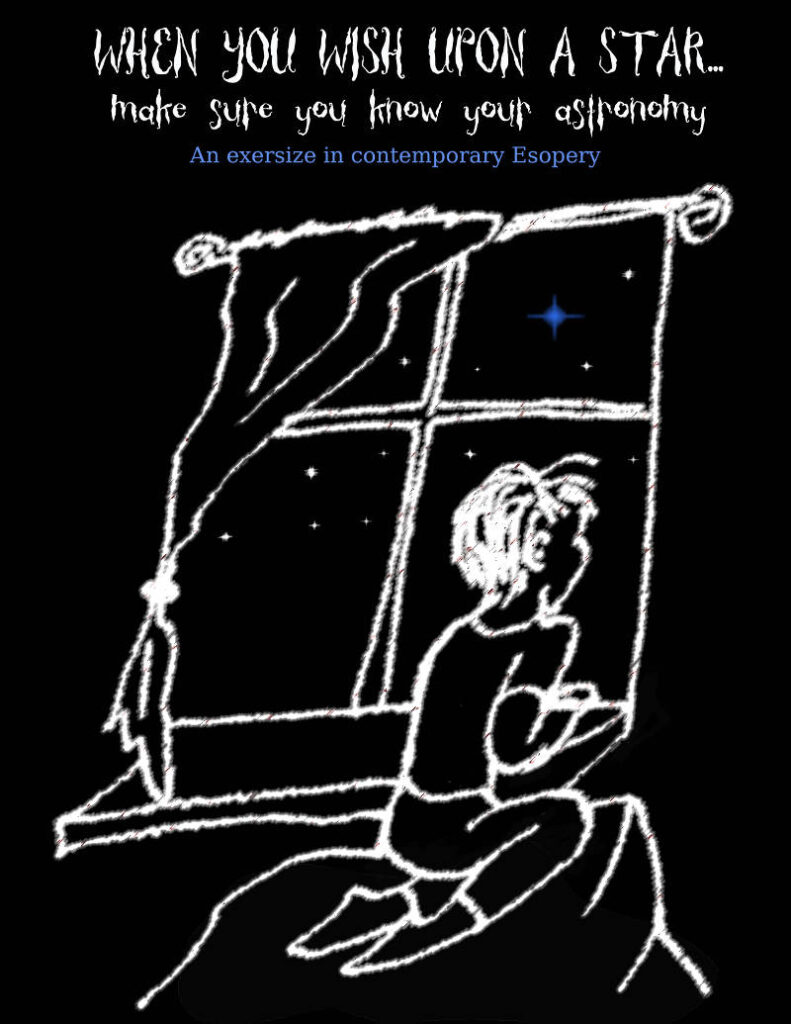
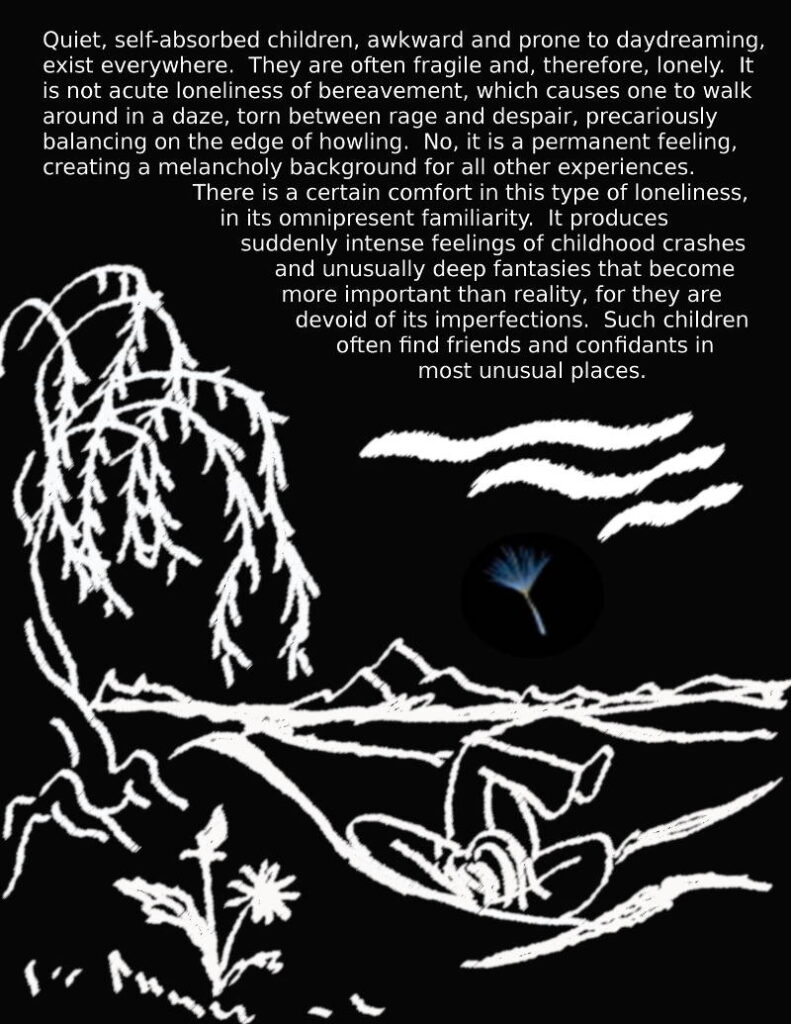
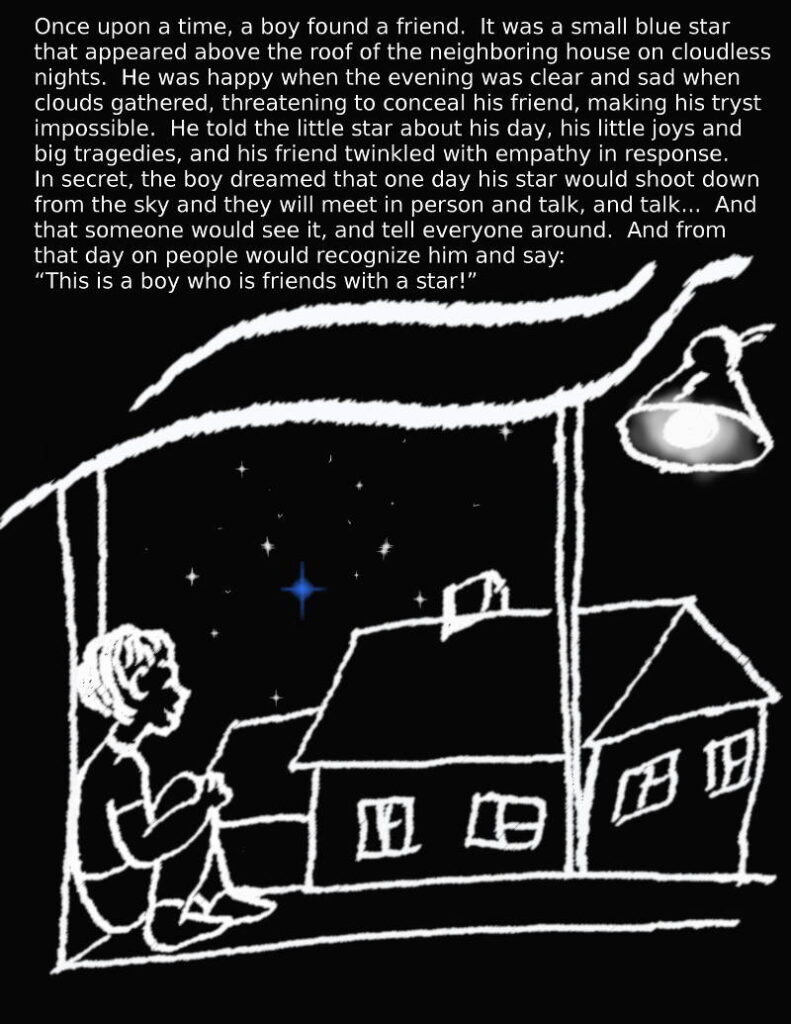
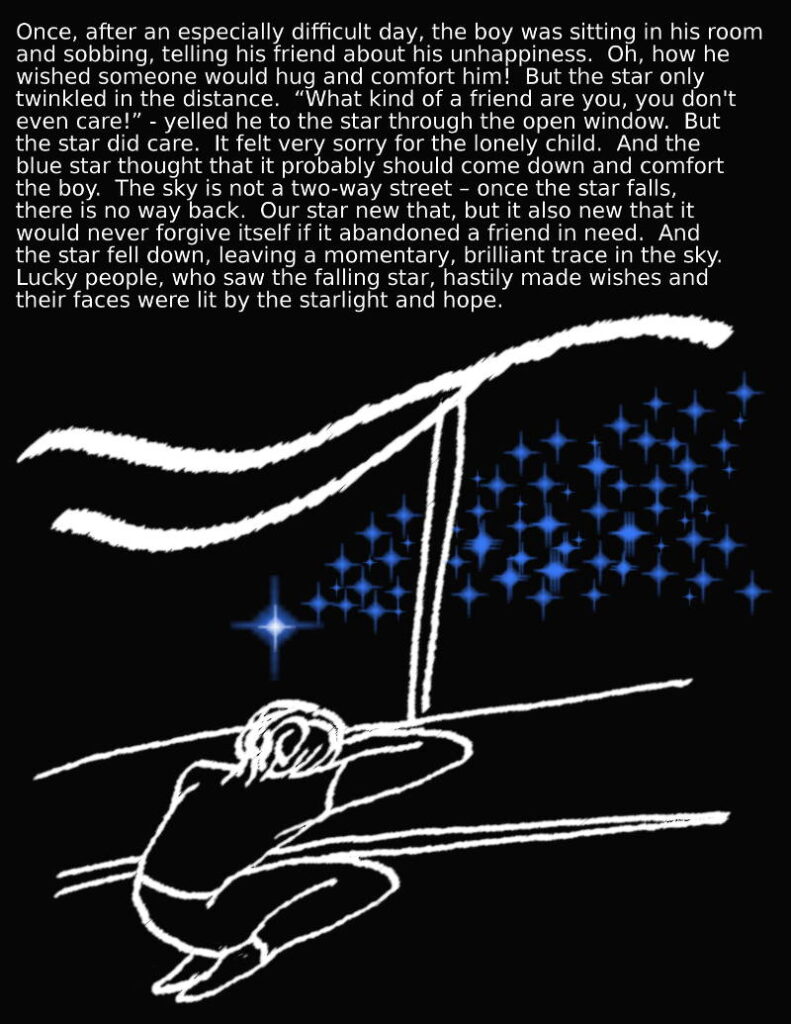
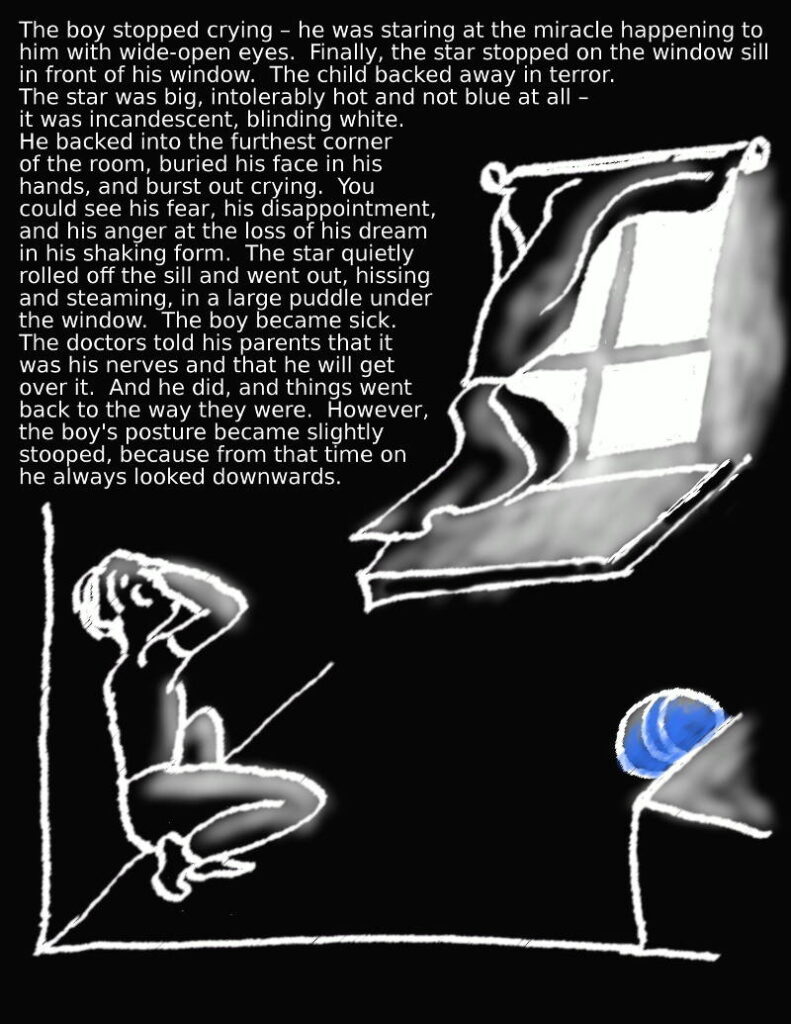
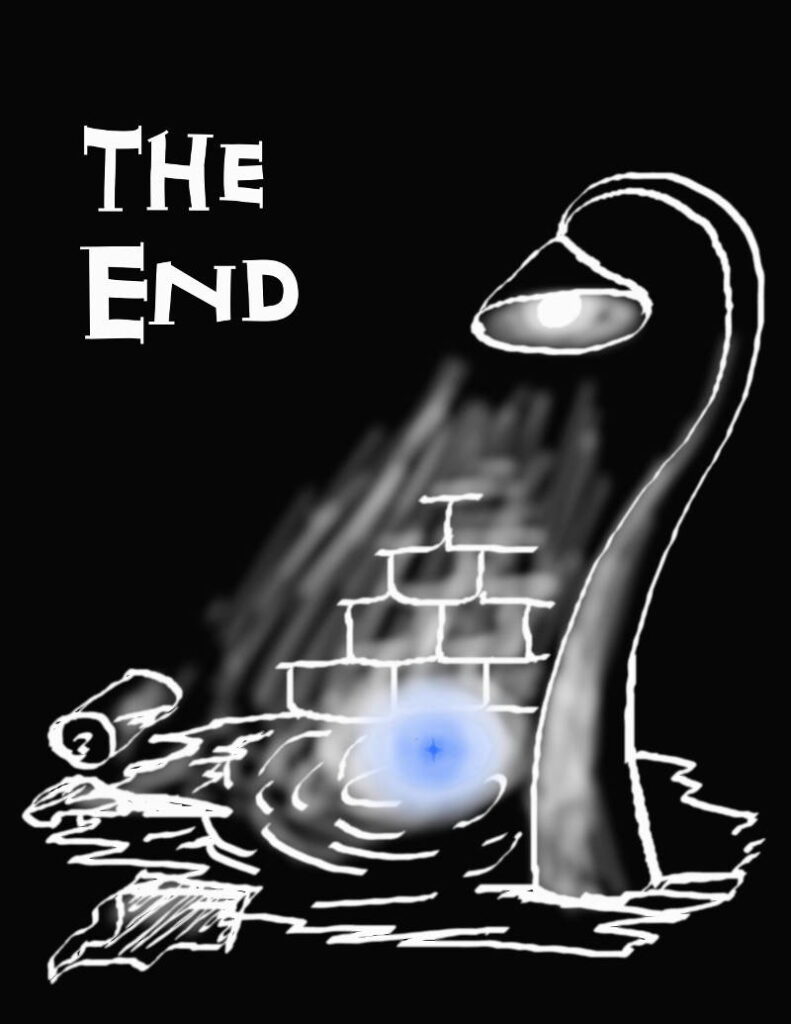
When Sunny surfaced from her daydream, she realised that it was dark outside. Stars twinkled above and snow – below, in the cold light of an enormous moon. The long day was coming to its end – and so was the story.
Chapter Twenty
In which we see the light at the end of the tunnel and narrowly avoid an encounter of the final kind.
Our friends quickly returned to the entrance of the tunnel. When the party got out into the light, Simon drew a diagram explaining the hermit-crab’s idea. It was rather neat – see? The dead-end tunnels are essentially a continuing wall, starting and ending at the entrance to the dead end. Therefore, if you follow the wall faithfully, it is no longer a maze – you are just following a long wiggly tunnel to the exit. The only trick is to avoid the islands – those narcissistic walls that do not lead to the exit, but only to the beginning of themselves – that is why you need to mark the beginning. All this is much clearer with a picture:
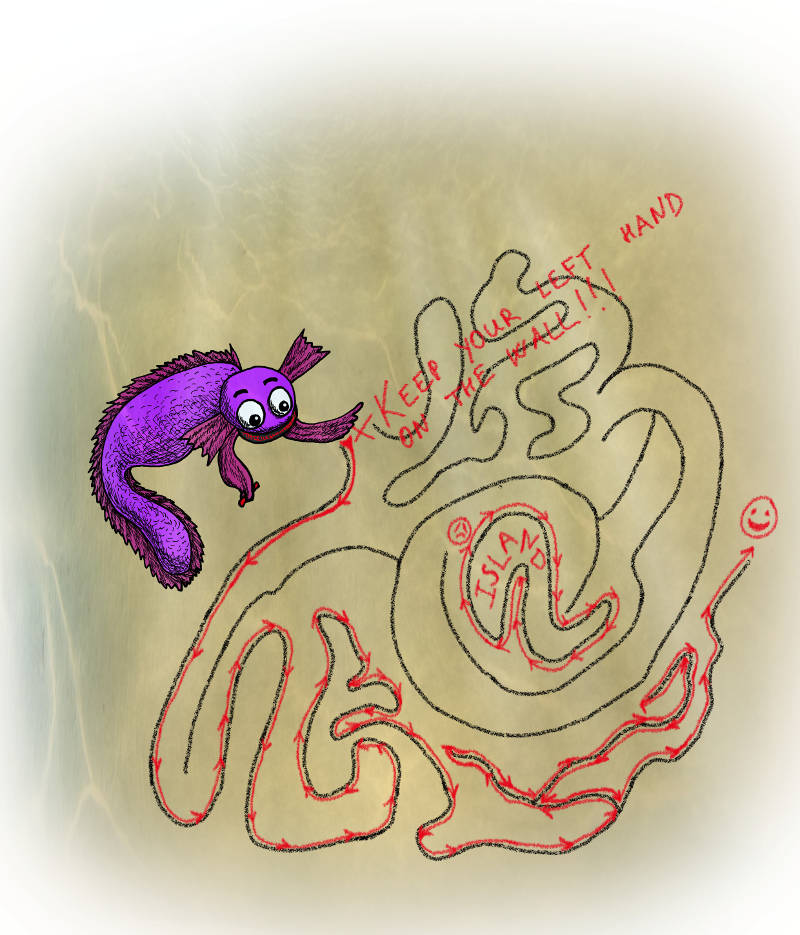
“Finally, we have a plan!” exclaimed Sir Pineapple enthusiastically, after missing Simon’s explanation in its entirety except for the last part – namely, the marking of the starting point. The knightfish believed in acquiring knowledge on a need-to-know basis and happily ignored what he didn’t need to know. “The hermit was on the right, should we try the left wall?” and, without waiting for an answer, he made several large notches on the left side of the tunnel entrance with his sword and led the way.
It was a long journey, punctuated by scanty meals and fitful sleep, huddling in the cold darkness for warmth and company.
When you think about them, long journeys sound romantic and exciting, probably because travel implies exploration. Something new could happen at any moment. You could discover something incredible. You could meet someone who might change your life. It’s a pity that most of the time you discover that your feet hurt and meet people uncannily similar to those you left behind.
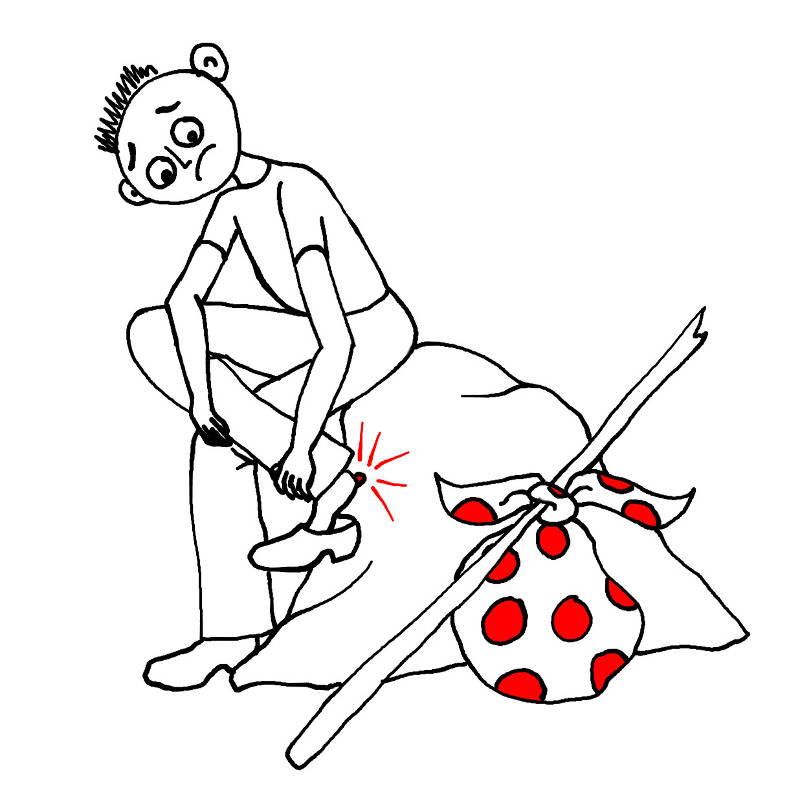
After slogging through darkness for what felt like eternity, our friends finally saw a pale glimmer in the distance. It was, unmistakably, sunlight – filtering through the water at considerable depth, but of that bright, rich hue never achieved by bioluminescence.
Do you still remember what that is? If not, go back to the beginning and read the book again – that will teach you to pay attention!
As our friends swam nearer the mouth of the tunnel, it joined several others and turned into a small cavern. When they approached it, a strong current suddenly appeared out of nowhere. It grabbed them and pulled them inexorably toward the light. Fortunately, the exit was half-barred with several large rocks. Sir Pineapple, with uncharacteristic quickness of thought, wedged his shield into them. Sunny and Simon, desperately working against the current, managed to grab onto him and hide behind the shield.
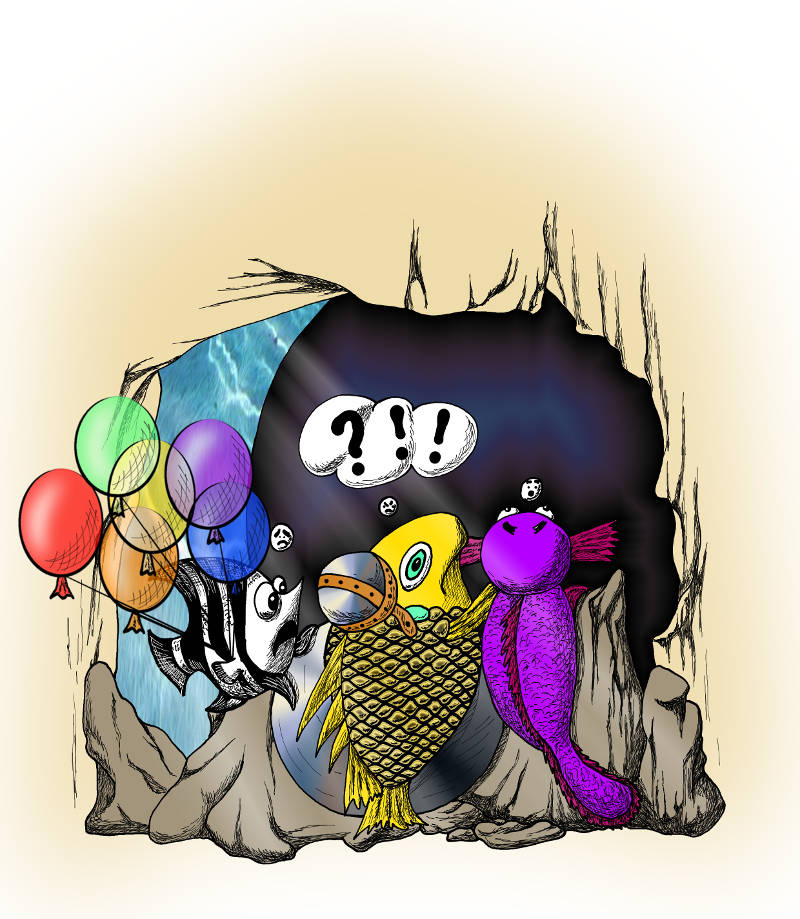
“What’s next? A plague of water-breathing chickens with flippers?!” exclaimed Sir Pineapple in an exasperated voice, when the current stopped as suddenly as it had started.
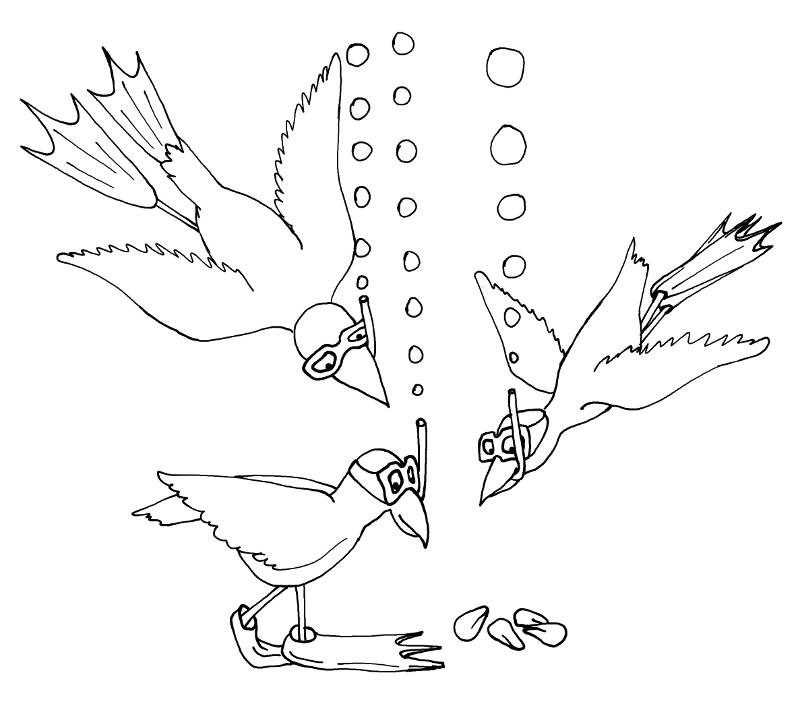
After a few seconds our friends started to peer around the edges of the shield cautiously. The exit was now dark, covered by a giant shadow. The water was deathly still.
Sir Pineapple just puffed up his chest for courage and started to venture outside in order to investigate the shadow, when a high, clear voice said, “Get back and hold on tight, guv’nor! He’ll start again in a minute!”
“Who is “he”? And who, for that matter, are you?” started the knightfish in a put-upon voice, when the current reappeared and he had to duck quickly behind his shield.
Huddling behind the shield, our friends watched in amazement as a small spiky ball slowly and deliberately approached them from behind another rock, sticking his spikes firmly into the ground with every move to prevent the current from sucking him in. Once in the lee of the shield, the ball moved some of the spikes aside, revealing a grinning face.
“Name’s Lurch, guv’nor, I’m a sea urchin. Of the Kelpington urchins, you know. Me grandfather was the richest echinoderm in these tunnels. He used to run the most successful tea shop around.

Famous for his cuppa, he was. Customers came from miles around to try it – he made a fortune! Kept the secret of the recipe until his dying day, too. When he was on his deathbed, me Dad asked him what the secret was. You know what he said? Don’t skimp on the tea leaves! Mind you, me Dad didn’t skimp on anything. By the time I came along, he was skint,” Lurch sighed. “I had to fend for me-self, I did.”
“And this,” sea urchin shook himself and pointed dramatically towards the exit with a few spikes, “is the biggest bully in the ocean. Can you believe this joker? The biggest fish in the sea, as big as some whales – and they are mammals, you know – and he only eats the smallest folks. Krill and little fish – I swear, he is afraid of anything bigger than a shrimp! He calls himself a whale shark to sound scary, but has neither the teeth of a shark nor the mass of a real whale! A big joke, that’s what I call him!” and the sea urchin snorted loudly.
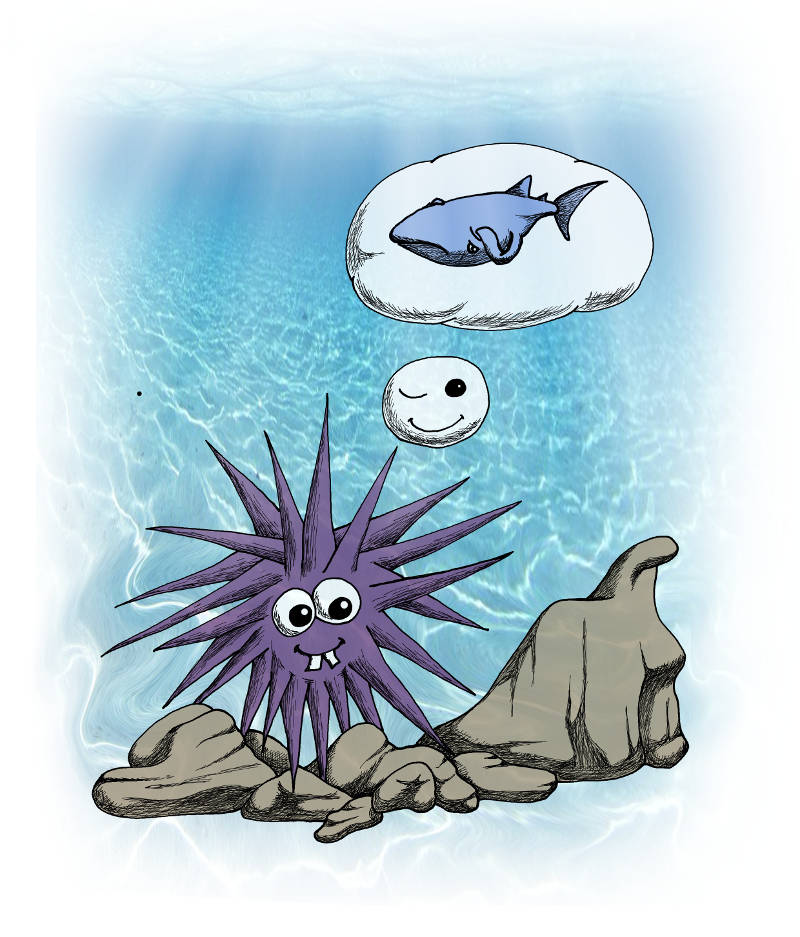
“Oh, no!” exclaimed Sunny, whose sense of humour could no longer cope with the cold and the darkness and abandoned her for a holiday in the warm sunlight somewhere else. “We have been travelling through these tunnels for days! We are sick and tired of it and really want to get out! Do you know how long the whale shark is likely to do this, Lurch?”
“Could be days… once he settles in to feed, he stays until there is nothing left, the lazy thing. That’s how he feeds, you know – just sucks in water and filters food out. He won’t eat you – you are too big – but may damage you badly with the current. I’ll tell you what – I can scare him off for you! What’s in it for me, though?” and the urchin raised an eyebrow expectantly at Sunny.
“I don’t really have anything worth anything,” started Sunny, and then remembered the balloons – they were worth something. But they were so pretty and she liked them so much! On the other hand – they were just things. Pretty things, true, but only things… and if they buy her and her friends a passage home – to her own sunny room and old friends… new friends were great, but she also missed Em and even Molly and Polly, silly as they were… Sunny made a decision. “You can have my balloons if you scare the shark, Lurch.”
“Right you are!” winked the sea urchin, after casting an appraising glance at his payment. He waited for the next suck to finish and rolled nonchalantly towards the exit. As soon as the whale-shark opened his mouth for another mouthful, Lurch launched himself up and stuck half of his spikes in the enormous upper palate. The giant fish tried to bite, but only stuck the spikes more firmly into his mouth. With a high-pitched whine, the whale shark turned and fled.
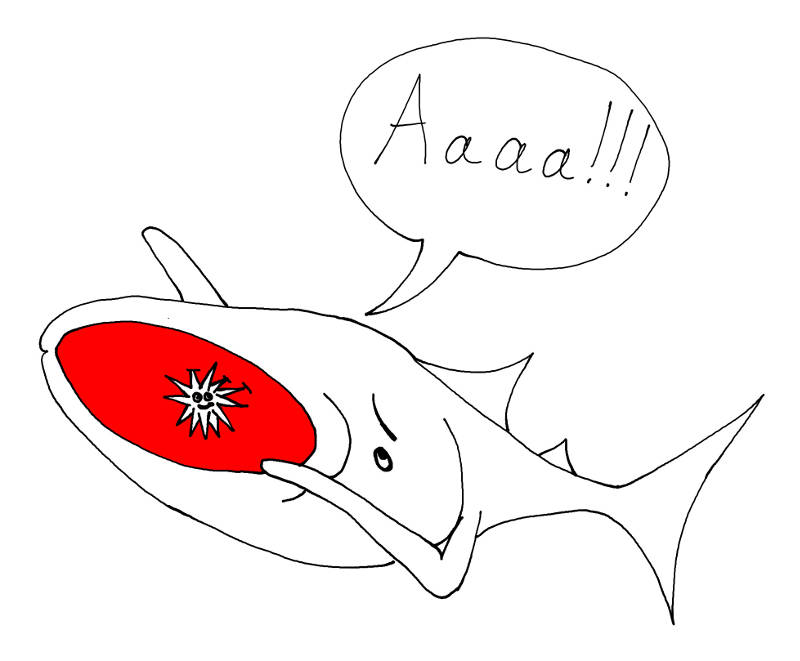
The sea urchin detached himself and rolled back to the cavern exit. “I told you he is a coward,” he said with visible satisfaction and extended a couple of spikes expectantly toward Sunny. With a sigh, she passed over the balloons.
***
It was time for recess. Simon hated recess. The whole school was trooped out into the concrete-covered schoolyard with a narrow ribbon of pathetically wilting grass and a few benches located around its perimeter. There was no place to sit and read – people were running, pushing, jostling and screaming. The noise was at a barely tolerable level. During these times, Simon usually felt awkward and out of place. He knew he was expected to interact with other children, but had no idea what to say and do. Even when he managed to join in a game, he felt like an imposter, with a nagging anxiety about being found out and kicked out lurking continually at the back of his mind. He knew he was not like them.
Oddly, today it didn’t seem to matter. He was watching his screaming, running, jostling schoolmates with a sense of detachment. He caught himself wondering if any of them would be able to see his alien and smiling to himself with genuine smugness. That was an unusual feeling, and Simon rather liked it. As he was no longer worried about joining in, Simon looked at the edges of the yard, where people were standing out of the way, just like him. There was a surprisingly large number of them.
A sudden sense of happy release filled Simon and he realised that he simply couldn’t stand still. With a loud “Whoop!” Simon cartwheeled along the narrow ribbon of stamped down grass.
Chapter Twenty One
Freedom!
And our travellers were free! Clear water was lying in front of them, saturated by sunlight filtering from above. The feeling of space was exhilarating after the confinement of the tunnels. They swam and looped and danced, filling the space with joy.
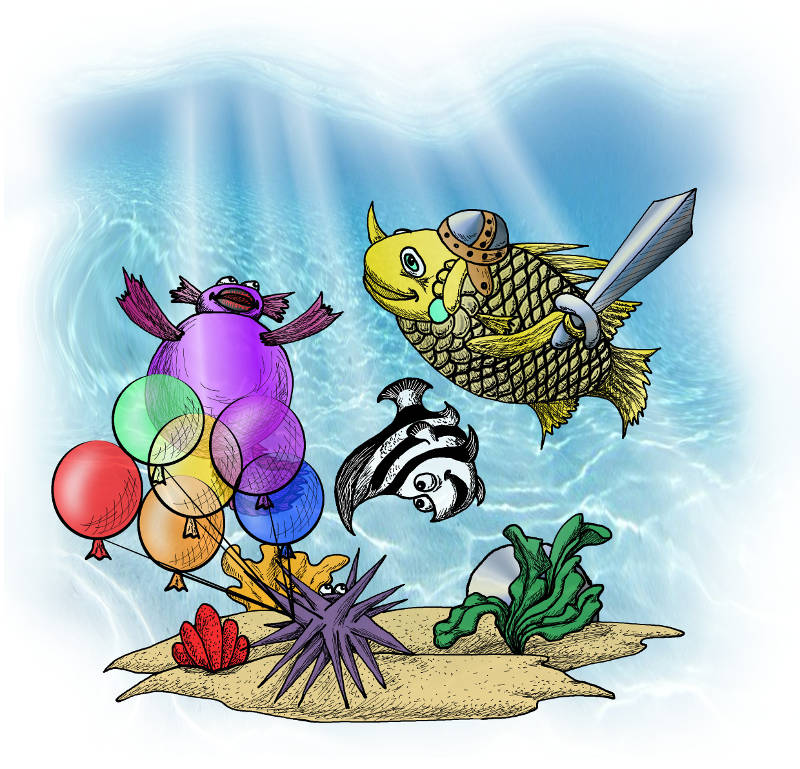
Did you ever notice how joy needs a lot of space? You can be happy and content in a limited space, for you to be cosy space positively has to be confining, but you have to have a huge open space for real bubbling, boundless joy. Now that I come to think of it, this is probably why they call it “boundless”.
Simon explored his new-found ability to swim, starting out cautiously, but occasionally forgetting himself in his excitement and ending up floating upside down, with a somewhat comical startled expression. Sunny giggled quietly when it happened, but swam up and lent a helping fin every time. A cheerful little poem was composing itself in her mind, with the rhythm as bouncy as Simon was at the moment, like this:
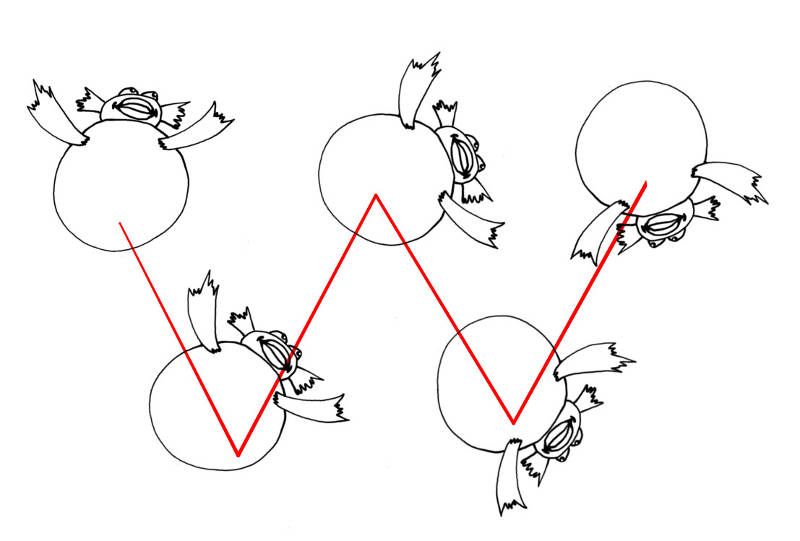
When we went on a quest,
we expected the rest
of adventure to fall into place,
but we swam through the night,
with no exit in sight,
with no respite, no slack to the pace.
We escaped from the dark,
we defeated the shark,
we uncovered innumerous lies,
and discovered that one
can have serious fun
and return in one piece, if one tries.
***
At the end of recess, Simon went back to the classroom, smiling to himself. It was an English lesson. As was usual, when their teacher was falling behind on her grading, she gave them a creative writing assignment. Simon bent over his notebook and was lost to the world.
Changing Colours
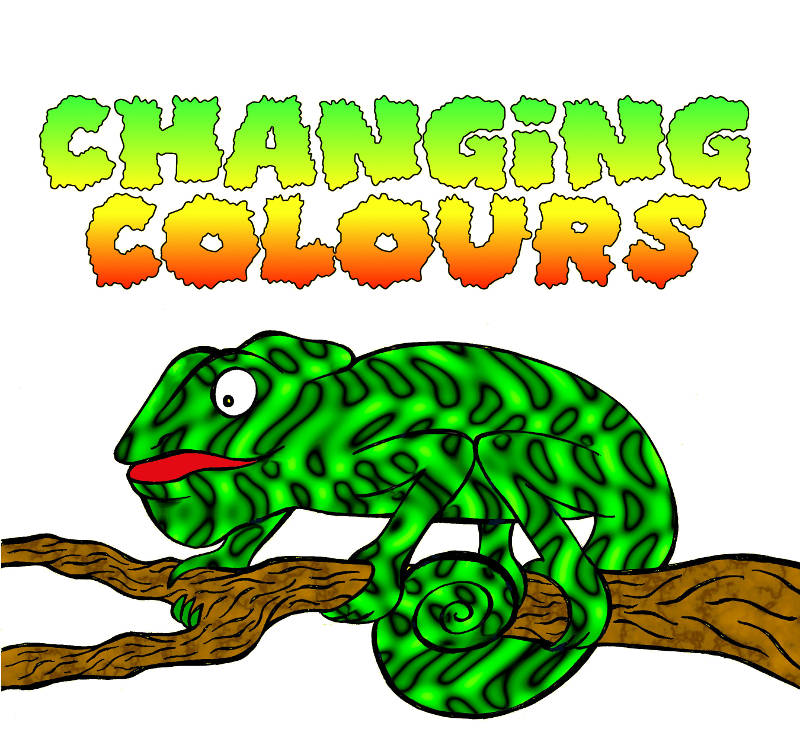
Barney was a chameleon. He lived in a forest (he thought of it as The Forest because he never saw anything else) with a whole lot of other chameleons. There were his father and his mother, and his brothers and sisters, and his grandparents, and aunts, and uncles, and cousins, and great-grandparents, and nephews twice removed, and so on… As I said, there were a lot of them.
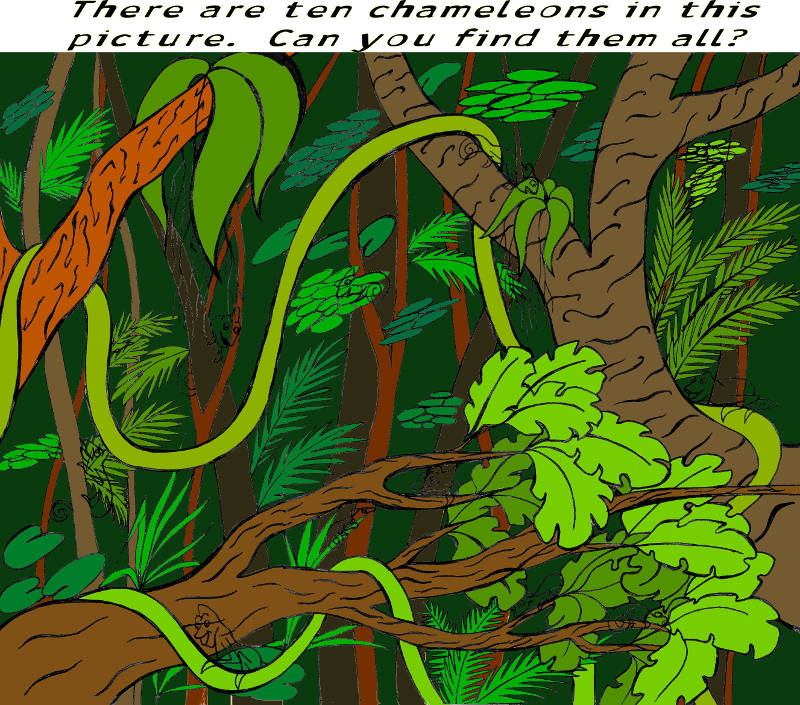
Barney has been changing colours for as long as he could remember because that is what chameleons do. That is what his father, and his mother, and …you’ve got the idea… did. If he was sitting on something green, he turned green. If the clouds covered the sun and his branch turned dark-grey, he turned dark-grey. It was fine most of the year, but became tougher in spring, when everything bloomed and he had to turn several colours at once. But he was a good chameleon and persevered.
One day, when Barney was asleep in a bunch of bananas, his bunch was picked. The man who picked bananas did not notice him and he was transferred with his bunch to the market in a nearby city. When he woke up in the city, he was very scared. It was bright and noisy, and unfamiliar. He scuttled off, hid in the corner, turned dark-grey and waited.
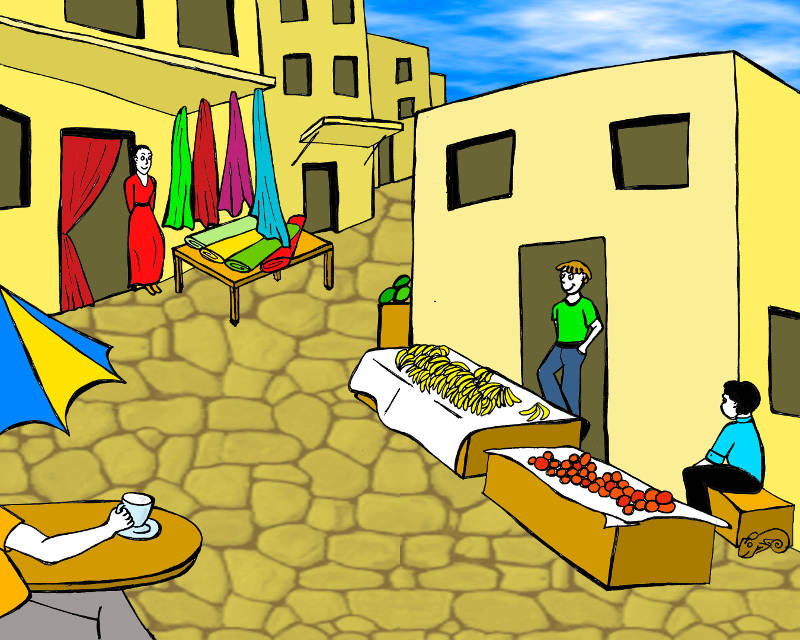
He waited two days and two nights. Eventually he became used to the sounds and colours. He ventured out of his corner and started to look around, hoping to find a way home.
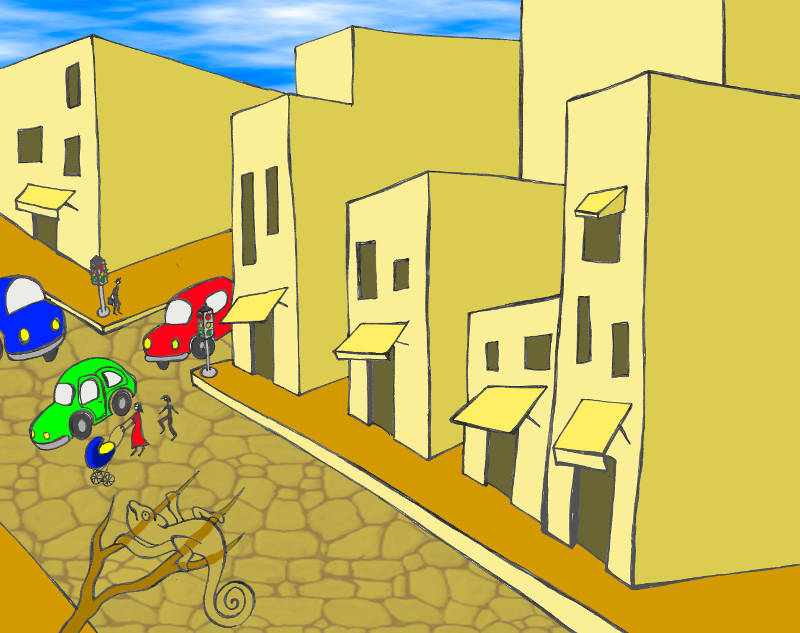
As he was walking through the city, blending into the background, our chameleon was stopped dead in his tracks. He saw a light changing, all by itself, without any change in the environment! It went green, and then yellow, and then red, and then green again… Barney watched the light, entranced. Eventually, he noticed that, when it went red, the traffic on the street stopped, when it went green, everyone moved, and when it went yellow, everyone moved very fast. Barney gasped when he realized the significance of what he saw. Not only did the light choose its own colour – it even commanded others. The chameleon was inspired.
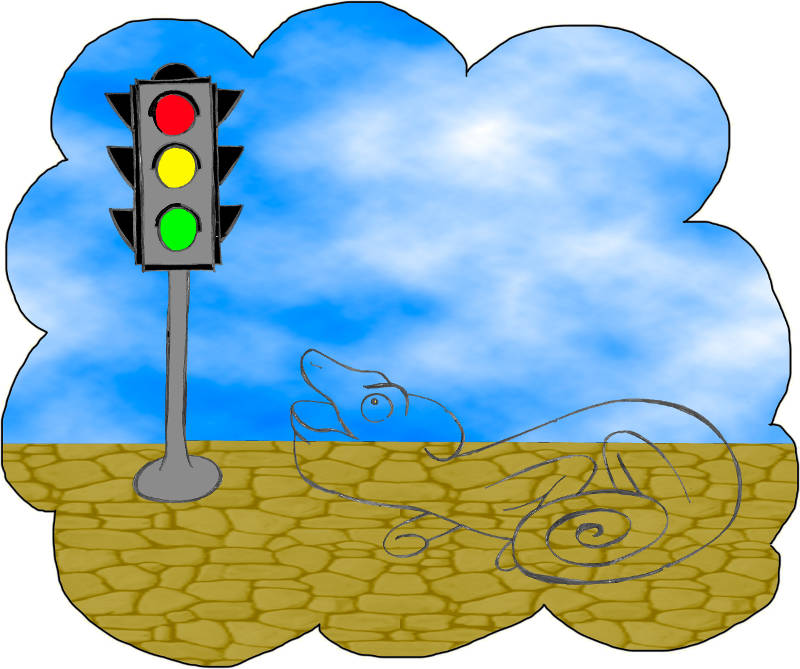
“I shall no longer change colours with every change around me as my father, and my mother, and …you can probably guess… do,” he said to himself “I shall not be dictated to by the world. I shall take my fate into my own hands and be my own person, just like this light!”
It took him a long time, but Barney learned how to change colours at will. At first he had to sit on the light, but eventually he was able to turn green, and then yellow, and then red, and then green again on his own.
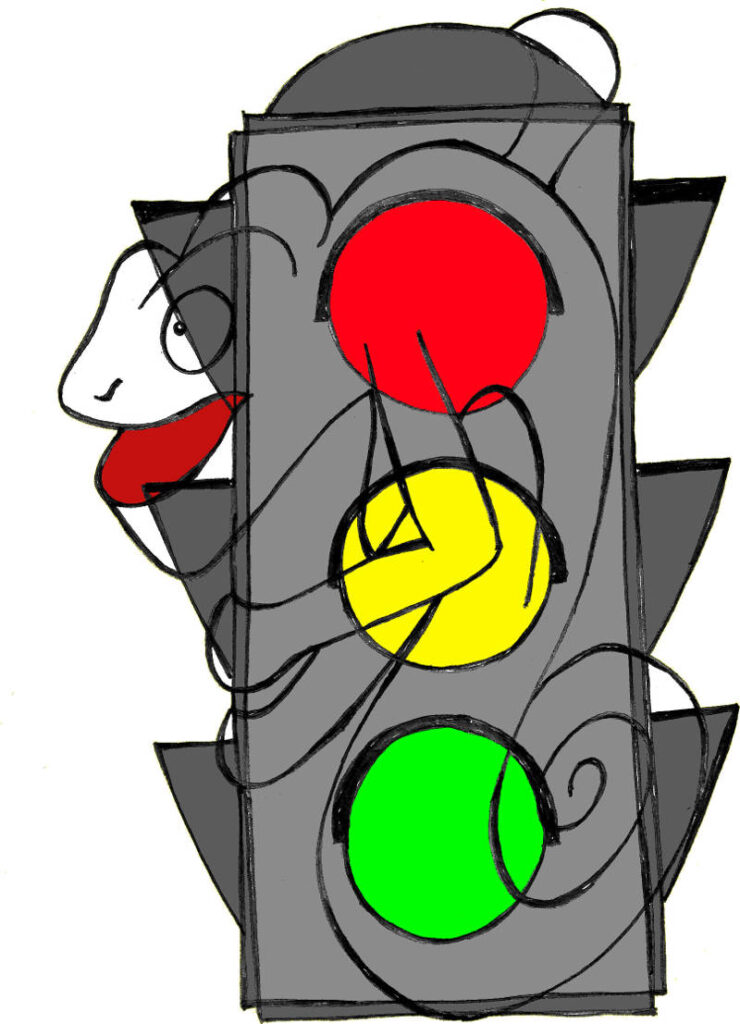
Once he mastered his art, he found a job as a traffic light at a new intersection. And everyone (except for jaywalkers) stopped when he was red and moved when he was green. Our chameleon was happy and respected in the community. He looked down on the disco lights in the nearby club because they turned random colours haphazardly. He thought to himself, “Some people have no discipline. No wonder they cannot command anyone – they cannot even control themselves.” Eventually, Barney married and had children.
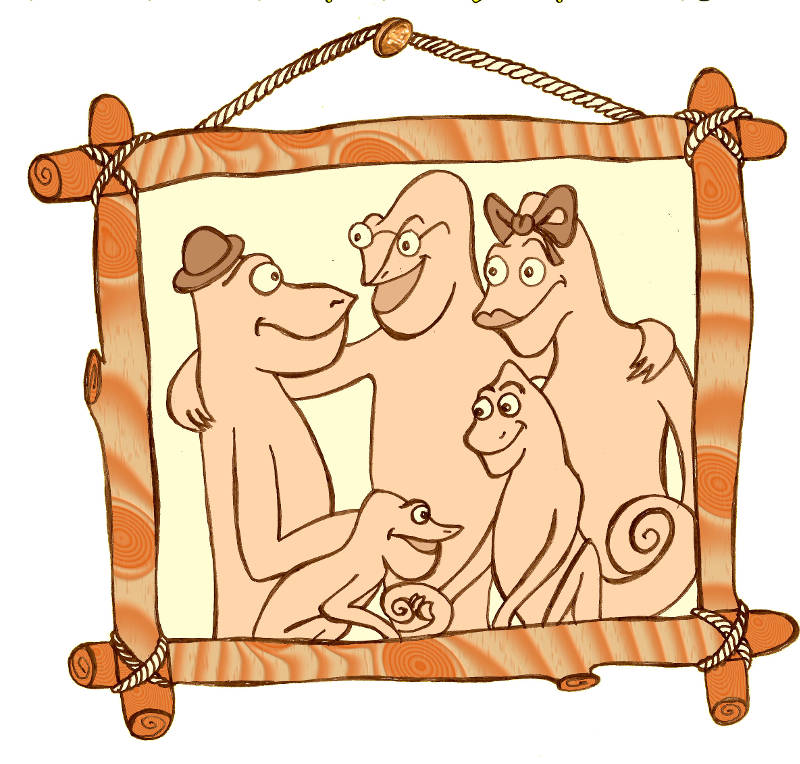
He taught them not to rely on their environment, like their forefathers, and change colours independently to green, and then yellow, and then red, and then green again. He was very happy with his children, most of whom became respectable traffic lights, commanding their own intersections. Only the youngest child was somewhat of a disappointment – he changed colors as the mood took him and did not seem to want a position of responsibility. Our chameleon blamed his wife, who spoiled the youngest child and instilled no discipline. But this was, indeed, a minor annoyance in an otherwise happy and respectable life.
As he grew up, the youngest chameleon went traveling. He even went back to The Forest and met his grandparents, and aunts, and uncles, and cousins, and great-grandparents, and nephews twice removed, and so on. He caused quite a stir by his ability to change colour at will, and some quite young and very old chameleons sometimes followed his example (often incurring the displeasure of the family, because that is not how things are done). He was said to make his living by making pretty patterns on his skin during children’s parties. And that is a happy end, indeed.
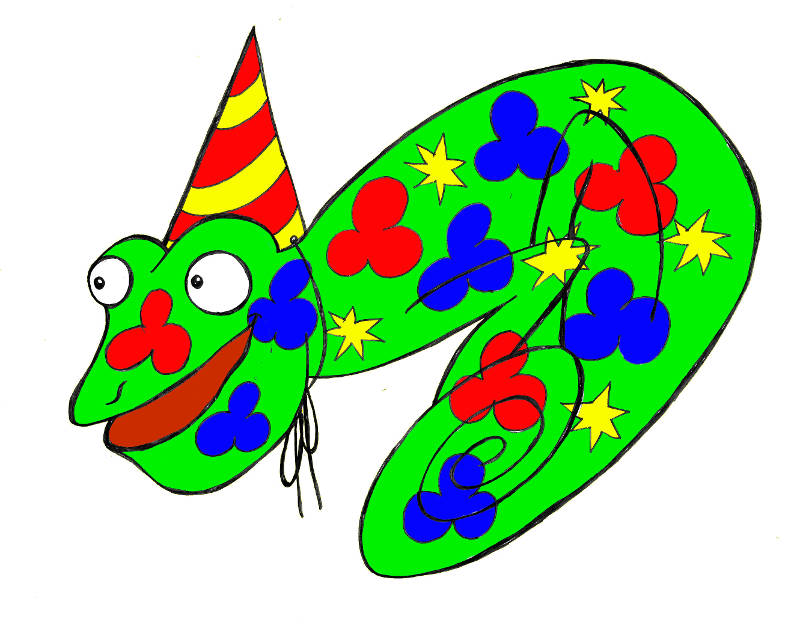
Simon read over his story and felt rather proud of himself. It made sense, which was good, and was a bit funny – which was even better. He walked home happy that day.
Chapter Twenty Two
In which Sunny is lost in a dream and we find out that a timely dig in the ribs can be significantly better for finding yourself than years of therapy.
After a while everyone settled on the sand, exhausted.
“No more fizz,
no more pop,
just a flop
then a drop,”
declaimed Sunny and, true to her word, flopped.
As the excitement wore off and exhaustion set in, the coin of freedom started to land consistently on its flip side – they were all tired, hungry and completely lost.
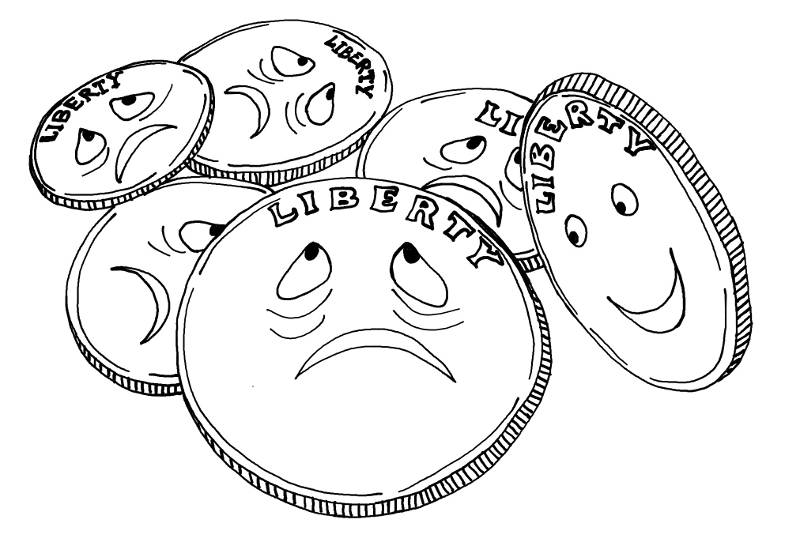
They were just discussing where to go, what to eat and whose fault it all was, with voices progressively more expressive, as well as voluminous, when Sunny stopped in mid-accusation. She saw something more beautiful than anything in the world… something magical… something she read about in picture books… something she housed in the most secret, pinkest recesses of her heart…
You’ve guessed it, she saw a unicorn! There are unicorns in the sea, you know, another name for them is narwhals.
He was moving towards her – alone in the world – and she felt as if she was in a dream.
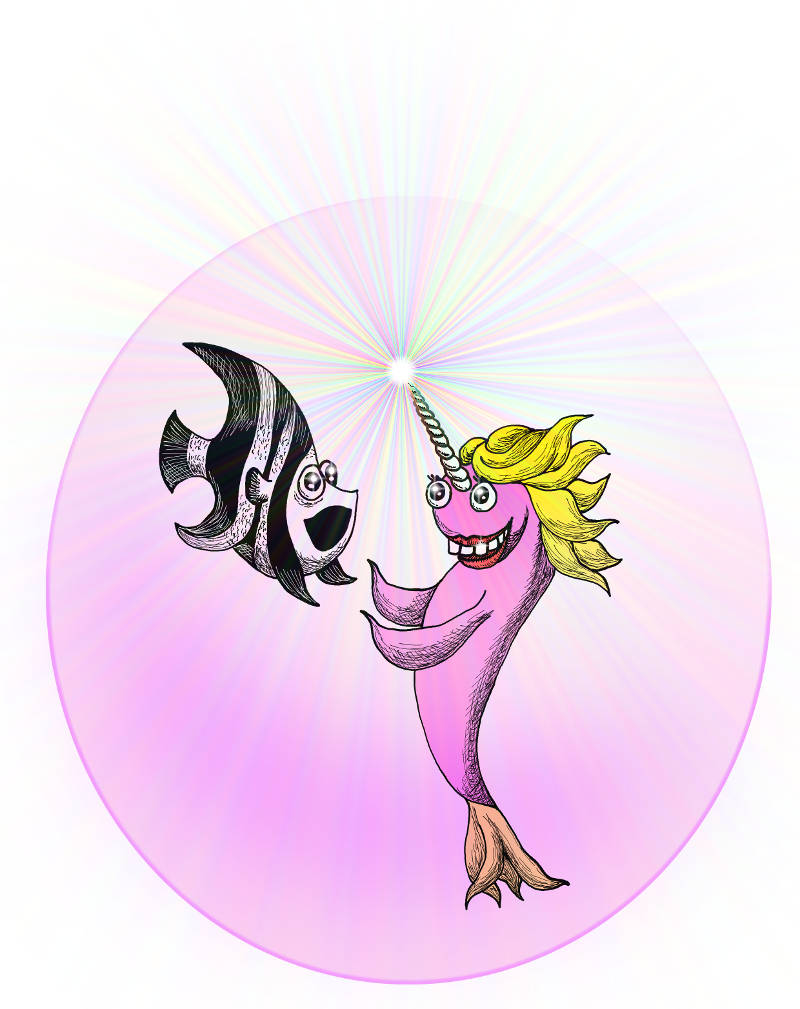
The unicorn was now so close that Sunny could touch him if she dared. But she didn’t. He tossed his head, sun rays reflecting off the curves of his magnificent horn, making the water sparkle around him, and spoke in a deep, melodious voice, “I am Noel. A lady as beautiful as you should not look so lost and upset. May I help you with something?”
“Aaah…” managed Sunny, who suddenly discovered that her head was as empty as her heart was full, “we are lost.”
“Feel lost no longer!” exclaimed Noel, tossing his head – once again – magnificently. “In this chaotic life one needs a home, a place that fits one, an anchor, if you like. And I have a place – even better – a palace – just for you! I would not offer it to anyone else, but the nobility of your features screams “royal blood” to me – you must be a princess! And, as a princess, you must have a palace – you are definitely worth it! I am sure you have been offered a palace before?” the intonation implied a question.
“N-n-no…” stammered Sunny.
“You see!” continued the unicorn indignantly, “They don’t deserve you! You must have a palace befitting your station! With fountains! At least three! All for the low-low price of 499 a month with no money down! I knew it was for you to live happily ever after in as soon as I saw you!” and Noel paused with another toss of his magnificent head, looking expectantly at Sunny.
She was at a loss. Flustered and flattered, she was listening to the flow of words, buoyed up by them, as in a dream, floating in a foamy feathery fog, dense and slightly pink, with a hint of glitter.
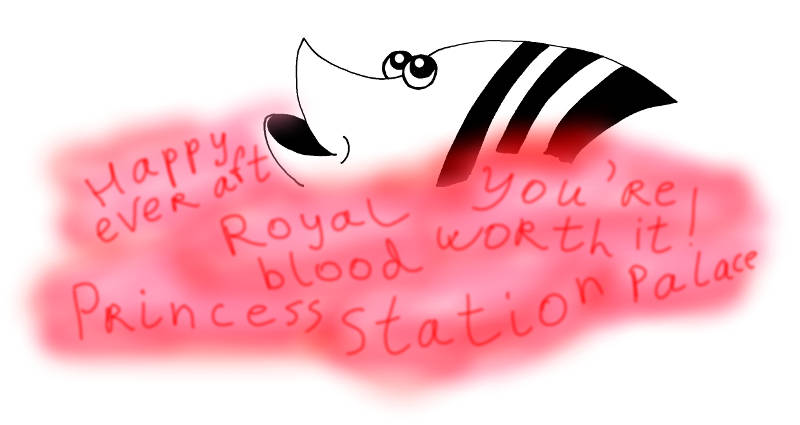
It didn’t even occur to Sunny to wonder who “they” are and why exactly should “they” deserve her. “But I don’t have that much money,” she managed after an embarrassingly long pause.
“But think of it, my dear lady – there is no money down. You just give me the first month payment today – and you are set! The rest you can pay slowly at your convenience. But hurry – the deal ends tonight, when the clock strikes midnight! After that I will not be able to offer you these terms – however much I would love to! And seeing you loose such a magical opportunity to live happily ever after would really break my heart!”
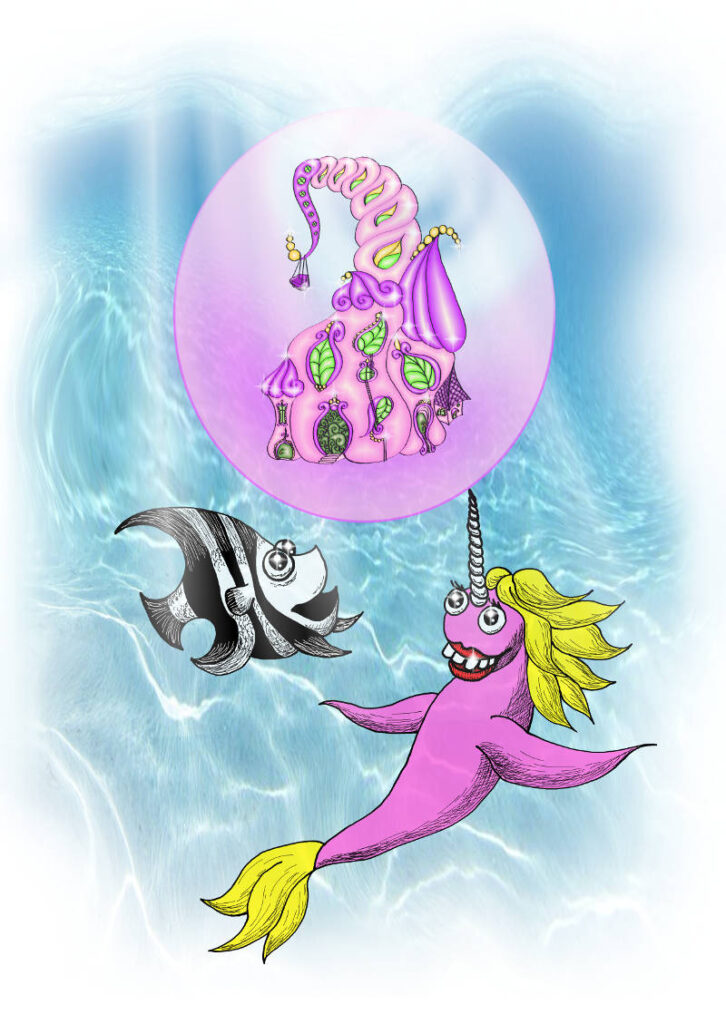
“I suppose,” stammered Sunny, “I cannot miss the chance… May I see the palace now?”
“Not yet, my dear lady, not yet! The property is so hot that we do not show it to those who did not sign the contract as a matter of policy – or demand would be too high and it would no longer be exclusive – and we wouldn’t want that, would we?”
“No, we wouldn’t,” started Sunny, nodding vigorously, but stopped after a sharp dig in the ribs. Reality reasserted itself with pain, as is often the case.
“Snap out of it!” hissed Simon in a loud stage whisper. “First – you don’t need a palace, second – this palace does not exist, and third – you do not have nearly enough money, even for the first month – and neither does anyone you know!”
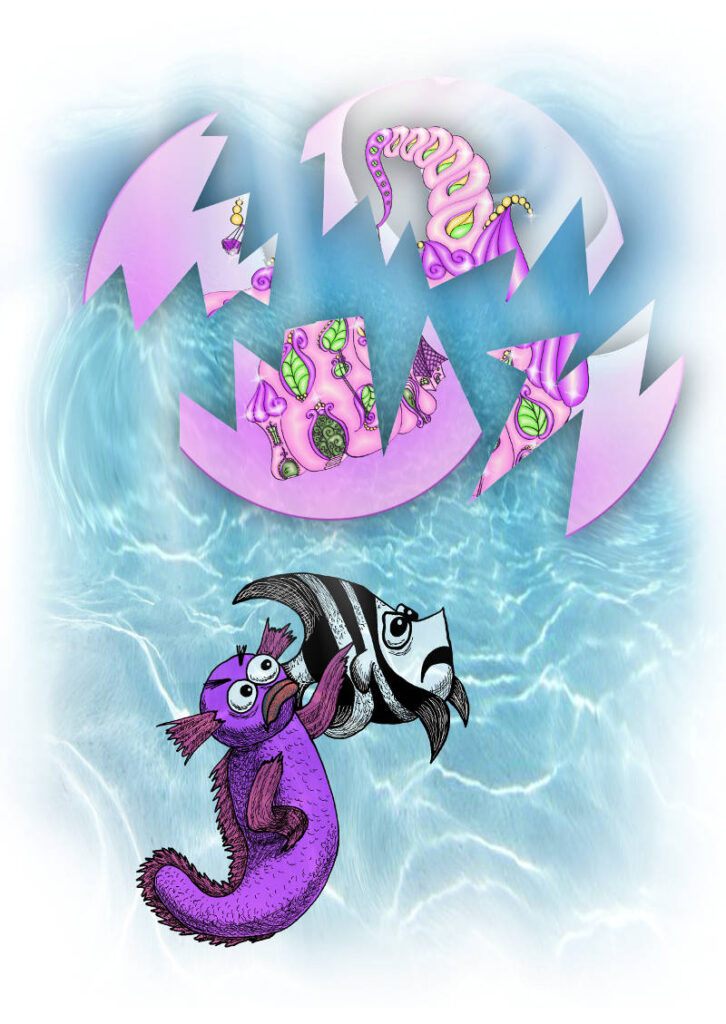
“No money?” interjected Noel, seeming to notice Sunny’s companions for the first time, “none at all?”
“I have a few coins,” mumbled Sunny dazedly, “but not so much.”
“Oh, well,” sighed the unicorn, deflating. “How about a treasure map bought in a tavern from a real pirate? The map is guaranteed to lead you to a fabulous treasure.” He didn’t bother with a head toss this time. Ignoring Simon’s frantic gestures, Sunny meekly proffered her coins and received a shiny gift bag with a pink bow in exchange. Noel grabbed the coins and disappeared with a flick of his tail.
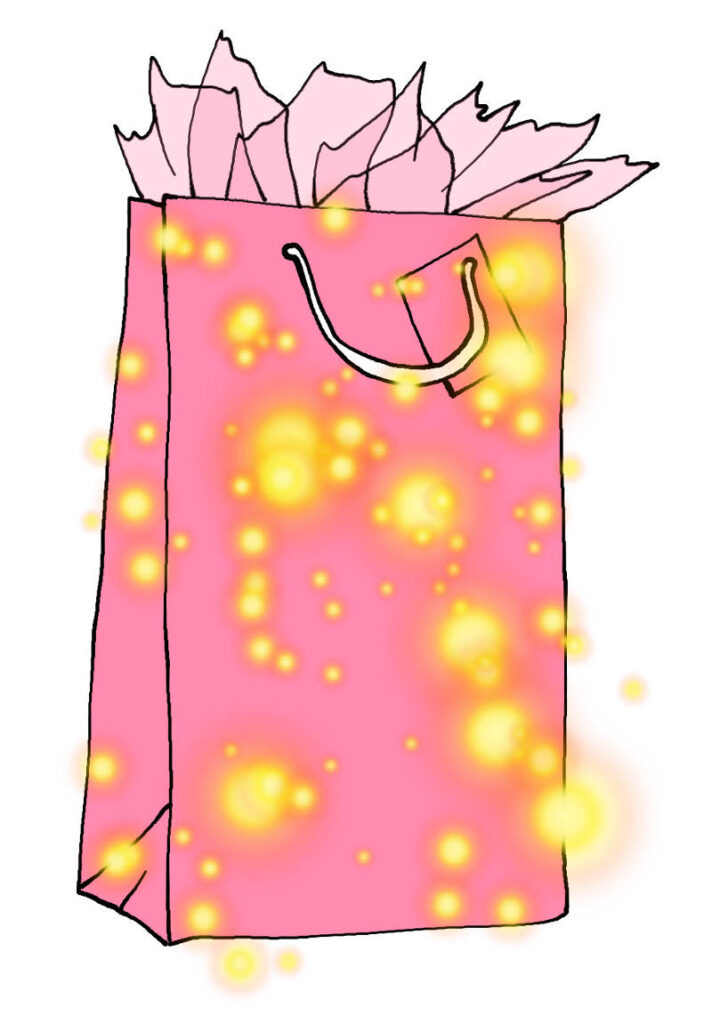
“Probably off to the loo. Judging by his speech, he was in urgent need of a laxative,” muttered Simon.
“Aaah…” sighed Sunny, still looking dazed, “was that a real unicorn?”
“It was a real small-time crook!” replied Simon disgustedly.
“Don’t call him that!” flared up Sunny, “He was beautiful!”
“Beauty is one of the job requirements for a small con. A large governmental bureaucracy is needed for bigger ones. Anyway, it doesn’t matter, we just lost a few coins,” continued Simon more softly, in response to Sunny’s downcast expression.
“You just lost a few coins, but I lost a Unicorn,” she replied in a slow, faraway voice. “All I saw was a dream inside my head… I never even looked at Noel – I missed seeing a real unicorn, and he was right there! I may never have another chance…”
“Lucky you,” snorted Simon somewhat unsympathetically.
“We have the treasure map, though,” Sunny brightened up a little at the thought and opened the glittery bag. The bag contained a grubby piece of vellum marked with something indelible, soggy but still readable.
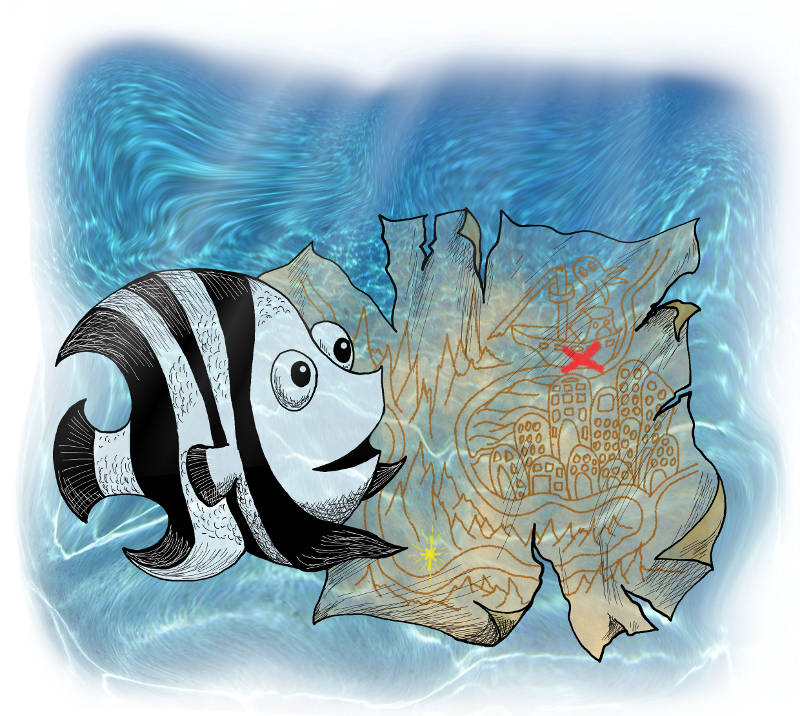
“Look! There is the trench with the House of Light, the town and my ship! It is a real map – it says there is treasure in my ship! Look, look, a cross here!” Sunny was almost jumping with excitement.
“Unfortunately, this provides no new information,” said Sir Pineapple judiciously, “as we do not know where on the map we are.”
But Sunny was unstoppable. “Look there! I think I see the House of Light shining! We can go there and use the map from that point!” And indeed, a distant spot of light could be seen in the gathering dusk, becoming clearer as the water became darker. They were still as tired and hungry as before, but not quite as lost.
“We didn’t need the silly map for that,” muttered Simon, but quietly, so that Sunny wouldn’t hear.
The company set off toward the light, with Sir Pineapple leading the way again.
***
When Simon came back from school the house felt empty, in spite of being full of people. His sisters were in their room, the busy silence of typing on their phones occasionally interrupted by giggles. Grandma was sitting in the living room, sewing to the sound of the radio in the language he no longer understood effortlessly. Ama was in her room, revising for her evening class. When she heard the door, she came out, gave Simon a quick peck on the cheek and a string of instructions about his dinner and disappeared upstairs.
Simon felt disappointed. He wanted to share his story with Ama, but he knew it wouldn’t have worked as soon as he saw her preoccupied expression. She would sit and listen, and praise, but she wouldn’t really need the story – she would be worried about incomplete revision for tonight and the list of things she needs to do for tomorrow – what she would need is time, time taken up by his story…
With a sigh, Simon went to the kitchen, took yesterday’s pizza out of the fridge and put it in the microwave. The smell of hot pastry reminded him that he was hungry. He ate his pizza, and it was good.
Chapter Twenty Three
In which our adventurers go home.
When they arrived at the mouth of the trench, our friends stopped to forage for some food. After everyone was fed and rested, they found a large piece of sandstone and carved on it with Sir Pineapple’s sword: “Beware of the House of Light! It is a trap!” For those who cannot read Sunny added a passable carving of the house with a giant toothy anglerfish hiding behind it, gleefully rubbing its stomach with a fin. They made another carving like that in the trench wall next to the house and at the other end of the valley, just to make sure that they warn travellers from all directions.
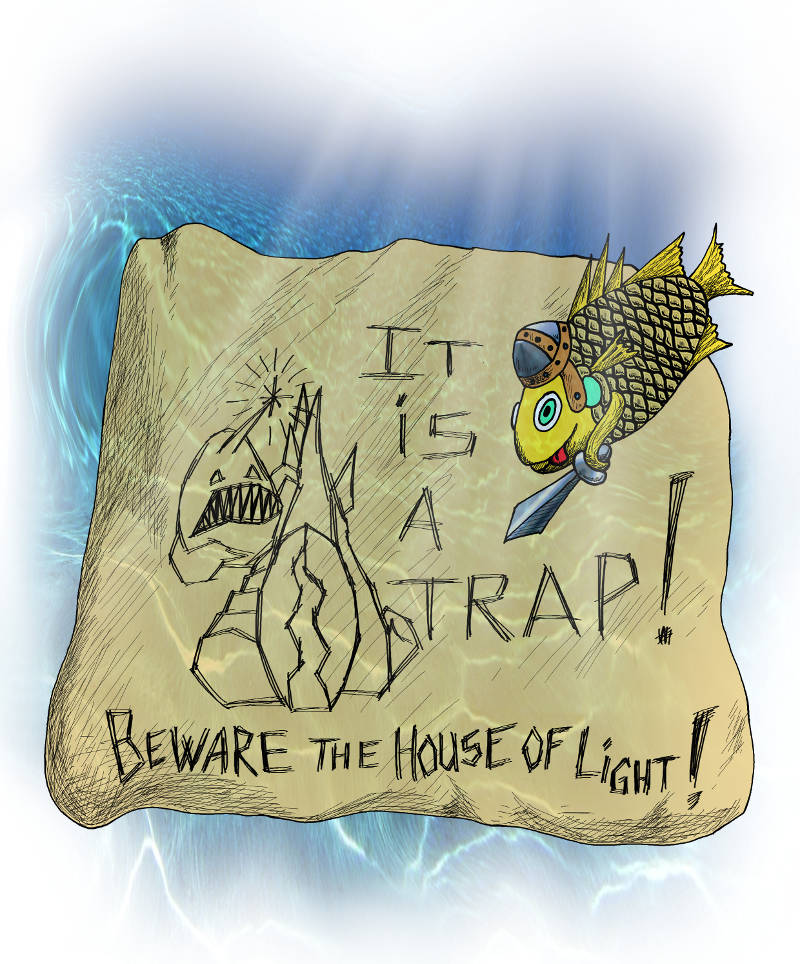
“I actually feel a little sorry for the monster-fish,” said Sunny thoughtfully, when the work was done. “He used to be so beautiful – and turned into such an ugly thing… and he meant it for the best, really. He wasn’t selfish – at least he didn’t realize he was selfish. He thought that his goal justified his means. Instead, it was only the means of his self-justification…”
“Me too,” said Sir Pineapple, eliciting a startled stare from Simon, who did not expect that particular sentiment from him at all, “but an explanation is not the same as an excuse. We can often understand the reasons for murderers, thieves and tyrants’ behaviour. They are not that complicated, after all – they just value themselves on a small scale. And we often feel sorry for them. They live in such primitive worlds, with wealth limited to what they can grab and power – to whom they can beat up. And there is always somebody stronger, or richer, or nastier… There is no way to win in their world – they spend their lives frustrated, like an anglerfish trying to catch its own lure. However, it does not obviate their personal responsibility or our need to deal with them.”
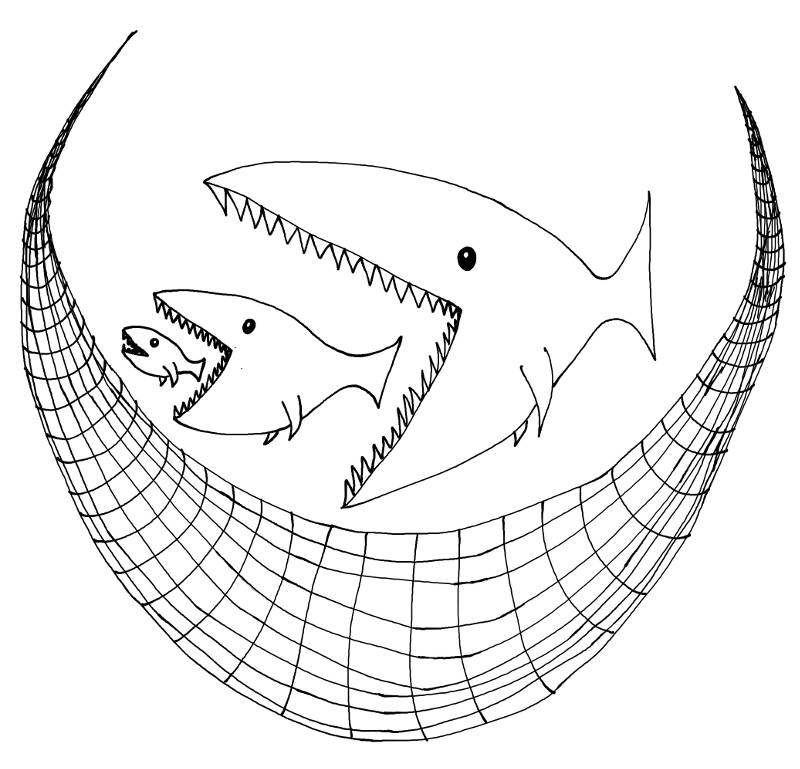
By this time, our friends had swum out of the trench into warmer water and didn’t feel like thinking about sad things anymore. So they didn’t. Sunny taught them her silly song instead, and they carried on, singing at the top of their voices,
“Hoppity-hop,
we all went to the shop;
skippity-skip,
we all went to the ship;
boppity-bop,
it’s a skip, jump and hop!”
***
Warm, heavy and full of pizza, Simon mounted the stairs to his room with a simultaneously mounting sense of excitement. “I wonder if my story would make any sense to the elephant? He said that they don’t have different cultures, so it probably wouldn’t… I hope he is here,” Simon’s thoughts were racing.
The room was dark and disappointingly empty. Simon sat down on the bed, waiting for his heart to slow down, when its pace was quickened again by a loud thunderclap. He looked out of the window on the darkened sky and realised that it was raining heavily. A flash of lightning made him blink, illuminating the map of tiny blood vessels in his eyeballs, forked like the lightning itself.
As he was looking into the intensified darkness outside, Simon’s excitement rose. A ball of light was slowly approaching his window. It came out of the darkness and floated sedately in the thin air towards him. “It must have something to do with my visitor,” thought Simon and rushed to open the window. “I wonder what it is?”
As the ball floated into the room, picking out pale surfaces with its ghostly light, Simon approached it eagerly. “Where are you? How are you doing that? Hey, tell me – I am all excited!” he babbled, stretching his hand towards the shining globe.
“Tell you what? Doing what?” the now familiar sound of his visitor’s voice came from behind Simon and he turned around with a start, wide-open mouth and a bit of luck. The globe exploded right where his hand was a second ago with a loud bang. Like a shot. Like a shot, he threw himself on the floor. It singed the hair on the back of his head, but his hand was intact, as was the rest of him.
“Why did you do that?!” Simon was shaking with shock.
“Do what? I have no idea what you are talking about,” replied the elephant irritably.
“The explosive ball thing – it almost burned my hand!”
“Why would you think I did that? I don’t even know what it is!”
“Honestly? I thought it was connected with you because it is something unusual, just like you,” now that the shock was gone, Simon was able to think again. “I suppose we automatically connect strange things together, making them even stranger.”
“That must be how conspiracy theories about us are formed…” the little elephant nodded sagely and started tapping on his tablet with his trunk. “Here we are – it’s a weather phenomenon called “ball lightning”. It is described along with other unusual atmospheric phenomena, like raining frogs and blood, dust and fire devils, triple sun and blue moon – all confirmed, it seems,” and he passed the tablet across to Simon.
Simon skimmed through the Wikipedia article, pausing on the 19th century account by Wilfrid de Fonvielle: “On 10th of September 1845 a ball of lightning entered the kitchen of a house in the village of Salagnac in the valley of Correze. This ball rolled across without doing any harm to two women and a young man who were here; but on getting into an adjoining stable it exploded and killed a pig which happened to be shut up there, and which, knowing nothing about the wonders of thunder and lightning, dared to smell it in the most rude and unbecoming manner.”
“Lucky I wasn’t rude and unbecoming, then” smiled Simon, turning towards his visitor. “Sorry I assumed it was you.”
“No problem, it helps me to understand how you think. Assumptions are quite difficult to find, but useful. Once you know what they are, you can work out the logic behind what people think – or its absence. Assumptions are where we live.”
“Assumptions are where we live?” Simon was turning this thought over and over in his mind. It felt like it made sense, but he couldn’t quite catch it. “Slippery, like a fish, sliding out of my grasp.” Somehow, the image made him feel less confused, though it didn’t make his guest’s statement any clearer.
Chapter Twenty Four
Rainbow under the sea.
When they arrived in town, it was mid-afternoon, the sun was shining and the shops were busy. It must have been only a few days since Sunny set off to buy a loaf of bread and an umbrella, but it felt like she had been gone forever. Things looked the same, but felt different, they had that slight tinge of unreality given to the familiar by looking at it afresh, with a different mindset. Sunny had a sudden sense of joy, drab and boring became bright and exciting. She laughed aloud, eliciting sidelong glances from several passers-by, who weren’t particularly inclined towards exuberance that afternoon – they might have had a headache, or trouble at work, or a visit with relatives in the evening – who knows?
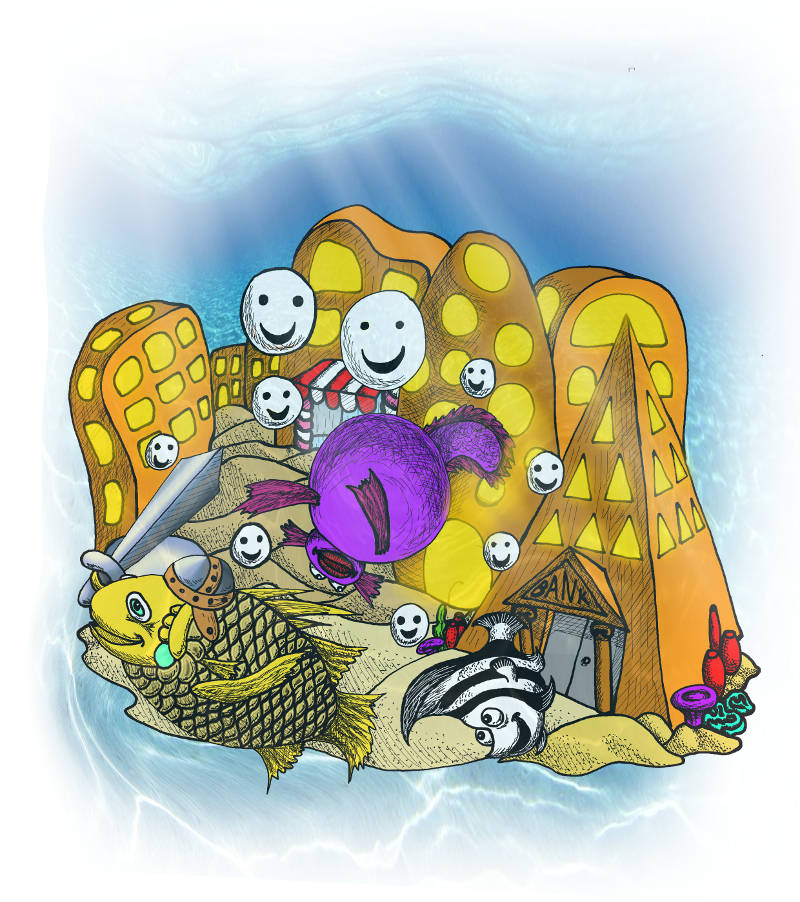
“I am glad you cheered up after the unicorn fiasco,” piped up Simon by her side. “Thank you again – you kept your promise and helped me learn how to swim! My quest is complete. But you have no balloons or even money to buy your bread and umbrella. I am so sorry…”
“Never mind all that!” interrupted Sir Pineapple magnanimously, “I still have some cash left and we can certainly afford a meal and an umbrella. Show me the best bakery and… (he had no idea where one buys umbrellas and the prolonged pause rather spoiled the effect of the gesture) umbrellary in town!”
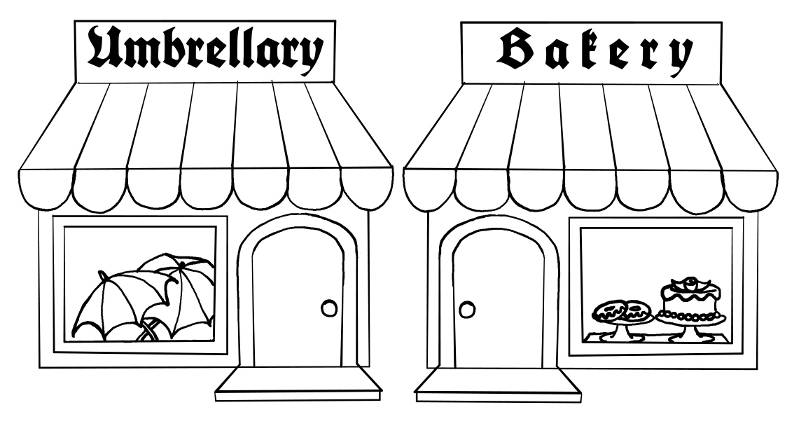
And they did. At the bakery they bought a loaf of bread for Em, a box of triple-chocolate cupcakes with extra icing AND cherries on top for Simon and Sunny and a whole Hawaiian pizza for Sir Pineapple. Our friends were swimming along, eating and laughing at Simon’s attempts to do a loop-the-loop in the water while eating a cupcake (Very messy indeed – don’t try that at home!), until they arrived at the general store – for that appears to be the place to buy umbrellas. Sunny hesitated in front of a row of gaily coloured circles with stars, clouds and kittens (I don’t know why kittens either) printed on them in primary colours. The mood dropped perceptibly, with the ghost of Noel passing through the company, like a cold current.
“I don’t think I want to buy things like that any more. They are too expensive to lose,” said Sunny quietly, turning to Simon, “There are enough inevitable losses in life – why add evitable ones?” and she turned away from the shop towards home.
Sunny was swimming slowly, preoccupied by her loss, not noticing that her companions lagged behind. But on the edge of town she was jerked out of her reverie by a rainbow. A line of seven overlapping umbrellas, all the brightest colours (with, I am happy to say, not a kitten in sight), was hooked on Sir Pineapple’s sword and towed along between him and Simon.
“A present!” yelled Sir Pineapple grinning from ear to ear (or he would have done, if fish had ears – but you know what I mean).
“You can’t let one jerk ruin your life,” chimed in Simon, “I got you a poster to remind you of that.” He unrolled a large wall poster with a beautiful pink unicorn frolicking in a field of anemones. Its horn was sparkling, its mane was sweeping elegantly, and on its bum there was a post-it note saying “KICK ME!” in big capital letters.
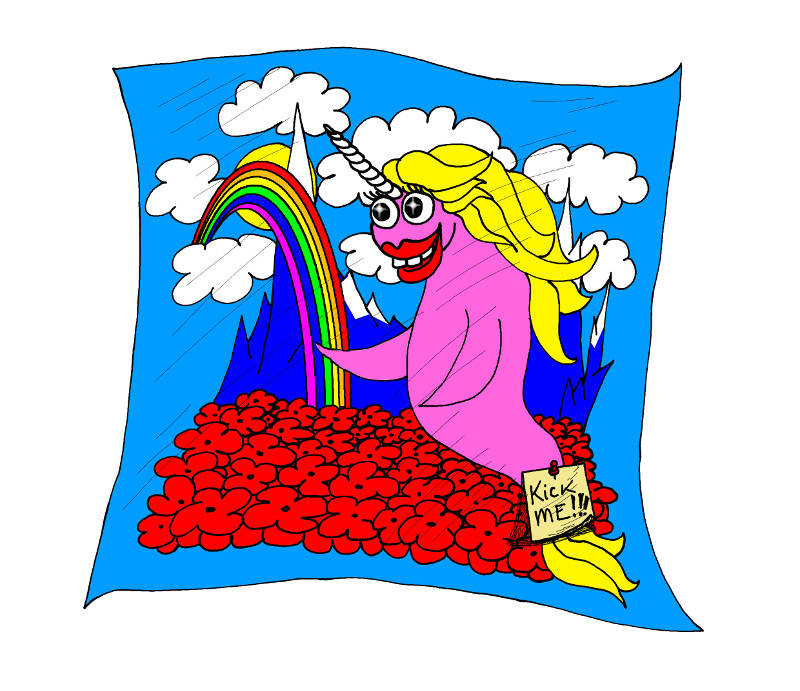
And Sunny did. And laughed. It was genuine, riotous, slightly hysterical laughter. Complicated laughter, where the relief at finally letting go of a cherished lie is intertwined with the sadness of its loss. Cleansing laughter.
***
Whether it was the close encounter with lightning – flooding his body with adrenaline – the storm, giving the air that fresh, slightly metallic taste of ionisation, or the presence of his friend – Simon wasn’t sure – but he felt excited, exhilarated, elated and lots of other things beginning with “e”. And so did his elephant. He also began with “e”. Cool! The realisation was slowly dawning on Simon that the visitor was his first real friend. And it didn’t matter at all that he was weird and didn’t fit this world. So were most people actually born here. People, who spent their lives in desperate attempts to prove to others and, above all, themselves that they belonged, that they were “normal”. They had to be either rather bored or permanently frightened of being found out as imposters. The realisation that he didn’t have to try, that’s what filled Simon with the sense of elation! If you don’t play by the rules, you can have so many options, so much freedom, so much fun! For the first time in his life, Simon felt like he belonged – he belonged to himself.
Chapter Twenty Five
In which the adventure is completed, the treasure is found, and the loose ends are tied into a pretty bow of happily-ever-after.
The trip home from that point took no time at all. Sunny was experimenting with her new umbrellas, looking at the light through several at a time and seeing the colours change as it shined through them. She waved to Willy and Nilly, who interrupted their argument about whose middle was thicker to wave back. She said “Hi” to Molly and Polly, who followed her umbrellas with a jealous stare.
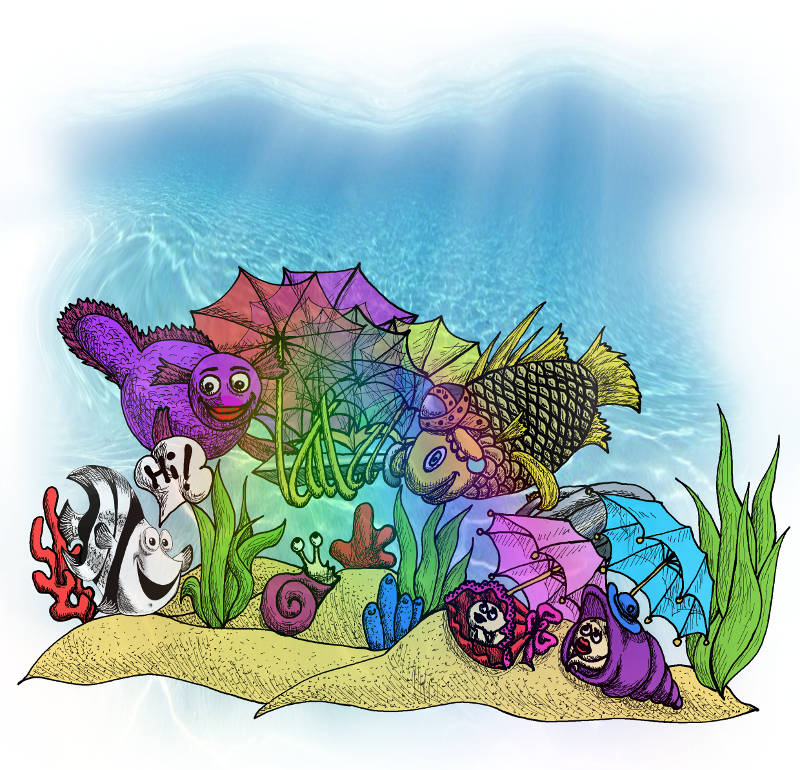
She hugged Em, who was somewhat flustered by such emotional excess, but also relieved, for he was concerned about Sunny’s absence. Fortunately, he surfaced from his pondering and noticed that she was gone two days after it actually happened, so he thought she was only gone for a day and was not worried too much.
After receiving the loaf of bread from Sunny, Emmanuel absent-mindedly attempted to eat it together with the bag, which she snatched off just in time. Our friends settled down to lunch and a cup of Fruity-Shooty-Looty-And-Pillagy – a famous pirate soda. (The advertising executive in charge wanted to get rid of “pillagy”, since it didn’t rhyme or scan. However, the pirate who invented the drink explained the importance of “pillagy”, backing it up by the possibility of shooty. After considering all the relevant information, the executive decided that there are more important things in life than rhyming and scanning. Life, for example.)
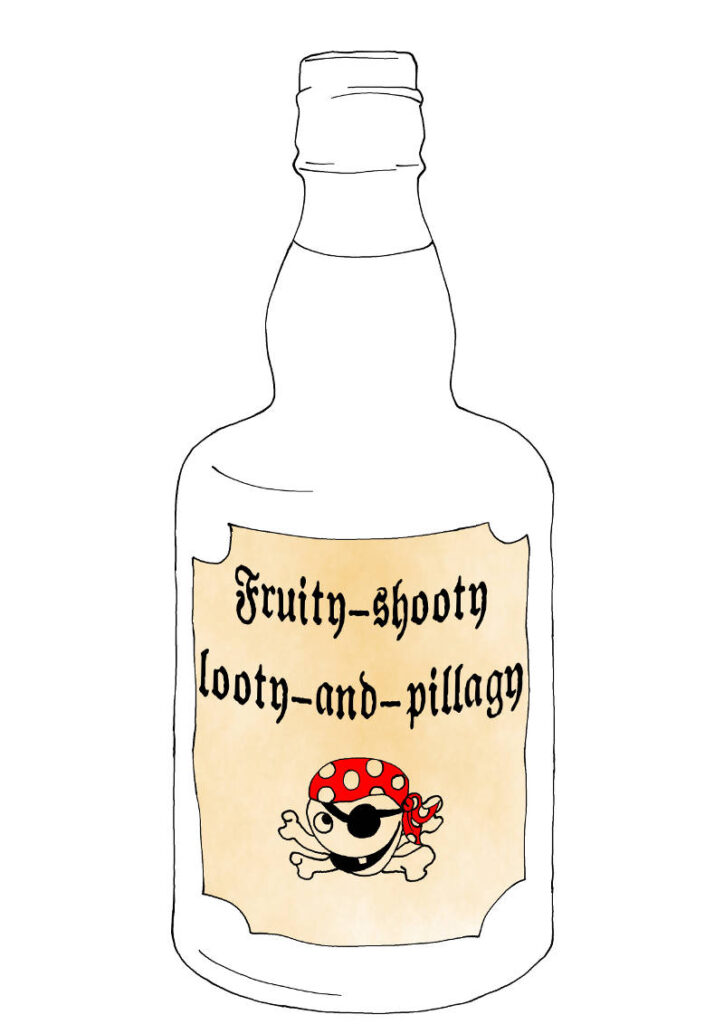
Once everyone was settled, the octopus was treated to a tale of adventure. Sunny and Simon were telling it in turns, interrupting each other excitedly in interesting places, and even Sir Pineapple weighed in from time to time.
“I was very disappointed about The Book of Truth, not only because of Simon, but also because of you, Em. I thought it would tell you about the meaning of life,” said Sunny when they reached that part of the story, “but then I thought, you probably would not enjoy having the answer as much as finding it, right?”
“Right,” replied Emmanuel happily, “Hmm… That book is a good illustration of how something is only true within the language you use to describe it. For a child grass IS green, one has to see more types of grass and learn more colour names to describe it more accurately. Hmm… but one never knows enough colour names to describe one’s actual experience… I wonder if it is possible? Hmm… I shall think about it… Hmm…”
Sunny, who knew him well, quickly pulled Em’s tentacle to stop him from diving deeper into thought, and carried on with the story. “Do you know anything about the treasure?” she asked somewhat anxiously, after recounting the meeting with the unicorn to Em.
“The treasure… hmm… yes, indeed. Hmm… I suspect this map refers to the sand dollars lining the paths in the garden… hmm… Yes, indeed. This shipwreck was full of them when I found it. You see, sand dollars were real currency once. But, because of the incredible rate of inflation, the currency was falling so fast that it reached terminal velocity and ended up at the bottom of the sea… hmm… so the map was genuine, yes, indeed! It did not show you the truth, but it helped you to think of the way home – which, after all, is much better… hmm…”
After a short pause, involving our friends silently repeating the last sentence to themselves several times, and finally deciding that they had no idea what Emmanuel meant, they finished their lunch and went on with things.
The story stopped – they never end,
we met a monster, made a friend.
We were lucky on the day –
it could have been the other way.
The journey took us, like a stream,
right through nightmare to a dream.
The dream escaped, it nicked our trust
and legged it off unseemly fast.
We were mad and sad a tad,
but also glad for what we had.
We had a laugh, we had a fright.
In our flight we learned to fight.
We’ve grown up and changed the game
as we returned from whence we came.
And they all lived happily ever after. At least for a while.
***
The elephant was still in Simon’s bedroom, filling almost all the space not already filled by the bed. It was only a small elephant, but so was the room. Simon smiled and pointed to the bed, for his friend to sit down, realising belatedly that it probably didn’t matter at all to a projection whether it was sitting or standing, and covered his confusion with an embarrassed smile.
“So, are you ready to go and find another person like you yet?” asked his visitor, ignoring both the gesture and the smile. “Where should we try?”
“I am not sure… We should probably try where there is only one person – people are even less likely to see you in groups. Can you detect a single child in a room or something like that?”
“I can. Give me a second… yes, here we go.”
And there they went. To a tall, narrow room, with a giant wardrobe blocking off a small space at one end, a tall window looking out into the night, and a small girl, swathed in layers of clothes, sitting on a window-sill, looking through the dusty glass at the brilliant moon. The moon, shining its reflected light through the layers of pollution, was, indeed, blue.
***
You expected this, didn’t you? As most stories, this story ends at a beginning. Anyway, worrying about ever after is rarely useful. As one of my favourite authors pointed out before, if it’s jam tomorrow it’s never jam today.
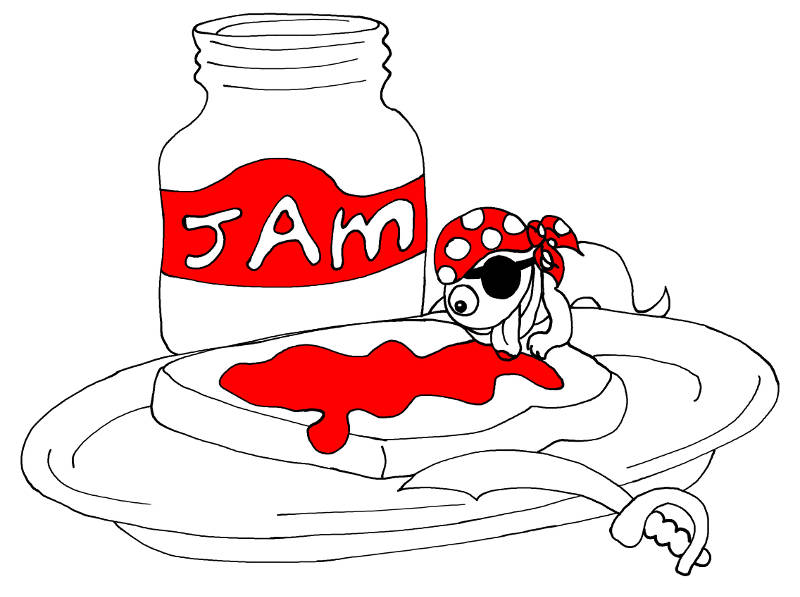
What’s tomorrow today will be today tomorrow. Think it through, it works. So there.
